News
NUS: Reprogrammed for Tomorrow

Among the courses on governments and Singapore politics that first-year political science student Tan Yong is taking, one involved trooping down to the headquarters of superapp Grab to observe how operations staff are using AI algorithms. The brand-new course Machines that Learn is being offered to the pioneer cohort of 220 residents at Acacia College, Singapore's first AI-focused university residential college.
"It was eye-opening because seeing AI at work helped me contextualise its capabilities," said Tan Yong, 21, who chose Acacia College because he wanted to stay on top of AI developments. "I saw how AI was used to produce reviews for the businesses that were subscribed to Grab's services."
First-year law student and fellow resident Choo Hao Wen, 21, who joined the 18-student trip, added, "The Large Language Models (LLMs) that they used relate to words, syntax and language-and they are pertinent to law. It's good to be wary of what AI has in store for us."
AI has already changed and will continue to change the world. Singaporeans seem particularly partial to the technology: recent data from OpenAI showed that the country has the highest per capita ChatGPT usage globally - one in four people use it weekly.
Within higher education, AI has had an outsized impact. The turning point occurred when AI chatbot ChatGPT, the first of its kind, became publicly available in November 2022. A New York magazine article stated, "ChatGPT has unravelled the entire academic project", quoting a study suggesting that just two months after its launch, 90 percent of US college students were using ChatGPT to help with assignments.
Vacillating between fears of student cheating and the potential AI offers, universities worldwide responded either by banning AI altogether, embracing it entirely, or taking a middle path. NUS, as a university that prizes innovation, had explored AI much earlier. The NUS Artificial Intelligence Laboratory was started in 2019. In the opinion of Professor Simon Chesterman - the NUS Vice Provost (Educational Innovation) and Senior Director of AI Governance at AI Singapore - the best thing NUS has done when it comes to AI has always been "to encourage experimentation".
What the launch of ChatGPT did was to accelerate, deepen and consolidate the University's efforts to harness AI in the most effective and responsible way possible.
Said NUS President Professor Tan Eng Chye: "NUS is mounting a robust and comprehensive approach to AI that spans our core mission areas of education, research and innovation, and administration. NUS will empower and uplift the whole organisation to fully leverage AI in all that we do." The goal? Prof Tan replied, "To set NUS up to be a leading institution at the forefront of AI."
An AI Research PowerhouseA major milestone was in the setting up of the NUS AI Institute (NAII) in March 2024, which brought all of NUS' existing AI research initiatives and talent under one roof. Comprising 29 Leads and over 200 faculty members, their three focus research areas are: foundational AI research, policy and societal implications of AI, and real-world applications across various domains. NAII also launched the NAII Seed Grant Call, which will disburse up to S$3.2 million per year to high-potential AI projects in NUS.
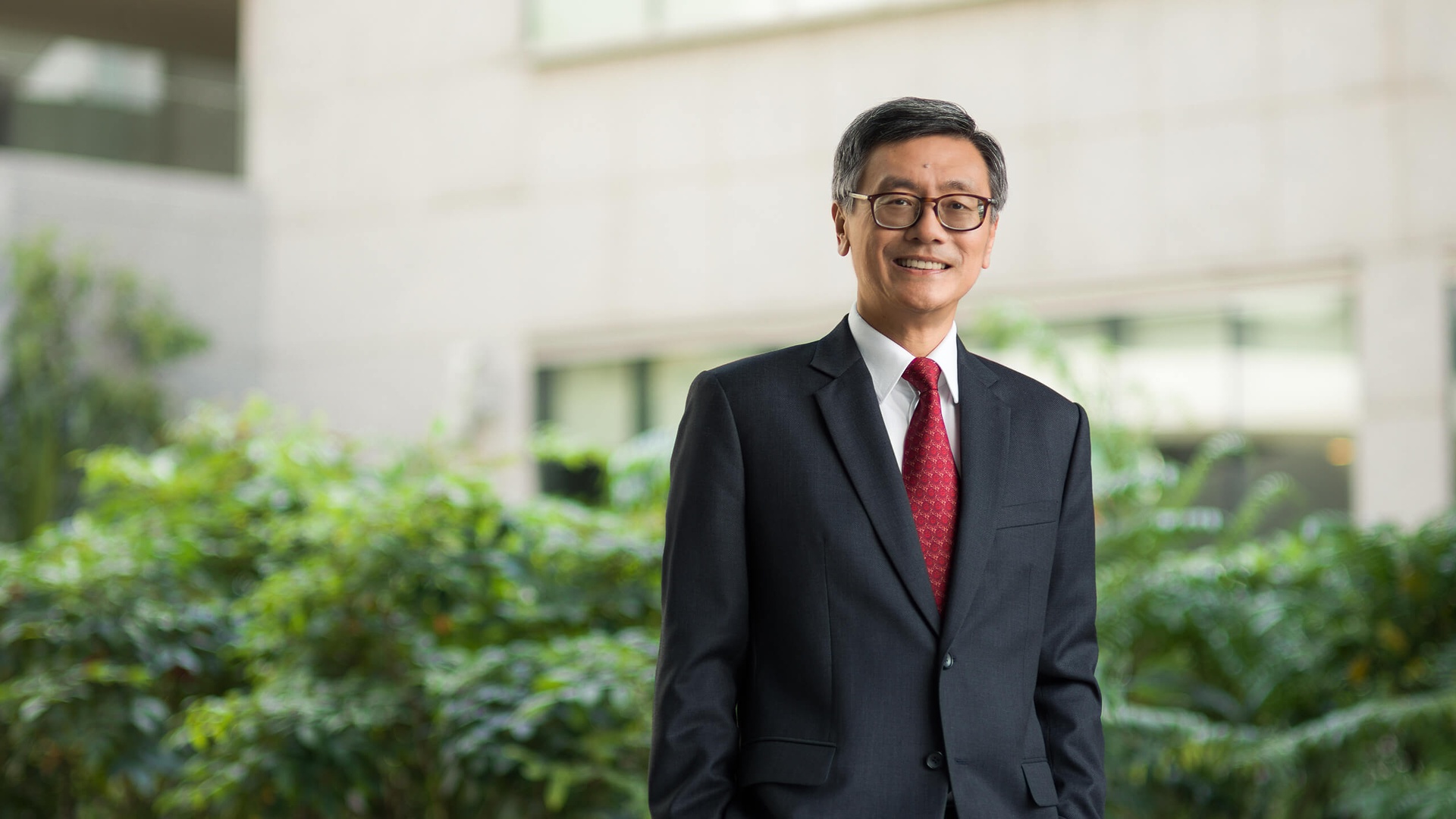
NUS has taken its AI research capabilities a step further by recruiting and nurturing world-class AI research talents. Over the past two years, NUS has recruited 27 new AI faculty, some of whom are of international renown. Another 53 new hires are contributing to advancing AI in their disciplines or incorporating AI tools to propel their research.
To amplify the research and bring it closer to the real world, NUS is also working with industry partners and global tech superpowers like Microsoft Research Asia, Google, IBM and Nvidia. In its collaboration with Google, both partners will establish a joint research and innovation centre to accelerate applied AI research and nurture skilled AI practitioners.
The Breadth of AI in NUS EducationIn the classrooms, because of AI, students at NUS today have markedly different choices and experiences compared to their seniors just a few years ago. In terms of content, there are many more AI-centric courses, including those that layer an AI element on top of existing disciplines, or what is called "X + AI".
Among the more than 175 AI-themed courses now offered at NUS, over 70 of these are outside the School of Computing - in Business, Engineering, Sciences, Humanities and Social Sciences. These X + AI courses include topics like analysing AI-generated fake news (Communications, New Media and Society), facilitating Socratic dialogue (Introduction to Psychology) and critiquing AI-composed music (Social and Cultural Studies through Music).
To develop deep AI expertise, at least four Bachelor's and Master's degree programmes were launched this year, including the Bachelor of Computing in AI, Master of Computing in AI and the Bachelor of Engineering in Robotics and Machine Intelligence. As for alumni, the NUS School of Continuing and Lifelong Education (SCALE) offers a plethora of short courses and certifications for AI and machine-learning in areas like predictive analytics, generative AI and AI for Talent Management and Organisational Design.
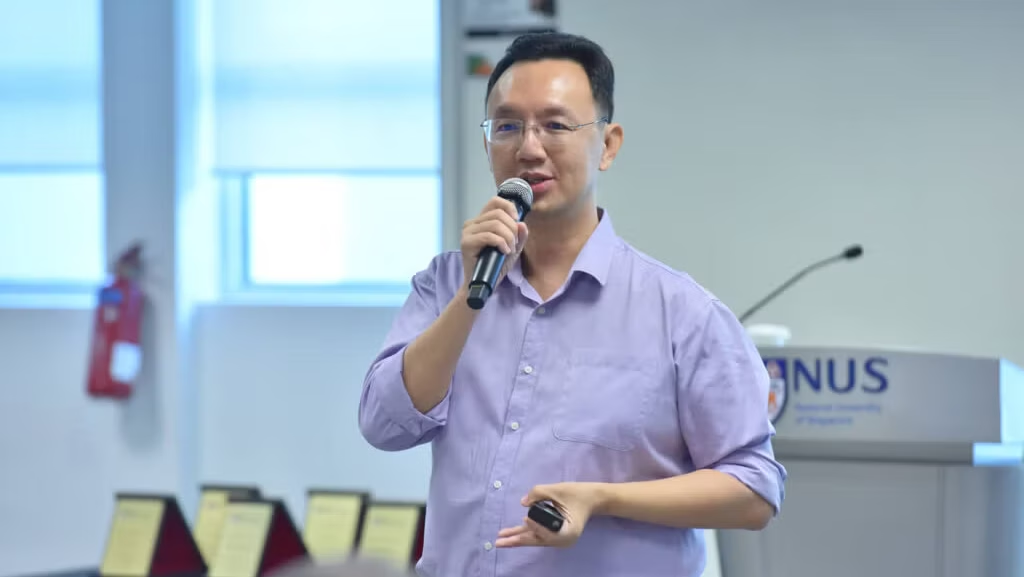
In terms of the educational experience, students who are very much digital natives are now using AI in their take-home assignments to summarise readings or lecture notes, craft essays and solve problems. They simply have to fill in a declaration form listing which AI tools were used. Associate Professor Ben Leong, Director at the AI Centre for Educational Technologies (AICET), said tongue-in-cheek at a recent talk, "We surrender. Ninety percent of our students are probably using AI."
In class, faculty are using AI to teach better. In a 2024 survey of faculty, it was found that about 23 percent of NUS' undergraduate and post-graduate courses utilised some aspect of AI. One of the best examples of this is using AI chatbots to role-play with students. For instance, within social work, if students needed to practise counselling in the past, an actor would be hired to work with one student while the rest would observe. But now, every student gets to practise individually with a bot. They engage in dialogue with 'patients' from diverse profiles and backgrounds, and the chatbot even describes behaviour - for instance, if the patient looks away or is mildly irritated. After a session is complete, the student gets personalised feedback, both from the bot and an instructor who can view the transcript of the exchange.
Time-starved faculty are not doing this alone. NUS is strategically bringing the best ideas together, sharing these AI tools across NUS and providing support when needed. In 2024, the Centre for Teaching, Learning and Technology (CTLT) was formed by the merger of the Centre for Development of Teaching and Learning (CDTL) and the Centre for Instructional Technology (CIT) to run workshops, courses and consultations on how to use technology to create more personalised or engaging learning experiences. Recently, CTLT collaborated with the NUS Teaching Academy (NUSTA) to develop a proficiency roadmap for AI in education.
Then there is AICET, which has a team of consultants who work with NUS faculty to leverage AI and technology in their teaching through fast experimentation and prototyping of new ideas. AICET's successes include grading tools that provide accurate, personalised feedback for short-answer quizzes, and chatbots that help nursing students with their research projects or train dental students in radiographic interpretation.
Many of the tools that have proved particularly useful are those involving role-play, where ironically AI enables students to hone human skills by simulating client interviews for social work or mock trials for law students. Said Assoc Prof Leong, "As we move into an AI-driven future, human skills will become increasingly important. We are now taking advantage of advances in AI to teach these practical human skills."
Safeguarding Focus and Original ThoughtBut even as educators use AI to achieve better learning outcomes, they are well aware that if students overuse or misuse it, AI can dull thinking ability-an outcome worse than technology merely taking away the need to memorise telephone numbers or read maps.
Prof Chesterman - who likened the desire to resort to AI as the more pleasant choice, akin to choosing to eat ice-cream over broccoli - emphasised this several times in his interview: "If you can't even form an opinion without asking ChatGPT, then it becomes a big problem."
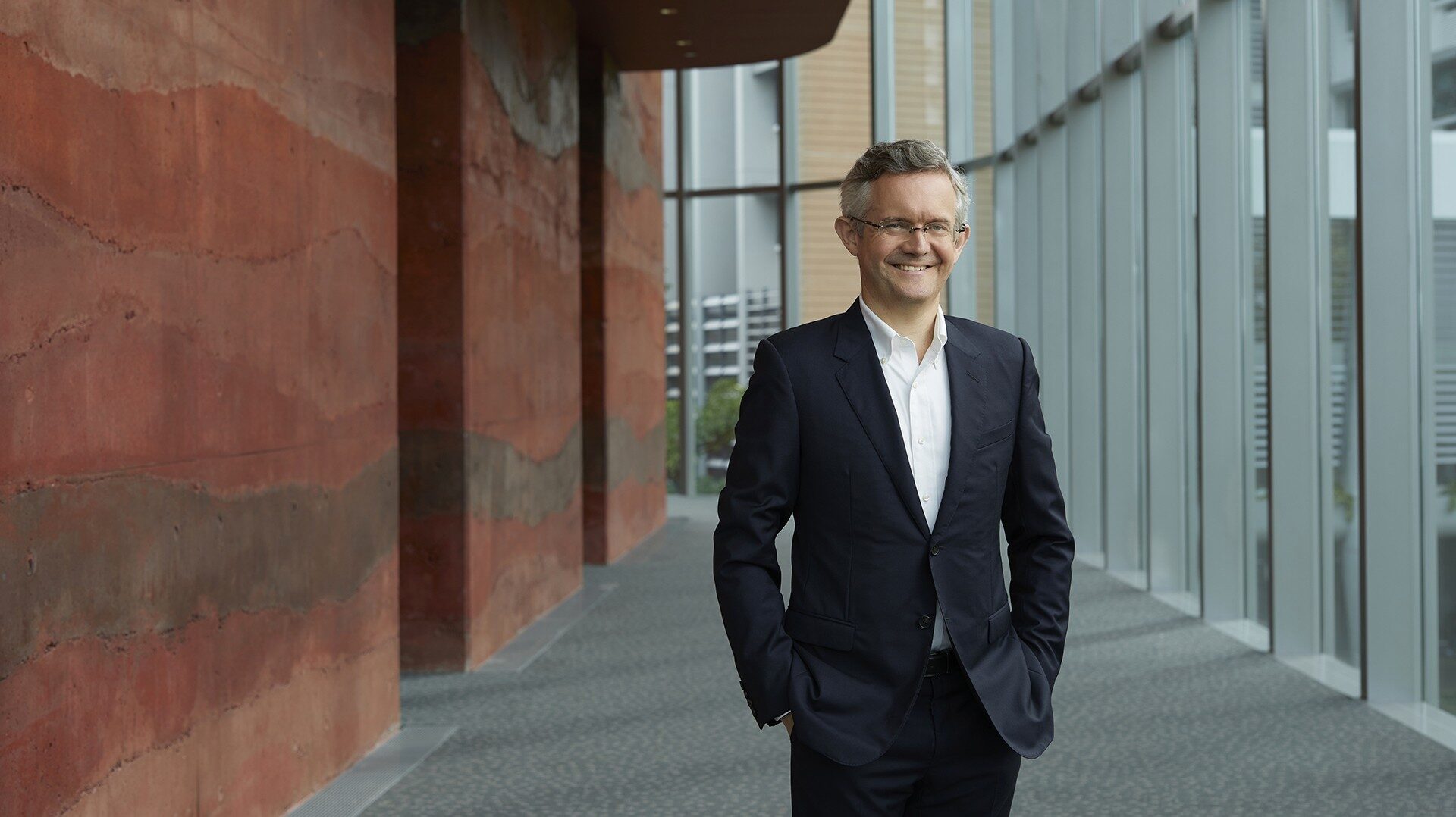
According to an MIT study released in June 2025, ChatGPT may be eroding critical thinking skills. In the study of 54 people who were tasked to write an essay, those who used ChatGPT had the lowest brain engagement and "consistently underperformed at neural, linguistic and behavioural levels", compared to those who wrote without any help, or used Google search.
Likewise, Assoc Prof Leong talked about the "AI Chasm of Death": students who can only get things done with the help of AI will end up becoming stuck on one side of the chasm; they will only be able to cross over through sheer hard work, knowledge acquisition and critical thinking. "As educators, our job is to help them cross that chasm, by motivating them to put in the effort to think and learn," he said. "It's like exercising in the gym. It's hard work, but you need to do it to grow in strength. Our job is still to get them to exercise those mental muscles." He added, "The future of education is really one where we, instead of focusing only on teaching students to do things right, we place more emphasis on getting them to learn to do the right things."
Like eating broccoli or putting in the extra work to exercise, students must be taught to make learning choices that are possibly less pleasant but necessary and good for them-to focus and think without AI.
Nurturing AI-proof QualitiesWith naysayers wondering if universities are still relevant in the age of AI, or if AI will one day surpass humans, NUS is cognisant of the need to produce graduates who are not only AI-literate and AI-fluent, but have the qualities that AI cannot replicate. There is a greater emphasis on equipping graduates with higher-level skills like judgement, adaptability and ethical reasoning.
"Instructors deliberately raise the bar by designing tasks that go beyond what AI can produce," said Associate Professor Melvin Yap (Arts & Social Sciences '99), who serves as Associate Provost (Education & Technology), Head of CTLT, and faculty member in the Department of Psychology at the Faculty of Arts & Social Sciences (FASS)."These tasks require interpretation, critique and justification, where students question assumptions, evaluate evidence and construct their own reasoning."
He added that true AI-free thinking ability can still be assessed through in-person, supervised exams, as well as oral presentations, portfolios and lab performances. He said, "These formats demand originality and on-your-feet reasoning, making clear that learning outcomes cannot be outsourced to technology."
Learning how to adapt, work in a team and get along are human qualities that manifest outside of the classroom and this is where NUSOne - an approach designed to encourage students to participate in out-of-classroom activities for a well-rounded student life - comes in.
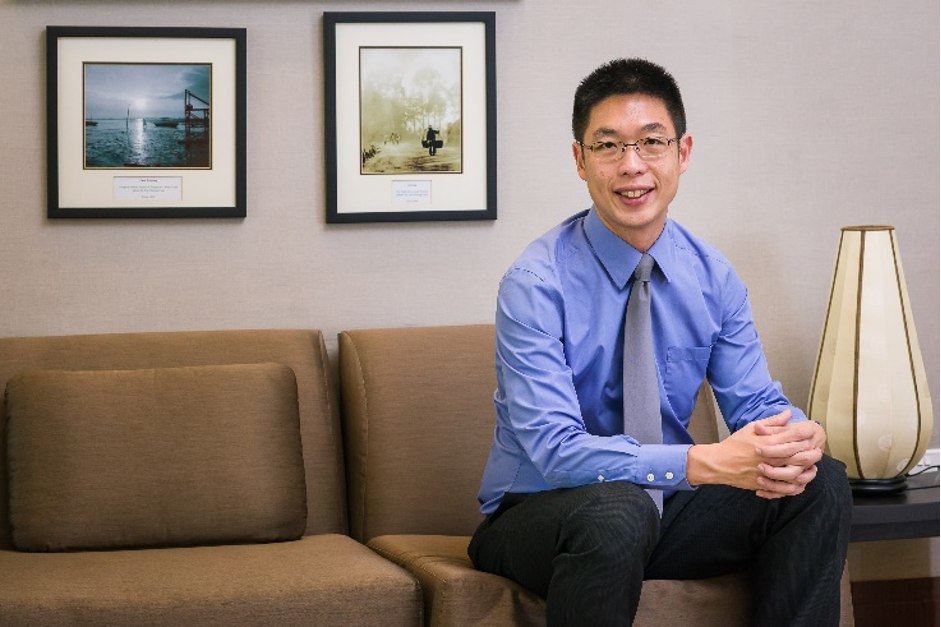
Then there are human skills. In a paper titled "Will AI make EQ more important than IQ?" by Prof Chesterman and Associate Professor Loy Hui Chieh, who is from the Department of Philosophy at FASS, they questioned whether universities should switch from educating the mind to educating the heart. "There is emerging literature about the feeling economy, which is the idea that your value is not just your brain but your heart-in your ability to persuade and engage people to do all sorts of things that, for the moment at least, AI can't do," said Prof Chesterman. "We must be more intentional about cultivating what it is that makes us truly human."
What all this translates to are NUS graduates who are not only AI-literate and AI-fluent, but who are inherently employable.
Said Assoc Prof Yap, "AI is integrated thoughtfully to amplify humanistic values such as judgment, creativity, and ethical leadership, while embedding critical engagement with AI across disciplines. This approach ensures graduates are capable of questioning assumptions, critiquing outputs, and making decisions with integrity. This approach prepares graduates not only to use AI effectively but also to lead with adaptability, discernment, and integrity in a world where technology continues to evolve."
This story first appeared in AlumNUS on 1 January 2026.
Teaching with heart: The human side of higher education
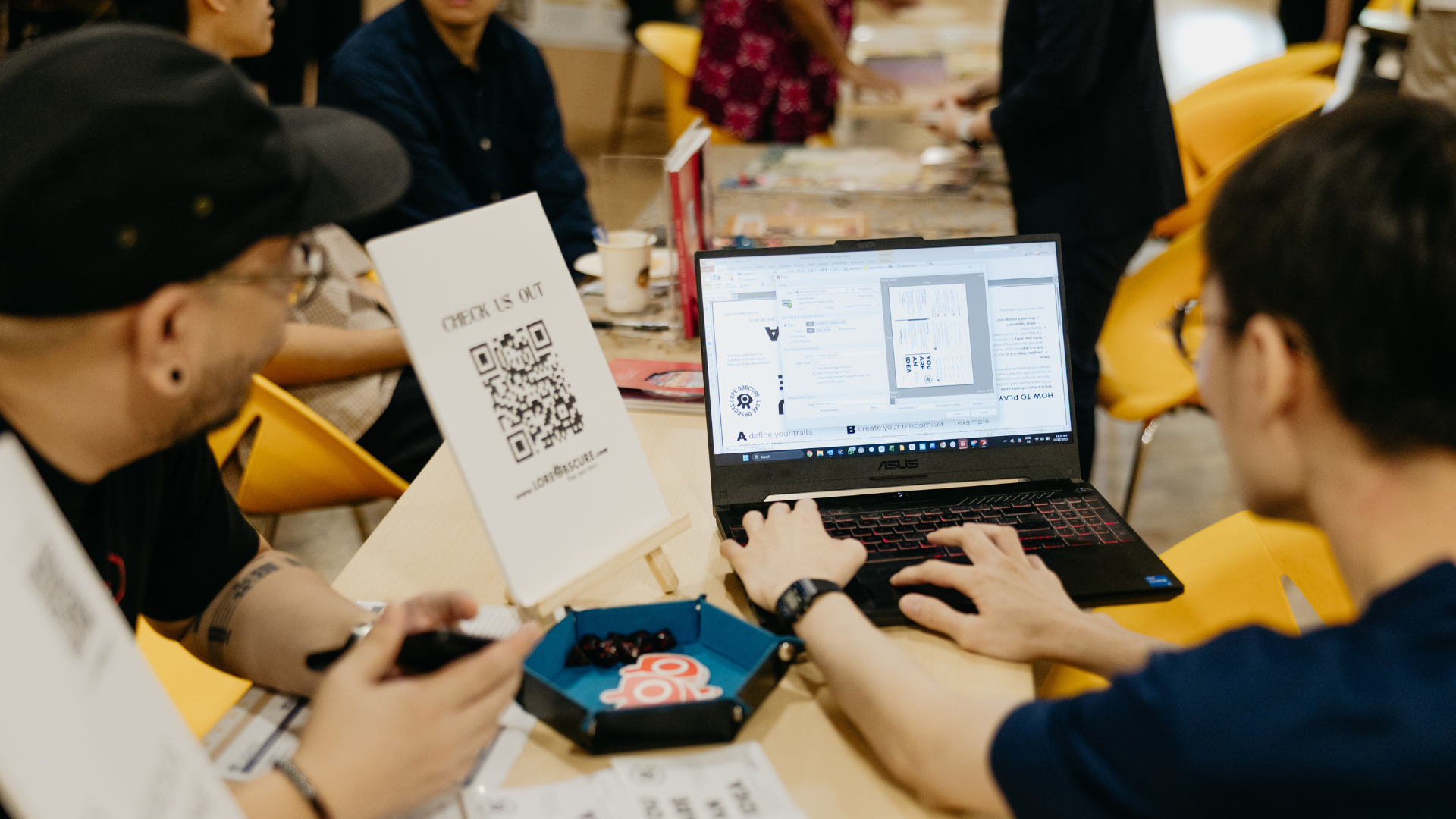
Forget the confines of a lecture theatre, abstract theories and math equations. For their core Economics introductory course at NUS, students found themselves not in a classroom, but outside Sri Mariamman Temple where their phones buzzed with a Telegram chatbot's cryptic challenge: "All are welcome past the door. So when footwear outside are a-plenty, the temple is a ______, and when footwear outside are a-wanting, the temple is a ______."
Exchanging puzzled looks, the students typed "/hint" into the chat. "If there are many pairs of footwear outside, it must be crowded (and uncomfortable) inside," the chatbot prompted. After recognising the relevant concepts, they typed the answers into the Telegram chat before receiving a clue to their next location.
It is not every day that students participate in a chatbot-guided scavenger hunt as part of their core Economics introductory course. But Associate Professor Ong Ee Cheng, Mr Chan Kok Hoe and Dr Timothy Wong from the Department of Economics at the Faculty of Arts and Social Sciences believe that experiential learning can help students better understand key economics concepts in everyday contexts.
This was one of many innovative teaching strategies presented at the Higher Education Conference in Singapore (HECS) 2025. Organised by the NUS Centre for Teaching, Learning and Technology (CTLT), the event held on 10 December 2025 gathered educators from universities across Singapore to explore how to enrich learning experiences.
This year's theme, "Building Relationships in Teaching and Learning", echoes Prime Minister Lawrence Wong's call for education to move beyond narrow definitions of success, and empower learners to discover and develop their unique strengths, in his speech at the Debate on the President's Address 2025.
"It is most fitting that HECS 2025 is championing the human dimension of education. This focus on relational teaching aligns with PM Wong's call to broaden meritocracy, creating environments where learning is joyful, fulfilling, collaborative, inclusive and future-ready," said NUS President Professor Tan Eng Chye in his opening speech.
The power of play
A recurring theme throughout the conference was the role of play in teaching - widely used in early childhood education but often undervalued in higher education despite being found to increase student engagement.
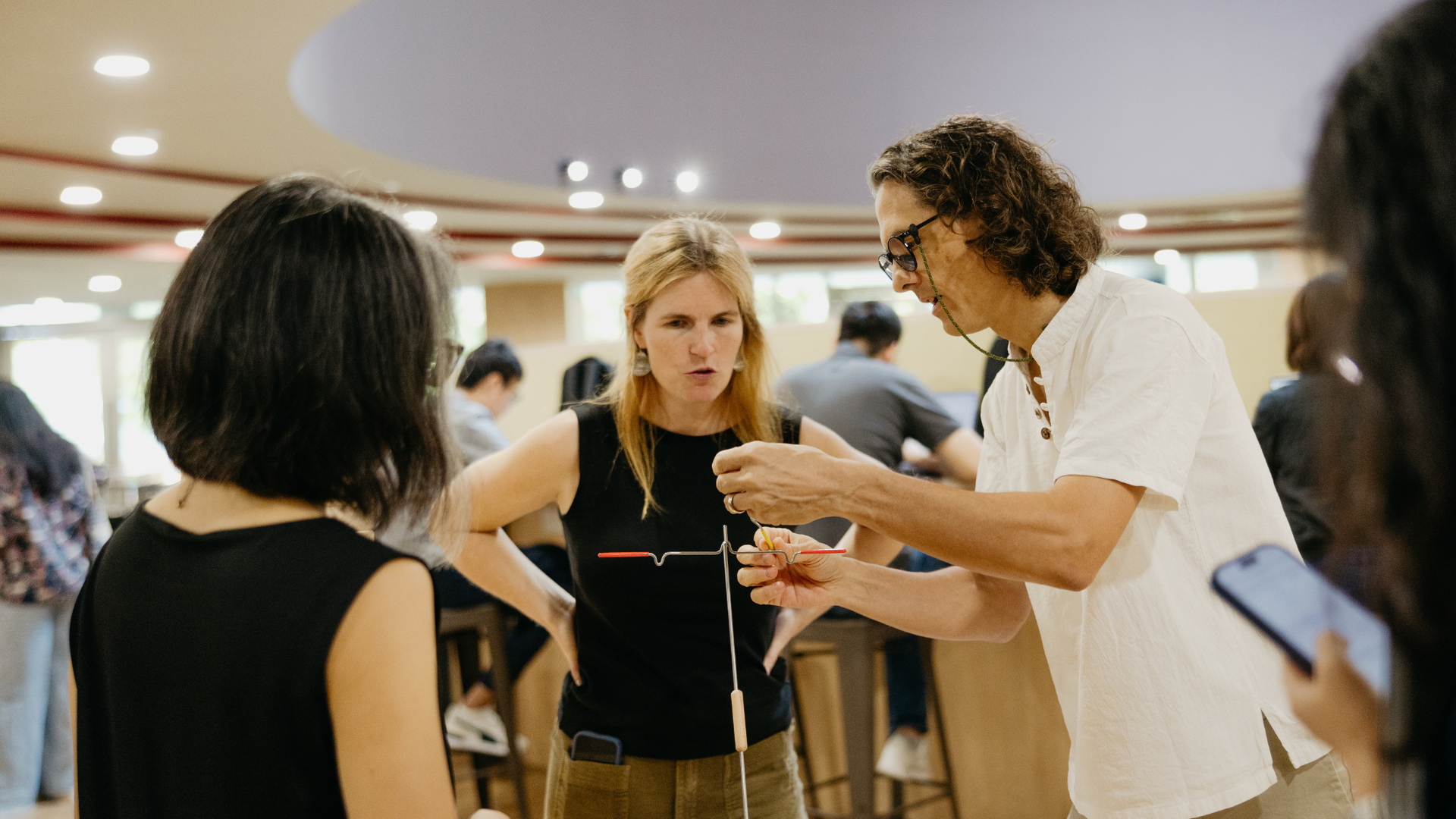
At NUS, faculty members have been experimenting with such approaches, several of which were showcased in the "Playful Minds: Learning Through Play" installation.
One example is the use of tableau, where students create a frozen, dramatic image with their bodies to interpret an abstract prompt. While tableau is most commonly associated with theatre studies, it is also used across humanities disciplines such as anthropology and philosophy, combining embodied, experiential and collaborative learning.
In HS2902: Do Play Play: The Importance of Play, an interdisciplinary course offered as part of the common curriculum of the College of Humanities and Sciences, students design card games about a social issue of their choice. In "We Just Bought a Zoo", for instance, players juggle the welfare of animals against profit-making, exploring ethical dilemmas surrounding captive animal welfare.
On the sidelines of the "Playful Minds: Learning Through Play" installation, Assoc Prof Ong added, "In the context of higher education, play is about moving away from extrinsic to intrinsic motivation - the feeling of 'I'm doing it because it's interesting and I'm curious, not just because I want an A'."
Different strokes for different folks
While much of the conference focused on undergraduate learners, speakers also highlighted the need to tailor teaching to different learner profiles.
In a paper presentation, Dr Ng Boon Yuen and Dr Ganthi Viswanathan from the Singapore University of Social Sciences (SUSS) examined how adult learners' sense of belonging affects their learning in online classes.
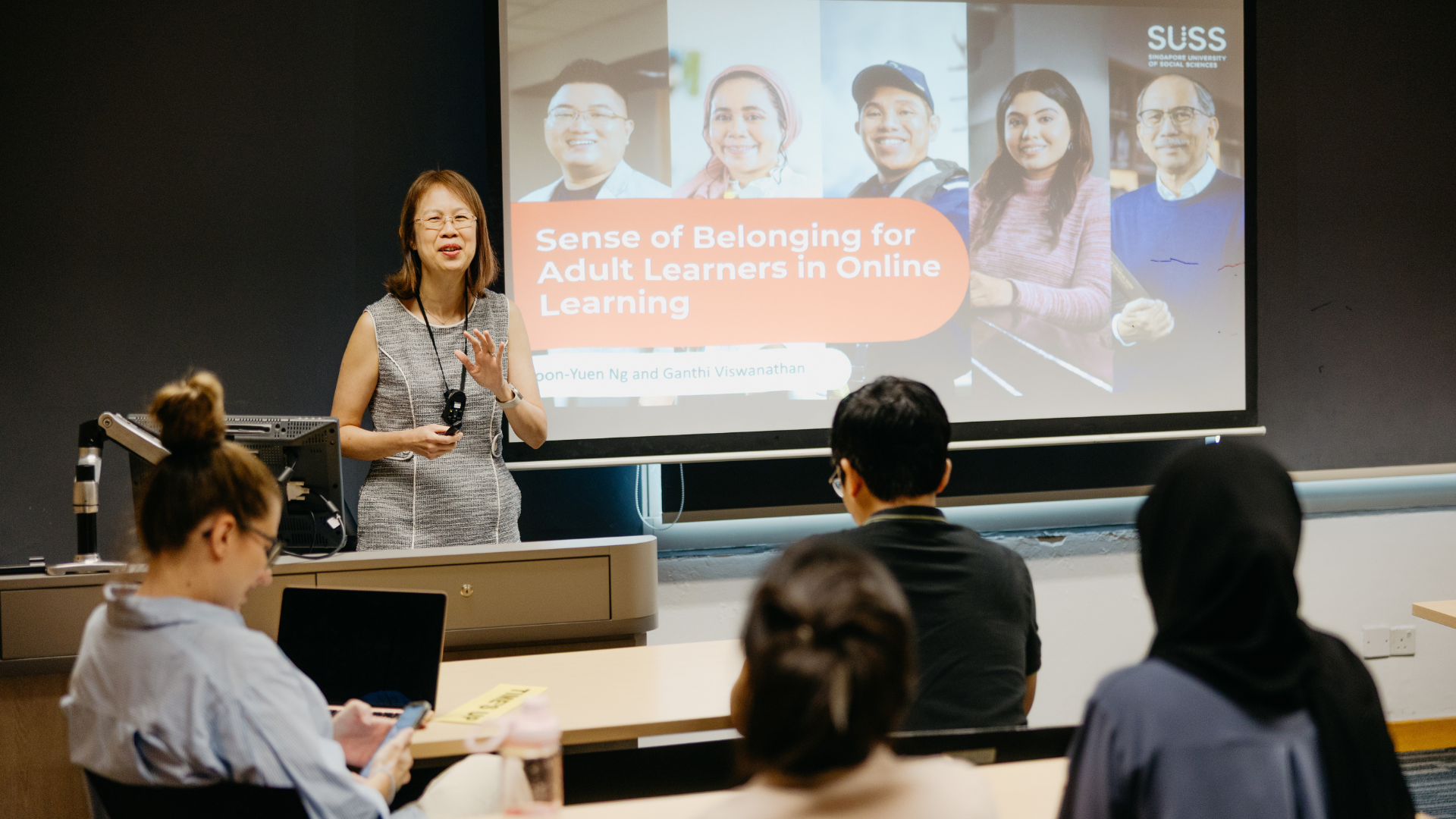
Unlike undergraduates who place greater emphasis on social connection, adult learners prioritise practical factors like convenience and flexibility. While the majority of surveyed students reported that they did not feel a sense of community with their peers, most were satisfied with online courses and planned to continue taking them.
However, this absence of a sense of belonging still manifests in challenges such as a lack of trust among members during group work, noted Dr Ng. To foster stronger rapport, one suggestion was for instructors to facilitate early relationship building through icebreakers and breakout rooms.
Creating a culture of care
Speakers also emphasised that meaningful relationships form the foundation of fulfilling learning experience, whether between educators and learners, or learners and communities. Within classrooms, small, intentional gestures can reshape dynamics. Dr Daryl Ooi, a lecturer at the NUS Department of Philosophy, called these "pedagogies of care".
"There are a lot of acts that happen to us and in our hearts, we are sorting out what is caring and uncaring," said Dr Ooi, who was representing an NUS learning community on pedagogies of relationality and care, at the workshop. Pedagogies of care respect students' autonomy and the plurality of their experiences, opinions and emotions. One participant shared how simply sitting on the floor with her students helped to reduce hierarchical barriers.
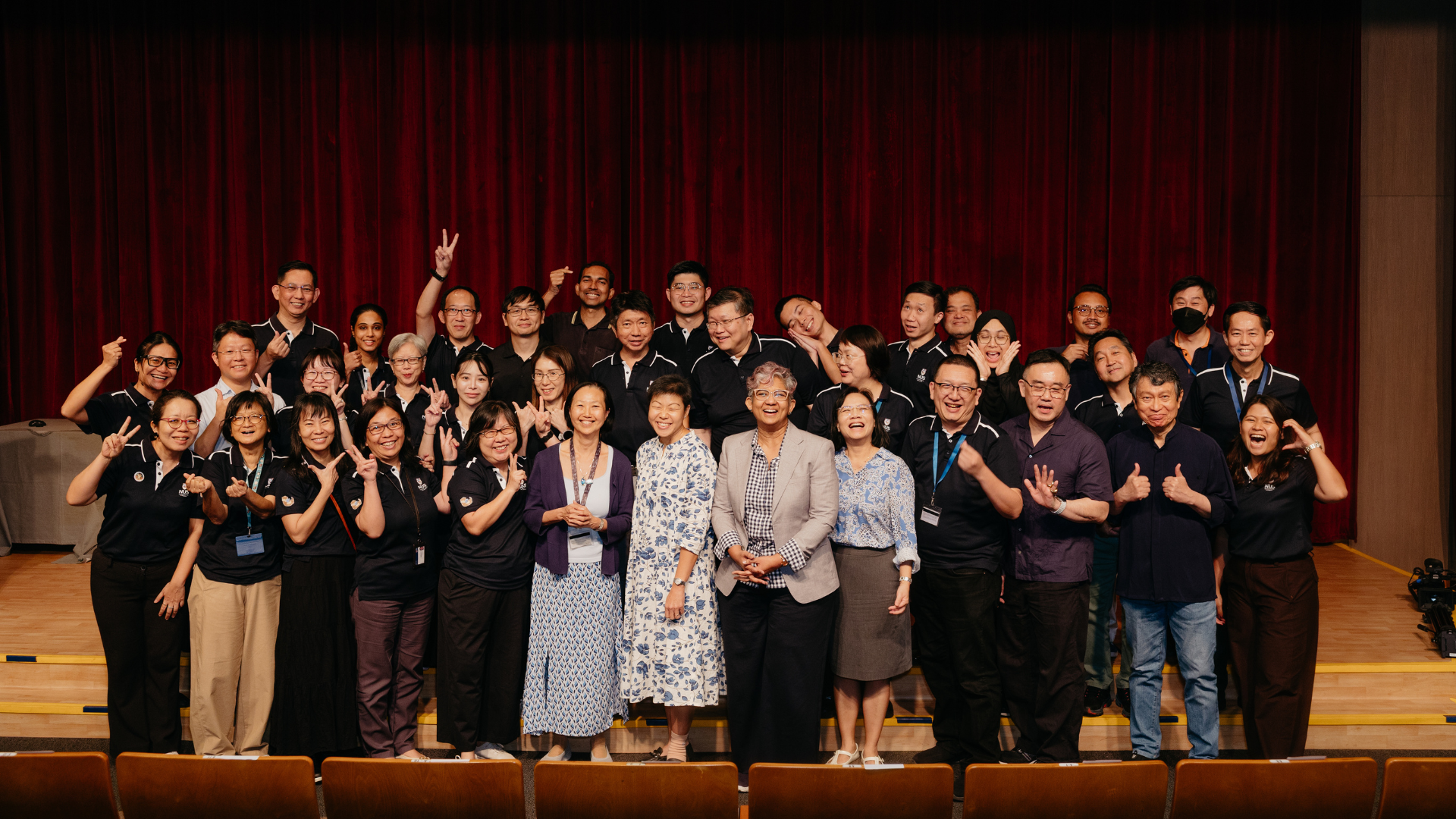
Reinforcing the importance of relationships in her closing keynote, Associate Professor Chng Huang Hoon, Director of the Chua Thian Poh Community Leadership Centre at NUS, said, "High-impact experiences have to be founded on relationships, community bonds and mutual trust. If we can enact an educational experience that is relationship-rich in- and outside our classrooms, we would have gone some ways in restoring the human in the work we do."
This story first appeared in NUSnews on 26 December 2025.
As machines learn, humans must think: How NUS Philosophy is nurturing critical thinking through courses that bridge disciplines

Machines can learn from vast amounts of data, identify patterns, and make predictions at speed. With advancements in robotics and artificial intelligence (AI), AI is now even taking on physical forms to interact with the world in ways we once thought uniquely human, but it continues to do so without understanding meaning, context, or ethics.
Us humans, on the other hand, can think, empathise and reason. We are able to weigh the consequences and navigate moral landscapes, asking questions that help us differentiate between good and bad, wrong and right.
These are the kinds of questions philosophers have wrestled with for thousands of years, from Socrates' call to "know thyself", Confucius' teachings on how to live harmoniously with others and modern debates about whether a self-driving car should swerve to save a pedestrian at the cost of its passenger's life.
At its core, Philosophy is the disciplined pursuit of understanding why we believe what we believe and how we should live. It helps us see beyond convenience or efficiency and illuminate what truly matters.
At the NUS Faculty of Arts and Social Sciences, the Department of Philosophy (NUS Philosophy) is showing that these age-old questions about morality, truth, and human experience are more relevant than ever, helping students think critically in a rapidly changing world.
Thinking critically, acting ethically, and staying deeply human
Today, discussions about being future-ready tend to centre on arming oneself with the skills to be tech-savvy. Beyond technological proficiency, however, being future-ready involves exercising judgement, ethical reasoning, and having the capacity to navigate complex moral and social challenges that technology alone cannot resolve.
"Philosophy is very much at the interface between science and the humanities, and in the age of AI, it's becoming ever more important to have people working at that interface, exploring the humanistic sides of technological breakthroughs, advances in machines and technology and formal languages," says NUS Philosophy's Associate Professor Isaac Wilhelm.
For instance, questions about AI sentience or bias are just as philosophical as they are technical. What does it mean to know something? Can a machine have intention or moral responsibility? Grappling with such questions trains students to think clearly and carefully, even when there are no easy answers.
To help them bring this way of thinking into the real world, NUS Philosophy offers several interdisciplinary courses (IDCs), most of which have been co-designed with other departments such as Pharmacy, Medicine, Mathematics and Economics. These IDCs aim to show how philosophical ideas can shed light on real issues like ethics in AI, responsibility in healthcare and even fairness in economic policy.
Associate Professor Tang Weng Hong, Head of NUS Philosophy, said, "These IDCs don't just extend philosophy's reach; they also bring philosophy into dialogue with other forms of inquiry. Working and teaching with colleagues from other disciplines helps us test and refine philosophical concepts and ensures that our philosophising remains relevant to contemporary scientific, technological, and social developments."
Since their introduction in August 2024, these IDCs have been well received by students from across the humanities and sciences, most of whom are not Philosophy majors but are curious about how its ideas connect to their own fields.
Amongst them is "Pain Points: The Problem with Pain", an IDC course offered at NUS Philosophy in collaboration with the NUS Yong Loo Lin School of Medicine, which now enrols 140 students in its second run in August 2025, more than a third of whom are from the NUS Faculty of Science.
Beyond studying the science of pain, students in this course confront questions like: What is the meaning of pain? Can pain ever be good? How can we be better caregivers to our loved ones who experience pain? These are inquiries that are just as philosophical as they are medical, and tackling them together deepens both understanding and empathy.
Stephanie-Renee Teong, a Year 4 Pharmaceutical Sciences student who took the course, said, "I always viewed pain through biological or psychological frameworks - something measurable, diagnosable, and to be treated. Yet, this module revealed its depth beyond science and the concept of total pain encompassing the physical, emotional, social, and spiritual. I began to see pain not as a singular experience but as something deeply personal and fluid, defined differently by every individual.
She added: "Discussions with my classmates were equally transformative; each story and reflection reminded me that everyone carries their own form of pain, often unseen. The classroom became a safe and compassionate space where vulnerability was met with respect. Through it, I not only learned about pain but also found healing in understanding - and in the act of listening."
Conversely, Zachary Lee Jie Lun, a Year 4 Philosophy major, said he appreciated how the course brought a medical perspective to philosophical questions, reminding him that every theoretical abstraction has practical implications.
For Zachary, a guest lecture by a doctor working in palliative care made a deep impression. "The reflections and dialogues during her session reminded me that everyone, regardless of success or circumstance, experiences suffering. This realisation encouraged me to look at my own life with a greater honesty and to make more thoughtful choices for the people I care about," he said, adding that her session shifted his outlook on life to a more hopeful one, knowing that when pain is embraced, life is experienced in its deepest profundity and joy.
Dr Daryl Ooi from NUS Philosophy, who co-teaches the course on pain, said, "I'm consistently impressed by how eager and capable our students are to boldly explore the physical, emotional and social dimensions of pain. Our students display so much compassion and thoughtfulness in their discussions of this difficult topic, being willing to sit with difficult emotions when we discuss topics such as chronic pain, pain at the end of life, and whether it's ever ethically permissible to abandon a loved one in pain."
He continued, "Credit must also be given to the teaching team, who put in much heart and hard work in ensuring that we create a careful space for our students to engage with these important experiences."
Equally popular IDCs, each attracting over 100 students, are "CRISPR: Saving Lives or Playing God?", taught in collaboration with NUS Department of Pharmacy and Pharmaceutical Sciences which examines the ethical and regulatory conundrums of genetic editing tools, and "Major US Supreme Court Cases and Big Ideas Behind Them", a collaboration with the NUS Department of Economics. The latter introduces the basics of US political and Constitutional history, while treating the topics as opportunities for reflection on more general philosophical issues that not only concern law and politics, but ethics, rationality and personhood.
In CRISPR, students debate questions that blur the line between progress and hubris: What limits should science observe? Is altering genes an act of compassion or control? In the Supreme Court course, they learn that behind every landmark legal ruling lies a tangle of philosophical arguments about freedom, fairness, and what it means to be human.
Other interesting IDCs include Effective Altruism In Theory and Practice, Agree to Disagree Well: Disagreement in Singapore, Grasping Infinity: Paradoxes and Understanding AI and Its Impact: From Turing to ChatGPT.
Year 3 Social Work major, Keane Ong, took the Effective Altruism course because he was interested to learn about large-scale interventions that can improve the well-being of our society, and by extension, our world.
He said, "I thoroughly enjoyed how each lecture alternated between the philosophical and economic perspectives, showcasing how they interact. Regarding the topic on well-being, it was interesting to see the differences in opinions between philosophers and economists, and how these differences could lead to very different policies for the world. An example of this pertains to how philosophers generally do not agree with a pure time preference discounting of well-being, while many economists do. These differing views could lead to very different degrees of prioritisation regarding long-term global challenges like climate change."
This interdisciplinary spirit mirrors NUS' wider educational philosophy, which brings together expertise from different fields to address the world's most pressing challenges. With its strong ecosystem of collaboration across faculties, NUS is uniquely placed to marry disciplines and offer a more holistic outlook on life and learning - one that helps students see connections between technology and ethics, science and humanity, and knowledge and purpose.
Come January 2026, NUS Philosophy will be offering three new IDCs for the first time: Understanding AI and Its Impact, Agree to Disagree Well, and Grasping Infinity, each also exploring how philosophy helps us make sense of knowledge, reasoning, and moral choice in the modern world.
In an age where technology and information move faster than thought, philosophy is a reminder to pause and ask deeper questions not just about what we can do, but what we should do. This will anchor our pursuit of progress on the qualities that keep us uniquely human.
This story first appeared in NUSnews on 20 November 2025.
ALUMNI STORIES | Soaring Ambitions

A beautiful princess is held captive by an evil queen until a fisherman - washed up on the shores of this magical kingdom - comes to the rescue, braving great heights and deep waters. Since late August, audiences of House of Dancing Water at City of Dreams in Macau have been watching Singaporean performer Ms Megan Lau in the lead female swing role of Princess Aani.
In April, Ms Lau was conferred a Bachelor of Arts (Honours) degree with Distinction. But her life at present hardly fits the conventional narrative of a young graduate's path. While her peers may be busy with internships or new jobs, the 24-year-old is a performer in House of Dancing Water, a circus spectacle that features breathtaking acrobatics and dance performed in and over water.
"We watched the show in 2014 and 2016, and I absolutely loved it," she said. As a 13-year-old, she declared to her mother that she wanted to be a 'water princess'. When she saw the casting call for the show in June last year, it was like a dream come true. Ms Lau sent off her show reel - "I was trying my luck" - and quickly got a callback. By September 2024, she had been offered a role - she would train to be the water princess she wanted to be all those years ago.
The fact that she was considering moving abroad for this job drew concern from her otherwise supportive mother. She recalled: "My mum said, 'Megan, don't be crazy. Why do you want to hang and fly left and right?' Her hesitation came from a place of love and worry, but on the other hand, I don't think it came as a surprise to her that I wanted to do something like this."

Although the prospect was exciting, Ms Lau admitted it was a tough decision to make. "In Singapore, we're sort of ingrained to follow this road map of success," she said. "To veer off this road, you have to be willing to put in the hard work and be determined to lean into that fear - to not be afraid to find success in something less conventional."
Once she made up her mind, there was no stopping Ms Lau. She joined the 80-person cast in October last year as an aerialist perched some 20 metres in the air. Although she had been a dancer all her life, there was a lot of learning and training to be done to perform in and out of water for the 100-minute show. To add to the challenge, Ms Lau had a fear of heights - one she quickly overcame.
Halfway through the semester in her Honours year, Ms Lau was on a plane to Macau. In an Instagram reel, she explained how she calculated every possibility: whether to graduate without honours, whether she could complete a thesis instead of modules. By "sheer grit or a miracle", she made it work: She dialled in for classes from her hotel room in Macau, corresponded regularly with her professors by email, flew back for classes on her days off and for her exams - all without breaking pace at her new job. This level of tenacity is what sets Ms Lau apart. And today, her mother and older brother, reassured of her safety, remain her biggest supporters. They flew to Macau for the premiere of her lead role.
UNIVERSITY IN THE TIME OF COVID"I was in the COVID batch of undergraduates; I enrolled in 2020," said Ms Lau. "For the first semester, we didn't step foot in university at all. All our lessons were online." This was challenging for a young woman who, by her own admission, "cannot sit still". However, being a resident of Temasek Hall made all the difference. "At least I could make friends and be on campus. Though there were COVID restrictions, it made hall life and university life enjoyable," she shared. Ms Lau counts among her best memories of university the time in-person lessons resumed. "Transitioning to real-life lessons was great," she recalled. "We had done all our intro classes online, and I was finally seeing my friends in person."
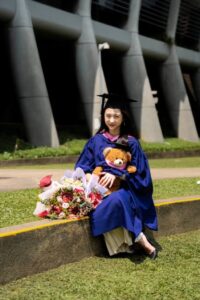 Ms Lau was in the fourth cohort of the PPE department (Philosophy, Political Science and Economics) at FASS, which she chose because "I wanted to do something in economics - it was my best subject." Prof Loy Hui Chieh (Arts & Social Sciences '98, MA '00), the head of PPE, was "a figure any PPE student could turn to. He was on Telegram and in all our group chats," she remembered. "If I ran into any problem, he would respond with help."
Ms Lau was in the fourth cohort of the PPE department (Philosophy, Political Science and Economics) at FASS, which she chose because "I wanted to do something in economics - it was my best subject." Prof Loy Hui Chieh (Arts & Social Sciences '98, MA '00), the head of PPE, was "a figure any PPE student could turn to. He was on Telegram and in all our group chats," she remembered. "If I ran into any problem, he would respond with help."
Being in a hall of residence fulfilled Ms Lau's other interests beyond academics. She credits Master of Temasek Hall Mr Victor Tan (Science '87, MSc '91) and Resident Fellow Mr Nisar Keshvani for creating "a lovely community."
Ms Lau was in the Temasek Hall dance club and its swimming team. She was also involved in the hall's yearly theatre production. "I'm someone who operates on a tight schedule," she admitted. "Being in hall and part of all the activities has shaped me in a way I didn't expect."
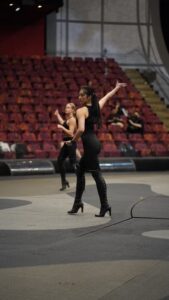 FOLLOWING THE FLOW
FOLLOWING THE FLOW
That Ms Lau performs in a world-class aquatic show seems only natural if one were to take a peek into her background. She began dancing at the age of 5, when she passed by a ballet school in a shopping mall and asked her mother to sign her up for classes. She pursued ballet all the way through secondary school, before exploring other areas of dance like jazz and contemporary dance. She also took rhythmic gymnastics in primary school. "During university, I worked as a freelance dancer. In 2021, I picked up aerial - to me it was a very natural flow," she added.
Ms Lau is cognisant of the fact that this is not a long-term job. "Being an aerialist or doing any kind of physical job, you definitely can't do it forever, right? But for now, I'm just really enjoying my time here in Macau. A lot of my fellow cast members have done other big shows, and I'm really enjoying training and learning from the people around me."
She added that she has been very lucky that no one has really commented that she has 'wasted' her degree. "I don't think it's a waste at all," she stated. "I think university is more like a whole package: going to school, building friendships, gaining education - these are like building systems I will take with me through life. It's essentially an experience that I will always carry with me. A degree is something that has shaped me - it's about the journey of learning."
This story by Theresa Tan first appeared in The AlumNUS on 30 October 2025.
Singapore’s AI push must not come at the cost of meaningful work
IN BRIEF | 10 min read
- By Dr Jonathan Sim, Associate Fellow at the NUS Teaching Academy and Lecturer in NUS Philosophy.
Click through image below to read this piece.
This story first appeared on CNA Online and on NUSNews on 21 August 2025.
AI’s challenge to universities: What happens when EQ trumps IQ?
IN BRIEF | 10 min read
- By Prof Simon Chesterman, NUS Vice Provost (Educational Innovation) and Dean of NUS College, and Assoc Prof Loy Hui Chieh from NUS Philosophy and Vice Dean (Academic Affairs) at NUS College.
Click through image below to read this piece.
This story first appeared in The Straits Times and NUSNews on 28 November 2024.
New Course Charts Interdisciplinary Paths to Effective Altruism
IN BRIEF | 10 min read
- HS2921 by Assistant Professor Martin Mattsson (NUS Economics) and Dr Joel Chow (NUS College) prepares students to craft and execute interdisciplinary solutions "to help others as much as possible."

'How can we best use our resources to help others? How do we ensure that our efforts are effective in improving the wellbeing of others? The newly launched course at the NUS College of Humanities and Sciences (CHS), HS2921 Effective Altruism in Theory and Practice, is devoted to teaching approaches to answering questions such as these along interdisciplinary (crossing Economics and Philosophy) lines.
We ask the creators and instructors of this course in its maiden semester this year - Assistant Professor Martin Mattsson (NUS Economics) and Dr Joel Chow (NUS College and the Philosophy, Politics and Economics Cross-Disciplinary Programme, PPE-XDP) - why they developed this course on Effective Altruism and why it needs to be interdisciplinary.
"'Effective altruism' is growing as a social movement globally, but there aren't many university courses on the topic," says Dr Mattsson, moving on to explain the need for interdisciplinarity. "A popular definition of Effective Altruism is to 'use evidence and reason to figure out how to benefit others as much as possible and taking action on that basis'. When trying to figure out how to benefit others, we inevitably have to deal with complex questions such as 'How can we best improve the lives of others?' and 'How can we reliably tell if our methods of benefiting others are effective?' To address these questions, one has to leverage multiple academic disciplines. So, while the course mostly draws on Philosophy and Economics, it also touches on subjects like Political Science, Psychology, Engineering, and Computer Science."
"Therefore, we believe it is a natural fit with the CHS common curriculum, as we hope to show students that to address complex real-world problems, we need to bring together insights from multiple disciplines and integrate them," adds Dr Chow, who further points out that the syllabus they crafted and the assignment they set reflect this approach. "For example, in their work on the group project students are expected to analyse an intervention using philosophical and economic tools, and bring together these disciplines to better examine, and ultimately evaluate, an intervention on its impact and ability to benefit others."
Equipping and Inspiring Students to Act on their OwnDr Mattsson and Dr Chow's syllabus for HS2921 seeks to train students in how to approach questions as a philosopher by evaluating non-empirical values such as our moral obligation towards the global poor, non-human animals and future populations. It also trains students in how to think like economists. For example, students are taught to identify situations in which markets can lead to good outcomes and in what situations interventions by governments or philanthropists are needed. Furthermore, the class encourages quantitative analysis using concepts such as expected value calculations and operationalised measures of human wellbeing such as quality adjusted life years.
"The main goal of the course is to provide students strategies for how to answer the question, 'How can I benefit others as much as possible?' and hopefully inspire some students to act on their own answers to that question," says Dr Mattsson. "To do this we discuss different theories for what constitutes morally good behaviour, basic economic logic and evidence, and finally we do a deep dive into three fields that many in the Effective Altruism community think are areas where one can benefit others a lot."
In examination of these three areas - welfare of the global poor, animal welfare and our legacy for future generations - with their students, Dr Mattsson and Dr Chow do not only just draw from the perspectives and ideas of other fields like social psychology and politics, but also call in major thought leaders, such as renowned utilitarian and Ira W. DeCamp Professor of Bioethics at Princeton University, Peter Singer, who delivered a lecture to their class early this month.
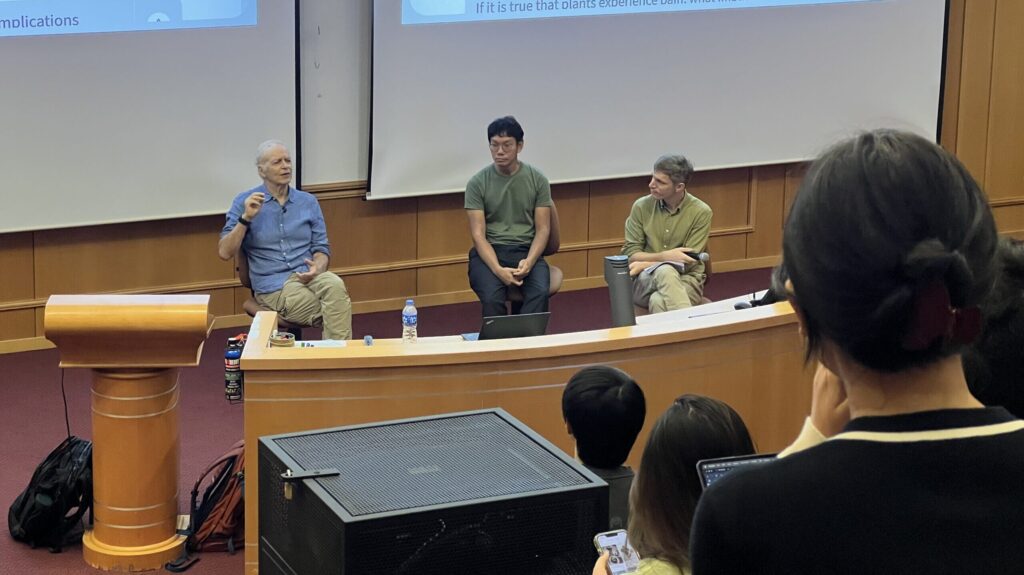
HS2921 is one of a few university courses in the world devoted to Effective Altruism and while that speaks well for its future popularity among students it also brought on unique challenges towards its launch.
Dr Mattsson explains. "Although Effective Altruism is growing as a social movement, there aren't many university courses on the topic and there are no textbooks. We are happy to teach the first university course on Effective Altruism, that we are aware of, in Asia, but it meant we had to create a lot of the materials ourselves," he says. This was challenging as some of the topics, like existential risks, are quite far away from our own research and teaching focus. Fortunately, there are lots of great materials like books, blogposts, and podcasts, created by people both inside and outside the effective altruism movement and we drew on these materials to create our course.
Dr Chow indicates another issue they had to contend with in the development of their course. "It is also always challenging to teach students from very diverse academic backgrounds and with very different interests, most of whom have no background in neither Philosophy nor Economics," he says. "We have tried to design the course so that students can follow their own interests and leveraging their own strengths by doing group projects and writing essays on topics of their choice. We hope that for some of the students these projects will be the first step towards a deeper engagement with these topics."
All their challenges aside, Dr Mattsson and Dr Chow have seen enrolment to their course this semester exceed their initial expectations and are encouraged to consider hosting a larger class in future. "This is the first year that we are teaching the course, so we really didn't know what to expect in terms of student interest. We had set a cap of 100 students and gotten a lecture theatre with capacity for that enrollment," says Dr Mattson. "We thought that this would be more than enough, but we were pleasantly surprised that more than 150 students tried to enroll in the course!"
"Yes, unfortunately we had to say no to some students due to space constraints," says Dr Chow. "But we intend to increase the number of students we can accommodate in future years and hopefully the interest among students will continue to be strong."
For more information on HS2921 go to Canvas (for NUS Students) or NUSMods.
Philosophy, AI, and mental health: Perspectives on World Philosophy Day
IN BRIEF | 10 min read
- Embodying On World Philosophy Day 2024 (21 November), NUS Philosophy faculty and students share their thoughts on the study of Philosophy and its role and currency in the world today.

Each year on World Philosophy Day on 21 November, people around the globe are invited to reflect on the role philosophy plays in shaping our understanding of the world.
Philosophy, meaning 'love of wisdom', is interpreted differently by different people, and this diversity of interpretation is one of its most enduring strengths. For some, it's an intellectual pursuit, a way of seeking deep truths about existence, morality, and knowledge. For others, it's simply a practical guide to living more meaningfully.
"Philosophy is an attempt to make sense of life, the universe, and everything, through human reason," says Associate Professor Loy Hui Chieh from the Department of Philosophy at the NUS Faculty of Arts and Social Sciences.
For final-year Philosophy major Christopher Chin, the understanding of philosophy challenges our norms and forces us to grow, while final-year History and Philosophy double major Sofia Marliini Heikkonen believes it offers the privilege of interrogating life.
Dr Daryl Ooi, a lecturer at the Department of Philosophy agrees, saying that, "Philosophy is one of the activities humans practice when we're trying to figure out how to relate and orientate ourselves to this exciting, complex and confusing world we live in."
Fundamentally, however, philosophy is a way of thinking that cuts to the heart of what it means to be human.
'Confucius says…'
The foundational ideas established by many great thinkers and philosophers like Socrates, Plato, and Aristotle have shaped our understanding of the world. These renowned philosophers pioneered the use of reason and logic to explore the workings of the universe while delving into the complexities of human morality.
Although Confucius lived around 500 BC, some 2,500 years ago, today he remains synonymous with wisdom and insights into life. The expression 'Confucius says...' is often cited when imparting general wisdom, exemplifying how philosophy transcends time and generations.
In the context of retaliation, for example - whether in war or conflict - one might consider Confucius' wise words before determining a course of action: 'Before you embark on a journey of revenge, dig two graves.'
"A common misunderstanding about philosophy is that it's purely abstract and impractical, dealing only with questions that have no real-world impact. In reality, many of the questions discussed in philosophy have significant real-world implications," said the Department's Assistant Professor Song Moonyoung.
A compass for the modern world
Some may question the relevance of philosophical thinking today given the proliferation of science and technology that comes with the promise to simplify our lives and even make decisions on our behalf. Philosophers, however, agree that as the world changes rapidly through technology and social upheaval, the role of philosophy will only grow in importance.
Dr Ooi believes that as long as humans continue to ask big and narrow questions about the world today and attempt to make sense of their beliefs, values, emotions and ideas, philosophy will continue to endure.
Likewise, Asst Prof Song believes philosophy is even more relevant in a time when science and technology are at the forefront. "Philosophy encourages us to consider the ethical implications of technological advancements, such as artificial intelligence (AI) and genetic engineering, and guides us in making thoughtful, responsible choices about their development and use," she says.
Assoc Prof Loy views philosophy as one part of a much larger repertoire now available to modern humanity. Its strength stems not from disregarding developments in other fields and domains, but from working in tandem with them. "Take artificial intelligence or AI for example. I have been drawn to research projects that look into how AI will affect education because it involves contributions from social science, data science, computer science and many others," he says.
Related to that is the complex task of developing a practical governing framework for the development of AI and, even more critically, the ethics of its application. Dr Ooi, himself a former student of Assoc Prof Loy, says that the intricacy of such tasks is precisely the reason we recognise the value of interdisciplinary education.
He explains, "We need specialists from different disciplines to work together - and philosophers certainly have much to contribute towards the development or shaping of any kind of moral framework that would support the development and application of AI. Get a philosopher in the room to ask questions about ethics and morality, or even what it means to be human. This will trigger some incredibly meaningful and important conversations, and sometimes, you may even get something like an answer!"
Assoc Prof Loy, who is also Vice Dean (Academic Affairs) for NUS College, adds that he sees philosophers as some of the most interested and equipped people to discuss complex issues, not necessarily by supplying any ready-made "moral framework", but simply by being people who are keen on thinking very carefully and working with experts from other technical disciplines.
Expanding on this perspective, Asst Prof Song, who specialises in the philosophy of art, notes that the increasing integration of AI into our lives invites us to reflect on what truly defines humanity. The answer may not lie in what we can do better than AI. Instead, what makes us special may indeed be our limitations, such as the fact that humans have physical bodies that inevitably age and perish.
She adds, "These limitations give human achievements - such as artwork - a completely different meaning, even if, on the surface, they may look similar to AI-created products."
In recent years, mental health has become another area where philosophy provides a unique lens through which we can understand and address psychological well-being. Commenting on the role of philosophy or philosophical ideas in mental health treatment or in helping people cope with mental health challenges, Dr Ooi highlights the increasing attention given to the therapeutic value of philosophical ideas.
He says, "The idea of 'care for the soul' and 'care for the self' is a historically important one that is of immense relevance for us today, and there are many important philosophical questions that we can ask that are highly relevant to issues surrounding mental health today. For instance, how do we understand the obligations individuals have to care for one another, should education systems have an ethical responsibility to ensure that students do not suffer certain harms, or how can individuals and societies understand values such as 'respect' and 'dignity' so that those values shape the way humans treat each other?"
Many of the tools employed in philosophy and the intellectual dispositions it nurtures have broad applications - particularly in instances where careful reasoning is needed or when navigating any situations without any clear precedents. This intellectual rigour is what has drawn some undergraduates to take up Philosophy to complement other fields of study, recognising the value of the discipline's critical thinking and reasoning skills.
Joan Lim, a final-year Philosophy and Life Sciences double degree student, was first introduced to Philosophy in secondary school.
Joan was part of the pioneering batch at the College of Humanities and Sciences and says she jumped at the opportunity to take two contrasting degrees, believing in the importance of an interdisciplinary education to gain a deeper understanding of our increasingly complex and interconnected world.
"I feel that the disciplines are complementary because science needs to be ethically applied, and the humanities benefit from the real-world grounding from the sciences. Fields such as AI and sustainability consider the best ways to apply science and technology such that harm may be reduced; a purely scientific approach may lack that moral analysis."
Armed with the insights gained from her philosophy studies, Joan is looking for a career that will allow her to contribute to the field of sustainability, another existential challenge for mankind. "I hope to provide an ethical and logical lens for analysing complex issues such as sustainability and AI, but also in the vein of the philosophical training that I have received here at NUS, one which is empathetic and kind," she says.
Marliini, who has always felt very strongly about diversity, representation and inclusivity, is looking for opportunities to build bridges within the communities around her. "I'm still discovering what exactly my career will look like post-graduation, and what excites me is the prospect of fostering environments where people feel empowered, accepted and connected."
Beyond its influence on society, Christopher believes that philosophy's teachings have made an impact on his personal relationships.
"The clarity and discernment that philosophy teaches us should be channelled towards goodness. It reminds us to be compassionate because as (Chinese Confucian philosopher) Mengzi suggests, all humans have the heart of compassion. Whatever the psychological pain, I believe being compassionate, empathetic, and present should be our first response," says Christopher, reflecting on the wisdom drawn from philosophy when dealing with friends and loved ones in need.
Enduring influence in shaping humanity
From artificial intelligence to mental health, philosophy offers a powerful lens for understanding and navigating the complexities of contemporary life. Whether for those immersed in academic inquiry or individuals looking for clarity in a fast-paced world, philosophy provides a space for thoughtful reflection, grounded in the search for truth and meaning.
Assoc Prof Loy has noted how students get to have a lot of intellectual fun reading philosophy while giving them leverage for other intellectual pursuits.
"Everyone stands to gain from the process of philosophical inquiry," says Marliini. "The skills we learn are beneficial far beyond academics because philosophy at its core teaches us how to hold space for different perspectives while maintaining the rigour to examine and articulate our own."
In the words of Peter Singer, one of the most highly regarded modern philosophers alive today, "Philosophy ought to question the basic assumptions of the age. Thinking through, critically and carefully, what most of us take for granted is, I believe, the chief task of philosophy, and the task that makes philosophy a worthwhile activity."
This story first appeared on NUSnews on 21 November 2024.
Kishore Mahbubani: In order to succeed in the global geopolitical competition, one must win over the Global South
IN BRIEF | 10 min read
- A report in Lianhe Zaobao of Distinguished Fellow of the Asia Research Institute Professor Kishore Mahbubani's discussion points at the second Asia New Vision Forum (25-27 September 2024).
Click through image below to read this piece.
This story first appeared in Lianhe Zaobao and NUSNews on 26 September 2024.
Going the Distance: NUS Athletes Scoop Up Medals and Degrees
IN BRIEF | 10 min read
- No matter the sport, being a competitive athlete is an exhilarating journey that can push you to your emotional, mental, and physical limits. Now, imagine going through all this while studying for a degree. Three student athletes who are graduating from NUS in July 2024 did just that, rising admirably to the challenge of balancing training, schoolwork, and competitions.
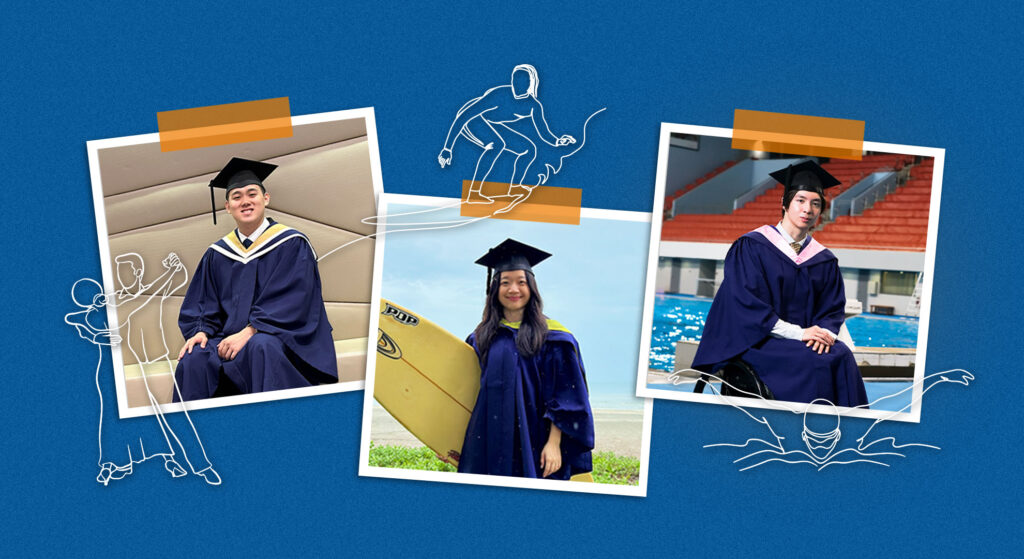
No matter the sport, being a competitive athlete is an exhilarating journey that can push you to your emotional, mental, and physical limits.
Now, imagine going through all this while studying for a degree. Three student athletes who are graduating from NUS in July 2024 did just that, rising admirably to the challenge of balancing training, schoolwork, and competitions.

Dancer Jerome Teo Sze Yong excels at displaying grace under pressure. At NUS, he was a national DanceSport athlete, President of Tembusu College's Students' Committee, and a double-degree major in Electrical Engineering and Philosophy, Politics and Economics (PPE) at the NUS College of Design and Engineering and NUS Faculty of Arts and Social Sciences respectively. In both student life and competitive ballroom dancing, this was his key secret: keeping perfect time.
"I tried to balance everything by knowing my priorities for each day, week and month," said Jerome, 26, noting the importance of time management.
With dates of competitions confirmed months in advance, Jerome could dance to the beat of his schedule. "When am I a student? When am I an athlete? Most of the time, the situation was not binary," he said.
Sometimes he needed to spend more time in the ballroom, while sometimes the lecture notes waiting to be reviewed required his immediate attention.
Juggling a packed schedule, Jerome had to navigate purposefully. When he went for dance practice, he set out to accomplish specific objectives, such as working on smaller sections of a routine, building stamina, or honing fundamental techniques.
When he ran into scheduling issues which simple time management could not solve, NUS swooped in to help. In his freshman year in 2019, Jerome and his dance partner - his younger sister, Rachel Teo Jia Hui, who was also an NUS student - represented Singapore at the Southeast Asian Games. They won a silver and two bronze medals, but Jerome missed his end-of-semester exams.
"I wanted to make sure I could pass the modules and not have to retake them the next semester," he recalled. "NUS was very supportive to make alternative arrangements, like make-up examinations at the start of the next semester."
Jerome is taking a hiatus from DanceSport, and he is now working as a digital design engineer, designing hardware for Internet of Things (IoT) devices, such as smart home devices and smart lighting. "At any point in time, if I want to resume dancing, I can always return to it," he added.
On 17 July 2024, Jerome will be graduating with Bachelor of Engineering (Electrical Engineering) with Honours (Highest Distinction) and on 19 July 2024, he will receive a Bachelor of Arts in Philosophy, Politics and Economics with Honours (Highest Distinction).

The most important thing about sports, said former competitive canoeist Kok Hui Wen, is to enjoy what you do. "As much as training is serious, it should be fun as well. It should fill you up," she remarked.
This was what drove the water sports enthusiast, who studied Nursing with a second major in Public Health, to join NUS Canoeing and also surf in her own time.
Hui Wen, who started competitive canoeing in junior college, credits the sport for developing her resilience and self-assurance. "It gave me the confidence to know that whatever hardships I am facing now, I have what it takes to overcome it," the 23-year-old said.
These qualities proved to be invaluable during her clinical postings as an NUS Nursing student. The first two years of Nursing studies were not easy for Hui Wen as she delved deeper into the complexity of the Nursing profession. The resilience that she developed from canoeing, her trust in her mentors, and the reassurance that she would eventually find her own footing in Nursing helped her navigate the period of uncertainty. "I am sure there's a place in Nursing for me and I could value-add to healthcare in my own special way," she reflected.
Keen to apply her healthcare knowledge to benefit the community, Hui Wen took on the role of Programme Head for Project Barrios, a nursing-led project that focused on providing health education for overseas and local communities. Initiated as an overseas Community Involvement Project, Hui Wen and her team restructured the project to serve underserved local communities during the COVID-19 period. They ran education programmes for the elderly, migrant workers and underprivileged children to raise awareness of common health ailments specific to each group and educate them on the prevention, early detection and community resources to mitigate these health risks.
The Nursing programme's hybrid learning approach, with a mix of online tutorials and lectures as well as in-person classes, made it easier for her to fit canoeing and surfing into her schedule. During the semester, Hui Wen would sometimes travel to Indonesia, Malaysia, the Philippines, and Sri Lanka to ride the waves.
She has retired from canoeing, but still does recreational water sports such as surfing. For now, she is looking forward to starting her new job as a nurse at the National University Hospital.
Hui Wen will be graduating on 14 July 2024 with a Bachelor of Science (Nursing) with Honours (Highest Distinction).

National para-swimmer Toh Wei Soong pulled off a stunning victory at the 2023 Hangzhou Asian Para Games, scooping up gold medals in backstroke, freestyle, and butterfly. But the competitions were not his only race against the clock.
Then a PPE undergraduate at NUS, he had spent the previous few years juggling classes and assignments on top of a gruelling training schedule for international competitions, including the Tokyo 2020 Summer Paralympic Games.
It was not easy. Wei Soong - who has Transverse Myelitis, a rare neurological condition affecting his lower spinal cord - had to take Leave of Absence to make time for swimming, and he also chose classes that best suited his training and competition schedule.
His passion for philosophy and interest in PPE since secondary school were what kept him going, said Wei Soong, who penned an Honours thesis on "A Wittgensteinian Solution to Vagueness", and helped set up an undergraduate student academic journal for Philosophy - The Red Stone - during his time as Deputy Director for Publications for the Republic, a PPE undergraduate journal.
"I am very glad these journals are continuing to serve our communities, and giving students opportunities to learn how the publishing system works and to commemorate the best student essays from each semester," noted the 25-year-old graduate of NUS Faculty of Arts and Social Sciences and NUS College.
As a PPE student, Wei Soong enjoyed interacting with his peers on complex and broad-ranging topics during class. "Overall, I did have a lot of fun in my undergraduate degree and a lot of fun in learning the subjects," he mused.
After more than a decade as a student athlete, Wei Soong, who is gearing up for the Paris 2024 Summer Paralympic Games, will be focusing on swimming and savouring life as a full-time athlete.
On 19 July 2024, Wei Soong will be graduating with a Bachelor of Arts in Philosophy, Politics and Economics with Honours (Merit).
This story first appeared in NUSNews on 12 July 2024, as part of a series covering Commencement 2024, and celebrating the achievements of NUS graduates from the Class of 2024.
Are our Singaporean Youths Ready for the Working World?
IN BRIEF | 10 min read
- Column on CNA Online by Jonathan Sim, Associate Fellow of the NUS Teaching Academy and Lecturer from NUS Philosophy.
Click through image below to read this piece.

This story first appeared in The Straits Times and CNA Online on 9 April 2024.
NUS Open House 2024 Attracts more than 8.4m visitors as Screens and Campuses Buzz with Action
IN BRIEF | 10 min read
- Open House 2024 returned to an enthusiastic reception as visitors turned up in force to experience one of NUS' largest events of the year. Held in a hybrid format from 2 to 9 March 2024 and pulled together by the efforts of 2,674 faculty, staff, students and alumni, the event attracted more than 8.4 million visitors - up from 7.7 million in 2023 - as they explored the comprehensive showcase of what NUS has to offer both online and in-person.
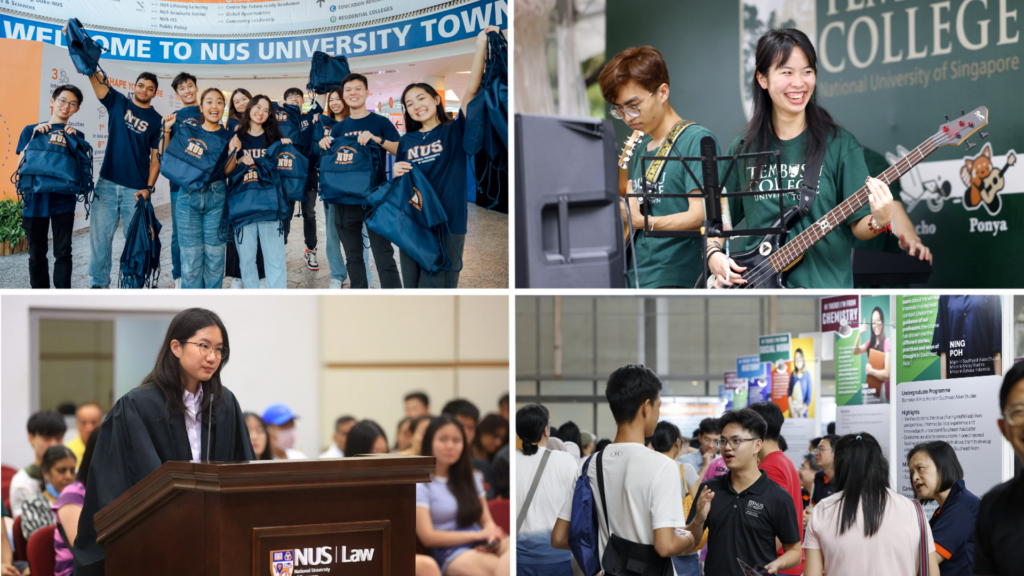
Open House 2024 returned to an enthusiastic reception as visitors turned up in force to experience one of NUS' largest events of the year. Held in a hybrid format from 2 to 9 March 2024 and pulled together by the efforts of 2,674 faculty, staff, students and alumni, the event attracted more than 8.4 million visitors - up from 7.7 million in 2023 - as they explored the comprehensive showcase of what NUS has to offer both online and in-person.
Kicking off the eight action-packed days was a slate of engaging virtual talks, webinars, and social media sessions. NUS Business School put together an informative line-up of virtual sessions featuring an Ask-Me-Anything session with its Vice Dean Associate Prof Chng Chee Kiong, an overview of the various majors with insights from faculty and students alike, and a glimpse of its vibrant student life via the Bizad Club.
At the online showcase by NUS Computing, prospective students joined a Discord live chat to get their questions answered by professors and student ambassadors on topics such as the differences between the school's five degree programmes. During a Zoom session by NUS Global, they heard about the University's exciting study abroad opportunities from students who embarked on exchange programmes with universities in Scotland, Canada, Switzerland and Hong Kong.
The on-campus segment on 9 March saw crowds throng the programme booths, talks, special classes, campus tours, student life performances and residential venues, with students gaining perspectives into all aspects of a world-class education at NUS, from the comprehensive curricula and career prospects to student life and global opportunities.
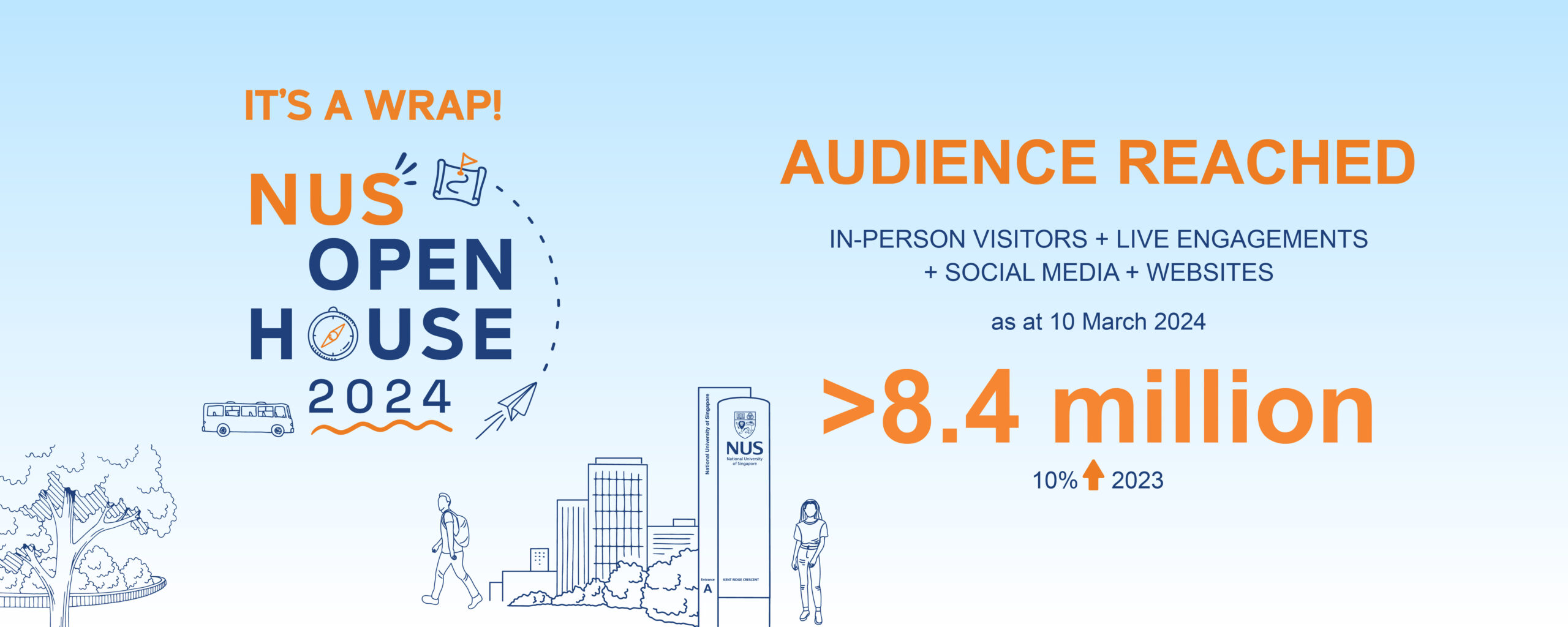
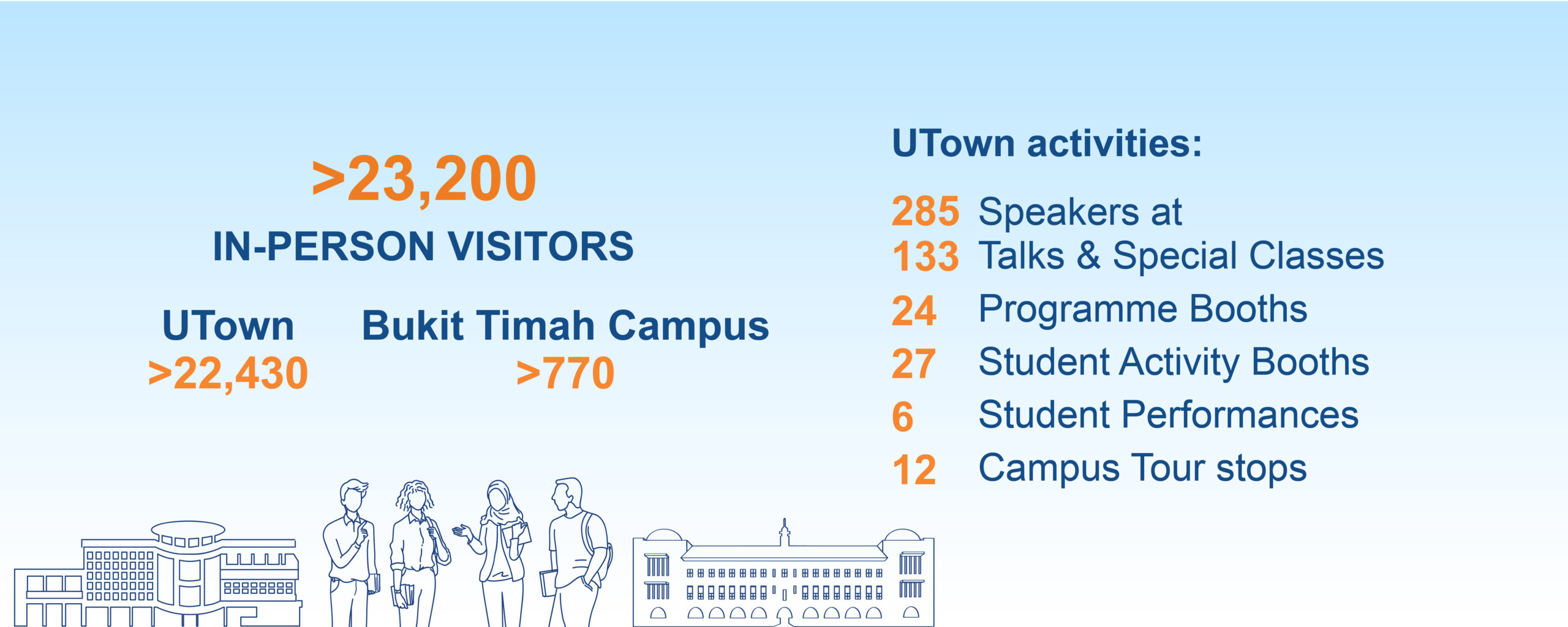


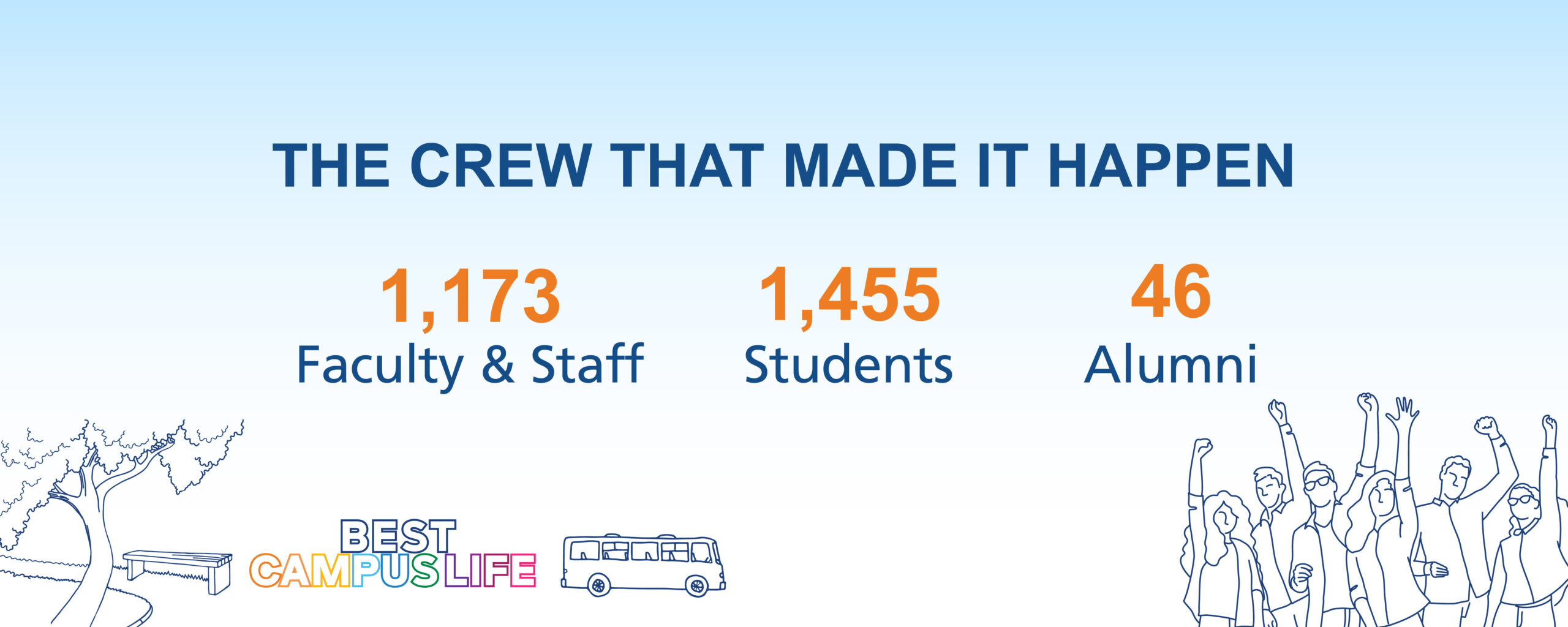 "The NUS Open House was an absolute delight! It provided me with invaluable insights into campus life and academic offerings," said prospective student Sim Wen Hao, who is currently in national service. "From informative discussions to first-hand testimonials, every interaction left me feeling more confident about my potential home away from home."
"The NUS Open House was an absolute delight! It provided me with invaluable insights into campus life and academic offerings," said prospective student Sim Wen Hao, who is currently in national service. "From informative discussions to first-hand testimonials, every interaction left me feeling more confident about my potential home away from home."
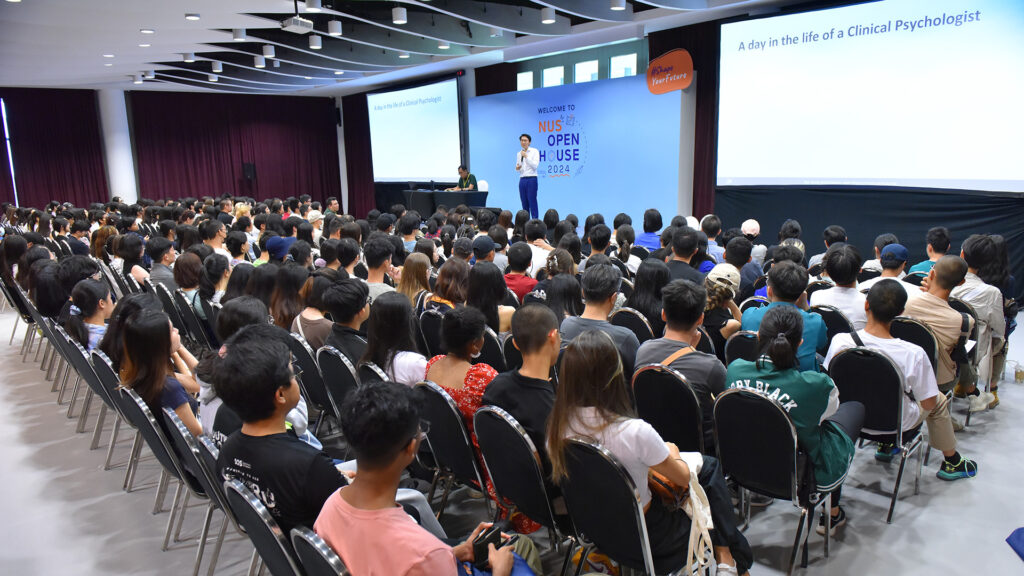
Charting pathways in humanities and sciences
The College of Humanities and Sciences (CHS), comprising the Faculty of Arts and Social Sciences (FASS) and the Faculty of Science (FOS), showcased how it is equipping students with skills to integrate knowledge across these domains and the wide range of programmes they can choose from through a variety of major and minor combinations.
An FASS panel featuring a Geography major, a Political Science major with a minor in Economics, a Philosophy major pursuing a Double Degree, and a Southeast Asian Studies major taking a minor in History dispelled misconceptions about their disciplines while discussing the potential career paths. Another joint talk by Psychology and Social Work on addressing mental health challenges in the 21st century explored how the issue is approached from their respective disciplines.
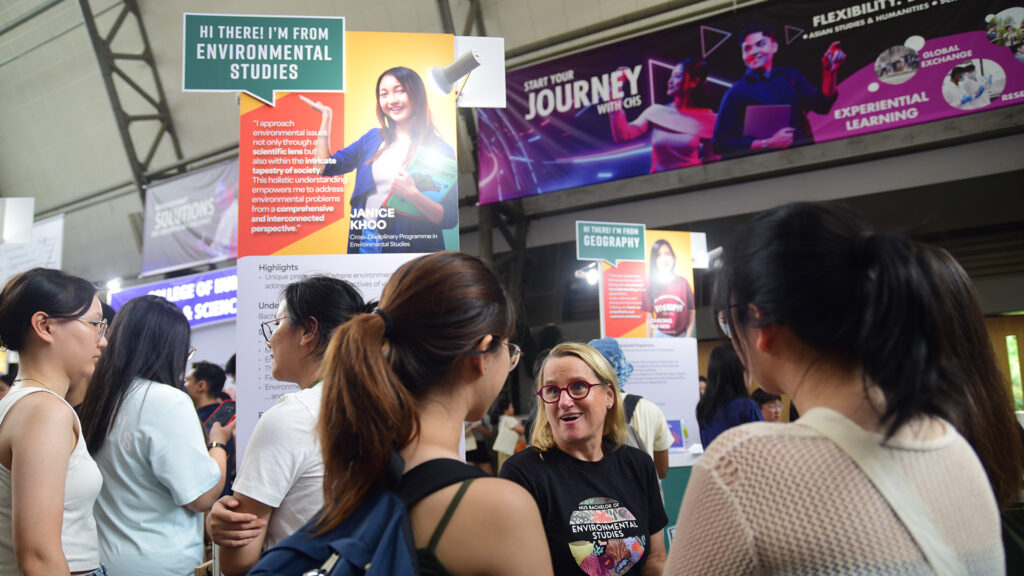
The boom in big data was the focus of the Data Science and Analytics talk that highlighted how the programme offers students industry exposure through real-world projects and internships. Another talk by the Environmental Studies Cross-Disciplinary Programme discussed its mission to develop environmental sustainability advocates keen to derive creative solutions to complex problems, along with its exciting fieldwork opportunities.
Lee Sue Ning, a Hwa Chong graduate who is interested in applying to Psychology, said of the FASS student panel: "The four students were from courses that I would never have considered. Hearing their experiences opened new doors for me, making me consider these courses as possible minors that I can take," she added.
Intersection of design and engineering
The talk on Chemical Engineering, Materials Science and Engineering, and Biomedical Engineering, held by the College of Design and Engineering (CDE) gave students valuable insights on the curriculum and disciplines, as well as showcased students' research. In an Ask-Me-Anything panel, the professors also shared about the flexibility of the curriculum, future career prospects, intersections between the various fields of engineering, and their thoughts on the most challenging yet rewarding aspects of taking a degree in Engineering.

The talk on Architecture, Industrial Design, and Landscape Architecture gave students the inside scoop on how the programmes provide the core foundation, training, skills, and knowledge for students to become the next generation of effective and innovative architects and designers.
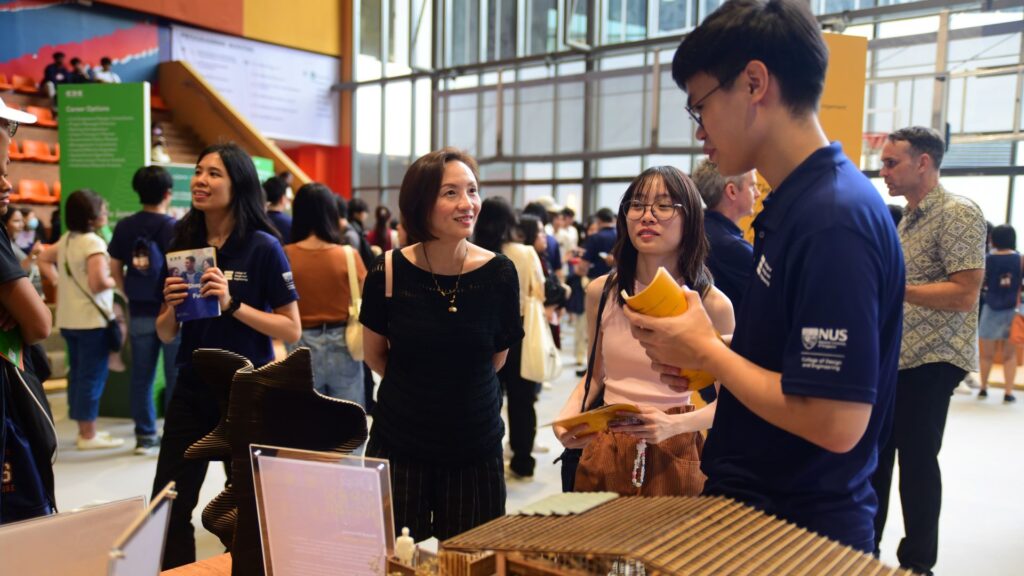
Over at SDE3, CDE's Built Environment Research Tour took participants behind the scenes-from live demonstrations of how 5G robotics reduce manpower and increase efficiency, to a lab tour of NUS' hydraulics laboratory facilities to explore wave mechanics and how natural coastal ecosystems like mangroves can protect shorelines against climate change. Students also participated in a hands-on session to design their own shoreline adaptation, choosing from models of nature-based solutions as well as traditional infrastructure.
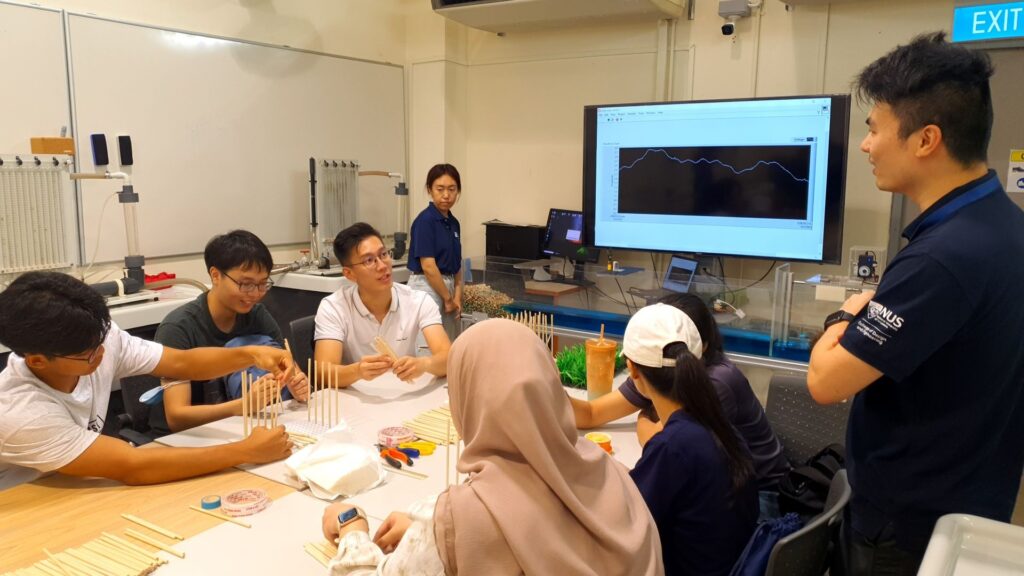
"It was nice to be able to see the facilities and get an idea about what Singapore is currently trying to improve on-designing a world with humans and robots, and coastal protection," Nur Annatasyia Binte Joferi, from Singapore Polytechnic, said. "It made me think about how things will progress and what comes next after those goals are met."
Immersive learning experiences
NUS College offered prospective students a window into its extensive interdisciplinary education that blends small-group seminars with experiential learning and a rich residential immersion through special classes on topics such as love, food, and even Shakespeare's plays. During Dr Chan Chi Wang's class on quantifying facial attractiveness using mathematics and statistical methods, prospective students busily plotted measurements of facial features on graph paper. In Associate Professor Stuart Derbyshire's class, they decoded mysterious sounds and intriguing illusions - sometimes with the aid of 3D glasses - understanding the science behind brain mechanisms that influence our perception.
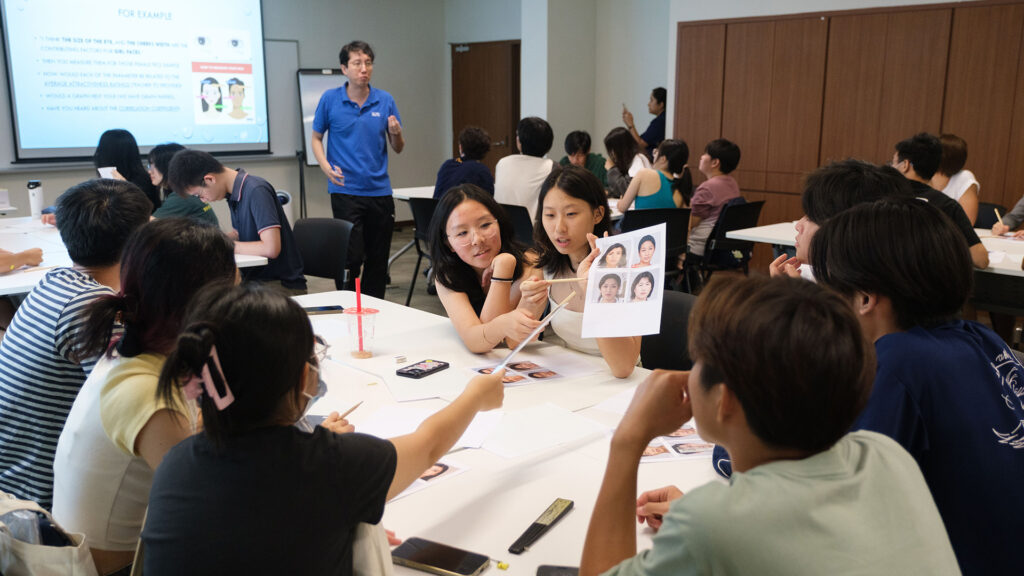
Foo Jun Wei, a Hwa Chong Institution graduate who will be joining Computer Science and NUS College, came away with useful information on what to expect as an incoming NUS student. "I enjoyed taking part in the guided tour where I got to see first-hand the facilities and accommodations that NUS College provides, as well as the immersive sample lesson on quantifying facial attractiveness. Above all, I was glad to be able to clarify my existing doubts and seek advice from the friendly student ambassadors on the ground," he added.
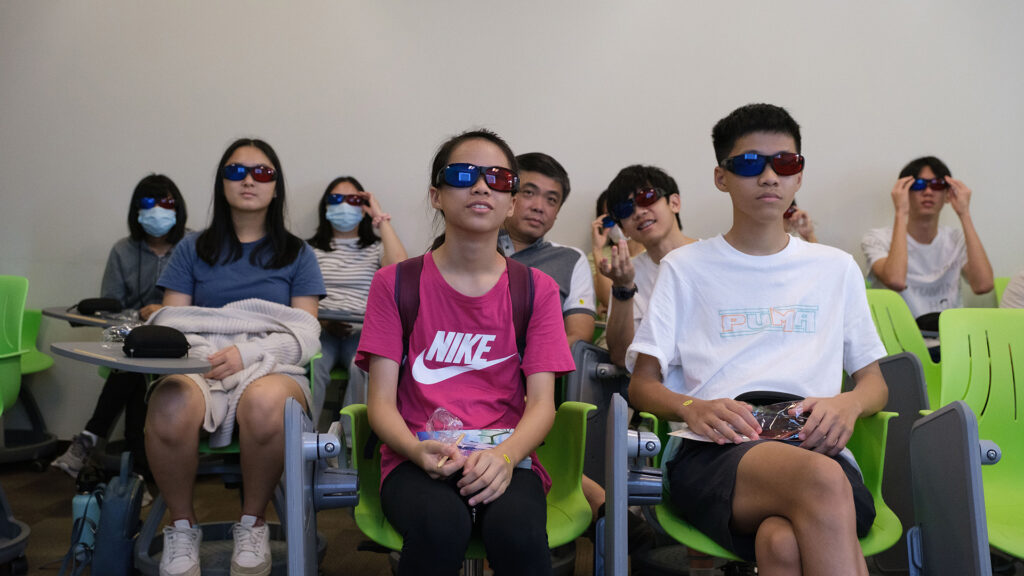
Over at Bukit Timah Campus, visitors to NUS Law had the choice of two masterclasses on criminal justice and conflict resolution approaches. At its mock moot sessions, visitors sat attentively in the gallery witnessing a simulation of a court case.
Mastering the 'heart' and science of healthcare
Prospective students interested in Medicine, Dentistry, Nursing and Pharmacy had the chance to find out about the new Common Curriculum for Healthcare Professional Education, which has been designed to align with Singapore's shift towards preventive healthcare. Aside from touching on the Common Curriculum, talks by NUS Medicine offered an overview of its academic journey, highlighting features such as its strong mentorship support and Pathway programmes aimed at broadening their skill sets. During a special class by NUS Nursing, visitors tried out basic nursing skills like using a stethoscope and learnt the importance of collaboration between healthcare professionals.

Prospective students interested in Medicine, Dentistry, Nursing and Pharmacy had the chance to find out about the new Common Curriculum for Healthcare Professional Education, which has been designed to align with Singapore's shift towards preventive healthcare. Aside from touching on the Common Curriculum, talks by NUS Medicine offered an overview of its academic journey, highlighting features such as its strong mentorship support and Pathway programmes aimed at broadening their skill sets. During a special class by NUS Nursing, visitors tried out basic nursing skills like using a stethoscope and learnt the importance of collaboration between healthcare professionals.
The interactive Pharmacy masterclass, titled "Unveiling the Pillars of Pharmacy: The Science and Art of Medication Therapy", saw prospective students participate in the decision-making process of a real-life clinical case study. They also gained insight into how NUS Pharmacy structures its curriculum to incorporate live interactive classes, science practicals, skills labs, and collaborative learning workshops, to help students apply concepts in real case studies.
Prospective student Wong Hon Wei from Anderson Serangoon Junior College said, "The Pharmacy masterclass was quite enjoyable yet unique, as the way the collaborative learning workshop was structured was engaging, incorporating the Biology and Chemistry concepts learnt in classrooms into real-world medical applications."
Innovating solutions for society and the world
Another popular feature at this year's Open House was the Innovation and Impact Hub, which showcased groundbreaking projects by students from CDE, Chua Thian Poh Community Leadership Centre, NUS College, and FOS that are making a tangible impact on society and the world.
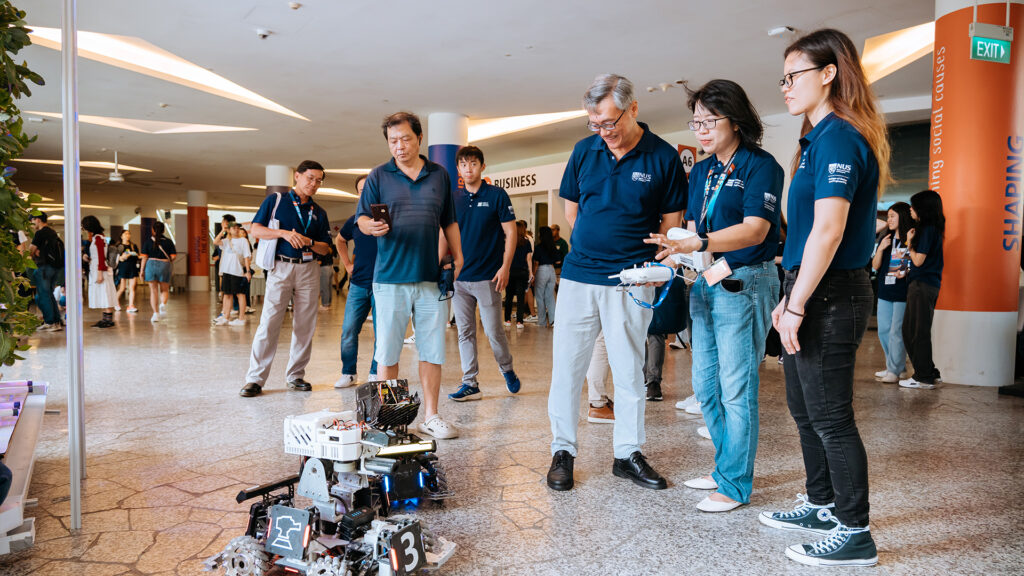
Visitors caught the interactive projects in action, from The Moving Farm, a movable modular tower system for hydroponics farming that increases crop yield sustainably, to TinkerThings, a project on AI-based gamified activities innovated to improve seniors' mental wellbeing and cognitive faculties.
Aside from exploring academic pathways, visitors also discovered NUS Enterprise's suite of entrepreneurship initiatives, including the NUS Overseas Colleges, NUS Enterprise Summer and Winter Programmes in Entrepreneurship, and incubation hub THE HANGAR.
At a panel session on student entrepreneurship, prospective students heard from NUS alumni who founded three start-ups - Pitchspot, Wateroam and Skilio. The founders shared how their involvement in Enterprise's entrepreneurship programmes and the support they received through the HANGAR enabled them to nurture their business ideas.
Exciting array of student and residential life activities
Over at the Student Village, a smorgasbord of vibrant student performances took Town Plaza by storm throughout the day, treating visitors to an exhilarating kaleidoscope of talent from student clubs and interest groups.
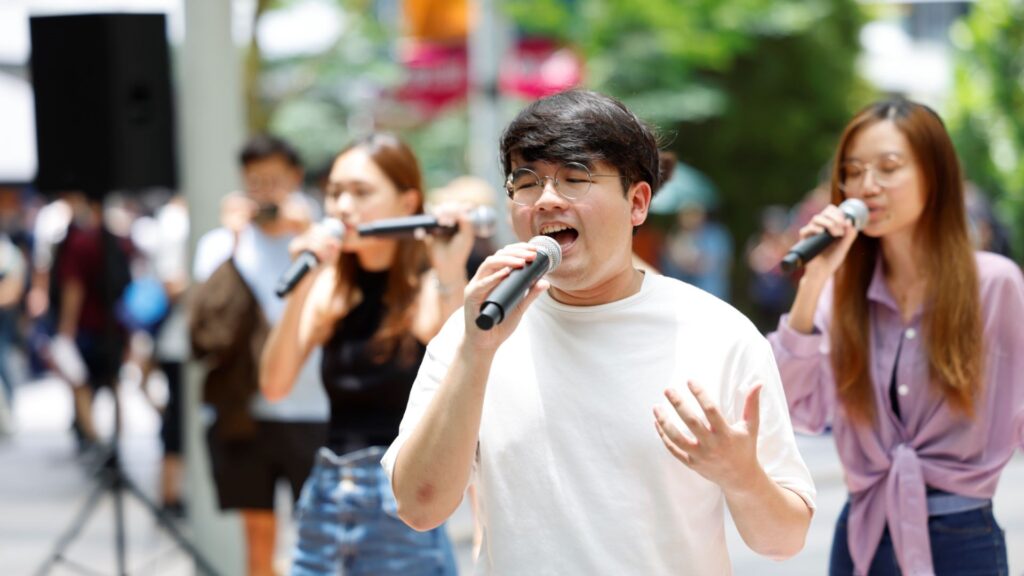
Getting a glimpse of the diverse student life opportunities that await, visitors were hyped up by the energetic cheerleading displays of King Edward VII Hall's KE Titans, the snazzy beats of NUS Rappers, and the slick dance moves of the NUS Korean Cultural Interest Group. They were also serenaded with catchy tunes from the Sheares Hall band, a capella group NUS Resonance, and NUS Fingerstyle Guitar.
On top of A-Day-in-the-Life videos and 360° virtual tours of the various Residential Colleges, Halls, and Houses, Masters and student representatives from the residences mingled with prospective students at the booths, talks, and Ask-Me-Anything panels, where they shared their insights and anecdotes on the on-campus experience, as well as the distinct culture of each residential unit.
Along with offering guided in-person tours and simulated classes, the residential units also showcased the interest groups available. Other engaging activities, such as Tembusu College's live performances and Ridge View Residential College's sports experience zones, coffee pour demonstrations, and warli art making gave prospective students a taste of the many facets of holistic residential life.
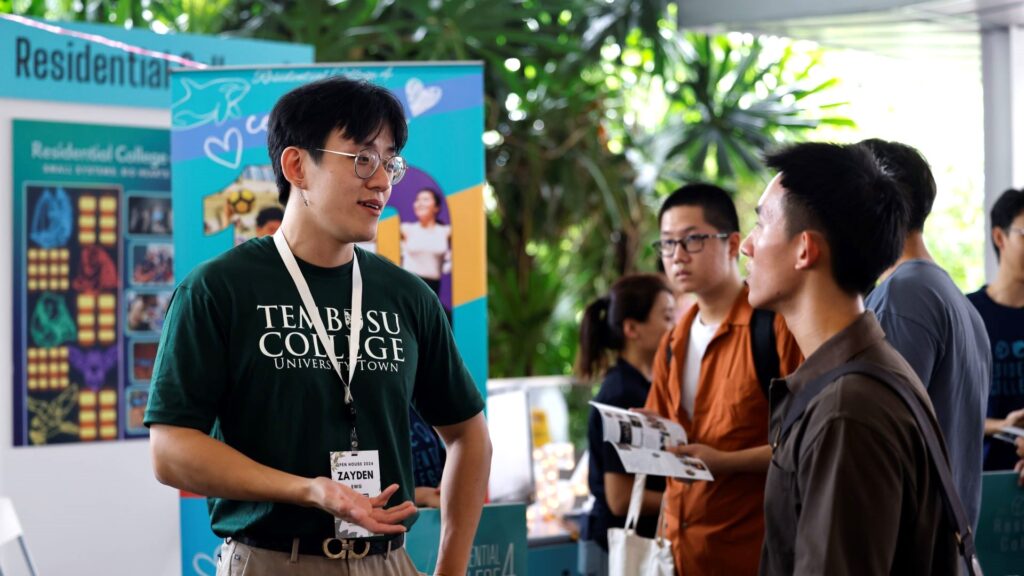
Prospective students Inez Ang from National Junior College and Vishnu Raj from Millennia Institute said the residential showcase gave them a better picture of living on campus.
Runyi Zhang, a graduate of St Andrew's Junior College who is applying to Business, said she had an enlightening experience sampling both the academic and extracurricular options. "Through the Open House, I've managed to capture a glimpse of student life in NUS… allowing me to have a clearer and more vivid image of what my future could be like here," she added.
This story first appeared in NUSNews on 14 March 2024.
Let Our Shared Passion for Science and Engineering Shape the World Around Us
IN BRIEF | 5 min read
- NUS News speaks to two young women in NUS who share a common passion for STEM (Science, Technology, Engineering, and Mathematics), and who are determined to make a difference in their respective fields.
Four NUS researchers from the Faculty of Arts and Social Sciences (FASS) were honoured for their early career contributions to the field of psychology in the Association for Psychological Science's (APS) 2024 Awards.
Associate Professor Sacha Epskamp received the Janet Taylor Spence Award for Transformative Early Career Contributions, which honours particularly creative and promising APS members who embody the future of the field. As part of the win, Assoc Prof Epskamp will automatically receive APS Fellow status in the review cycle following his award.
Assistant Professors Adela Isvoranu, DongWon Oh, and Steven Pan were named APS Rising Stars, recognising outstanding APS members in the earliest stages of their research careers post-PhD. The designation is conferred on early-career researchers whose innovative work has already advanced the field, signalling great potential for their continued contributions.
The Association for Psychological Science is an international association headquartered in Washington, DC, with over 25,000 members globally. Its awards are conferred on members who have contributed significantly to the field of psychology at various stages in their careers, and recipients hail from a broad range of prestigious institutions including Ivy League universities.
The four Psychology researchers join other NUS faculty members who have been recognised by APS in the past including Assoc Prof Eddie Tong from FASS, Prof Sam Yam and Asst Prof David Peter Daniels from NUS Business School, and Asst Prof Reuben Ng from the Lee Kuan Yew School of Public Policy at NUS.
Janet Taylor Spence Award for Transformative Early Career Contributions: Assoc Prof Sacha Epskamp
Assoc Prof Epskamp said he was thrilled to receive the Janet Taylor Spence Award, noting: "APS is a world-leading association with thousands of members, active in every subdiscipline of psychological science. To this end, this is a very prestigious and highly selective award to receive. It is a great honour to have my early career contributions recognised as such."

International Women's Day, observed on 8 March, is a global occasion that celebrates the resilience, achievements, and empowerment of women. As we honour the strength, wisdom, and indomitable spirit of women who continue to shape our world, NUS News speaks to two young women in NUS who share a common passion for STEM (Science, Technology, Engineering, and Mathematics), and are determined to make a difference in their respective fields.

On the nature of luck and the transformative power of catalysts
Assistant Professor Iris Yu believes that the quest for personal knowledge and self-discovery is not an easy task. But it is an important process that can guide one's life work and lead to individual fulfilment. Analysing one's childhood predilections and propensities, as well as the feedback received from teachers and peers, can be especially instructive, she said.
"When I was a little kid, I enjoyed watching documentaries about the natural and physical world, such as those on animals and space. I knew that I wanted to do something related to the environment," she said. But it was only in school that this interest gained traction and direction.
Luck played an outsized role too, she recounted. She had the good fortune to encounter not one, but two chemistry tutors in secondary school who solidified her desire to pursue a career in STEM. "They made chemistry seem like magic - and showed us that everything can be created with chemistry."
Asst Prof Yu, who joined the Department of Civil and Environmental Engineering in the NUS College of Design and Engineering in 2023, said that even though the journey may seem circuitous, "it's absolutely alright to follow at your own pace."
"I came across the field of green chemistry during my PhD studies in Environmental Engineering. This aligns with my interest in both chemistry and environmental protection." Her current area of research focuses on understanding the effects of microwaves within a catalytic system, and converting food waste into useful chemicals efficiently.
Asst Prof Yu's ground-breaking research recently earned her a spot on MIT Technology Review's Innovators Under 35 (TR35) Asia Pacific list in 2023.
"I consider myself lucky and did not encounter extreme difficulties. As an early career researcher, doubts and failures are normal. I tend to take the constructive feedback and improve myself and my work and leave the negativity behind. I hold on to the belief that 'there must be solutions'. This helps me face problems, failures, and rejections."
While hard work and resilience is important, there are factors beyond one's immediate control that can shape a life's trajectory. "I must say I am very lucky that I've got to work with very supportive and outstanding supervisors or mentors at different stages of my career. Their sharing and advice have added new perspectives to my thinking."

A devotion to the spirit of scientific inquiry
Chaithanya Laxminarayan, or Chai, is a curious and ambitious student who wants to understand how the universe works.
Chai's interest in understanding the physical world began early in her childhood. She recalls being fascinated by questions like: "Where does everything come from? How does it all work?" Theology was a natural starting point. Slowly, she gravitated towards the disciplines of Science and Philosophy, drawn by the rigours of the scientific method and analytical thought.
She soon found a home for her diverse interests in NUS. The third-year student in the NUS College of Humanities and Sciences (CHS) is currently pursuing a double major in Physics and Philosophy. She is also undertaking a year-long independent research project in Physics, at Associate Professor Alexander Ling's Spooqy Lab in the Centre for Quantum Technologies. Broadly put, Chai is working on improving the efficiency of a silicon chip single photon (light particle) source.
"The fusion of Physics and Philosophy resonates perfectly with my interests. Physics teaches one how to describe the universe with its useful methods and mathematical language. Philosophy, on the other hand, gives you tools to derive meaning and understanding of the workings of the world from these descriptions," she shared.
As a CHS student, Chai enjoys the varied opportunities to combine her scientific rationality with philosophical inquiry. "I am very grateful for being able to explore different disciplines. I have taken Math, Computer Science, and even South Asian Studies classes, along with Physics and Philosophy. This broad exposure expanded my mind and values."
Her parents, who had STEM backgrounds and jobs, are supportive of her wide-ranging interests, and Chai is also grateful for the opportunities to interact with and study under many brilliant women. For young women who are considering to embark on a journey in STEM fields, Chai shares this advice, "You're the only one who gets to define your limits. So, explore and pursue what you choose, on your own terms. University is an opportunity to learn about various disciplines, join different groups, and know your interests and priorities better. Allow those experiences shape your path ahead!"
This story first appeared in NUSNews on 7 March 2024.
Commentary: How can Singapore keep up with the unique needs of prodigies?
Singapore’s education system is notorious for its rigour and quality, with Singaporean students consistently performing well in international assessments, such as the Programme for International Student Assessment (PISA) and the Trends in International Mathematics and Science Study (TIMSS). Yet, there are some who surpass the demanding requirements of the education system – most recently, a 13-year-old prodigy who has already graduated from a university in Australia. This incident has sparked a discussion about how these ‘prodigies’ ought to be taught in schools. In “Commentary: How can Singapore keep up with the unique needs of prodigies?” (Channel NewsAsia, January 2024), Jonathan Sim (NUS Teaching Academy and NUS Philosophy) discusses the shortcomings of the Singapore education system in engaging these exceptional students, arguing that more can be done to nurture their full potential. Sim acknowledges the difficulties of simultaneously managing students of differing abilities and learning needs, having experienced this challenge himself. In response, he suggests several engagement strategies, for educators to use this diversity to enhance learning instead. He advocates for the benefits of peer-to-peer teaching, allowing for slower learners to review concepts, for faster learners to learn to explain them simply, and for all students to form friendships as a result. He also suggests that educators become more open to co-creation opportunities with fast-paced students, allowing them to partake in the lesson planning process. Read the article here: https://www.channelnewsasia.com/commentary/prodigies-gifted-children-university-school-system-challenges-balance-4064776
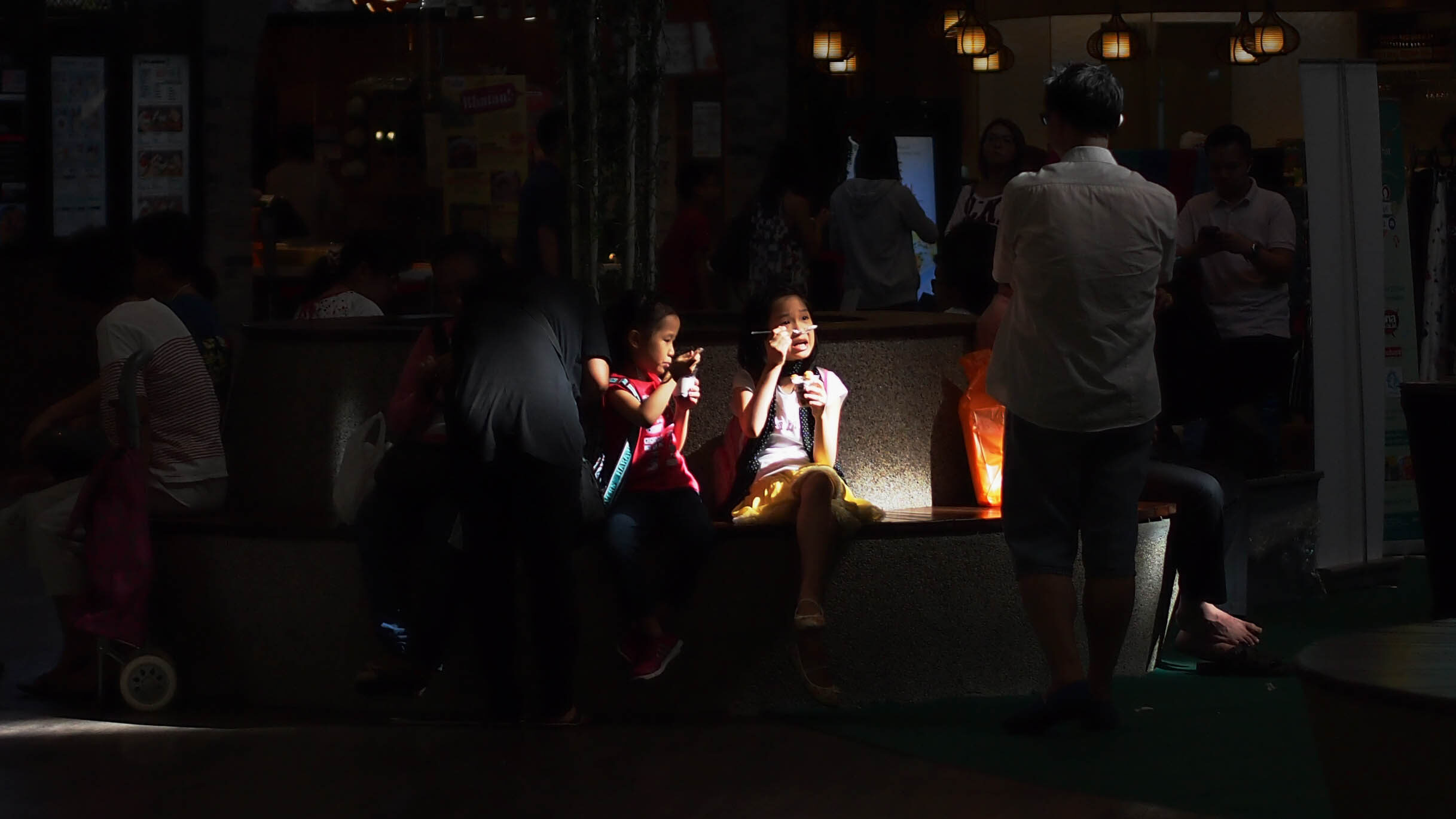
Commentary: How Hustle Culture is Robbing Our Youths of Self-Discovery
Amidst the hustle and bustle of life in Singapore, meditative activities like introspection often take a back seat. In ‘Commentary: How Hustle Culture is Robbing Our Youths of Self-Discovery’ (Channel NewsAsia, January 2024), Dr Jonathan Sim (Lecturer, NUS Philosophy) delves into the silent crisis surrounding youths’ inability to engage in self-reflection due to their relentless pursuit of productivity.
Through the use of compelling anecdotes, Dr Sim identifies a core issue: youths’ constant chase of tangible achievements, such as grades and accolades, leaves little room for self-reflective practices. Despite the perception that these activities are unproductive in a society that values measurable outcomes, Dr Sim argues that engaging in introspection is actually crucial for fostering emotional maturity and growth.
Dr Sim posits that our digitally connected world serves as a constant distraction. Coupled with the demands of daily life, he suggests that young Singaporeans often feel too busy to self-reflect. He observes that the lack of reflective practice then contributes to students’ mental stress and compounds the pressure they put on themselves.
To combat this, Dr Sim advocates for the integration of structured reflection sessions into educational settings. He employs the ‘Model of Reflection’ which involves three simple yet profound questions: 1) ‘What?’, 2) ‘So what?’, 3) ‘And now what?’. Through his experiences using this model to encourage his students to reflect, Dr Sim believes that incorporating this reflective model into educational settings can kickstart a habit of regular introspection.
In conclusion, Dr Sim emphasizes the need to shift from a culture of relentless doing to one of meaningful becoming. He envisions this change as crucial for nurturing emotionally resilient individuals who are capable of navigating life’s complexities. The article hence serves as a poignant reminder of the importance of self-reflection in personal development, all while calling for a societal re-evaluation of our priorities in order to support the holistic growth of Singapore’s younger generation.
Read the article here.

Commentary: Is Singapore’s complaint culture helping us or hurting us?
The frequent act of complaining has been characterised as a defining trait of Singaporeans, from moaning about the incessant heat and humidity, to grumbling about rising inflation or increasing the Goods and Services Tax (GST). While complaining is commonly understood to be a negative way of speaking, there might be another side to complaining that could actually benefit people. Mr Jonathan Sim (NUS Teaching Academy & NUS Philosophy) explores the various implications of complaining in ‘Commentary: Is Singapore’s complaint culture helping us or hurting us?’ (Channel NewsAsia, January 2024). Sim argues that the outcomes of complaining, whether positive or negative, stem from how the complaining is intended to be used. He recommends that instead of abstaining from complaining altogether, we ought to adopt a more introspective approach to complaining, aiming to share our complaints in a productive manner. Sim demonstrates how complaining has been a tool for bringing people together, galvanising them through their shared experiences, and improving their moods. He also remarks on how complaints have been used constructively in many situations, highlighting their use in pointing out issues and fuelling progressive changes. Nevertheless, he cautions against complaining too much, as the practice easily becomes a counter-productive habit. Read the article here: https://www.channelnewsasia.com/commentary/singapore-complaint-culture-habit-happiness-social-media-4026816

How Hustle Culture is Robbing our Youths of Self-Discovery
IN BRIEF | 10 min read
- Op-Ed on CNA Online by Mr Jonathan Sim, Associate Fellow of the NUS Teaching Academy and Lecturer from NUS Philosophy.
Click through image below to read this piece.
This article first appeared on CNA Online and NUSNews on 1 January 2024.
Developing a Deeper Appreciation for Classical Chinese Philosophy…in English
IN BRIEF | 8 min read
- Offered in the first semester of every academic year (AY), PH2301 Classical Chinese Philosophy I (PH2301) delves into the ethics and politics of the great Chinese philosophers such as Confucius, Mozi, Yang Zhu, Mencius and Laozi.
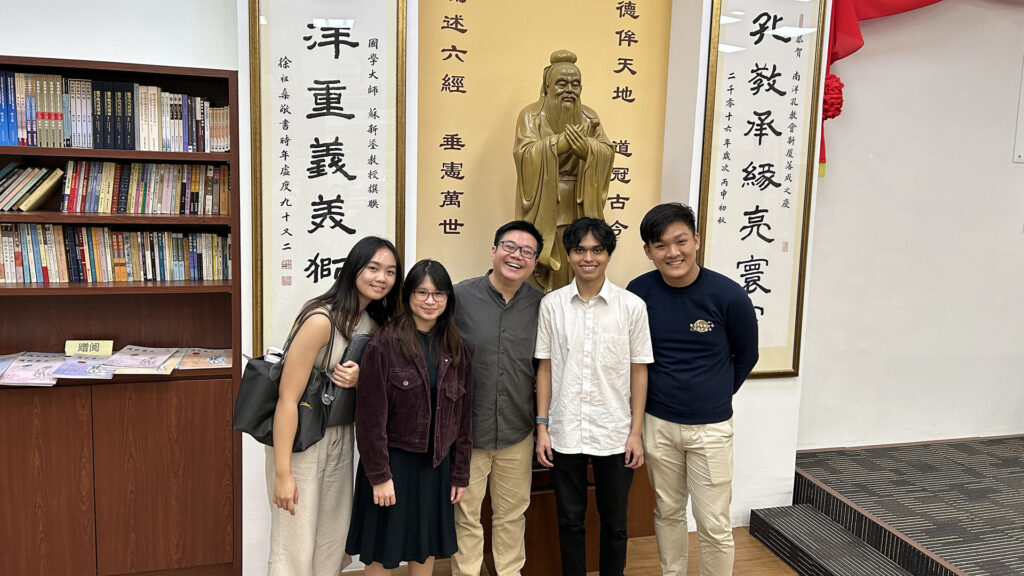
Any attempt to understand Chinese philosophy - an intellectual tradition that spans four thousand years - can be a daunting task for the average person. More so for those who jiak kantang - a colloquial term for Singaporeans who grew up with predominantly Western influence - or those unfamiliar with the Chinese language and culture, observes NUS philosophy lecturer Mr Jonathan Sim. According to him, it was a desire to open up the study of the tradition to a broader swathe of students that motivated the NUS Department of Philosophy to offer a course on classical Chinese philosophy in English since the 1990s.
The NUS alumnus recounted, "I grew up speaking mostly English and struggled with Chinese, but I was able to learn Chinese philosophy as a student 10 years ago thanks to professors who were passionate about teaching it in English then."
Fast forward to 2022, when Mr Sim jumped at the chance to pay it forward with a group of students who were keen on learning Confucianism in English, through a summer course birthed from NUS' Design-Your-Own-Course programme.
He said, "I was inspired by the students' interest and enthusiasm to learn more about Chinese philosophy and its influence on the modern world, particularly on modern Singapore's culture and policies, that when the opportunity arose for me to teach a course titled Classical Chinese Philosophy I, I took it without hesitation!"
Offered in the first semester of every academic year (AY), PH2301 Classical Chinese Philosophy I (PH2301) delves into the ethics and politics of the great Chinese philosophers such as Confucius, Mozi, Yang Zhu, Mencius and Laozi.
The course is not as common as one might expect noted Mr Sim, given that Chinese philosophy is taught in many universities as part of sinology, history, religion and comparative literature - these disciplines place a stronger emphasis on the cultural, social and historical context in which these philosophies developed..
"NUS is one of the few universities in the world offering Chinese philosophy in English using the tools and methods of modern philosophy to study the evolution of concepts and ideas, and how these ideas contrast or align with our modern philosophical understanding of the world."
Innovative Ways of Teaching Students Chinese philosophy in English
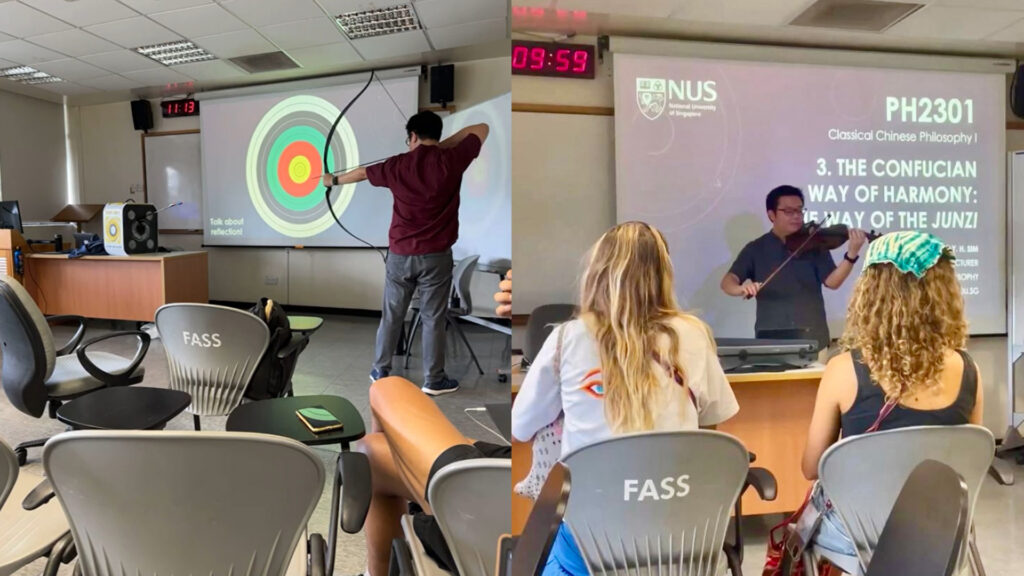
Aware that the biggest struggle students would have with Chinese philosophy is with the ancient texts (even in English) that are unlike modern philosophy papers, Mr Sim devises creative ways to make them more accessible. He dedicates a special lecture to teaching students how to understand the texts and writes guides as part of the weekly preparation exercise to give them tips on how to tackle the challenges they encounter. The etymology of Chinese words is also discussed in class to give students a deeper understanding of the concepts taught.
To help students gain clarity on the different philosophical concepts involved in deciding the right course of action in a difficult situation, the innovative lecturer invites students to role-play as Confucius and Laozi on Reddit to give life advice to people online.
Props are also used to help the lessons come alive. Mr Sim has played his violin to illustrate the concept of harmony, brought an archery longbow to class to demonstrate the connection between archery and morality in Confucian thought, and even demonstrated certain kungfu moves to showcase the connection between certain ideas in Chinese philosophy and martial arts.
On his unconventional teaching methods, Mr Sim explained, "I want to empower students to search for insights to address contemporary problems and guide them to build confidence in their interpretations of the ancient thinkers and adapt these ideas to address modern problems in our personal and professional lives."
Reaching out to the Broader Community about Learning Chinese Philosophy in English
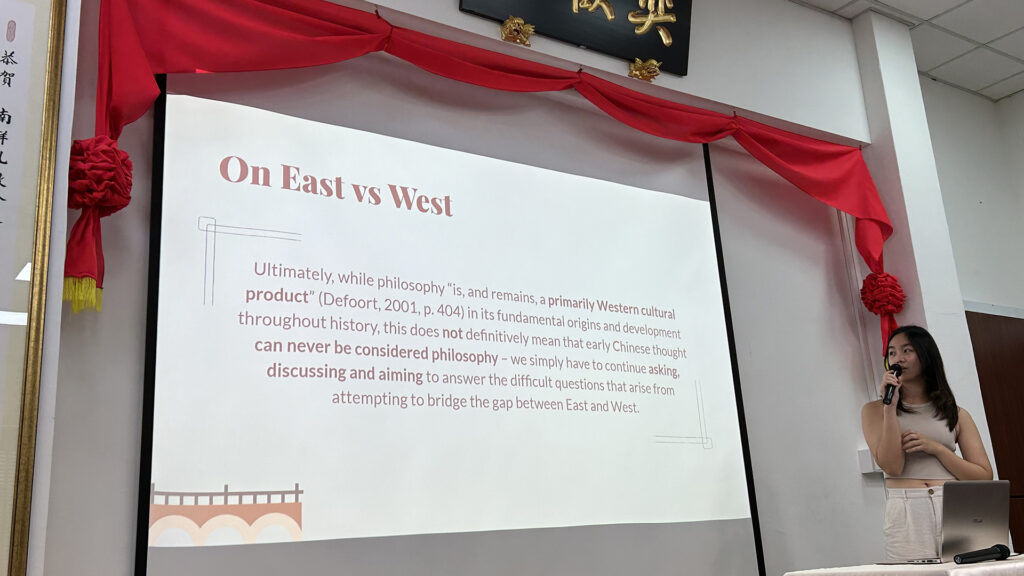
At Mr Sim's encouragement, four of the top-performing course students from AY2022/2023 also presented their final course essays at the Nanyang Confucian Association (NCA) recently as a way to share their passion for, and generate awareness of, the learning of Chinese philosophy in the English language to the wider community.
These students - Joan Lim, Denovan Abas, Lai Jia Jia and Chen Zeyuan - also received the Kongzi Culture Fund: Mah Lan Ying Confuscianism Scholarship at an NCA ceremony in recognition of their excellent performance in the course.
Feedback from them on the course has also been nothing short of positive.
Lai Jia Jia, a second-year student at the NUS Faculty of Arts and Social Sciences, shared that it was interesting to see Confucian values embedded in the historical development of Singapore. She pointed to values such as hard work, loyalty, propriety and harmony as among several virtues espoused by Confucius that were key to Singapore's governance and subsequent prosperity in its early years.
"It prompted me to reflect on how these virtues play a role in my daily life and how they have come to frame Singaporean society today," she reflected.
Denovan Abas, a fourth-year student majoring in Philosophy, Politics and Economics, added, "As a non-Chinese, I don't have any cultural background that imparts even a little bit of the teachings of the classical Chinese thinkers, so I really came in with a completely blank slate. The course gave a really good introduction into various classical Chinese thinkers and what their main contributions are, and by the end I was able to understand and even think critically of the various viewpoints made by these Chinese thinkers."
Students who are keen to pursue even more knowledge and appreciation for ancient Chinese thinkers and their wisdom can look forward to a new "Classical Chinese Philosophy II" (PH3301) course from the next academic year. Building on the first part of the course, this second part will examine Zhuangzi, Xunzi, Han Feizi and other remarkable figures in the canon of Chinese philosophers.
As a former student and now a lecturer, Mr Sim sees these courses as an important personal mission to make the learning of Chinese thought and culture more accessible to anyone who has an interest in learning.
"This also dispels the misperception that one has to be good in Mandarin to understand Chinese philosophy. Hopefully, I can inspire others to be just as excited and passionate about learning Chinese philosophy, the same way my professors had inspired my passion."
This story first appeared in NUSNews on 28 December 2023.
Looking to 2024: What’s Next in AI? Enhancing Safety, More Regulatory Oversight and Leveraging AI for Education
IN BRIEF | 8 min read
- This year, we could see a greater push by developers to improve the safety of AI systems and more countries addressing the need for AI regulation. Amid the rising popularity of generative AI tools, masterful usage of their full capabilities will also become more important.

One year ago, OpenAI's chatbot ChatGPT created a sensation across the globe over its ability to generate everything from essays to e-mails and poems in a matter of seconds.
Since then, the focus has turned more broadly to generative artificial intelligence (AI) tools that can produce text, images, videos and even computer code based on user inputs through the use of machine-learning algorithms trained on massive datasets.
The immense potential of generative AI tools such as Bard, Midjourney or Stable Diffusion, however, comes with a host of concerns, including the risk of inaccuracy and misinformation, copyright infringement, potential biases, and job displacement, among other issues.
Underscoring these concerns, 28 countries and the European Union signed the Bletchley Declaration in November to cooperate on AI safety. That same month, the leadership turmoil at OpenAI sparked by the sudden ouster and eventual reinstatement of chief executive Sam Altman stunned the tech world.
So, what new developments can we expect next year? What is the outlook for AI given the fast-evolving regulatory landscape and how will it impact the nature of work and education? Professor David Tan from NUS Law, Professor Hahn Jungpil from the Department of Information Systems and Analytics at NUS Computing and Mr Jonathan Sim, a lecturer with the Department of Philosophy at the NUS Faculty of Arts and Social Sciences cast their eyes on what's next in AI.
AI to Come Under More Government Oversight Amid Lingering Copyright ConcernsAmid the rapid pace of developments in AI technologies, a growing number of countries are addressing the need for AI regulation, notes NUS Law's Prof Tan. Another issue for regulators relates to whether the content produced through these generative AI systems could constitute copyright infringement. Prof Tan, who is also Co-Director of NUS Law's Centre for Technology, Robotics, Artificial Intelligence and the Law (TRAIL), also weighs in on the shake-up at OpenAI and what it could mean for the future direction of AI.
The use of AI will soon be regulated by the European Union based on their level of risk to human health, safety and fundamental rights. China has also introduced regulations called Deep Synthesis Provisions which came into force in January 2023. Presently in Singapore, the government has yet to consider an omnibus regulation of the use of AI. At a broader level, while the use of AI can bring immense benefits to society, there are multifarious risks such as job displacement, deepfakes and disinformation, invasion of privacy, social manipulation and weaponisation. I hope that the Singapore government will form a study group next year to discuss this issue. Time is of the essence. Surely, we can't be falling too far behind what the European Union and China are doing in this area.
All the machinations behind the dismissal of Sam Altman, a job offer by Microsoft, and his subsequent reinstatement at OpenAI - the company behind ChatGPT - would have significant implications for all of humanity. Some believe that the direction that OpenAI may be taking in the future will not be the same as its original mission to develop AI that is safe for the world to use. Altman's purported vision of techno-omnipotence is unsettling.
Generative AI can equally inspire awe and concern. At a more parochial level, our lives may have been enriched by generative AI, and our secret dreams of being a writer or artist are now realised with the aid of ChatGPT or Stable Diffusion, but it does not mean that these benefits should not come at a price. Even before a legal framework for ethical and responsible use can be established, the companies behind ChatGPT and other generative AI applications are already facing lawsuits over the unauthorised use of copyrighted works for training data. Of immediate relevance are issues surrounding whether copyright adequately protects writers, photographers and artists whose works have been used in this manner. Copyright is at its core driven by an economic ethos. Copyright exists to reward original creative efforts, and any subsequent uses that draw on and reproduce creative content ought to pay an appropriate fee. Perhaps the best things in life are not for free."
Greater Push for More 'Responsible' AI as Developers Seek to Improve ModelsConcerns over the potential of AI to generate inaccurate or harmful content and the rising drumbeat of regulatory scrutiny could push more developers to work on improving their models, says NUS Computing's Prof Hahn, who is also Deputy Director (AI Governance) at AI Singapore. He notes that aside from enhancing safety, developers will also be incentivised to improve their models to make their products more valuable to users.
The advent of foundational AI models and generative AI models like LLMs (large language models such as ChatGPT) have created tremendous excitement about how individuals and organisations can leverage technology to create value. That being said, these AI technologies are not perfect; they are still immature - we know that tools such as ChatGPT do not always provide factually accurate information and they can even provide harmful content, including discriminatory content, misinformation or fake news.
In 2024, I expect that there will be a strong push by developers of these foundation models to improve the quality of AI systems with a special focus on safety, toward making AI "responsible". There is currently a lot of debate globally about AI regulation due to these safety concerns. On the one hand, regulations may be able to limit some of the safety issues, but how to effectively regulate AI is still up for debate. I believe that companies developing AI systems, such as OpenAI, will focus on making the technology safer since creating a better - and safer - system will make them more valuable.
At present, these foundational models were built and trained from almost all data that is publicly accessible on the internet, without too much consideration for the quality. I believe that companies will focus on creating better AI models by carefully curating the training dataset such that the trained models will perform better.
Skills Gap Between Savvy and Non-savvy Generative AI Users to WidenWhile ChatGPT's arrival last year prompted concern over its ability to facilitate cheating and plagiarism within the education sector, educators now face the larger question of how to leverage generative AI tools to transform teaching and learning in a world where AI will increasingly become more prevalent. Mr Sim, who is also an Associate Fellow of the NUS Teaching Academy, says the rise of generative AI will widen the disparity between individuals skilled in exploiting its full capabilities and those less capable of doing so.
"ChatGPT's debut in November 2022 has radically changed how students learn. It has become so ubiquitous that many students are now commenting, 'I cannot imagine university life without ChatGPT.'
Yet, masterful usage does not come naturally. I've observed that a minority of users excel at using generative AI collaboratively, amplifying their capabilities as if they were working in a team. The vast majority, however, underutilise generative AI, unaware of its full capabilities. This disparity risks widening the performance gap between those who are adept at using generative AI and those who are not.
If we are committed to ensuring that our students are ready for the future, then we educators must first be ready for the future. We must learn how to master its collaborative potential to enhance our own abilities by embracing a change in mindset: first, to see it more as a consultative tool to enhance our work rather than as an answer generator; and second, to see generative AI's output as drafts, extracting valuable "nuggets of gold" rather than accepting them wholesale. This approach is not intuitive to most users. It needs to be conditioned over repeated use. By adopting this mindset, we can pave the way for students to use generative AI responsibly and rigorously to enhance their learning."
This story first appeared in NUSNews on 4 December 2023.
NUS Alumni Awards 2023: Celebrating Outstanding Changemakers and Trailblazers
IN BRIEF | 8 min read
- NUS honoured the achievements of 21 outstanding alumni and three alumni teams comprising another 14 alumni, at the prestigious NUS Alumni Awards 2023.
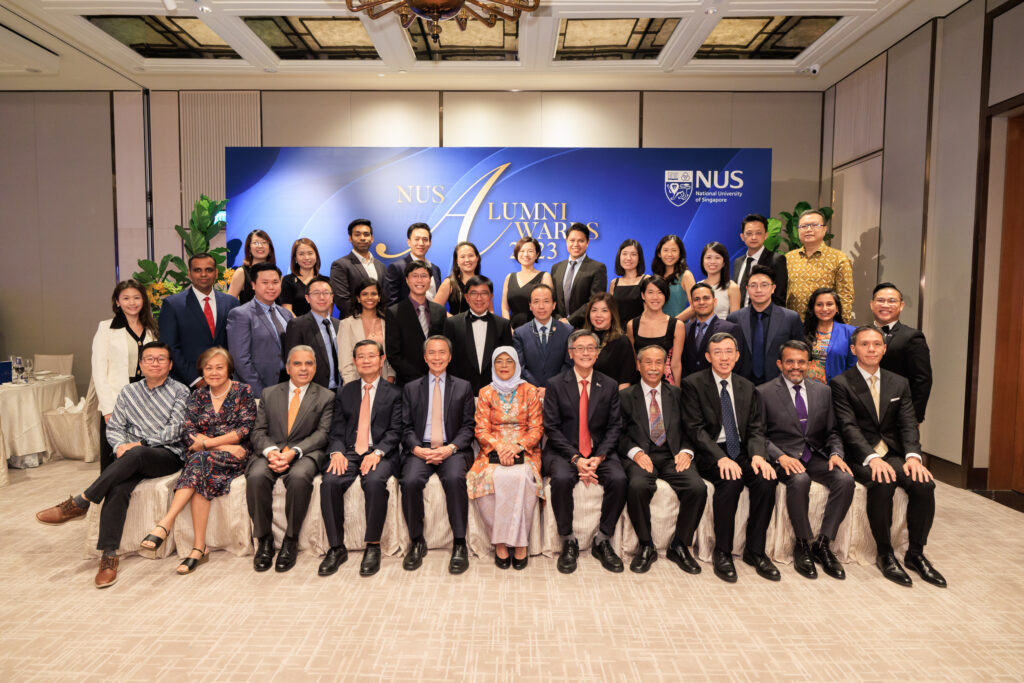
Twenty-one individual alumni and three alumni teams, comprising another 14 individuals, were honoured at the NUS Alumni Awards 2023 on 2 November.
Now in its 10th edition, the biennial NUS Alumni Awards recognise alumni who have distinguished themselves through significant and impactful contributions to their alma mater, society and the world.
Speaking at the celebratory event, NUS President Professor Tan Eng Chye noted that the award recipients have, “not only found success in their respective fields, but elevated what it means to be an alumnus or alumna of our institution: their achievements have enriched our culture, advanced our science, deepened our humanity, and bettered our society”. Read Prof Tan's speech here.
Eminent Alumni AwardThe Eminent Alumni Award was conferred on Mdm Halimah Yacob, former President of the Republic of Singapore, for her achievements in public service, as well as her exemplary service to the University as the former Chancellor of NUS from 2017 to 2023. Mdm Halimah Yacob
Mdm Halimah graduated in 1978 with a Bachelor of Laws from the University of Singapore and obtained her Master of Laws from NUS in 2001. She spent 33 years with the labour movement, rising to become Deputy Secretary-General of the National Trades Union Congress (NTUC). In 1999, she became the first Singaporean elected to the International Labour Organisation (ILO), where she served for 12 years, representing workers globally. She entered politics in 2001, serving as a Member of Parliament until 2017. In a career filled with firsts, she became the first woman appointed Speaker of Parliament in 2013; and the first woman to be elected President of Singapore in 2017, a role she held until 2023. For her service, she was conferred the Order of Temasek (With High Distinction), the nation’s highest civilian honour, this year.
As Chancellor of the University, Mdm Halimah conferred close to 76,000 undergraduate, master’s, doctorate and honorary degrees over six years, and presided over the Main Commencement ceremonies for graduates and honorary graduates. She also graced various NUS events, including NUSSU Rag & Flag Day 2018, NUS Bizad Charity Run 2020, the Bukit Timah Homecomings of 2018 and 2022, the Institute of Policy Studies’ Women’s Conference in 2021, and the 52nd UM-NUS Inter-University Tunku Chancellor Golf Tournament in 2023.
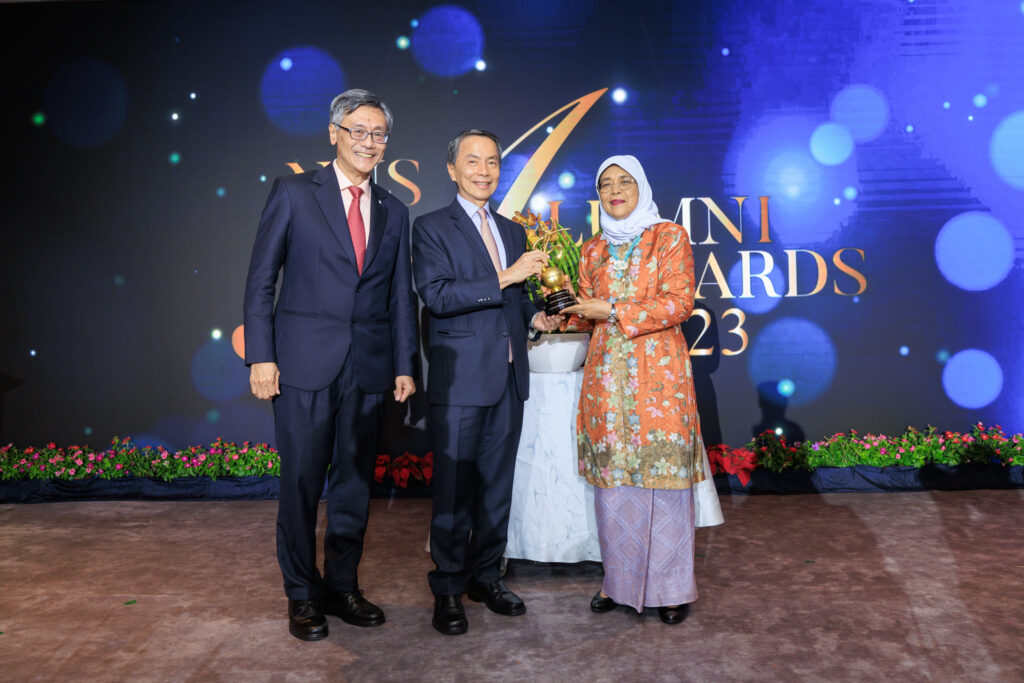
Delivering the citation for Mdm Halimah’s conferment, Prof Tan commended Mdm Halimah as an “inspiring leader” and “trailblazing alumna”, noting her “unwavering dedication to advancing the lives of individuals and communities, particularly the underprivileged”. Read the citation here.
“I am deeply honoured to receive the Eminent Alumni Award from my alma mater. NUS has played a formative role in my life, shaping not only my academic development but the values I have carried throughout my career,” said Mdm Halimah.
Watch this tribute video on Mdm Halimah’s contributions to the University and Singapore.
Distinguished Alumni Service AwardEight NUS alumni were conferred the Distinguished Alumni Service Award for their achievements in their chosen fields, as well as their excellent volunteer service to NUS, its predecessor institutions and/or the community.
These award recipients were:
- Professor Kishore Mahbubani (NUS Philosophy '71), Distinguished Fellow at NUS Asia Research Institute
- Mr Kok Heng Leun, founder of the Drama Box theatre group
- Ms Janet Lim Yuen Kheng (NUS Sociology, 75), former Assistant High Commissioner (Operations) at the United Nations High Commissioner for Refugees (UNHCR)
- Justice Andrew Phang Boon Leong, Senior Judge of the Supreme Court of Singapore
- Mr Ravi Menon (NUS Economics '87), Managing Director of the Monetary Authority of Singapore
- Mr Brian Tan Kai Piang, Regional President of Applied Materials Southeast Asia
- Mr Wong Kan Seng (NUS History and English '70), former Deputy Prime Minister of Singapore
- Mr Yatiman Bin Yusof (NUS Geography and Malay Studies '72), High Commissioner of Singapore to Kenya and Malay language champion
Twelve young NUS alumni were honoured for their achievements and outstanding contributions to their chosen fields.
These award recipients were:
- Dr Aishwarya Bandla, Regional R&D Manager at Paxman Coolers
- Ms Akanksha Batura Pai, Head of Strategy and Growth at Sinoda Shipping Agency
- Dr Rena Dharmawan, Assistant Dean and Assistant Professor at Duke-NUS Medical School
- Mr Faris Bin Ridzuan (NUS Sociology '15), academic tutor at the National University of Singapore
- Dr Izzuddin Bin Mohd Aris, Assistant Professor at Harvard Medical School and Harvard Pilgrim Healthcare Institute
- Mr Khoo Yi Feng (NUS Southeast Asian Studies and Psychology '17, Social Work (postgraduate diploma) '20), social worker and mental health advocate
- Mr Kwok Ka Ming Andre, founder of Good City Foundation
- Mr Samson Leo, Chief Legal Officer of Fazz
- Mr Raghuram Natarajan, Chief Executive Officer of Blueleaf Energy
- Mr Seah Li Song Shawn (NUS Economics '10), local history author
- Dr Shravan Verma, Co-founder of Speedoc
- Ms Frances Tho Siao Ting, Vice President of Sales at Numerix

Team (Alumni) Award Recipients
The Team (Alumni) Award recognises the outstanding achievements of alumni teams who have collectively distinguished themselves in their chosen fields.
Three awards recipients were:
- Co-founders of Growthbeans: Ms Shamantha Yan Shiya (NUS Sociology '09) and Ms Shane Yan Shiyan (NUS Psychology '09)
- Co-founders of Janio Asia: Mr Ng Jun Kai and Mr Nathaniel Asher Yim
- REACH (Response, Early Intervention and Assessment in Community mental Health) Team, Institute of Mental Health: Ms Esther Chew Yuki (FASS '14), Dr Daniel Fung Shuen Sheng, Mr Ho Weng Siong (FASS '16), Ms Li Jiaying Grace, Mr Ong Guo Xiong Jeffrey (FASS '09), Ms Ong Tze-I Cheryl (FASS '08), Ms Sim Si Lin (FASS '12), Ms Tan Ke Jia (FASS '03), Mr Tan Zheng Xin, Jason (FASS '08) and Ms Kelly Yeo (FASS '07)
Read more about the NUS Alumni Awards 2023 recipients here and here.
This story by the NUS Office of Alumni Relations first appeared in NUSNews on 2 November 2023.
NUS FASS Establishes Buddhist Studies Visiting Professorship to Foster Interdisciplinary Research in Buddhist Studies
IN BRIEF | 5 min read
- The Visiting Professorship is established through a S$500,000 gift from Mee Toh Foundation.
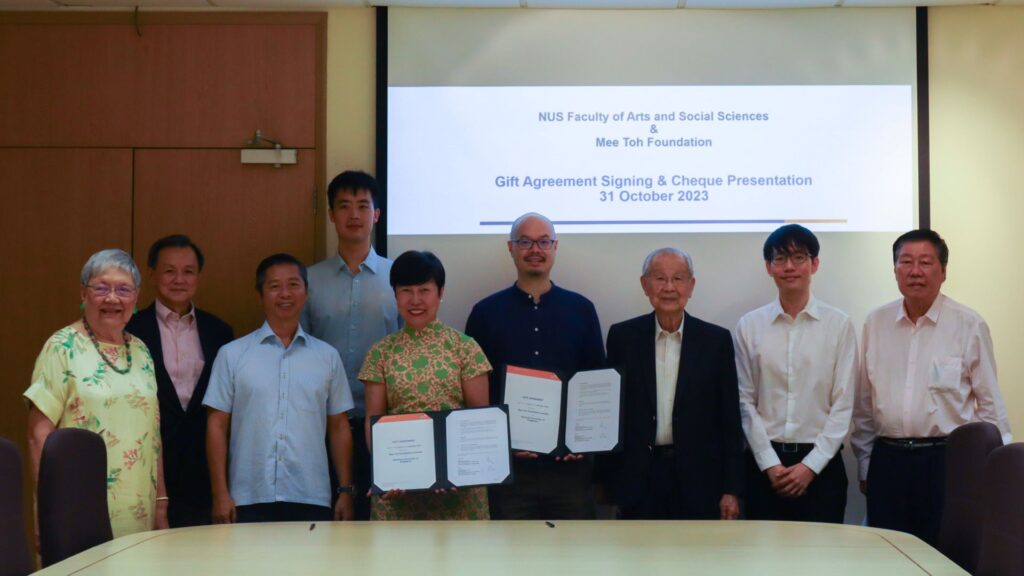
The NUS Faculty of Arts and Social Sciences (FASS) will soon be able to boost its research and teachings in Buddhist Studies, thanks to a generous gift of S$500,000 from Mee Toh Foundation.
The gift will enable the establishment of the Mee Toh Foundation Visiting Professorship in Buddhist Studies, augmenting FASS’ Buddhist Studies offerings with fresh perspectives on the history, philosophy, art, and literature of Buddhism.
To be administered over the course of five years from 2024 by the Department of Philosophy at FASS, the new Visiting Professorship will be awarded annually to a distinguished Buddhist studies academic/expert who will teach undergraduate courses, spearhead research endeavours and deliver public lectures related to the field. The appointed Visiting Professor’s focal areas may encompass Buddhist philosophy, history in Buddhist studies, and literature related to Buddhist studies, in order to foster a comprehensive exploration of this multifaceted field.
FASS Dean Professor Lionel Wee said, “Singapore, a culturally diverse nation, is home to a tapestry of religious and cultural traditions, including Buddhism. A deeper understanding of one another’s culture and religion will promote mutual understanding and foster a greater sense of respect within society. We are pleased to partner with the Mee Toh Foundation to provide invaluable opportunities for students, scholars, and the broader community to engage with world-renowned experts so as to enrich their understanding of this rich subject.”
The search for the first Visiting Professor will commence soon.
Mr Ong Pang Boon, Chairman of the Mee Toh Foundation said, “Our Foundation traces its roots to Venerable Sek Kong Hiap who started Mee Toh School because of his dedication to the cause of education. We are delighted to work with NUS to promote a deeper understanding of Buddhism and Buddhist studies among Singaporeans.”
Prof Qu Hsueh Ming, Head of the FASS Department of Philosophy, added, “The establishment of the Mee Toh Foundation Visiting Professorship in Buddhist Studies underscores our commitment to academic excellence and the cultivation of cross-cultural awareness. Buddhist Studies holds the potential to encourage more academic discourse by offering fresh outlooks not only in the area of philosophy, but also in religion, history, philosophy, art, and literature. By embracing these perspectives, interdisciplinary research flourishes, enriching our comprehension of various fields of knowledge.”
Mee Toh Foundation is a registered charity incorporated in 2016. Besides supporting the underprivileged and welfare organisations, the Foundation provides financial help to three Buddhist schools in Singapore (Mee Toh School, Maha Bodhi School and Manjusri Secondary School). Through the Visiting Professorship at NUS, it hopes to bring more awareness to the public about Buddhist Studies.
This story first appeared in NUSNews on 31 October 2023.
NUS University Awards Pay Tribute to 6 for Exemplary Contributions to Education, Research and Service
IN BRIEF | 8 min read
- The National University of Singapore (NUS) has recognised six outstanding individuals who distinguished themselves with their achievements and contributions in the areas of education, research and service to the University, Singapore and the global community. Among the winners: Professor Barry Halliwell (Distinguished Professor at the Department of Biochemistry, Yong Loo Lin School of Medicine at NUS, and Senior Advisor (Academic Appointments and Research Excellence) at the NUS Office of the Provost), and, Mr Quek Gim Pew, Chairman of the National Supercomputing Centre Steering Committee, and Co-Chair of the National Quantum Steering Committee, who were both conferred Outstanding Service Awards in recognition of their inspiring leadership and dedicated service; and, FASS Provost's Chair Professor of Philosophy and expert in the philosophy of David Hume, Professor Qu Hsueh Ming (NUS Philosophy) who received a Young Researcher Award.
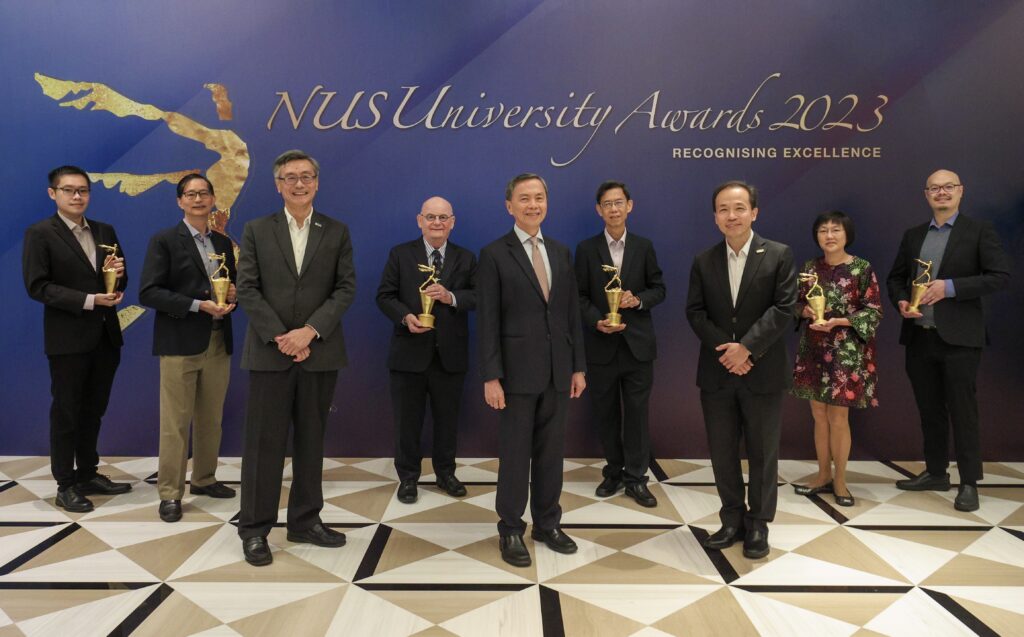
The National University of Singapore (NUS) has recognised six outstanding individuals who distinguished themselves with their achievements and contributions in the areas of education, research and service to the University, Singapore and the global community.
At the NUS University Awards 2023, the prestigious Outstanding Service Award was conferred on Professor Barry Halliwell, Distinguished Professor at the Department of Biochemistry, Yong Loo Lin School of Medicine at NUS, and Senior Advisor (Academic Appointments and Research Excellence) at the NUS Office of the Provost; and Mr Quek Gim Pew, Chairman of the National Supercomputing Centre Steering Committee, and Co-Chair of the National Quantum Steering Committee, in recognition of their inspiring leadership and dedicated service. Both are accomplished individuals who have made sustained contributions in selflessly serving the University and society.
NUS President Professor Tan Eng Chye said, “As NUS strives to be a leading global university, we want to be known for our commitment to the continual pursuit of excellence. I am very proud of the award winners who have dedicated themselves to scale new heights in their professional pursuits and achieved exceptional results in their journey. They have demonstrated vision, focus and a strong commitment to hard work and continuous learning. My heartiest congratulations to all of them!”
Besides the Outstanding Service Award, the other award categories are University Research Recognition Award, Young Researcher Award, and Outstanding Educator Award.
Outstanding Service Award
Professor Barry Halliwell
Prof Halliwell’s 25-year career at NUS has seen him play a pivotal leadership role in driving the University’s research excellence and global reputation as a top research-intensive university. He was instrumental in promoting NUS as a hub for excellence in life sciences at the Life Sciences Institute, where he heads the Neurobiology Research Programme; and in establishing NUS research institutes, centres and programmes, contributing to successful bids for four Research Centres of Excellence. These are the Centre for Quantum Technologies, Cancer Science Institute of Singapore, Mechanobiology Institute, and Singapore Centre for Environmental Life Sciences Engineering (jointly with NTU).
An internationally acclaimed biochemist, and one of the world’s most highly cited researchers in biology and biochemistry, Prof Halliwell is distinguished especially for his seminal work on the role of free radicals and antioxidants in biological systems. His transformative research, particularly on Alzheimer’s disease and other brain disorders, includes identification of the most important antioxidants in the human diet as well as the development of novel antioxidants to treat diseases.
Prof Halliwell’s outstanding contributions have garnered him numerous accolades, including the Lifetime Achievement Award by the Society for Free Radical Biology and Medicine, USA (2008) and Citation Laureate (2021), a distinction awarded by Clarivate to the most highly cited researchers in their field and whose work is of Nobel class. In 2013, he was awarded the Science and Technology Medal by the President of Singapore for sustained and exceptional contributions to Singapore’s science and engineering landscape.
Mr Quek Gim Pew
Throughout his 42-year engineering career, Mr Quek has made significant contributions to the development of advanced defence technologies for the Singapore Armed Forces during his stints as CEO of DSO National Laboratories and Chief Defence Scientist at the Ministry of Defence, as well as the enhancement of Singapore’s capabilities in space, quantum and digital technologies in his roles as former Chairman of the Centre for Quantum Technologies’ Governing Board, and current Co-Chair of the National Quantum Steering Committee.
A strong advocate for STEM education, Mr Quek has initiated various nationwide programmes to enhance the accessibility of STEM education among young Singaporeans, such as the Young Defence Scientist Programme, as well as outreach programmes that promote STEM through space science and satellite technology.
As a board member of various educational institutions in Singapore, including several institutes of higher learning, Mr Quek has contributed to the strategic development of the nation’s education and research capacities, as well as industry partnerships and entrepreneurship efforts at local universities.
Mr Quek served as Chairman of the Governing Board of the Centre for Quantum Technologies hosted at NUS from 2016 to 2022. Bringing his negotiation skills, experience, and connections to the table, he succeeded in uniting different parties in a joint effort to ensure Singapore remains at the forefront of quantum technologies.
Four exemplary educator and researchers honoured
The NUS University Awards also celebrated the accomplishments of four outstanding educators and researchers:
University Research Recognition Award
1) Professor Patrick Tan Boon Ooi from Duke-NUS Medical School’s signature research programme in Cancer and Stem Cell Biology, where he is also the school’s Senior Vice Dean for Research.
The internationally renowned cancer researcher is a pioneer in research using genomic approaches to unlock the molecular and clinical diversity of gastric cancer and other Asian-endemic malignancies, paving the way for advancements in the diagnosis and treatment of Asian cancer patients.
Young Researcher Award
1) Assistant Professor Koh Ming Joo from the Department of Chemistry, College of Humanities and Sciences
Helming the Koh Research Group at the Department of Chemistry of NUS Faculty of Science, he is at the forefront of research on sustainable catalysis and leads global efforts in the drive towards cost- and energy-efficient chemical synthesis with lower carbon emissions and waste generation.
2) Professor Qu Hsueh Ming from the Department of Philosophy, College of Humanities and Sciences
A Provost’s Chair Professor of Philosophy at the NUS Faculty of Arts and Social Sciences, he is an expert in the philosophy of David Hume. His book, Hume’s Epistemological Evolution, was published in 2020 by Oxford University Press. The book was nominated for the APA Book Prize (2021), and received excellent reviews. Other key publications include the article Complex Ideas and Hume’s Separability Principle, published in the journal Mind. And the article, “Hume’s Stoicism: Reflections on Happiness and the Value of Philosophy”, published in the Journal of the History of Philosophy. He is also Associate Editor of the Australasian Journal of Philosophy. As a result of his scholarship, Professor Qu was recently listed as one of the key figures in Early Modern Philosophy, alongside giants of other subfields such as John Rawls and David Lewis.
Outstanding Educator Award
1) Associate Professor Lee Kooi Cheng from the Centre for English Language Communication
As Director of the Centre for English Language Communication, she is known for driving the conceptualisation and designing of courses that integrate disciplinary knowledge with writing, thinking and communication competencies, through partnerships with university faculties and departments. Holding a joint appointment as Master of Helix House, she also has a keen interest in the impact of experiential learning and living-learning programmes on students’ university experience.
The original story first appeared in NUSnews on 8 September 2023.
Celebrated for their Dedication to Singapore
IN BRIEF | 10 min read
- More than 200 members of the NUS community received the National Day Awards 2023.
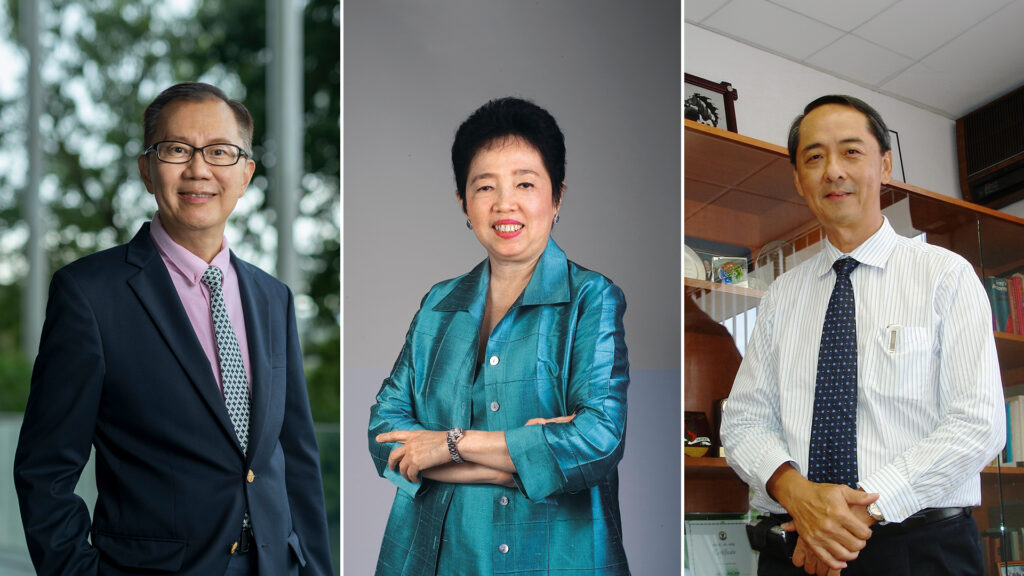
Madam Kay Kuok Oon Kwong, Chair of the Yale-NUS College Governing Board and Former Chairman of the National Healthcare Group, was conferred the Distinguished Service Order at this year’s National Day Awards.
One of four recipients of this year’s top accolade, Madam Kuok was among the more than 200 members of the NUS community honoured at the annual awards, which recognise individuals for their merit and service to Singapore.
The Distinguished Service Order is bestowed upon individuals who have demonstrated distinguished conduct.
Madam Kuok was recognised for her steadfast leadership of the National Healthcare Group (NHG) from 2009 to 2021, steering it through major milestones, including its integration with the Alexandra Health System. She was also credited for her critical role in establishing the National Centre for Infectious Diseases and for her stewardship of the NHG in its COVID-19 responses during the pandemic.
As Founding Chair of the Yale-NUS College Governing Board, Madam Kuok provided strategic direction and guidance in various aspects, from curriculum development and faculty hiring to finances and infrastructure. She served on the NUS Board of Trustees for 12 years from 2008 to 2020, providing leadership and vision in charting the University’s strategic goals in education and research, in addition to discharging the Board’s fiduciary duties. For her immense contributions to the University and society, she was presented with the Outstanding Service Award at the NUS University Awards 2021.
Emeritus Professor Lee Eng Hin received the Public Service Star for his role as Chairman of the Bioethics Advisory Committee, which provides the government with recommendations on the regulation of human biomedical research. His appointments at NUS include Emeritus Professor at the Department of Orthopaedic Surgery at the Yong Loo Lin School of Medicine (NUS Medicine), where he also serves as Senior Advisor to the School’s Division of Graduate Medical Studies. He was the former Dean of NUS Medicine and previously served as Head of the Department of Orthopaedics.
Two other recipients were also recognised with the Public Service Star, given to individuals who have rendered valuable public service or distinguished themselves in various fields. They were Mr Seck Wai Kwong, a member of the INVEST Fund Board of Trustees and Adjunct Professor at the Department of Accounting at NUS Business School; and Dr Toh Mun Heng, Vice President of the Consumers Association of Singapore (CASE) Central Committee, and Honorary Fellow of the Department of Strategy and Policy at NUS Business School.
NUS University Professor Ho Teck Hua, presently President and Distinguished University Professor of the Nanyang Technological University, was honoured with the Public Administration Medal (Gold) award. Prof Ho served as NUS’ Senior Deputy President and Provost from 2018 to 2023 and was Deputy President (Research and Technology) from 2015 to 2018. As Provost, he oversaw numerous initiatives aimed at promoting greater interdisciplinarity, nurturing innovative teaching and learning methods, and enhancing lifelong education. He was instrumental in attracting and developing high-quality talent at NUS through schemes such as the Presidential Young Professorship, and oversaw the launch of the College of Humanities and Sciences, College of Design and Engineering as well as NUS College, among other accomplishments. He was the Former Deputy Chairman of the Duke-NUS Governing Board from 2018 to 2023 and currently serves as the founding Executive Chairman of AI Singapore and President of the Academy of Engineering, Singapore.
Two other individuals were also recognised with the Public Administration Medal (Gold) award. They were Mr Kenneth Er Boon Hwee, who received the award in his capacity as Deputy Secretary (Planning) at the Ministry of National Development and Former Chief Executive Officer of the National Parks Board; and Mr Kok Ping Soon, Former Chief Executive of the Government Technology Agency. Mr Er is Member of the Governing Board of the Tropical Marine Science Institute at NUS while Mr Kok is Member of the Management Board of NUS-ISS.
Members of the FASS community who received awards include:
Public Administration Medal (Bronze)
• Assoc Prof Michelle M, Lazar, NUS English, Linguistics & Theatre Studies Long Service Medal
• Mr Eric CHEE Kwai Cheong, FASS Graduate Studies Division
• Assoc Prof Bruce Mcfarland LOCKHART, FASS Graduate Studies Division and NUS History
• Mdm LOW Hooi Han, FASS Dean's Office
• Assoc Prof LOY Hui Chieh, NUS Philosophy (and NUS College Vice Dean of Academic Affairs)
• Assoc Prof Saranindra Nath TAGORE, NUS Philosophy
• Mr THACH Ngoh Minh, NUS Centre for Language Studies
• Assoc Prof John WHALEN-BRIDGE, NUS English, Linguistics & Theatre Studies
• Ms WONG Swee Eng, FASS Dean's Office, Graduate Studies Division
Other members of the NUS community who received awards include:
• Mr Philip Lim Feng, Public Administration Medal (Silver) (Bar)
• Prof Terrance Chua Siang Jin, Public Administration Medal (Silver)
• Assoc Prof Terence Ho Wai Luen, Public Administration Medal (Silver)
• Mr Khoong Chan Meng, Public Administration Medal (Silver)
• Prof Liu Bin, Public Administration Medal (Silver)
• Assoc Prof Thomas Loh Kwok Seng, Public Administration Medal (Silver)
• Assoc Prof Peter Pang Yu-Hin, Public Administration Medal (Silver)
• Clin Assoc Prof Poon Choy Yoke, Public Administration Medal (Silver)
• Prof Sun Yeneng, Public Administration Medal (Silver)
• Prof Tan Huay Cheem, Public Administration Medal (Silver)
• Prof Teo Chung Piaw, Public Administration Medal (Silver) • Prof Richard Liew Jat Yuen, Public Administration Medal (Bronze)
• Prof Vathsala Anantharaman, Public Administration Medal (Bronze)
• Prof Jochen Wirtz, Public Administration Medal (Bronze)
View the full list here and read the story on last year’s recipients here.
This story first appeared in NUSnews on 11 August 2023.
A Homecoming for All: NUS Alumni Across Campuses and Generations Reunite at Bukit Timah
IN BRIEF | 5 min read
- NUS Homecoming 2023 brought together more than 800 NUS graduates at the Bukit Timah Campus to celebrate their alma mater.
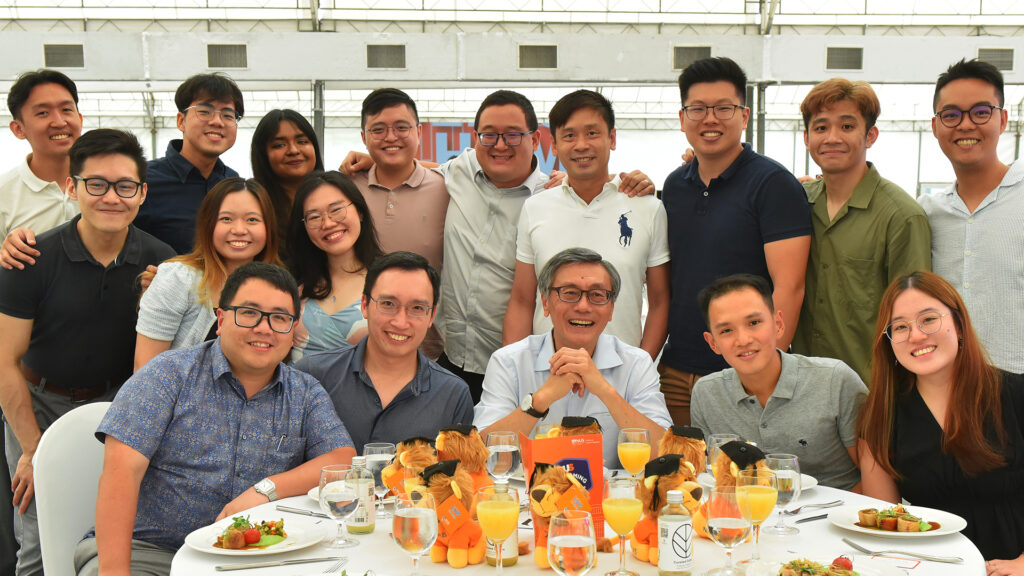
It was a jubilant reunion for the more than 800 alumni who attended NUS Homecoming on 1 July 2023. Organised by the NUS Office of Alumni Relations and co-hosted by NUS Law and the Lee Kuan Yew School of Public Policy (LKYSPP), the event held at the Bukit Timah Campus brought together multiple generations of NUS graduates for a day of celebration and connection.
Importantly, the event marked the first occasion where graduates from the Bukit Timah, Kent Ridge and Outram campuses came together for a combined Homecoming. Participation at the event also reflected the diversity of the alumni community, with overseas alumni from Hong Kong, the Philippines, and New Zealand flying to Singapore for the occasion, and alumni from the Class of 1953 to 2023 also in attendance.
“Homecoming is not only an opportunity to make new memories with old friends, but also an opportunity to make new friends from across campuses, faculties, countries, and cohorts,” said Ms Ovidia Lim-Rajaram, Chief Alumni Officer, NUS.
Morning activities centred on a variety of insightful seminars and workshops hosted by NUS staff and alumni, with highlights including a conversation between Professor Wang Gungwu (Arts-History ’53) and Ambassador Chan Heng Chee (Arts-Political Science ’64); a talk on “An Adventure in the Pursuit of Happiness” by Mr Jonathan Sim (Arts and Social Sciences-Philosophy ’13); a cocktail mixing session by Associate Professor Kevin SW Tan (Science ’94); as well as a line dancing lesson led by Mr Lim Chee Kiang (Engineering ’83).

Attendees were also able to visit College Green, which previously operated as Dunearn Road Hostels for the undergraduates of the then-University of Malaya, and which now serves as a hostel for LKYSPP students.
During lunch, attendees enjoyed performances from NUS musical groups Red Dot Baroque, Resonance and The Jazzlings, while engaging in stimulating conversation with fellow alumni. Recent news that NUS had climbed to 8th in the QS World University Rankings, marking the first time the University had placed amongst the world’s top ten, provided a frequent topic of conversation and point of pride amongst event attendees.

In his speech at the event, Guest-of-Honour NUS President Professor Tan Eng Chye (Science ’85) gave credit to the NUS alumni for their role in this achievement, stating that, “this remarkable growth story of our University would not have been possible without the participation and support of our alumni community.”
Noting that the University was not “standing still,” Prof Tan encouraged alumni to remain actively involved in NUS’ next phase of growth and contribute to sustaining and nurturing the University’s extended network.
This was a message that resonated with first-time attendee Raimie Tang (Engineering and Business ’21). “I benefited a lot from [my] NUS education and had many opportunities [as a result]. So I just [wanted] to come back and see how to stay connected, give back if possible, and even reconnect with other alumni.”

The event ended on a sweet note, as guests enjoyed a dessert buffet and cake in celebration of four milestone anniversaries: the 65th anniversaries of Eusoff Hall and Raffles Hall, the 50th anniversary of the Class of 1973, and the 20th anniversary of the Yong Siew Toh Conservatory of Music.
This story by the NUS Office of Alumni Relations first appeared in NUSnews on 13 July 2023.
Unlike Parents, AI will Never Tire of Entertaining our Children. Here’s the Catch
IN BRIEF | 10 min read
- A commentary piece for CNA Online by Mr Jonathan Sim, a Lecturer with NUS Philosophy.
Click through image below to read this piece.
This article first appeared in CNA and NUSNews on 1 July 2023.
FASS Honours Alumni for their Profound Impact on Community and Nation
IN BRIEF | 8 min read
- This year’s honourees are Mrs Elizabeth Sam, a prominent banker; Mr Othman Bin Haron Eusofe, an influential unionist; Dr S Vasoo, a passionate social worker; Mr Benny Lim, a dedicated civil servant and policymaker; and Mr T. Sasitharan, a celebrated actor and respected voice in arts and culture – all of whom have dedicated their careers and lives to service and community in different ways.

The NUS Faculty of Arts and Social Sciences (FASS) paid tribute to five outstanding alumni for their service and contributions in various capacities towards Singapore’s nation-building, and the growth of the University and Faculty, at the recent 2022 Distinguished Arts and Social Sciences Alumni Awards (DASSAA) dinner.
The DASSAA was established in 2015 to recognise individuals who have made significant contributions to the nation and community, and dedicated their lives to the betterment and promotion of the arts and social sciences. Each of them played important roles in many areas, whether it was in shaping domestic and international policies, the business landscape, the creative environment, or in improving the lives of those around them.
This year’s honourees are Mrs Elizabeth Sam, a prominent banker; Mr Othman Bin Haron Eusofe, an influential unionist; Dr S Vasoo, a passionate social worker; Mr Benny Lim, a dedicated civil servant and policymaker; and Mr T. Sasitharan, a celebrated actor and respected voice in arts and culture – all of whom have dedicated their careers and lives to service and community in different ways.
Speaking at the awards ceremony, NUS Provost Professor Aaron Thean said, “The Faculty has honoured many alumni who have played important roles in many areas, be it in the shaping of local and international policies, the business landscape, the creative environment, or in improving the lives of NUS FASS students and beyond. The achievements of its graduates are one of the best testimonies to the work done by the Faculty.”
“The five outstanding FASS alumni who will be presented with the Distinguished Arts and Social Sciences Alumni Awards 2022 have excelled in their respective fields in public service, politics, finance, education and the arts. Their contributions to Singapore and their continued passion for what they do serves as an inspiration to many of us, especially to the FASS students who will follow in their footsteps and create their own legacies,” he added.
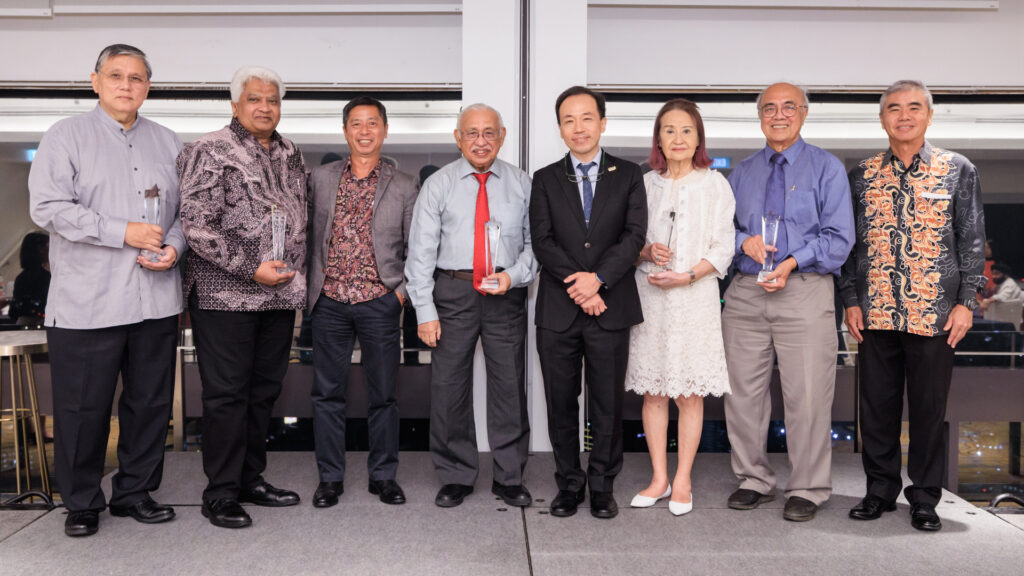
Inspiring the Next Generation of FASS Students
Mrs Elizabeth Sam is one of Singapore’s best-known female bankers. Her career spanned over 40 years, with the first half of it in the public sector where she played a key role in the growth of Singapore as a global financial centre. In 1996, Mrs Sam was awarded the Public Service Star (BBM), Republic of Singapore, for her contributions to the nation’s development as a global financial centre. The following year, she was recognised as one of the top 50 outstanding women globally in finance by Euromoney.
Currently a member of the Presidential Council for Minority Rights, Mr Othman Bin Haron Eusofe graduated with a Bachelor of Arts (Honours) from the then University of Singapore in 1964. He was a Founder Member of Yayasan Mendaki which was established in October 1982 to introduce programmes to help Malay students to improve in their educational performance. He continues to serve on the Mendaki Council. Mr Othman was also a key member of the NTUC team on the National Wages Council, and served on several Statutory Boards including the Public Utilities Board and the Civil Aviation Authority of Singapore.
Dr S Vasoo, Emeritus Professor in the NUS FASS Department of Social Work, has authored several monographs on social issues and has published various such articles both internationally and locally. He recently co-edited a book, “Singapore Ageing: Issues and Challenges Ahead”. He was awarded the Honorary Life Member of the Singapore Association of Social Workers for his outstanding contributions to social work in Singapore.
Mr Benny Lim is Chairman of the National Parks Board and the Chairperson of the Housing & Development Board. He is also Special Advisor to the Centre for Liveable Cities as well as Special Advisor to the National Security Studies Programme at the S. Rajaratnam School of International Studies (RSIS) at the Nanyang Technological University. He is also concurrently Chairman of Temasek Foundation CLG and Chairman of Temasek Lifesciences Laboratory IPC. Mr Lim started his career in the public service as a police officer, and went on to develop an illustrious career in the public sector, holding prominent roles in the Ministry of Home Affairs, Ministry of National Development and the Prime Minister’s Office, amongst others.
Mr T. Sasitharan, or more fondly known as Sasi to the arts community in Singapore, is widely acknowledged as one of the foremost thinkers and contributors to the development of the local arts scene. A former Philosophy teacher and arts journalist, Mr Sasitharan is a respected voice in discourses on arts and culture. His essays, commentaries and reviews, on the place of the arts in society, the value of culture, actor training, arts education, theatre criticism, aesthetics and creativity, have been published internationally while his speaking engagements have been at universities, conferences and arts forums around the world.
Congratulating the 2022 DASSAA recipients for their achievements, FASS Dean Professor Lionel Wee said, “Your achievements and your journey inspire the next generation of students who will follow in your footsteps. You have paved the way for them to build on your successes, to take risks, and to innovate in ways that will help make our world a better place. I want to congratulate each of the FASS Distinguished Alumni Award recipients. You have made your mark on the world, and you have done so with integrity, compassion, and a commitment to excellence.”
Read the full citation of the 2022 DASSAA recipients here.
This story first appeared on NUSnews on 10 May 2023.
Amid Fears of Radicalisation via Gaming, Parents Must Listen to their Children
IN BRIEF | 5 min read
- NUS Philosophy's Jonathan Sim says there's a need for adults to have a genuine interest in and try out for themselves what youths are doing on gaming platforms in his latest commentary on CNA.
Click through this line or image below to read this piece.
This article first appeared on CNA on 22 March 2023.
NUS Open House: More than 7.7M Visitors Drawn to Action-Packed Showcase over 10 Days
IN BRIEF | 25 min read
- NUS Open House 2023 saw a strong showing by visitors eager to find out about the University’s academic programmes, as it returned in from 25 February to 6 March. Some 7.71 million visitors attended the physical and online showcase which involved 3,071 faculty and staff, students and alumni.
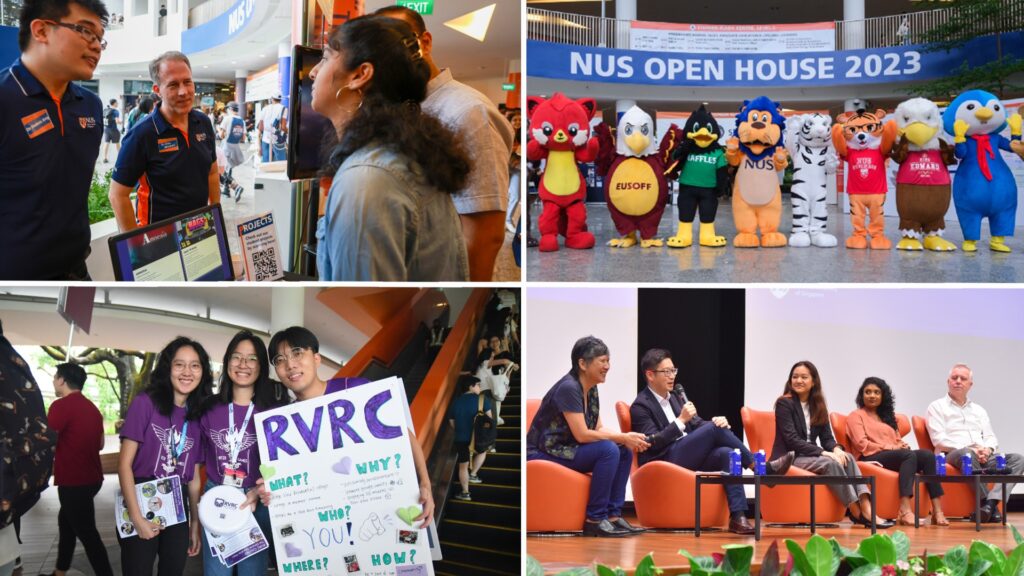
NUS Open House 2023 saw a strong showing by visitors eager to find out about the University’s academic programmes, as it returned from 25 February to 6 March. Some 7.71 million visitors attended the physical and online showcase which involved 3,071 faculty and staff, students and alumni.
Kicking off the 10 action-packed days were the informative virtual talks, webinars, and social media sessions. The on-campus event on 4 March saw packed crowds at the programme booths, talks, special classes, campus tours, student life performances and residential venues despite the heavy downpour. Prospective students gained valuable insights from faculty members, explored the University’s extensive global opportunities, as well as its diverse entrepreneurship platforms and lifelong learning courses, giving them a comprehensive overview of what NUS has to offer.
“I really enjoyed meeting the professors and students who are from the courses I'm interested in as I gained many insights from them on life in NUS and the various possibilities that are open for exploration,” said prospective student Karthika Warrier, an alumna from Raffles Institution who is considering applying to NUS Computing or the College of Humanities and Sciences (CHS).
Jasmine Chiam, an alumna from Nanyang Junior College (NYJC) who is interested in applying to CHS and NUS College, agreed. “The programme was well-run despite the fact that it was raining,” she said. “I felt that it was well-curated for students with different interests.”
A draw for many prospective students were CHS, the newly launched NUS College, and the College of Design and Engineering (CDE) – the University’s recent interdisciplinary pathways aimed at meeting the evolving demands of the workforce.
Addressing Shared Challenges with the Humanities and Sciences

CHS, which provides an enhanced undergraduate experience for students of the Faculty of Science (FOS) and the Faculty of Arts and Social Sciences to pursue breadth and depth across academic disciplines, showcased its Common Curriculum throughout the Open House.
Currently accepting its third intake, it held talks on hot topics such as sustainability, food science and technology, and mental health to demonstrate how students can apply various perspectives to address complex real-world issues.
The panel entitled “Why Sustainability and Climate Change Matter” saw speakers from the Geography, Japanese Studies, Anthropology and English, Linguistics and Theatre Studies departments weighing in on the topic from their respective disciplines. Another session by the Department of Food Science and Technology explained how its programme applies principles from chemistry, biology, engineering and nutrition to address issues such as food safety and security, as well as the careers its graduates can pursue.
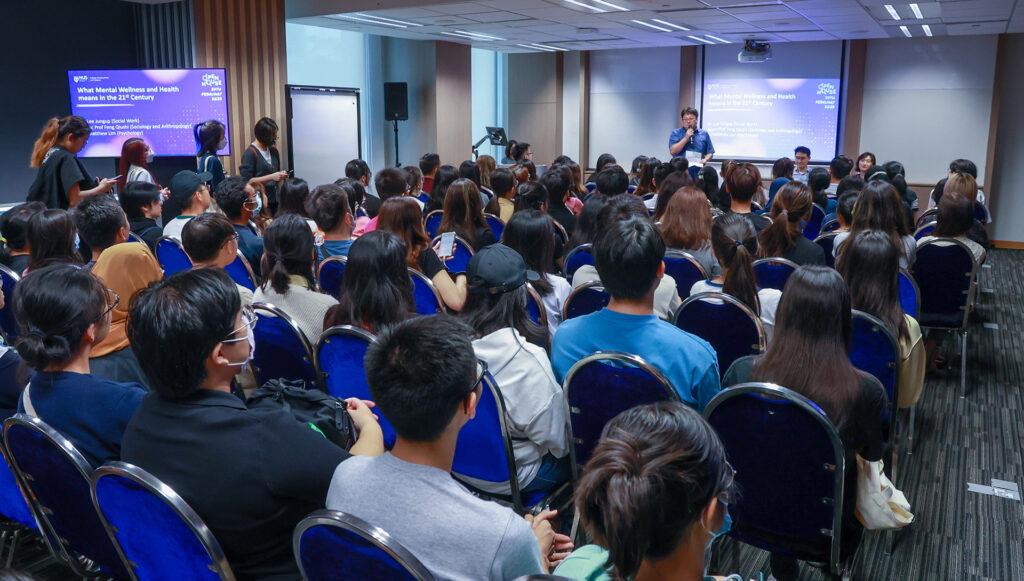
In the same vein, the panel “What Mental Wellness and Health Means in the 21st Century” saw speakers from the Social Work, Sociology and Psychology departments discuss perceptions of mental health in society. Dr Lee Jungup, an Assistant Professor in Social Work, pointed out the close relationship between social work and psychology. “Many of our Social Work students consider a double major with Psychology,” she said, noting that social work emphasises the practical while psychology is more theoretical and clinical in nature.
Jasmine, the NYJC alumna, said the various informative talks reaffirmed her decision to apply to NUS. “The NUS College tour as well as the CHS Common Curriculum sharing were particularly informative. They made the programmes seem quite appealing and I am looking forward to applying for both,” she said.
For some like Christian Chua, an alumnus from the NUS High School of Math and Science, attending the Open House talks helped clarify the career options available for the different programmes.

Christian, who is currently considering the Medicine, Pharmacy, and Pharmaceutical Science programmes, attended the Pharmacy talk and booth, where faculty members of different specialisations touched on the various career pathways and the collaborative practices of the discipline.
“It was useful that they discussed the different careers that Pharmacy graduates had gone into so I knew a degree in Pharmacy wouldn't just limit me to community or hospital pharmacy but also to the R&D, drug approval side, or the business side as well,” he said.
Shaping the Future of Design and Engineering
Meanwhile, there was action aplenty over at both the online and in-person Open House by CDE, which is accepting its second intake. Officially launched in November 2021, CDE was a merger of the Faculty of Engineering and the School of Design and Environment, ramping up the distinctive interdisciplinary experience at NUS.

From the Common Curriculum and the multidisciplinary education model, to the Student Exchange Programme and future career prospects, CDE faculty and students shared their insights on a plethora of topics with prospective students.
The talks, such as the one on Biomedical Engineering, Chemical Engineering and Materials Science & Engineering, also provided valuable information. Prospective students learnt how undergraduates are exposed to a range of interdisciplinary topics with global-scale applications in class, and how NUS engineers are taking on the world’s biggest challenges, such as clean energy.

The talk on Architecture, Industrial Design and Landscape Architecture also saw a large turn-out. Discussing the breadth and depth of CDE’s curriculum, it touched on how students will be equipped to face the 21st-century challenges through their education in CDE.
Kaisyn, who is graduating from Nanyang Polytechnic this year, said, “I appreciated that they covered the basic skills and activities done throughout the curriculum. It allowed me to confirm that the Industrial Design course is relevant to my study and career plan.”
The in-person Ask-Me-Anything sessions with student panels also allowed participants to get their burning questions answered.
Tee Jia Hong, a graduate of Anglo-Chinese Junior College who intends to apply to Industrial and Systems Engineering (ISE) and attended the student sharing, said, “By listening to the experience from the ISE senior, I am able to get the hang of the academic and co-curricular prospect of being an ISE student.”
Over at CDE’s Rise of the Robots campus tour, participants were given a look at the Advanced Robotics Centre, which displayed projects such as an autonomous wheelchair, an artificial robotic arm, and a haptic feedback machine.

Robert Lim from Singapore Polytechnic, who attended the tour, said, “It was a memorable experience . . . I was able to learn more about what the courses have to offer and what undergrad students have accomplished in NUS.”
Exploring experiential learning
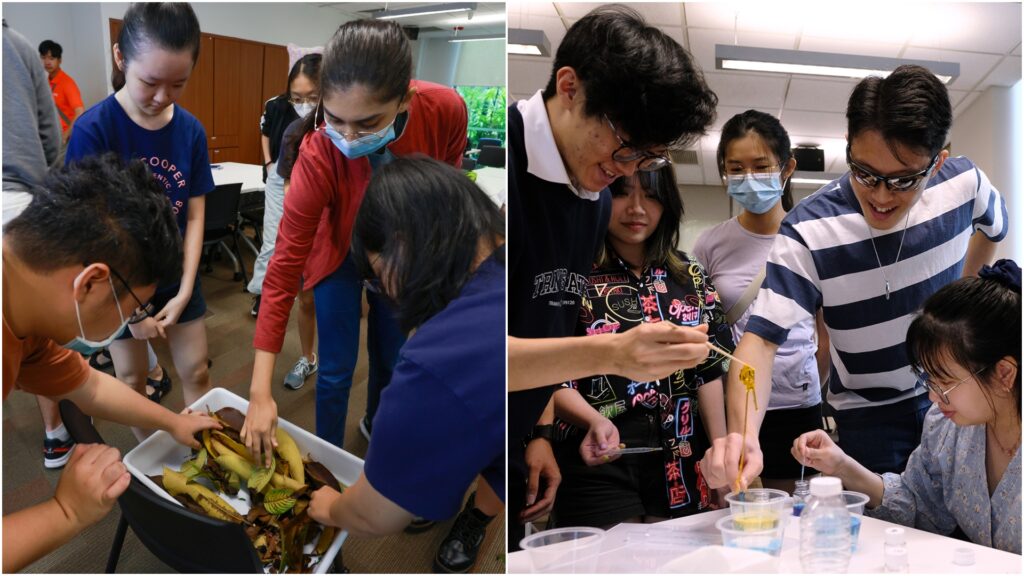
NUS College, Singapore’s first honours college, offered a glimpse of its flagship experiential learning programmes during its online and physical showcase. Faculty members highlighted the Impact Experience programme, where students develop solutions to real-world issues with community partners, and the Global Experience programme, which immerses them in global cities for specially curated courses and field visits based on specific themes.
The college, which is accepting its second intake, also held special classes for prospective students to get a feel of its small-group seminar-style lessons. Dr Ang Yuchen’s special class introduced his field course Biodiversity and Natural History in Singapore, which combines scientific concepts with the visual and language arts and environmental philosophy.
“I found the sample lessons useful in helping me not just get a sense of how lessons are conducted over at NUS College, but also how my potential Profs are like as teachers and facilitators,” said Eugene Teo, an alumnus of Raffles Institution, explaining that small, collaborative discussions was better suited to his learning style. Attending the Open House “also gave me a better understanding of the people I will be interacting with and the environment in which I would be studying in upon entering university life”, he added.

Interactivity was a prominent feature of the Open House. NUS Nursing offered visitors a chance to try basic wound treatment and resuscitation, while NUS Law held moot demonstrations at its Bukit Timah Campus.
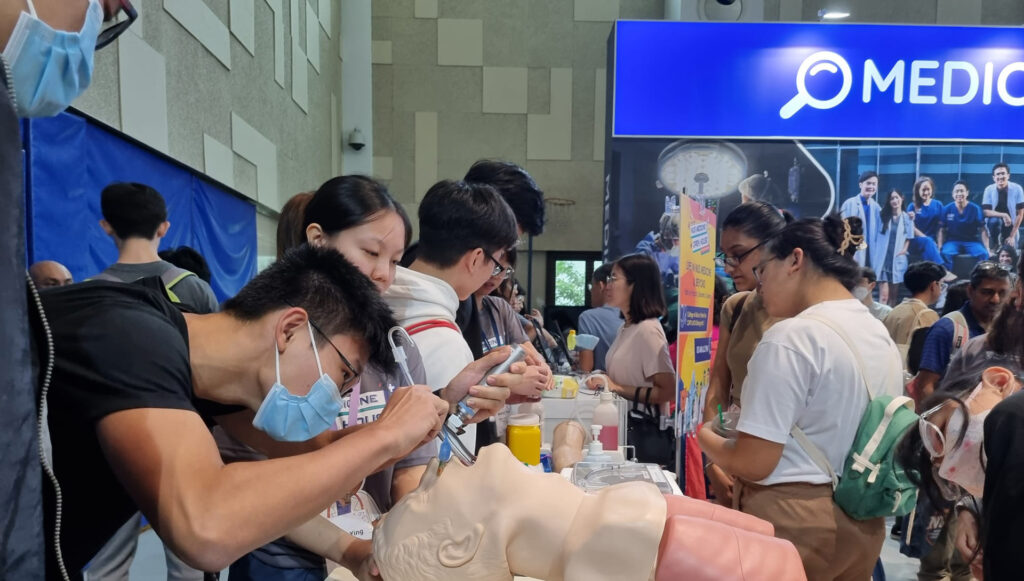 |
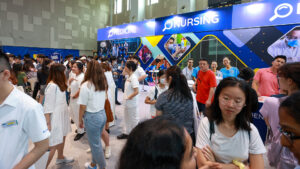 |
Aqirah Bte Azam, who will be graduating from Temasek Polytechnic in May, had the chance to see the Nursing students in action and attended a talk by its alumni. “Hearing their experiences in NUS and their careers have given me the courage to pursue my aspirations in nursing”, she said.

Smorgasbord of Student Life
Visitors also got a taste of the vibrant NUS student life on display. Student clubs and societies, as well as the Hall and Residential College (RC) interest groups, put their best foot forward at the Student Village.

Visitors were wowed by the striking moves of NUS Wushu, the energetic cheerleading displays of King Edward VII Hall’s KE Titans, and the snazzy K-pop dance moves of the Korean Cultural Interest Group. They were also treated to renditions of catchy tunes from Mandopop group NUS CAC Voices, acapella group NUS Resonance, Raffles Hall rock and jazz band RHockerfellas, and many more.

Representatives from the RCs, halls, and houses were present to offer prospective students the inside scoop on the on-campus experience. Complemented by A-Day-in-the-Life videos and 360° virtual tours, the booths, talks, and Ask-Me-Anything panels by student leaders gave participants a sense of the residential options at their fingertips.
“The House Life talk was the most enjoyable and informative event to me since the masters and students really explained to me what living in houses was like, while keeping us engaged through jokes and videos,” said Jia Hong.

Charlotte Toh from Singapore Polytechnic, said the Halls talk helped her better understand the hall culture and admission criteria.
Guided in-person tours of the various halls and residences, such as King Edward VII Hall, Tembusu College, Ridge View Residential College, and Residential College 4, opened a window to the close-knit community of residential life.
Samuel Liu, who graduated from National Junior College, said, “The well-guided tours and booths set up for each RC that I visited gave me a good indication of which RC would be most suitable for my character and goals.”
This story first appeared on NUSnews on 9 March 2023.
CHS@NUS OPEN HOUSE - 4 March 2023
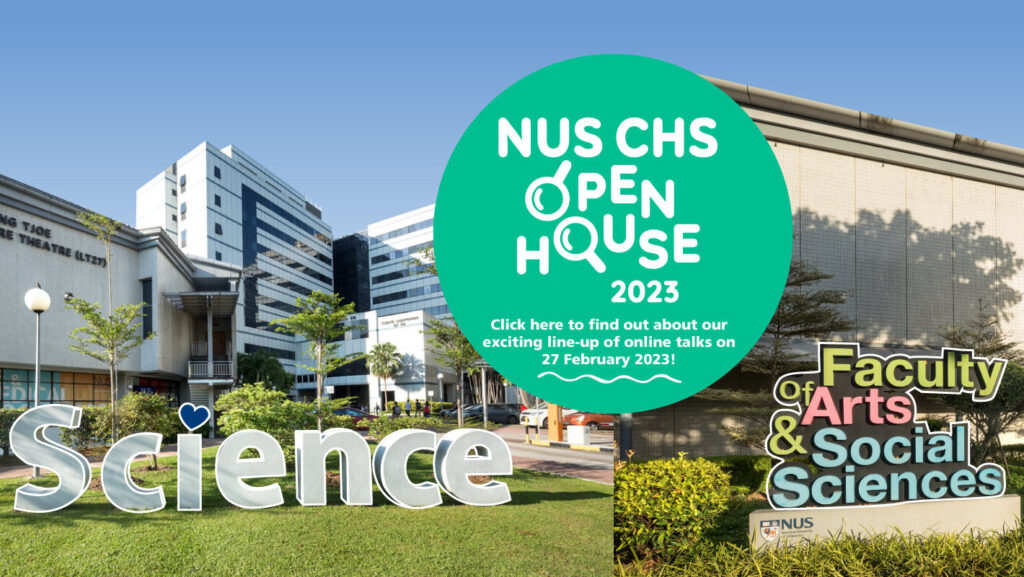 On 4th March 2023, NUS hosted an open house to showcase the various majors it offers. Visitors had the opportunity to tour our facility and learn about the majors we offer. Our faculty and administrative staff were on hand to answer questions and provide information.
We were thrilled with the success of the event, which generated a lot of interest and excitement in our majors. Overall, the open house was a wonderful success, and we are grateful to all those who came down to the open house. We look forward to continuing to work with our community to make a positive difference, and we invite everyone to stay tuned for future events and initiatives!
Click here to read more about Philosophy's talk during the open house
#NUSOpenHouse #NUSPhilosophy
On 4th March 2023, NUS hosted an open house to showcase the various majors it offers. Visitors had the opportunity to tour our facility and learn about the majors we offer. Our faculty and administrative staff were on hand to answer questions and provide information.
We were thrilled with the success of the event, which generated a lot of interest and excitement in our majors. Overall, the open house was a wonderful success, and we are grateful to all those who came down to the open house. We look forward to continuing to work with our community to make a positive difference, and we invite everyone to stay tuned for future events and initiatives!
Click here to read more about Philosophy's talk during the open house
#NUSOpenHouse #NUSPhilosophyFASS Inspiring Mentor 2022 Award Winners Announced

The NUS Faculty of Arts and Social Sciences is proud to announce the winners of the 2022 FASS Inspiring Mentor Awards.
Congratulations to:
- Assoc Prof Melvin Yap Ju-Min, Associate Professor, Department of Psychology
- Assoc Prof Robin Loon Seong Yun, Associate Professor, Department of English Language and Literature
- Dr Amazaki Osamu, Senior Lecturer, Centre for Language Studies
- Dr Natalie Pang Lee San, Senior Lecturer, Department of Communications and New Media
- Dr Kamalini Ramdas, Senior Lecturer, Department of Geography
The NUS Career Compass 2023
IN BRIEF | 5 min read
- Find out how the University has developed and broadened our curriculum to better prepare our graduates for the swiftly evolving workplace, and how interdisciplinary learning can help students solve complex issues in our society.

In collaboration with CNA938
How does NUS cultivate highly sought-after talents in the workforce of the future?
Find out how the University has developed and broadened our curriculum to better prepare our graduates for the swiftly evolving workplace, and how interdisciplinary learning can help students solve complex issues in our society.
This story first appeared on NUSnews on 23 February 2023.
CHS at NUS Open House 2023: Download the FASS Essentials on 27 February 2023
IN BRIEF | 10 min read
- On 27 February, get the full download on the essentials of academic programmes, student life, career preparation, overseas opportunities and financial aid at CHS via Zoom in the ‘virtual’ edition of CHS@NUS Open House 2023.

If you have not already marked your calendars for two dates with the NUS College of Humanities (CHS) during NUS Open House 2023, do it now!
On 27 February, get the full download on the essentials of academic programmes, student life, career preparation, overseas opportunities and financial aid at CHS via Zoom in the ‘virtual’ edition of CHS@NUS Open House 2023. Go to https://bit.ly/CHSatNUSOH2023-Virtual for the full 27 February programme.
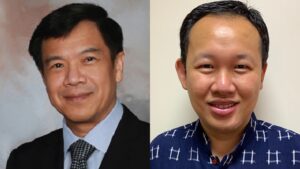
Then prepare to come on-campus on 4 March to engage with our award-winning faculty members, advisors and students to experience interdisciplinary education and explore your future vocation. Go to https://bit.ly/CHSatNUSOH2023-OnCampus for the full 4 March programme.
To help you plan your way through the lineup of FASS-specific talks and activities, read on for some of our highlights on 27 February 2023 that ought not to be missed.
Academics at the Forefront
The online edition of CHS@NUS Open House is meant to provide you with as comprehensive a briefing of what CHS, and its component Faculties of Arts and Social Sciences, and Science, have to offer students.
Academics is at the forefront and the day starts with a session devoted to the CHS Core Curriculum (9:00 – 11:00 am), a specially curated interdisciplinary programme that provides unprecedented freedom to choose the pursuit of breadth and depth across a broad spectrum of disciplines. This session will be led by Professor Sow Chorng Haur, Vice Dean (Outreach & Admissions), NUS Faculty of Science (FoS), and Dr Noorman Abdullah, Assistant Dean (External Relations & Student Life), FASS.
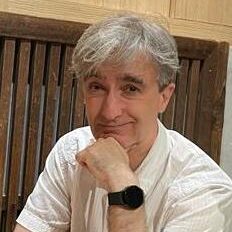
Associate Professor Luke O'Sullivan
The CHS Cross-Disciplinary Programmes
Three one-hour talks devoted to introducing Cross-Disciplinary Programmes (XDPs) offered by CHS will be running concurrently from 11:00 am. One programme FASS offers that embodies the concept of interdisciplinarity is the Philosophy, Politics, and Economics XDP, and the session for that will be led by Associate Professor Luke O’Sullivan (NUS Political Science) in discussion with fellow PPE Joint Programme Committee member, Dr Joel Chow (NUS Philosophy).
"This session is an opportunity to ask questions about the PPE-XDP. Philosophy, Politics, and Economics is a classic combination of disciplines that was first taught in Oxford and has spread globally because of its proven effectiveness. It brings together the ability to think about ideas in abstract and analytical terms, explore their practical implications for society, and model their costs and benefits in quantitative terms,” says Assoc Prof O’Sullivan. “PPE students can expect to develop a unique knowledge base and set of skills that leaves them suited for a wide range of careers in today's complex and fast-changing world."
Attendees are required to come prepared, because in addition to providing an overview of the PPE-XDP, Assoc Prof O’Sullivan expects audience engagement. Join the PPE-XDP session on 27 February at 11:00 am here.
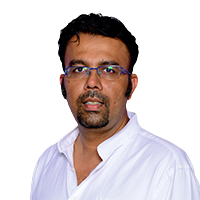
Associate Professor Rajesh Rai
Asian Studies @ CHS
NUS is recognised as a global centre of excellence in Asian Studies, where a multidisciplinary and comparative approach to the study of Asia and its regions is adopted. The session on programmes by the various Asian Studies departments at NUS (2:00 – 2:50 pm) will feature Associate Professor Rajesh Rai (NUS South Asian Studies), Dr Faizah Zakaria (NUS Malay Studies), Associate Professor Tham Shiao Wei (NUS Chinese Studies), Dr Clay Eaton (NUS Japanese Studies) and Dr Mohamed Effendy Abdul Hamid (NUS Southeast Asian Studies).
“You probably hear a lot about how Asia is the largest continent in the world, with the greatest diversity of cultures, philosophies, political thought and economic might, as well as scientific and technological advancement,” says Assoc Prof Rai, offering up a brief on the discussion he will be leading as moderator. “This session will take you through an interdisciplinary journey through history and current affairs to show you just how influential Asia has been a force for change, both positive and negative, on the world’s stage.”
Join this session by clicking here.

Humanities @ CHS
Learn more about the academic disciplines that focus on studying different aspects of the human condition from: Dr Donna Brunero (NUS History); Associate Professor John Whalen-Bridge, Associate Professor Graham Wolfe and Dr Leslie of NUS English, Linguistics and Theatre Studies; and Dr Zachary Barnett (NUS Philosophy).
“Do you: Ponder big questions regarding life, society, and culture? Wonder how language develops? Hold theatrical ambitions? Find yourself curious about connecting the past and present, the local and global?” session moderator Dr Brunero asks rhetorically. “If so, join us as we answer questions regarding our disciplines and share insights into how studying with us at NUS can broaden your horizons.”
To join Dr Brunero and her fellow speakers in this 3:00 - 3:50 pm session click here.

Social Sciences I: Same, Same but Different
This session features Dr Kamalini Ramdas (NUS Geography), Associate Professor Feng Qiushi (NUS Sociology and Anthropology), Dr Elaine Tan (NUS Political Science) and Dr Georgios Georgiou (NUS Economics), and will delve into their respective programmes as well as approaches toward forging a “collective identity”.
Session moderator Dr Kamalini explains. “This panel brings together social scientists from Economics, Geography, Political Science and Sociology to discuss what it takes to develop a collective identity as social scientists,” says Dr Kamalini, who will be working with her fellow speakers toward answering questions such as, “What are the benefits and challenges of a collective approach to learning and research? How might our students benefit from our commitment to engage?”
Click here to join the Social Sciences I (4:00 – 4:50 pm) session.

Social Sciences II: Understanding Social Complexity
Dr Adelyn Lim (NUS Sociology and Anthropology), Associate Professor Irene Ng (NUS Social Work), Dr Nina Powell (NUS Psychology) and Dr Alex Mitchell (NUS Communications and New Media) will be introducing the disciplines offered by their respective Departments, and show how they can each be applied to enable a deeper understanding of our world.
“The world we live in today can feel exciting but also downright contradictory. Global friendships are in many ways easier to make than in the past, yet we see terrorism, violent crime, wars, and enduring social inequality,” says session moderator Dr Lim, who will be discussing in detail with her fellow speakers complex issues thrown up by questions such as, “How did this world come about? Where are we heading in the future?”
To join the Social Sciences II (5:00 – 5:50 pm) session, click here.

Ms Sasiwimol Klayklueng
Foreign Language Studies: Passport to the World
Meet leading Language instructors Ms Sasiwimol Klayklueng (Thai), Dr Sandhya Singh (Hindi and Tamil), Ms Indianti Tjan (Indonesian), Ms Rungnapa Kitiarsa (Thai) and Ms Sophie Undorf Bouvier (French), who will elaborate on the Minor in Language Studies and Proficiency Certificates conferred by the NUS Centre for Language Studies, which are very much sought after by students looking to enhance their career prospects.
A Winning Vision of a City on Cleaner Energy in 2060
IN BRIEF | 15 min read
- NUS undergrads crowned national champions of Shell Singapore’s ‘Imagine the Future Scenarios’ competition.

Over the year-end holidays, six second-year students from the College of Humanities and Sciences and NUS College at the National University of Singapore banded together to take on the interdisciplinary challenge of envisioning what the future could be if a city ran on cleaner energy.
Signing up for the 2022/2023 ‘Imagine the Future Scenarios’ competition to dream up two such alternate scenarios for an Asian or Middle Eastern city, the students envisioned how Dhaka’s ability to tackle climate change and rapid urbanisation would chart the future of Bangladesh’s capital city, eventually emerging national champions in the competition.
This is the seventh edition of the competition organised by Shell Singapore to encourage students to use their knowledge and imagination to anticipate the future and the challenges it could bring.
Team leader for ‘Team DHAKA2060’, Sophie Du Toit, said she and her team mates were drawn to the competition’s blue-sky proposition which allowed breadth for exploration, creativity and critical thinking, while challenging participants to consider the future from a grounded, realistic perspective.
Sophie, who is currently majoring in Global Studies with a keen interest in what sustainability could look like for current and future generations, said, “It was the competition’s strong emphasis on future planning vis-a-vis a transition to green energy which really drew us to participate in it. The prospect of engaging a nexus of issues – governance, clean energy and urban resilience – in order to craft plausible scenarios of a world 30 to 40 years into the future was “both exciting and deeply interesting.”
The team spent two months researching and brainstorming to demonstrate how Dhaka can capitalise on its existing resources and investments to make the green switch and develop a strategy that can accommodate potential policy changes. This led them to formulate two divergent scenarios of what work, life and play would be like for the city’s future citizens in 2060.
In the first ‘Green Straitjacket’ scenario, they speculated on what a city governed by a centralised government, with strict domestic controls over energy production and supply, would look like. Conversely, in the second ‘Silicon Delta’ scenario, they envisioned the city under decentralised, laissez-faire governance with a high reliance on foreign powers for energy imports.
Elaborating on their choice of city, Daniel Poon, who is currently pursuing a double major in Chemical Engineering and Political Science, said, “The city of Dhaka presents many unique opportunities alongside challenges, which have generally been sidelined in favour of bigger-name cities in the region. It is our hope that our project will be able to convincingly demonstrate the potential and corresponding pitfalls of Dhaka’s industrial and social future in the decades to come.”
Using theatrics to take their audience on a journey
Having scoped out plausible visions for the city’s future, the team took on the challenge of creating a skit to bring their audience on the journey to a ‘future’ Dhaka in the year 2060.
Morris Yang, a Philosophy, Politics and Economics (PPE) major, said the group made a unanimous decision to go with a more unconventional approach instead of presenting a typical slide show to bring the concept to life. With the goal of engaging the audience through relatable characters and realistic scenarios, Team DHAKA2060 mustered up ‘theatrical courage’ to create a skit to project how life in Dhaka might be in 2060.
“A skit opens up another dimension for us to demonstrate their lives, hopes and dreams – and even their anxieties – beyond words and pictures.” This approach, explained Morris, was both risky and challenging as it was different from the structured academic presentations the students were familiar with in their university projects.
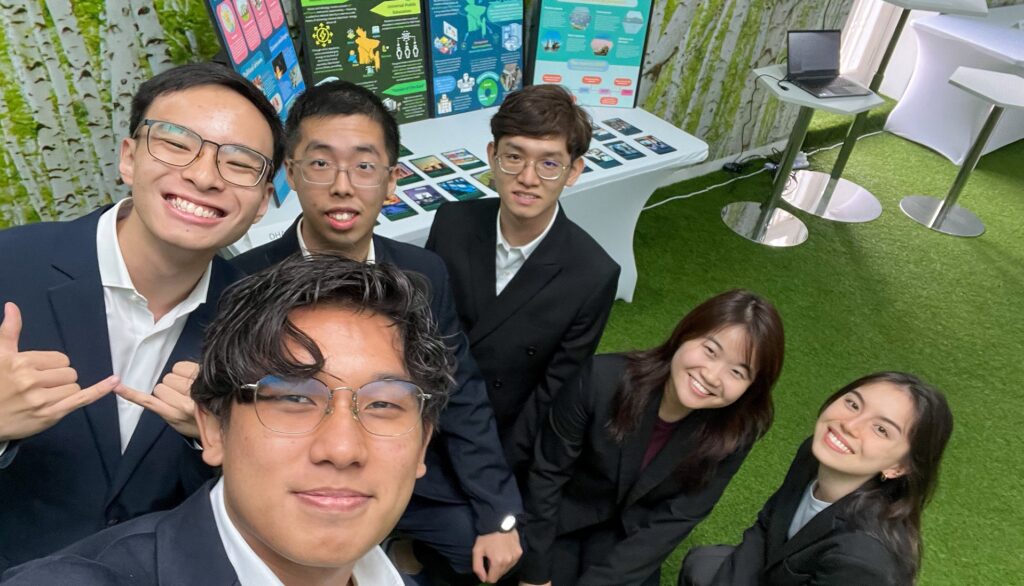
The team spent many evenings and nights rehearsing and polishing their skit in front of their classmate and residential hallmates. Not only did the rehearsals make for a fun experience, it unearthed hidden acting talent among the group and the risk taken paid off as the presentation turned out to be the most rewarding moment of the competition for each member.
“The theatricality of our presentation really immersed the audience in the worlds we’ve created. Being able to express our point with confidence was what helped us stand out in the competition,” said Eleyn Yap, a fellow PPE undergraduate.
History and Political Science double major Jeff Chin shared, “It was really gratifying to hear from the judges that they enjoyed our skit presentation and the energy it brought to the competition. The time and effort we put into bringing our ideas to life paid off, and it was a proud moment for us.”
Solutions that emerge from a confluence of ideas
Apart from daring to take a path less travelled in their presentation method, Team DHAKA2060 also credited the team’s win to its academic diversity which allowed them to consider multiple dimensions for each future scenario.
“While some of us were inclined to analyse the political possibilities for Dhaka, others pointed out (the) geographical constraints. The diversity in the way we think and see things became very obvious when it came to discussing Dhaka’s future. Everyone shared from their own perspective, yet ultimately, it was these differing and individual worldviews that strengthened the nuance of our case,” Eleyn said.
Iyan Danial Mohamad agreed that having many brilliant minds all pondering the logic of each idea helped immensely in ensuring they were sound. The Communications and New Media major who is also pursuing a double minor in History and Interactive Media Development, said, “Naturally, the fact that all of us came from different backgrounds as well also allowed us to expand the scope of our ideas, which was important so that we were able to cover more aspects of how a city could develop over the next few decades.”
“We were considerably more open to reiterating and challenging existing ideas without adhering to a dogmatic belief in the tried-and-tested,” said Morris.
Leaning on and trusting each other’s strengths, the team overcame their initial worry that they may have bitten off more than they could chew taking on a city that was rapidly evolving politically and socio-economically. However, it was the team’s varying view points and opinions that ultimately drove them to look at the issues from a macro perspective led to more convincing and multi-layered arguments that withstood questions from the judging panel.
This story first appeared on NUSnews on 10 February 2023.
The Modern Polymath | Joan Lim (Year 2, NUS College of Humanities and Sciences)
IN BRIEF | 15 min read
- Why undergraduate Joan Lim, 20, made the radical choice to study both Philosophy and Life Science, and how she is never too busy to learn something new.
 Science can explain the ‘what’ and ‘how’ but the humanities explains the ‘why.’
Science can explain the ‘what’ and ‘how’ but the humanities explains the ‘why.’
That is one of the reasons why undergraduate Joan Lim, 20, made the radical choice to study both Philosophy and Life Science — an unusual combination of subjects.
The passionate student is in her second year at NUS, where she has embarked on a double major at the NUS College of Humanities and Sciences (CHS).
While some might baulk at having to juggle the two disciplines, Joan is never too busy to learn something new.
“I am someone who is deeply curious about the world and I want to learn as much as possible from different perspectives, whether it is Chinese philosophy, jazz, film or marine biology,” she says.
A Thirst for the Truth
It was Joan's compulsory philosophy class in secondary school that first opened her eyes to the wonders of the subject and how fundamental it was in helping her understand other humanities subjects.
As a child, growing up in a nature-loving family also imbued Joan with a knack for the life sciences. She even did a two-month-long internship in JC with St. John's Island National Marine Laboratory (SJINML), where she spent two weeks on the island conducting experiments on coral feeding under the guidance of NUS researchers. Given that increased bleaching in corals means they can no longer rely on photosynthesis for food, Joan’s team researched the responses of corals to a variety of food types such as sediment, brine shrimp and even plastic glitter, which was used to simulate plastic.
So when the golden opportunity came to study both of her interests without sacrificing either, she jumped at it.
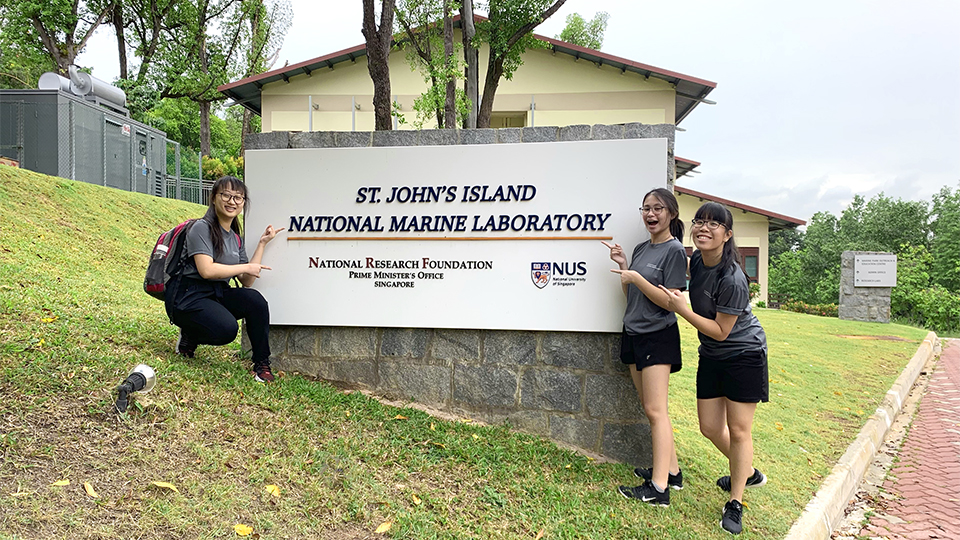
Cross-Pollinating
Though many have asked her which discipline she prefers, Joan is adamant that both subjects hold equal weight and room in her heart. "I would have been bored studying just one subject. This way, I use both sides of my brain!" she says, jokingly.
She also appreciates how NUS promotes holistic learning through mandated core classes where students get to interact with students from other faculties.
One particular course Joan fell in love with was Design Thinking, which required students from different majors to gather around a table and collectively brainstorm how to build a prototype with just cardboard and rolls of tape.
"The element of fun fosters a sense of openness and helps me approach problem-solving from different perspectives," Joan enthuses.
Active Learning
As someone eager to learn more about what the world has to offer, Joan is particularly fond of how NUS has a practical and hands-on approach to learning. Reflecting on her time as a student of the Life Science course Ecology and Environment, Joan recalls how her professor Mr Sivasothi N. taught them about Singapore's diverse flora and fauna by bringing them on nature walks at various parks.
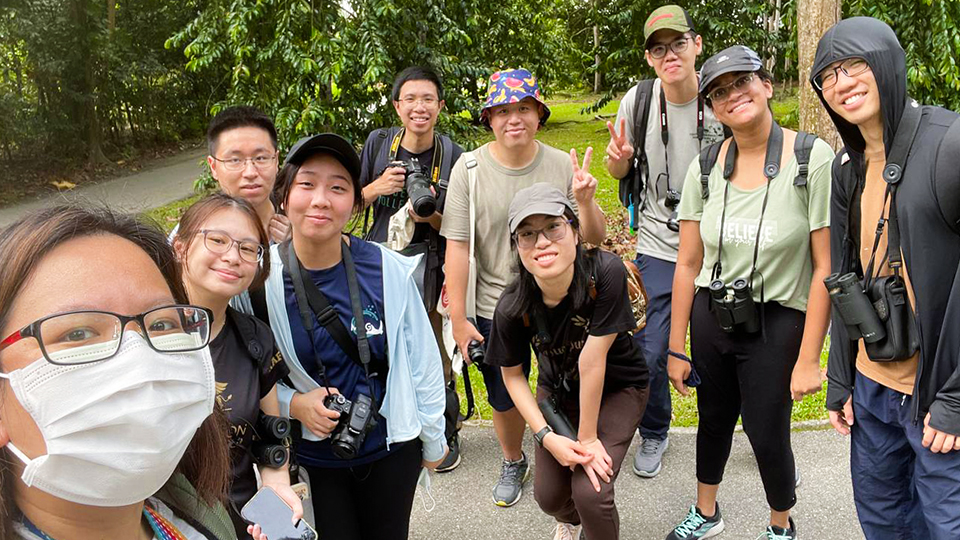
“NUS is a competitive school so many have the misconception that it’s mainly about grades and studying. But there are so many off-site experiential learning opportunities,” she says.
She also credits Mr Jonathan Sim, an Instructor at the Philosophy department, for mentoring her. His exuberant passion for Chinese Philosophy piqued her own interest in it.
After many requests from Joan’s seniors to learn more about Chinese philosophy, Mr Sim agreed to craft a curriculum on Confucianism under the Design-Your-Own-Module programme at NUS’ Summer School, which Joan was delighted to attend. She was struck by how diversity is a central part of Confucius’ notion of harmony, and could immediately see that importance of accommodating and accepting each other’s differences in her daily life.
Interpersonal Intelligence
Now, thrilled to be back on campus after spending her first year in Zoom classrooms, she revels in the spontaneity of face-to-face encounters with fellow students. “I see a lot of value in physical interactions! There’s a certain warmth to in-person human interaction that really speaks to how we are relational beings, ” she explains.
Outside of studying, Joan also spends a lot of time at extra-curricular activities as a genuine and heartfelt way to meet students from various facilities and walks of life. Joining the Varsity Christian Fellowship (VCF) , in particular, played a huge role in her university life as she learned how to love and care for her fellow students, whether it be through befriending exchange students or making exam care packs to encourage her friends. Joan laughingly reveals a personal connection to VCF: “It was actually where my parents met!”
She is also a member of the International Friendship Group Committee in VCF, which offers international students authentic local experiences through cultural events, open houses and other activities. “Just being in a space with different people is essential to me,” says Joan.
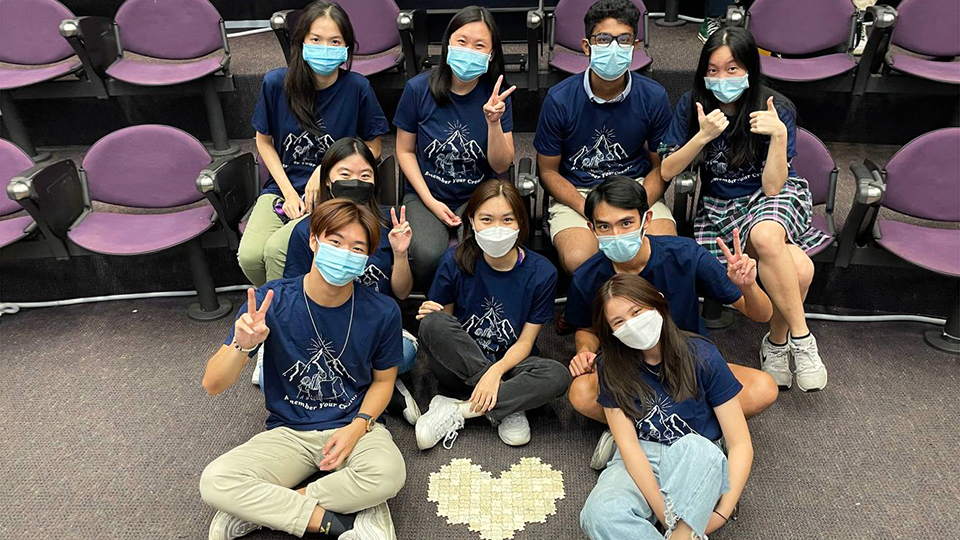
Connecting through Creativity
Joan is also passionate about the arts — as one might expect from a polymath!
A film enthusiast, she spontaneously entered — and eventually won — a short film competition called the Singapore Art Museum Project in 2020 that gave contestants only 48 hours to create a film based on a specific theme. “I like the challenge of being forced to think creatively and out of the box,” she adds.
In a recent project for the NUS Centre for the Arts, she decorated a Steinway piano by imprinting it with the painted hands of multiple NUS students, professors and alumni. Explaining the thought process behind her design choice, she says, “I could have painted it myself but I felt that this was more meaningful, and it allowed me to approach and meet new people.”
To Joan, this approach encapsulates the NUS culture as one that is filled with a sense of community, where people share what they have learnt and support each other.

Open-mindedness
Looking ahead at all the opportunities NUS has to offer, Joan is enthusiastic about participating in the upcoming Student Exchange Programme. She hopes to travel to either Canada or New Zealand to experience their temperate climates and the wildlife of a different continent.
She is also keen to continue studying environmental ethics, which marries her love for both philosophy and the life sciences.
It is no wonder, then, that Joan’s advice to juniors is simple: “Keep an open mind and remember that there’s always something to learn.”
This story first appeared on the NUS Office of Admissions website in January 2023.
Podcast: Is ChatGPT the start of a big revolution in education?
PODCAST | 27 mins
- Is ChatGPT the start of a big revolution in education?

A resounding yes, say our guests. Its scale, accessibility and sophistication underline some fundamental problems with the current education system. How will it change the way students learn and teachers teach and test? Steven Chia speaks to Toby Walsh, a professor of artificial intelligence and Jonathan Sim who teaches at the National University of Singapore.
Click here to listen: https://www.channelnewsasia.com/listen/heart-matter/chatgpt-start-big-revolution-education-3219431
Pre-University Educators Experience Interdisciplinarity at NUS
A delegation of teachers from Catholic Junior College (CJC) visited the National University of Singapore (NUS) campus on Tuesday (5 January 2023) as part of their annual Teacher’s Learning Retreat. With teaching expertise spanning various subjects and departments, they were keen to better understand interdisciplinarity at the NUS Faculty of Arts and Social Sciences (FASS), as well as how the learning experience differs between Junior College and University.
Participating in different panel sessions, the teachers heard directly from faculty and students, who shared their unique experiences and insights. Panelists included Dr Noorman Abdullah, Associate Professor Loy Hui Chieh, Dr Donna Brunero, Dr Denis Tkachenko, Dr Alex Mitchell, as well as two current undergraduates, Andrea Lim and Shruthi Kumar.
Exploration of New NUS Facilities
The delegation was also provided a tour of the newly renovated Central Library (NUS Libraries), where they were introduced to some up and coming technology, like the 360 Imaginarium, that NUS faculty have already incorporated into their teaching. The teachers were also allowed access to the rare bookbridge, where NUS houses its vintage and rare collections. Preparing Students to have the Best Educational Mindset
"Thank you for bringing together such a vibrant panel of Professors from diverse range of specialities. From this panel we can see how NUS is bringing together interdisciplinarity into the classroom. The discussion was rich, lively and extremely informative to understand how we can prepare our students to be future ready; “Ready for University, Learn for Life" said Vice Principal Philip Avlar.
"We welcome the opportunity to share our best practices, and insights from interdisciplinary curriculum development and delivery in FASS with Catholic Junior College teachers. The panel session and discussions were both candid and encouraging. It is always helpful to engage and connect with teachers of our future students, to share experiences and align our educational philosophy," said Dr Noorman Abdullah, Asst Dean (External Relations and Student Life).
"As both an NUS alumnus and Catholic Junior College educator - I myself am an interdisciplinary product from many years ago. I pursued Science and double majors in Economics and English Lit, purely driven by passion. It’s wonderful our students can pursue this seamlessly today. The panel sessions today were both enlightening and inspiring and provides us with lots of insights we can apply to our classroom and students," said Mervyn Sek, Head of Department (Project Work and Integrated Curriculum).
Artificial Intelligence
IN BRIEF | 5 min read
- "Chatbot ChatGPT can write essays and answer the toughest of questions but such artificial intelligence (AI) tools may not be able to take over humans just yet".

CNA938’s Asia First programme recently looked into the future impact of the artificial intelligence-powered ChatGPT chatbot and tools like it on the world and its people, and turned to #NUSPhilosophy instructor Jonathan Sim for his perspectives as an educator who has already incorporated it into an exercise for one of his classes.
“This is a place of learning, so we should actually teach them how to use it well, how to really take their learning further with it,” said Sim, who will be asking some of his students to use ChatGPT to generate an essay and then critique it, believing that they would learn to write better in the process.
Listen on for more: https://bit.ly/philo-jsim-chatgpt
Read the full article here: https://bit.ly/philo-jsim-chatgpt-article
The Half-life of Knowledge
IN BRIEF | 10 min read
- There is now an indisputable requisite to equip graduates with interdisciplinary knowledge and skillsets. We need both the agile lenses of interdisciplinarity as well as the deep-cutting laser of deep domain expertise. The former trains us to aim and focus the laser, while the latter allows us to cut to the heart of a problem.

| By Professor Tan Eng Chye |
“Teach a person to fish, and you may feed them for three-and-a-half years” may sound less inspiring than “Teach a person to fish, and you feed them for a lifetime”, but the former more accurately reflects the current realities of tertiary education.
Breaking news travels at warp speed, accelerated by social media and instant messaging. In a matter of minutes, news can reach the four corners of the world. Such interconnectedness highlights the leaps made in information technology over the years while underscoring a persistent and inexorable phenomenon – the reduction of the half-life of knowledge.
The half-life of knowledge, coined by Fritz Machlup in 1962, refers to the amount of time elapsed before half of the knowledge in a particular field is superseded or becomes obsolete. Given the speed with which knowledge develops and is shared, it is perhaps not surprising that this value is ever decreasing in many fields.
This phenomenon raises fundamental questions about our university degree programmes. How should a fresh graduate, filled with aspirations to change the world, deal with the harsh reality that a significant portion of their undergraduate training may be rendered irrelevant by the simple passage of time?
Distilling a degree programme is one possible, albeit drastic approach. We can consider equipping students only with evergreen core domain concepts. This training should take less time than our current degree programmes. As and when students require specific new knowledge, or need to upgrade existing knowledge, they can take short courses to bridge knowledge gaps and meet their professional needs. This type of “just in time” learning, also known as micro-credentialing, helps to circumvent the shortened half-life by injecting cutting-edge knowledge at just the right time.
Another less disruptive approach is revitalisation. We can maintain the current degree programme structure, but provide avenues for graduates to return to university in the future. Such short stints of study can follow existing models for bite-sized, self-contained courses, or semester-long study periods undertaken with the support of employers.
One certainty is that university study will cease to be just one stage of life. Instead, “university studies” will become the de facto way of studying, with a person continually refreshing and renewing their knowledge in tandem with or in anticipation of developments in industry, society and the world.
In anticipation of this, we created the NUS Lifelong Learners Programme (or NUS L3), which promises a 20-year period of student enrolment, from the point of undergraduate or postgraduate admission. In other words, a graduate of NUS can choose to come back to campus to take courses for at least 20 years from the day of matriculation.
Interdisciplinarity
Beyond the way knowledge is acquired, we are also grappling with working in an increasingly VUCA (volatile, uncertain, complex, and ambiguous) world. In such a context, can we continue to hold a siloed view of domain disciplines? In training law students, for example, we would be remiss not to show them basic programming, which can allow them to create customised commands to quickly and easily trawl through databases, with millions of legal records, to identify precedents.
Deep domain expertise is like a laser – a focused beam of knowledge that can cut through dense problems. However, real-world issues are increasingly multifaceted and ill-defined, often lacking a clear vulnerable spot at which a laser beam can be aimed.
As a mental experiment, consider the challenge of introducing autonomous electric vehicles to a city. This proposition involves urban design, city planning, the law, and engineering for accessibility. We can form a multidisciplinary team of experts, where each member is a domain expert, to tackle the issue. However, in all likelihood, we will encounter misalignment between domains, simply owing to differences in problem-solving methodology, thinking models or even nomenclature.
If we liken domain training to equipping students with specific lenses through which they can see and focus on information to solve a problem, then interdisciplinarity suggests that we should train students to operate across more than one domain. By educating them in core ideas from multiple domains and providing opportunities to apply their knowledge in authentic settings, students with interdisciplinary training can switch domain lenses as needed, solving problems using novel and unorthodox approaches that transcend domains.
To be clear, we are not advocating for dismantling deep domain training. Rather, we recognise that there is now an indisputable requisite to equip graduates with interdisciplinary knowledge and skillsets. We need both the agile lenses of interdisciplinarity as well as the deep-cutting laser of deep domain expertise. The former trains us to aim and focus the laser, while the latter allows us to cut to the heart of a problem.
NUS strongly believes in providing interdisciplinary pathways for our students. In 2020, we created the College of Humanities and Sciences (CHS) to provide an enhanced interdisciplinary undergraduate experience for students of the Faculty of Science and the Faculty of Arts and Social Sciences. CHS undergraduates can choose between deep domain training or the flexibility of interdisciplinary training of varying breadth and depth in modules offered by both faculties. Continuing our efforts to pave more interdisciplinary pathways for students, in 2021, we merged the School of Design and Environment and the Faculty of Engineering to form the College of Design and Engineering. More recently, NUS launched NUS College, Singapore’s first honours college offering pathways to more than 50 majors across a half dozen degree programmes. The aim of NUS College, as explained by its inaugural dean, Professor Simon Chesterman, “[is to offer] broad, interdisciplinary competencies that equip students for life, along with the opportunity to dive deep into areas in which you are passionate.”
To quote Charles Dickens, “It was the best of times, it was the worst of times, it was the age of wisdom, it was the age of foolishness.” Indeed, our experiences with the global pandemic and its effects on education over the past two years have given us the rare opportunity to engage in deep reflection and introspection. Witnessing the breakdown of resistance to adopting and adapting technology for teaching and learning during this time, we should be emboldened to re-examine and revolutionise some of our established, and perhaps outmoded, notions of how to offer higher education.
About the Author
 Professor Tan Eng Chye is President of the National University of Singapore. A passionate academic and educator, Prof Tan is a member of the World Economic Forum’s Global University Leaders’ Forum, as well as Singapore’s Future Economy Council, which is tasked with driving the growth and transformation of the country’s future economy.
Professor Tan Eng Chye is President of the National University of Singapore. A passionate academic and educator, Prof Tan is a member of the World Economic Forum’s Global University Leaders’ Forum, as well as Singapore’s Future Economy Council, which is tasked with driving the growth and transformation of the country’s future economy.
This article was first published in the Times Higher Education World University Rankings 2023 supplement and first appeared in NUSNews on 4 November 2022.
Call for Nominations | FASS Inspiring Mentor Award 2022
IN BRIEF | 3 min read
- We invite NUS FASS members of staff to nominate the colleagues who have served as their truly inspiring mentors - who have gone beyond the call of duty to positively impact their work and life - for FIMA 2022 honours.
Click through image below (or just write to fassmentoraward@nus.edu.sg) to file your nomination.
US-China Ties: Kissinger May Be Humanity’s Last Hope
IN BRIEF | 6 min read
- Distinguished Fellow of the Asia Research Institute and FASS alumnus (NUS Philosophy, '71) Professor Kishore Mahbubani recommends three steps the US and China can take to avert a further deterioration in ties.
Click through image below to read this piece.
This article first appeared in The Straits Times and NUSNews on 11 August 2022.
FASS Students Dominate 2022 USP Awards
IN BRIEF | 10 min read
-
NUS Faculty of Arts and Social Sciences (FASS) students have topped 9 out of 14 prize categories in 2022 University Scholars Programme (USP) Awards, achieving the USP Overall and Domain Prizes for academic excellence.
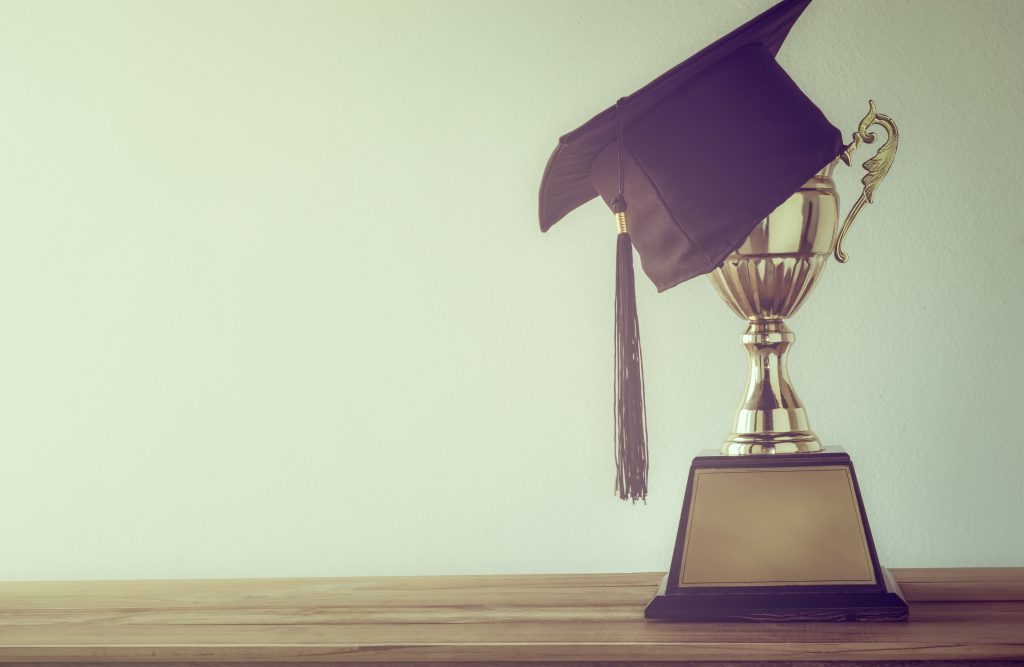
Students of the NUS Faculty of Arts and Social Sciences (FASS) in the University Scholars Programme (USP) have topped 9 out of 14 categories at the 2022 USP awards, including the Joanna Wong Medal, NUSS Medal for Outstanding Achievement, Izzudin Taherally Prize, Chan Bibe bte Syed Mohd Shah Prize, Albert Teo Prize, Tin Chew Hong Prize, Syed Ahmad Khan AMU Memorial Prize and Sung Kah Kay Memorial Prize. FASS students have also swept the USP Overall and Domain Prizes, with Philosophy, Politics, and Economics major Nickson Quak Jun Hao (Philosophy, Politics, and Economics) taking Best Overall Performance, in addition to sharing top spot with his compatriot Terence Mah (Psychology) under Best Performance in Science and Technology.And to stamp FASS’ dominance in this year’s awards, Archana Dhinakar Bala (Economics) – winner of the Joanna Wong Medal and the Syed Ahmad Khan AMU Memorial Prize – served as valedictorian for the USP commencement ceremony.
In full, the list of FASS winners of this year’s USP awards are.
Joanna Wong Gold Medal AwardPresented to the graduating student from USP who best embodies the ethos of the programme—demonstrating academic excellence and commitment to co-curricular activities.
Winner: Archana Dhinakar Bala (Economics) NUSS Medal for Outstanding Achievement
Presented to the graduating USP student with outstanding all-round achievements, who demonstrates academic excellence as well as significant participation in NUS students activities and/or impactful contribution in community service/voluntary work, preferably in leadership capacities.
Winner: Teow Jun Hao (Philosophy, Politics, and Economics) Sung Kah Kay Memorial Prize
For the graduating USP student who best exemplifies scholarship and academic excellence, and who demonstrates leadership in independent and interdisciplinary scholarship.
Winner: Yip Sze Kay (Majors: English Literature and Philosophy, Minor: French) Izzuddin Taherally Prize
For the graduating USP student who is well-rounded and has exemplified academic excellence and demonstrated a strong commitment to promoting interfaith dialogues or activities related to social harmony.
Winner: Ahmad Zaki bin Yazid (History) Chan Bibe Bte Syed Mohd Shah Prize
For the graduating USP student who is well-rounded and has demonstrated academic excellence as well as a strong commitment to wide-ranging learning through co-curricular acivites, or to community service.
Winner: Rachel Teng Ying Xin (Sociology) Albert Teo Prize
For the well-rounded graduating USP student who has exemplified academic excellence and demonstrated a strong passion for entrepreneurship or innovation in the social or business sector.
Winner: Peng Yun Ting (Philosophy, Politics, and Economics) Tin Chew Hong Prize
For the graduating USP student who is well-rounded, has exemplified academic excellence, and demonstrated strong commitment to community service preferably in the areas of eldercare, ageing or gerontology.
Winner: He Shiying (Major: Global Studies, Minor: Public Health) Syed Ahmad Khan AMU
For exemplifying academic excellence and reflecting a strong commitment or made a significant contribution to South Asian studies and culture.
Winner: Archana Dhinakar Bala (Economics) USP Prizes: Overall and Domain
For graduating USP students who have demonstrated academic excellence in USP modules.
- Best Overall Performance
Winner: Nickson Quak Jun Hao (Philosophy, Politics, and Economics)
- Best Performance in Humanities and Social Sciences
Winner: Belle Koh Rae Qi (Psychology)
- Best Performance in Science and Technology
Winners: Nickson Quak Jun Hao (Philosophy, Politics, and Economics) and Terence Mah Cai Jun (Psychology)
NUS Confers Honorary Degrees on Prof Tommy Koh and Prof Wang Gungwu
IN BRIEF | 10 min read
- The University also celebrates the achievements of 13,975 graduates from the NUS Class of 2022; Philanthropic gift to establish new professorship in humanities and sciences.

The National University of Singapore (NUS) today conferred its highest honour on two outstanding scholars and alumni: Professor Tommy Koh and Professor Wang Gungwu. They received honorary degrees from Mr Po'ad Mattar, NUS Pro-Chancellor, at the Main Ceremony of NUS Commencement 2022, which kicked off a series of 28 graduation ceremonies held over 10 days from 6 to 17 July.
The NUS Class of 2022 comprises 13,975 graduates: 7,571 students will receive Bachelor's degrees and 6,404 will receive graduate degrees.
Prof Koh was presented with the Honorary Degree of Doctor of Laws, in recognition of his significant accomplishments, contributions and impact on NUS and globally in various areas including international law, diplomacy, arts, culture and heritage, and nature and the environment, and his distinguished services to Singapore.
Prof Wang was conferred the Honorary Degree of Doctor of Letters, in recognition of his significant accomplishments and impact on NUS and globally in academia and education, his outstanding scholastic achievements and his contributions towards highlighting NUS as a significant research venue for multiple fields in Southeast Asia.
They joined some 200 graduates from the NUS Faculty of Arts and Social Sciences (FASS) who also received their degrees at the Main Ceremony held today.
NUS President Professor Tan Eng Chye said, "We are immensely proud to confer honorary degrees on two exceptional NUS alumni - Prof Tommy Koh and Prof Wang Gungwu - who fully embody the ethos of NUS. In their lifelong pursuit of knowledge and excellence, they have made a deep and lasting impact on Singapore and globally in their respective fields. NUS is truly grateful for their many years of dedication and service."
Addressing graduates from the Class of 2022, Prof Tan encouraged them to take hold of the great possibilities and rise above the uncertainties in a world of dynamic change. "I am fully confident that the graduates of NUS today share the same ethos of excellence and service as the community of generations past. In time to come, you will undoubtedly make your own unique contributions, and become the vanguard in elevating our collective prosperity and well-being."
This year, NUS will also be presenting pioneer graduates from 17 programmes (Please refer to the Annex 1 for the list of programmes).
2022 Honorary Doctor of Laws Recipient - Prof Tommy Koh

Prof Koh has dedicated his professional life to NUS, to Singapore, and to the world. He was a member of the first cohort of law students at the then University of Malaya - NUS' predecessor institution - from 1957 to 1961. With graduate degrees from Harvard and Cambridge, he joined NUS Law and went on to serve as Dean, later chairing the Faculty's Advisory Board for a decade. He has also served as Director and Chair of the Institute of Policy Studies (1991-2009) and Chairman of the Centre for International Law (2009-2022). He has also served as Rector of Tembusu College (2011-2022) and the Chairman of the Lee Kong Chian Natural History Museum's Advisory Committee (2015-2022). Prof Koh was appointed as Emeritus Professor in April 2022 in recognition of his distinguished careers at the faculty and outstanding contributions to the field of law.
In addition to this extensive service to NUS, he has also played key roles for Singapore, including as Permanent Representative to the United Nations (1968-1971, 1974-1984), and Ambassador to the United States (1984-1990). He was founding Chairman of the National Arts Council (1991-1996), Chairman of the National Heritage Board (2002-2011), and founding Executive Director of the Asia-Europe Foundation.
Prof Koh has also had a transformative role globally, including through his presidency of the United Nations Conference on the Law of the Sea (1981-1982) and chairmanship of the Preparatory Committee for and the Main Committee at the 1992 Earth Summit. He has received many honours, including an Honorary Doctorate of Laws from Yale University (1984), the Elizabeth Haub Prize for Environmental Law (1996), the UNEP Champion of the Earth Award (2006), and the Great Negotiator Award from Harvard (2014).
Please refer to Annex 2 for the citation.
2022 Honorary Doctor of Letters Recipient - Prof Wang Gungwu

Prof Wang is a leading figure in Sinology, a renowned public intellectual, and a visionary leader and administrator.
Professor Wang received his Bachelor of Arts (Hons) and Master of Arts degrees from the University of Malaya in Singapore. In 1957, he completed his doctorate on North China with University of London. His teaching career took him from the University of Malaya (Singapore and Kuala Lumpur, 1957-1968, Professor of History 1963-68) to The Australian National University (1968-1986), where he was Professor and Head of the Department of Far Eastern History and Director of the Research of Pacific Studies. From 1986 to 1995, he was Vice Chancellor of the University of Hong Kong.
In NUS, Prof Wang served in various leadership roles, including the Director of East Asian Institute of NUS (1997-2007), and Chairman of the Governing Board of the Lee Kuan Yew School of Public Policy (2005-2017). As a highly regarded scholar, his views and expertise have proven to be invaluable to policymakers and diplomats.
In 2007, Prof Wang was conferred the title of University Professor by NUS for his outstanding leadership to the University and community, and in 2009, he was awarded an Honorary Doctor of Letters to mark Cambridge University's 800th anniversary. In 2020, Prof Wang was awarded the Tang Prize in Sinology for his "trailblazing and dissecting insights on the history of the Chinese world order, overseas Chinese, and Chinese migratory experience". In the same year, he received the Distinguished Service Order in Singapore.
Please refer to Annex 3 for the citation.
About the NUS Peggy Wai Chee Leong-Hochstadt Professorship in Humanities and SciencesNUS also announced a generous gift by its illustrious alumnus and former top civil servant Mr Herman Ronald Hochstadt to establish the Peggy Wai Chee Leong-Hochstadt Professorship in Humanities and Sciences at FASS. Named after the late Mrs Hochstadt who was the first Chief Librarian of NUS, the University is privileged to honour her leadership and contributions to the NUS Libraries and to the NUS community.
Building on Mr Hochstadt's strong belief in the transformative power of education and in line with the spirit of cross-disciplinary learning at the NUS College of Humanities and Sciences (CHS), the new professorship will attract and support leading professors in the fields of English Language, English Literature, Theatre Studies, History, Philosophy, or Mathematics, further enriching and enhancing teaching and research in CHS.
Mr Hochstadt has been a long-time supporter of FASS and has previously set up the Hochstadt Scholarship in the Humanities in FASS in 2014. In 2019, NUS conferred on Mr Hochstadt the Distinguished Alumni Service Award, in recognition of his outstanding contributions to public service, and unwavering support for the NUS community.
This article first appeared in NUSNews on 6 July 2022.
Commencement 2022: Kickstarting a Season of Celebration and Achievement
IN BRIEF | 10 min read
- NUS celebrates the milestone accomplishments of 13,975 graduates through 28 in-person ceremonies.

A long-awaited season of celebration is officially under way, with the inaugural ceremony of Commencement 2022 marking the milestone achievements of some 200 Faculty of Arts and Social Sciences (FASS) graduates, and seeing the conferment of two Honorary Graduates, Professor Tommy Koh and Professor Wang Gungwu.
Taking place at the University Cultural Centre, the ceremony kicked off bright and early on 6 July to an effervescent buzz of anticipation from the graduates and their loved ones, inaugurating a total of 28 in-person ceremonies to be held over the following 10 days.
In keeping with the Commencement traditions and the proud ceremonial heritage of NUS, the ceremony showcased the pageantry of the Ceremonial Procession, the fanfare, and playing of the National Anthem, all culminating in the highlight of the ceremony-the presentation of graduates. Graduates from the Class of 2022 celebrated their achievements amid the applause of family and friends, a momentous apogee of their time in NUS.

Speaking at the ceremony, NUS President Professor Tan Eng Chye reflected on the qualities needed for graduates to thrive in today's dynamic environment: an attitude of resilience and adaptability to overcome challenges, and a willingness and boldness to view problems as opportunities, exercise creativity, and apply their skills and knowledge to create solutions.
"For the Class of 2022, you are crossing the threshold into a wider world of dynamic change and great possibilities, but also of discomforting uncertainty," he said.
"But I am fully confident that the NUS graduates of today share the same ethos of excellence and service to community of generations past. In time to come, you will undoubtedly make your own unique contributions, and become the vanguard in elevating our collective prosperity and well-being."
Contributions to Law, Nature and Culture: Prof Tommy KohTwo illustrious NUS alumni were also honoured as Honorary Graduates for the Class of 2022-lawyer and diplomat Professor Tommy Koh, and historian Professor Wang Gungwu.

In recognition of his dedication as a practitioner-scholar and decades of service to the University, Singapore, and the world, Prof Koh, who wears many hats including Ambassador-at-Large at Singapore's Ministry of Foreign Affairs, Special Advisor of the Institute of Policy Studies, and founding Rector of NUS' Tembusu College, was conferred the Honorary Degree of Doctor of Laws.
Highlighting three areas on which he has focused his energies - law, nature, and culture - Prof Koh said, "I chose to study law, not to enrich myself, but to pursue justice and to promote the rule of law."
He also spoke about his work concerning nature and the environment, including chairing the 1992 Earth Summit, being patron of the Nature Society, and helping NUS establish the Lee Kong Chian Natural History Museum as its founding Chairman. "My vision is to live in harmony with nature. My agenda is to promote sustainability in all our endeavours," he added. "I am [also] glad that I have been able to play a very small role in transforming Singapore, from a cultural desert to a cultural oasis."
Delivering the citation for Prof Koh's conferment, Professor Simon Chesterman, Vice-Provost (Educational Innovation) and Dean of the NUS Faculty of Law and NUS College, referred to Prof Koh's "academic milestones [which] are but one strand of the rich tapestry of his professional life", as well as his leadership and guidance in education at NUS, and his eminent contributions to state and environmental diplomacy.
An Inspiring Story Worth Retelling: Prof Wang GungwuProf Wang, one of the world's foremost experts on the Chinese diaspora and Sino-Southeast Asian historical relations, was conferred the Honorary Degree of Doctor of Letters, the latest in a long list of accolades that includes the prestigious Tang Prize in Sinology, and the Distinguished Service Order of Singapore.

Reflecting on his time as a student of the University in colonial Malaya, Prof Wang said: "You can imagine how happy I am to be a graduand again with my alma mater. The university gave my generation a good start in life. It went on to adapt to the rapid changes of our time. In so doing, it has come out better and stronger."
He spoke about the "inspiring story worth retelling" of how the University had set out and followed its own aspirations, becoming a major centre of learning by being actively connected to the world, as well as regularly reinventing itself.
"The way our university strives to keep our humanity always in our sights is something to be very proud of. I hope that all of us graduating today, no matter where life leads us, will never hesitate to help our university to enhance this capacity to advance our human condition," Prof Wang stressed.
Prof Lionel Wee, Dean of FASS and co-Dean of the College of Humanities and Sciences, who delivered the citation on Prof Wang's conferment, lauded the latter as "an eminent figure and brilliant mind" who has made manifold contributions as a leading figure in Sinology, a renowned public intellectual, and a visionary leader and administrator at leading academic institutions around the world.
"This doctorate symbolises the meaningful connections between Professor Wang and the University, and it celebrates the long-standing contributions and value that Professor Wang's scholarly insights bring to Singapore, to Southeast Asia and, indeed, to the world," he said.
Parsing the Path ForwardInfusing the celebrations with a spirit of introspective gratitude, Valedictorian Mr Nickson Quak, who is graduating with a Bachelor of Arts with Honours (Highest Distinction) in Philosophy, Politics, and Economics said, "As varied as our journeys may have been, each and every one of us graduates here could have only made it thus far because of the unwavering support that our parents, our families, our loved ones, and our friends have so generously afforded us."

His words further summarised the spirit of determination and community that will carry graduates onwards in their lives: "If [the journey ahead] appears daunting to you, I say to you: fret not… because when you look to your left and your right, you see the resilient men and women who, forged by the challenges brought upon by the global pandemic, will always offer you a helping hand."
This story first appeared in NUSNews on 6 July 2022 as part of NUS News' coverage of Commencement 2022, which celebrates the achievements of our 13,975 graduates through 28 in-person ceremonies. For more on Commencement, look out for our upcoming graduate profiles, check out the official Commencement website, or look up (and tag) #NUS2022 and #NUSFASS on NUS' and FASS' social media channels!
#ICYMI: FASS@CHS Open House 2022 — View On Demand Here!
IN BRIEF | 3 min read
- If you missed the NUS College of Humanities Open House 2022, worry not. All the talks and engagement sessions of 11 and 14 May are available for your viewing on-demand here.
Prospective students considering their offer but have missed the NUS College of Humanities Open House 2022 do not have to worry about missing out on information and insights they may need to make their decisions.
All the talks and FASS@CHS engagement sessions listed below are available for your viewing on-demand here or at https://bit.ly/FASSatCHSOH2022.
NUS CHS Open House 2022 Online (11 May 2022)
- Introduction to CHS, CHS Core Curriculum, Student Experiences & Learning Pathways
- Experiential Learning & Career Preparation, and Student Leaders Sharing
- BES-XDP (Bachelor of Environmental Studies Cross-Disciplinary Programme)
- DSE-XDP (Data Science and Economics Cross-Disciplinary Programme)
- PPE-XDP (Philosophy, Politics, and Economics Cross-Disciplinary Programme)
Introduction to CHS
Experiential Learning, Career Preparation, Student Leaders
BES-XDP
DSE-XDP
PPE-XDP
South Asian Studies
Education@FASS Depth, Diversity, and Difference I (11.30–1200)
Communications and New Media
Languages
Chinese Studies
Education@FASS Depth, Diversity and Difference II (1430–1500)
Anthropology
Economics
FASS@CHS Open House 2022 On-Campus (14 May 2022)
- The CHS Common Curriculum: FASS@CHS Integrated Modules
- South Asian Studies
- Education@FASS: Depth, Diversity & Difference I (11.30 am -12.00 pm)
- Communications and New Media
- Languages
- Chinese Studies
- Education@FASS: Depth, Diversity & Difference II (2.30 -3.00 pm)
- Anthropology
- Economics
NUS CHS Open House 2022: Discover #Interdisciplinary Education!
IN BRIEF | 5 min read
- The NUS College of Humanities and Sciences is hosting its Open House 2022 next week and all prospective students who have received offers are invited!
- A two-day hybrid programme – 11 May on Zoom (and viewable on CHS’ Facebook page) and 14 May on several locations across the NUS Kent Ridge campus, specifically the areas around the Faculty of Arts and Social Science (FASS), and the Faculty of Science (FoS) – CHS Open House 2022 aims to address all concerns a prospective undergraduate may have before committing to academic at the University and College.
- Highlights include opportunities to engage, discuss and explore academic pursuits, career development and student life at the College with key faculty and administrative staff and leadership — live and in person.
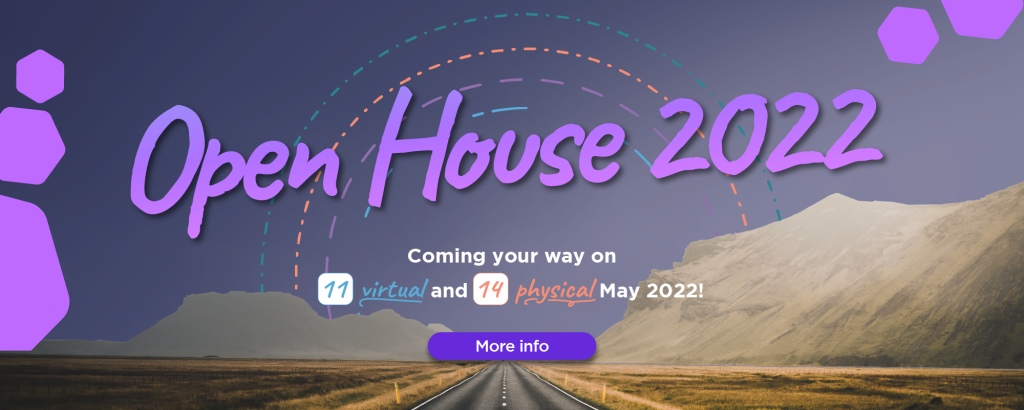
The NUS College of Humanities and Sciences is hosting its Open House 2022 next week and all prospective students who have received their offers are invited. As the deadline for them to accept their offers is looming, CHS has put together a programme aimed at answering all the questions they may have and clarifying all their concerns as much as possible.
Marking a cautiously calibrated return of the University to the normalcy of hosting large on-site events, this year’s CHS Open House is a two-day hybrid programme: 11 May on Zoom (and viewable on CHS’ Facebook page) and 14 May on several locations across the NUS Kent Ridge campus, specifically the areas around the Faculty of Arts and Social Science (FASS), and the Faculty of Science (FoS).*
11 May 2022 (Wednesday): The Essentials, OnlineThis a series of comprehensive information sessions (on Zoom and livestreamed on Facebook Live) covering everything new undergraduates need to know to get the most out of their education journey with CHS, including the:
- CHS Core Curriculum
- College’s three challenging but rewarding cross-disciplinary programmes
- Data Science and Economics (DSE-XDP)
- Environmental Studies (BES-XDP)
- Philosophy, Politics, and Economics (PPE-XDP)
- myriad Learning Pathways laid for you
- versatile career development programmes designed to prepare you for the future workplace
- CHS Student Experience—eye-opening and busy, yet energising and enriching
Speakers and panelists include CHS Co-Deans, Vice-Deans, key faculty staff members, career preparation and student services leader.
For more information and links to the 11 May sessions, click here.
14 May 2022 (Saturday): Get Personal, On CampusThe College is calling for prospective students to come on site, visit where they could well be spending their undergraduate years very soon, and speak to their future instructors and potential mentors. The full-day programme – running in key FASS and FoS locations across the NUS campus – offers:
- entry to witness and even participate in talks/lectures and panel discussions presented and hosted by award-winning instructors on a variety of academic subjects, interdisciplinary topics and specialised research areas
- face-to-face engagement with faculty, admin and student representatives from ALL Departments and student organisations under CHS, and opportunities to explore academic, financial aid and student activity options with the people in the know
- consultation with the career development teams of CHS
- guided Walking Tours across the facilities of FoS and FASS
For more information on the activities planned for 14 May, click here.
Discover Your #Interdisciplinary Future @ CHSThis Open House is the last chance for prospective students to learn more about the complete #interdisciplinary educational experience that they can expect at CHS. One that opens up a world of possibilities and equips them with skills and knowledge across the humanities, social sciences, physical sciences and applied sciences. One that inspires, cultivates and prepares them to work across diverse industries and sectors, with multidisciplinary teams, to solve some of the most complex wicked problems facing the world today — from social inequality to food shortage, unsustainable development and global warming. And one that grooms them to be the leaders of public institutions and private enterprise tomorrow.
* Campus shuttle bus services will be made available on 14 May to all visitors for easier movement across campus, which extends to Kent Ridge MRT.
FASS Undergraduate in Global L'Oréal Case Competition
IN BRIEF | 15 min read
- In April 2022, a team led by Year 3 NUS Philosophy student Aingeal Keong (also President of the Philosophy Interest Group at NUS) came ahead of more than eighty teams in the Green Track to clinch a spot in the International Semi-Finals of L'Oréal Brandstorm 2022, a competition challenging anyone below the age of 30 to pitch ideas for a more inclusive, sustainable, and revolutionised beauty industry.
- The team named ré: hydrate will be travelling to Paris in May, becoming one of only three teams (along with the winners of the Inclusivity and Tech tracks) to represent Singapore in the global semi-finals.

In April 2022, a team led by Year 3 NUS Philosophy student Aingeal Keong came ahead of more than eighty teams in the Green Track to clinch a spot in the International Semi-Finals of L'Oréal Brandstorm 2022, a competition challenging anyone below the age of 30 to pitch ideas for a more inclusive, sustainable, and revolutionised beauty industry.
The team named ré: hydrate will be travelling to Paris in May to represent Singapore on the global stage. We caught up recently with Aingeal, who is also the President of the Philosophy Interest Group at NUS, and asked her why and how her team came upon the idea of water-free skincare, and their thoughts on becoming one of only three teams (along with the winners of the Inclusivity and Tech tracks) to represent Singapore in the global semi-finals.
Congratulations on coming ahead of more than 80 other teams to clinch a spot in the International Semi-Finals! How do you and your team feel about being national champions?We're extremely excited and grateful to have our ideas recognised amongst many capable teams! With this being my first case competition, it was a really eye-opening experience to be in a room full of talented and friendly people that I can get to know and learn from! Tell us more about what your team, ré: hydrate, pitched.
Our idea revolves around re-inventing the way we use skincare. Traditionally, products like serums, creams, and body soaps contain 60-85% water — and that adds to the shipping freight cost as well as strains local water supply at manufacturing plants. We aim to make L'Oréal the leaders in water sustainability by pivoting the industry towards water-free skincare. This would mean powders, bars, and even tablets! How did your team come up with this idea in the first place?
Many people talk about plastics and carbon emission when it comes to sustainability. However, there is more to sustainability than just that. We decided to work on an oft neglected part of the sustainability movement for the Green track—water scarcity!

I found out about the existence of case competitions just this year, actually! I've been working at a sustainability-focused corporate venture while studying this semester, and the idea of pitching a business idea revolving around sustainability really intrigued me. When I saw the call for submissions for L'Oréal Brandstorm, I just knew I wanted to try something completely new and different from what I usually do in Philosophy or at work.
On a more personal note, I'm very passionate about finding solutions to push industries towards adopting sustainability practices. With so much greenwashing going around, I'm eager to find ways to push for more impactful sustainable business practices. Sustainability is a holistic endeavour, and that means looking beyond carbon credits—we need to look at things like water and energy consumption that are often overlooked, but integral in everyday sustainability practices.
How will the International Semi-Finals be different, and do you feel that the team is prepared, both emotionally and mentally?Previously, we were judged by our presentation, which consists of 10 slides. However, at the International Semi-Finals, we'll be judged based on our 1-minute video submission and a 1-page infographic. Also, there's a public voting element to it—so we'll definitely need to garner the support of our fellow Singaporeans to bring Singapore to the International Finals! What do you think can be done to inspire others to think like you and work toward the same cause?
A lot of education, definitely! We need to bring forth awareness that sustainability is multi-faceted, and it requires us to make the push for solutions that can be adopted industry-wide. Businesses have the means and capabilities to make the shift, so it's in our interest to have them adopt solutions that are not only beneficial to them (monetarily speaking), but also have positive externalities on the world. Is there anything more you'd like to share with us before you head off to Paris?
Look out for the voting window, which will open on 2 May 2022! We'll need everyone's support to bring Singapore all the way to the International Finals, so be sure to get your votes ready for Team ré: hydrate (Green Track), Team Translucent (Inclusivity Track), and Team WINx Tech (Tech Track) SG.
—Story by Yuki Koh
If These Walls Could Talk
IN BRIEF | 15 min read
- The Bukit Timah Campus is a throwback to NUS’ early beginnings and a rarity in Singapore’s modern built environment. For close to a century, generations of students have passed through the campus, their memories adding to its long history — a story that continues to be written.

A history major, Ms Elizabeth Tan (Arts and Social Sciences ’09) has a healthy respect for the past. So, when she pursued a Master in Public Administration at NUS Lee Kuan Yew School of Public Policy (LKYSPP) in 2019, the sense of history at Bukit Timah Campus (BTC) — where LKYSPP is located — was apparent to her from the first day of class.
“The buildings at BTC are unique, with British colonial-era architectural features such as the arched corridors, pillars and red pitched roofs,” says Ms Tan, 37. She was also struck by the quotes from famous figures that adorn the walls of the buildings, particularly one from former Prime Minister Lee Kuan Yew (’41), who had briefly studied at BTC (then called Raffles College) between 1940 and 1941. “Knowing that Lee Kuan Yew had studied there before, and that the School is named after him, provided a sense of continuity and awe. As a student, I felt inspired and empowered by the setting.”
That said, one need not be a history buff to appreciate the special place that BTC holds in the larger Singapore story — and in the hearts of those who consider themselves privileged to have studied there. Through conversations with BTC alumni of yesteryear as well as more recent times, and with faculty leaders who helped usher in NUS’ ‘second act’ with BTC in the mid-2000s, The AlumNUS strings together a narrative of a campus steeped in tradition, while still fit for 21st-century learners.
It was easy to run into and make friends with peers from different faculties. I’m still close to them, after nearly 50 years.
Mr David Ho, a senior alumnus from Bukit Timah Campus
The Good Old DaysIn many ways, students attending BTC today have inherited a space that is not too different from the one created for the inaugural batch of 43 Raffles College students in 1928. Much of the campus’ original layout and architecture remains intact — the two quadrangles (grassy courtyards) flanked by stately, low-rise buildings with covered walkways and wide arches; the majestic Angsana tree at the Lower Quadrangle, planted shortly after the campus was built; the pylon-like tower and the two small domes distinguishing the roof of the Manasseh Meyer Building; and the circular driveway leading to the main entrance in front of Oei Tiong Ham Building. Even the names of these buildings have been kept, in a nod to BTC’s earliest benefactors.
It all started back in 1918, when the British colonial administration proposed the establishment of a college to mark the centenary of Singapore’s founding by Sir Stamford Raffles. The idea was supported by local communities, and notably by individuals such as Oei Tiong Ham, Manasseh Meyer and Eu Tong Sen — prominent businessmen and philanthropists of the day — who made large donations. A decade later, on land formerly part of the Singapore Botanic Gardens, Raffles College commenced operations as the first institution for tertiary education in the arts and sciences in British Malaya.

As the years passed and student numbers increased, the campus was steadily expanded to cater to their growing needs. More buildings were constructed between the 1940s and 1960s, including a new wing simply named Block A, a Library Building, a geometric-style Block B and a 10-storey Science Tower. It was also around this time that Raffles College was upgraded to university status and underwent a couple of name changes, to the University of Malaya in 1949 and then the University of Singapore in 1962.
This latter period in BTC’s history was the one that Professor Kishore Mahbubani (Arts and Social Sciences ’71), currently a Distinguished Fellow at NUS’ Asia Research Institute, entered as a young philosophy student. As the 73-year-old wistfully describes, there was a “magical aura” about the place. “It was a wonderful campus, very green and welcoming. I remember sitting for hours and hours in the library, devouring philosophy books…. Back then, the Philosophy Department was very small; I think there were fewer than 20 students and only six or seven professors. The professors were all open and accessible, and we socialised a lot with them, which is quite unusual now.”
For economics major Mr David Ho (Arts and Social Sciences ’72), his experiences outside the classroom were just as memorable as those inside, if not more so. “Our cohort was heavily involved in student activism — and our Class of ’72 is proud to have seven elected Members of Parliament,” says Mr Ho, also 73. The small, intimate campus bred familiarity as well. “It was easy to run into and make friends with peers from different faculties. I’m still close to them, after nearly 50 years.”
CAMPUS MILESTONES: ACT 1

1928
Raffles College is established at 469 Bukit Timah Road to provide tertiary education in the arts and sciences.
1941–1945
All academic activities are suspended during World War II as the College is turned into a medical facility, before being seized by the occupying Japanese military.
1949
Raffles College merges with the King Edward VII College of Medicine to form the University of Malaya, the first university in British Malaya.
1962
The Bukit Timah and Kuala Lumpur branches of the University of Malaya split up, and the former is renamed the University of Singapore.
1980
The University of Singapore merges with Nanyang University to become the National University of Singapore (NUS).
1981
NUS moves out of Bukit Timah to its current main campus at Kent Ridge.
However, it was only a matter of time before the University outgrew its campus and had to relocate to a bigger site. That moment came in 1981, not long after yet another name change to the present National University of Singapore. After NUS moved to its current main campus at Kent Ridge, the Bukit Timah site was subsequently occupied by other tertiary institutions, including the National Institute of Education (NIE), from 1982 to 2000; and Singapore Management University (SMU), from 2001 to 2005.


The shift to Kent Ridge heralded an ambitious new era for NUS, as it strove to excel further in both education and research, and become one of Asia’s top universities. By the early 2000s, NUS had arrived on the world stage and was well-regarded as a research-intensive university. Yet despite all this success, there was a nagging sense among many that something was missing: that without BTC — without a tangible heritage to hold on to — the University was incomplete.
Professor Shih Choon Fong, who served as NUS President from 2000 to 2008, picked up on this sentiment early in his tenure. “In my meetings with senior alumni who had graduated from BTC, they described feeling unmoored and expressed dismay and frustration because they didn’t have a place to call ‘home’,” he recalls. Although not an NUS alumnus, Prof Shih — who had studied at Harvard University and whose heart still “beats faster” whenever he goes back there — understood how they felt. “BTC is an integral part of NUS, and of the lives of those who studied there. It is where generations of alumni spent their most formative years, not just learning but making lifelong friendships and, sometimes, finding lifetime partners. I would say BTC is the ‘cradle’ of NUS. In fact, you could say BTC is the ‘cradle’ of all universities in Singapore,” Prof Shih explains. As NUS President, he was also acutely aware of the importance of honouring and preserving the University’s past; otherwise, NUS would lack rootedness and “roll like tumbleweed”, and its alumni would feel less connected to their alma mater.

With NUS’ centennial celebrations approaching in 2005 and SMU slated to move to Bras Basah in July that year, the timing seemed right to fight for the soon-to-be-vacated Bukit Timah premises. Prof Shih commented on this at NUS’ Commencement Dinner in July 2004, where he used the metaphors of the “Lexus” for global success in our innovation-driven world and the “olive tree” for rootedness (as symbolised by BTC) — references taken from the bestselling 1999 book by Thomas L. Friedman. “NUS has devoted much attention to building our Lexus,” Prof Shih told the audience — and rightly so — but the danger was that “we may lose sight of the need to grow our olive tree.” He went on, “We do not have to choose between the Lexus and the olive tree. We can have both. Let us grow our olive tree as we work towards building our Lexus.”
BTC is an integral part of NUS, and of the lives of those who studied there. I would say BTC is the ‘cradle’ of NUS. In fact, you could say BTC is the ‘cradle’ of all universities in Singapore.
Professor Shih Choon Fong, former NUS President
NUS, through the Office of Alumni Relations (OAR), worked in tandem with the alumni community on an all-out lobbying campaign to get back BTC in time for NUS’ Centennial Celebrations. While OAR engaged in overall coordination and marshalling of resources, NUS alumni contributed in various ways. Mr Harry Chan (Arts ’50), a former civil servant and diplomat, wrote an appeal letter which was submitted to the Minister for Education in July 2004. Others like Mr Lai Kim Seng (Engineering ’71), then-President of NUS Society, took part in the signature drive to garner alumni support for the petition. A Bash @ BTC was also planned for mid-2005, and leading this initiative was student activist-turned-entrepreneur, Mr David Ho. According to him, the event had initially been conceived as an opportunity for his Class of ’72 and their contemporaries to gather and celebrate. “BTC had never hosted a reunion for its alumni before, so we wanted to be the first to make this happen. We weren’t sure if we would get another chance later, as no one knew yet who would be taking over the campus after SMU,” says Mr Ho. He and his batch mates set about organising the event independently at first, including getting approval from SMU, hiring the marquee, and inviting then-Deputy Prime Minister Dr Tony Tan (Science ’62) to attend as the guest of honour. As the date drew closer, word started trickling out that the Government would be returning BTC to NUS and that Dr Tan would use that occasion to announce it. Hence, OAR stepped in to help with the organising, such as scheduling post-event press conferences.
On 28 May 2005, about 800 people showed up at BTC for the big bash, their excitement palpable. Everyone had heard by then that BTC would be returned to NUS; all that was left was an official confirmation. When Dr Tan finally made the announcement that night, the five-minute standing ovation, whoops and cheers which followed showed just how much NUS alumni had wished for the news. “We didn’t go into planning the event knowing that it would be such a momentous occasion for NUS, but we’re happy with how things ended up,” Mr Ho says modestly. Adds Prof Shih, “It gave deeper meaning to NUS’ centennial — reconnecting with the University’s past and the founding of Raffles College.”

Barely had the festivities died down when NUS began renovating BTC to make sure it would be a conducive learning environment for present-day students. First, the decision about who would relocate there had to be settled.
LKYSPP was an obvious choice — and not just because its namesake had studied there back in the day. Prof Mahbubani, Founding Dean of LKYSPP from 2004 to 2017, cites other political leaders besides the late Mr Lee Kuan Yew who had received their education at BTC, such as Mr Goh Chok Tong (Arts ’64) and Mr S. Dhanabalan (Arts ’60). A few, including Dr Tony Tan (Science ’62) and Professor S. Jayakumar (Law ’63), had even studied and taught there. “BTC has strong links with a critical generation of Singaporeans — the first builders of Singapore’s success story — and I dare say our country would not be so successful had BTC not trained them. In that sense, the campus is a precious part of our nation’s history,” says Prof Mahbubani. Personally, as a BTC alumnus, he was elated to “come home” as well.

CAMPUS MILESTONES: ACT 2
2005
The Government reallocates the old Raffles College grounds to NUS.
2006
All academic activities are suspended during World War II as the College is turned into a medical facility, before being seized by the occupying Japanese military.
2009
Raffles College merges with the King Edward VII College of Medicine to form the University of Malaya, the first university in British Malaya.
More pragmatic considerations were behind the Faculty of Law’s (NUS Law) move back to BTC. “BTC would not have been suitable for very large faculties or those requiring specialised equipment, so the decision for us to move was a somewhat practical one,” says then NUS Law Dean, Professor Tan Cheng Han (Law ’87). His undergraduate years had been spent at Kent Ridge Campus, and to this day he has a soft spot for it, but Prof Tan was nonetheless excited to lead NUS Law’s shift to BTC. “What was striking to me was how enthusiastic BTC alumni were about the move. It was an honour and privilege to engage with them and to see how happy they were that NUS was reclaiming its heritage. It was nice to be a part of this history that I had not experienced previously.”
Relocating from Kent Ridge to BTC meant greater space available for both LKYSPP and NUS Law, which enabled them to better accommodate the increasing student intake and offer more teaching and study spaces, faculty offices and other facilities such as larger student lounges. To facilitate travel between the two campuses, free shuttle bus services were provided for students taking double-degree programmes and cross-faculty modules, those involved in NUS clubs and societies, as well as hostelites staying at Kent Ridge.
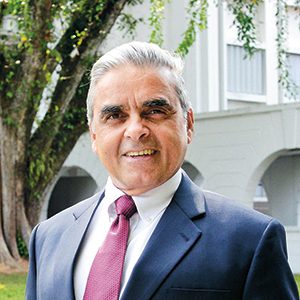
BTC has strong links with a critical generation of Singaporeans — the first builders of Singapore’s success story — and I dare say our country would not be so successful had BTC not trained them. In that sense, the campus is a precious part of our nation’s history.
Professor Kishore Mahbubani, Founding Dean, Lee Kuan Yew School of Public Policy, NUS
Crucially, NUS elected to preserve the existing buildings, upgrading or refurbishing them where necessary. Classrooms and lecture theatres were of course equipped with air-conditioning and modern technologies. Some areas were converted into a moot court and a multi-purpose auditorium, or reconfigured to encourage student-centred learning and peer discussion. Many renovations, however, were carried out to restore the buildings to their former glory, such as reinstating Block B’s original façade and the coffered ceiling at the lobby of the Oei Tiong Ham Building. The quadrangle lawns also underwent landscaping to maintain their design intent as communal interaction spaces.
One year after being handed the keys to the place, NUS made the historic return to its old stomping grounds in July 2006. NUS Law and LKYSPP, along with several research institutes, moved back to BTC. So did the CJ Koh Law Library, which fittingly took over the old Library Building. Other renamed structures included the Science Tower, now called Tower Block; and Block A, which was unveiled as the Li Ka Shing Building in 2007 in recognition of the Hong Kong tycoon’s generous gift to LKYSPP.
NUS had successfully pulled off the challenge of retaining BTC’s rich history and character, while adapting it in a manner befitting a world-class university. In 2009, BTC’s posterity was assured when the six buildings that made up the former Raffles College — Oei Tiong Ham Building, Manasseh Meyer Building, Federal Building, Eu Tong Sen Building, Li Ka Shing Building and CJ Koh Law Library, plus the two quadrangles — were gazetted as national monuments. This affirmed BTC’s status as a venerated institution and would protect it from redevelopment in the long run.

What was striking to me was how enthusiastic BTC alumni were about the move. It was an honour and privilege to engage with them and to see how happy they were that NUS was reclaiming its heritage.
Professor Tan Cheng Han, former Dean, Faculty of Law, NUS
Linking Past, Present and FutureLike Kent Ridge Campus, BTC sits on hilly ground with gentle slopes. Both have plenty of greenery and are well-integrated with the natural environment — which, in BTC’s case, is the Singapore Botanic Gardens. “BTC’s location in the middle of the Botanic Gardens, Singapore’s first UNESCO World Heritage Site, makes the campus even more special,” says LKYSPP alumna, Ms Elizabeth Tan, who is currently based in the United States. “It was amazing to be able to study there, in a place which embodied history and where I also felt connected to nature.”
If she were to change anything about BTC, it would be for the campus to host more University-wide events. “One of the things I liked most about my undergraduate years at Kent Ridge was how there were so many opportunities to meet people beyond my faculty. It would be nice for students from both campuses to congregate at BTC, which would also allow the Kent Ridge community to visit and appreciate the site,” Ms Tan suggests.
ACROSS THE ROAD
Another piece of its history that NUS has reclaimed is the old Dunearn Road Hostels, a cluster of pre-war terrace houses located just a short walk from BTC. Opened in 1952 for undergraduates of the then-University of Malaya, it used to house such luminaries as former President of Singapore, the late Mr SR Nathan (Arts ’54). Following NUS’ move to Kent Ridge in 1981, the estate was leased out to the public until NUS returned to BTC in 2006, after which it was converted into a hostel for graduate students of LKYSPP. In 2010, the site — now called College Green — was officially reopened by then-President Nathan.

Mr Ryan Kwan (Business and Law ’20), a Justices’ Law Clerk at the Supreme Court of Singapore, also enjoyed the best of both worlds while pursuing a double degree at NUS. On the one hand, he observes jokingly, the sprawling Kent Ridge Campus promotes “exercise”; on the other hand, the smaller BTC promotes “efficiency”. Adds the 27-year-old, “Since graduating from NUS, I’ve returned to BTC on a few occasions to help coach the moot court teams for competitions. The unchanged physical space is a powerful reminder of all the good memories that I had on campus.”
The years post-2005 have been kind to BTC, with relatively minor modifications being made here and there to improve the facilities and infrastructure. The campus has been the venue for annual Bukit Timah Homecoming reunions ever since the big bash in 2005, although recent instalments have switched to an online or hybrid format due to COVID-19. And with the transition from pandemic to endemic, students are returning to in-person learning, hence reviving the campus spirit and re-establishing BTC as the bastion of higher education that it was always designed to be.
As far as the future goes, who knows what may happen at or to BTC? It could continue to anchor LKYSPP and NUS Law for years to come; or, as Prof Tan posits, it could one day be transformed into an interdisciplinary research institute or a one-stop lifelong learning hub. But one thing’s for sure: everyone affiliated with the University wants BTC to remain with NUS, and its core look and feel to stay the same. As Prof Shih notes, “Let’s preserve the old while exploring the new. Let’s keep the olive tree instead of constantly rebuilding the Lexus.
What Was Your Favourite Spot?
BTC old and young alumni reveal some of their most cherished memories on campus.
"“I stayed at the old Raffles Hall for two years while studying at BTC. In the valley between Raffles Hall and Eusoff College, there was a sarabat stall where my friends and I would often grab tea and hang out.”
Prof Kishore Mahbubani (Class of ’71)
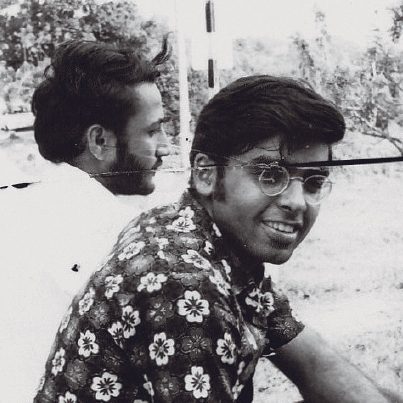
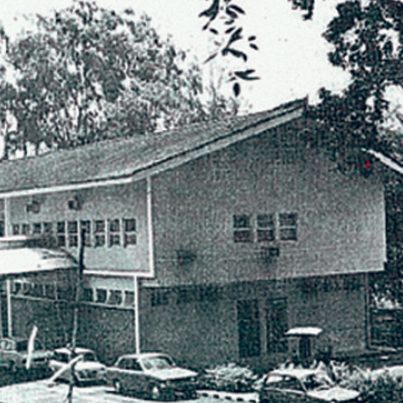
“We ran the Union House ourselves, including the canteen. As Secretary-General of the Students’ Union, I had my own office there too. Sadly, the building is no longer around, as it was torn down to make way for the Botanic Gardens’ expansion.”
Mr David Ho (Class of '72)
“On the upper levels of Block B, there are study spaces set up outside the seminar rooms. I had many discussions there with friends that would begin with questions on lecture topics, before inevitably digressing into what to eat later.”
Mr Ryan Kwan (Class of ’20)
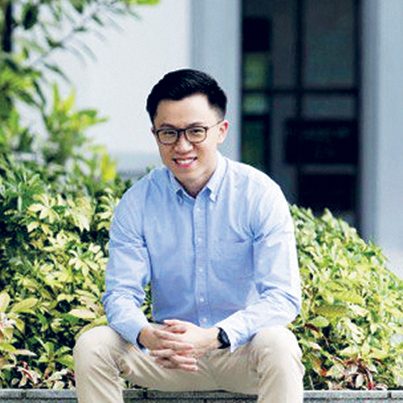

“The Upper Quad was where I usually had lunch and hung out with friends. From there, you can sit and reflect while admiring the surrounding buildings. The view is prettiest in the evenings, when shadows fall on the buildings and hallways.”
Ms Elizabeth Tan (Class of ’09), clockwise, 2nd from left
This article was written by Wanda Tan, and first appeared in The AlumNUS (Issue 129, Apr-Jun 2022).
Tackling 21st-century Problems with Age-old Philosophy
IN BRIEF | 10 min read
- Presidential Young Professor Abelard Podgorski (NUS Philosophy) explores diverse topics in his philosophical and mathematical thought, and can cast new light on problems and solutions in almost any discipline.

In school, he loved to get into discussions with his classmates about any topic under the sun. But there was one thing he really hated - losing an argument when he could not find a convincing line of reasoning.
So much so that he decided to give up his filmmaking ambitions to study philosophy and mathematics, where he could argue to his heart’s content and express his logic in rigorous equations.
“I felt really uncomfortable when people asked me questions and I didn’t know what to think about it or didn’t have a good reason for what I thought,” said Assistant Professor Abelard Podgorski at NUS Arts and Social Sciences, who was given the faculty’s 2020/21 Award for Promising Researcher and conferred the NUS Presidential Young Professorship in 2021. “It was this itch I had to scratch, and I felt philosophy was the only field that really scratched that itch - trying to convince people that something was right and giving the best argument.”
Making decisions in a complex worldThe ability to formulate logical arguments helps a lot when one needs to make a decision with multiple options and uncertainty about the future. This is in fact one of Asst Prof Podgorski’s main research topics - he gives an example of choosing between becoming a professor and becoming a soldier.
It is generally thought that one should choose so as to effectively promote one’s values. For example, a soldier would value country and honour, while a professor would value knowledge. But sometimes, one’s decisions affect one’s values themselves, making it hard to see how to live up to that principle.
The problem is multiplied when there are more than two options, such as choosing among professor, soldier, lawyer and banker. To simplify the problem, Asst Prof Podgorski proposes treating it as a tournament where the participants, or options, compete pair by pair instead of all at the same time. To pick a winner for the tournament, he borrows a principle from social choice theory about how to choose a winner in an election with many candidates.
These insights could benefit not only people’s personal lives but also society at large. It could help policymakers make decisions when those decisions might affect who the relevant stakeholders will be.
Growing up and living with philosophyAsst Prof Podgorski was born in Poland, but his family moved to the United States soon after. His mother studied computer science there, while his father took up a professorship in mathematics and statistics.
What he did not know was that his father had studied philosophy at university. The two had frequent “philosophical” discussions at home, and the younger Podgorski got acquainted with the famous philosophers from his father’s books.
Since then, Asst Prof Podgorski has ranged far and wide in applying philosophical thought to social issues.
He has ventured into the often controversial realm of animal ethics, arguing that one’s decisions about what food to buy cannot prevent the suffering of animals without also preventing their existence. For this reason, one’s primary obligation is to make sure one buys meat from animals whose lives were overall worth living.
“My view is in the middle between people who think eating meat is totally ok and people who think eating meat is totally wrong,” he said. “It gives the animal activists something to say to meat eaters that they won’t reject totally. People really like eating meat. You can give them the strongest arguments why they should stop completely, but you’re not going to get any uptake that way.”
A meat lover himself, he has in fact taken the cue from his own analysis to eat more vegetables and cage-free eggs.
Another area Asst Prof Podgorski thinks philosophy can help people is in dealing with the sadness and trauma of losing loved ones. In metaphysics, a branch of philosophy that tries to understand existence, someone who has ‘passed on’ is just as alive but simply in another location in the four dimensions of space and time. He likes the philosophy of the Tralfamadorian aliens in the novel Slaughterhouse-Five. To them, in author Kurt Vonnegut's words, “all moments, past, present and future, always have existed, always will exist. The Tralfamadorians can look at all the different moments just the way we can look at a stretch of the Rocky Mountains.”

Much of philosophical thinking happens in one’s own mind, so Asst Prof Podgorski’s work has not been greatly affected by the isolation brought on by the COVID-19 pandemic. But even he is feeling the strain.
“I can work by myself and get research done, but it does get tiring after a while not interacting with people, even for me,” he said. “It’s really helpful to have some stimulation for ideas, like attending conferences. I didn’t appreciate how much that mattered in keeping my gears turning, having new inputs of thoughts and information.”
He sometimes indulges in the other path in life he did not choose - by watching movies. His favourites include 2001: A Space Odyssey, and In the Mood for Love by Hong Kong director Wong Kar-wai. Both feature thought-provoking plots that move very slowly, and cinematic imagery filled with beautiful patterns and colours.
Yet, Asst Prof Podgorski is itching for the next opportunity to attend a conference - and get into a face-to-face argument again.
This article first appeared in NUSNews on 13 April 2022.
Where are the Peacemakers?
IN BRIEF | 5 min read
- Distinguished Fellow at the Asia Research Institute at the National University of Singapore, and also NUS Philosophy alumnus (1971), Prof Kishore Mahbubani laments the absence of global peacemakers now – "when we need them more than ever" – as the Russian invasion of Ukraine rages on, and the spectre of conflict over Taiwan looms.

Read Prof Kishore Mahbubani's editorial in The Straits Times, 19 March 2022, Asian Insider, pA25.
This article first appeared on NUSNews on 19 March 2022.
Open House 2022 Engages and Excites
IN BRIEF | 30 min read
- The ever-popular NUS Open House hit new heights this year, attracting over 8.61 million visitors – a 26.2 per cent increase from the 6.83 million visitors that attended last year's online Open House.
- From 26 Feb to 5 Mar, visitors crowded the websites, livestreams, webinars and social media sessions hosted by the University's colleges, faculties and schools. There was something for everyone, and the event covered everything from academic courses to student life and entrepreneurship programmes.

The ever-popular NUS Open House hit new heights this year, attracting over 8.61 million visitors – a 26.2 per cent increase from the 6.83 million visitors that attended last year's online Open House.
From 26 Feb to 5 Mar, visitors crowded the websites, livestreams, webinars and social media sessions hosted by the University's colleges, faculties and schools. There was something for everyone, and the hybrid event covered everything from academic courses to student life and entrepreneurship programmes.

While much of the engagement happened online, prospective students got to meet NUS students and staff face-to-face for the first time since the pandemic started.
The physical Open House, held one sunny Saturday on 5 Mar, included numerous booths showcasing the University’s wide-ranging academic options and vibrant student life; sample classes and talks to get a taste of varsity life; and tours of the different colleges, faculties, and schools.
Prospective students gave the hybrid format a thumbs-up.
Joshua Chua, an alumnus of Anderson Serangoon Junior College, appreciated the online sessions and felt the physical Open House was a huge differentiating factor.
“The (physical) Open House really gave me a good image of what living and studying at NUS could look like by virtue of being an in-person event as opposed to it being virtual, so I'm really grateful to NUS and everyone involved for having this opportunity during the pandemic,” he said.
On her part, Hwa Chong Institution alumna Elsie Woo, who attended both the online and in-person sessions, said, “The experience was really welcoming and wholesome, and really exposed me to NUS as a whole.”
Showcasing the country’s first honours college
One of the highlights this year was the NUS College, Singapore’s first honours college. It will accept its first batch of students this year.
Prospective students were treated to online webinars on the College’s distinctive curriculum, its global pathways, and its focus on hands-on experiential learning. In more intimate breakout rooms, staff and student volunteers readily answered questions about student life and academic pathways. By having a home college or faculty – say Business or Science – while simultaneously being enrolled at NUS College, students will be able to get an educational experience that is as broad as it is deep.

The in-person activities featured a tour of the facilities and residential options that NUS College students would be able to enjoy.
Elsie Woo was one of many students drawn to NUS College’s unique offerings.
“I attended a few webinars, including introductory talks for NUS College and Food Science and Technology,” said Elsie, who also visited many booths in-person.
“The sessions were very well-planned and the seniors were extremely helpful and patient.”
Nanyang Polytechnic alumnus Koh Jin Yuen focused his time on NUS College, attending the College’s guided tour and virtual sharing sessions.
“The NUS College tour was informative as I got to ask the facilitators about their experiences. I think the curriculum is very meaningful,” said Jin Yuen.
“The Open House helped to deepen my understanding of how NUS College works, and allowed me to better understand the lifestyle of a student from NUS College.” He is intending to apply for the Information Systems programme offered by NUS Computing, as well as NUS College.
Ramping up interdisciplinary offerings
Exciting developments in the realm of interdisciplinary education—a major theme that NUS has been championing—were foregrounded at the Open House, with the College of Design and Engineering (CDE) also taking in its inaugural cohort. A result of the merger of the Faculty of Engineering and the School of Design and Environment, CDE is set to transform the NUS educational experience.

Across five galleries and 19 sub-categories, including Architecture, Industrial Design, Materials Science and Engineering, Biomedical Engineering, and Civil Engineering, visitors were presented with an informative display of the wide range of courses and programmes that will be on offer in the new College.
Raffles Institution alumna Grace Zai, who visited the Designing the Future exhibition and galleries, said, “The Engineering galleries were very informative as I could ask questions I had about the course, as well as student life, and get a clearer picture of what I would be studying and doing. It helped me make a more informed decision on my choices.”
Grace is considering applying to Engineering Science and Architecture, as well as Mechanical Engineering and Electrical Engineering with a specialisation in robotics.
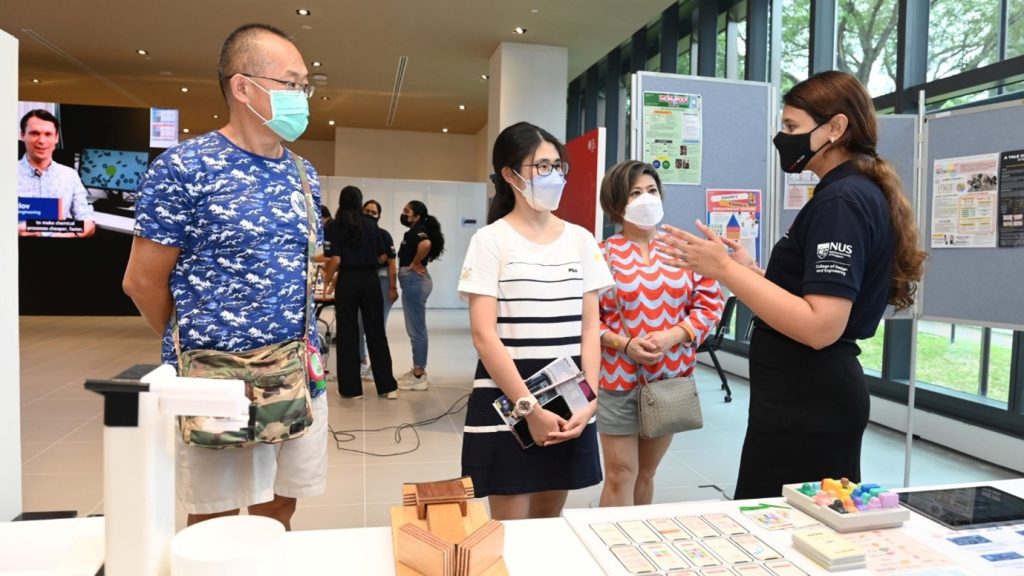
There were also panel discussions, both online and in-person, where faculty and current students interacted with prospective students to share their experiences and answer questions about the new interdisciplinary curriculum.
“As a prospective student, I got to see first-hand the school facilities, as well as the accommodations. My experience was pretty enriching and enlightening because I could ask the professors questions I had in mind and learn more about the courses,” said Timothy Tay, a graduate of Victoria Junior College who visited the SDE gallery on Sustainable Innovations.
“For example, I did not realise Project Facilities Management (PFM) was recently changed to Infrastructure Project Management (IPM). The professor explained that students will now graduate with a BEng degree rather than a BSc degree,” he recalled, referring to the first interdisciplinary full-time undergraduate programme to cover engineering, design, management, technology, building science and law modules.
Information was also available on the vibrant student life of the College’s various clubs and societies, as well as career programmes that enable students to better understand their interests and what it takes to marry that with industry skills and experience.
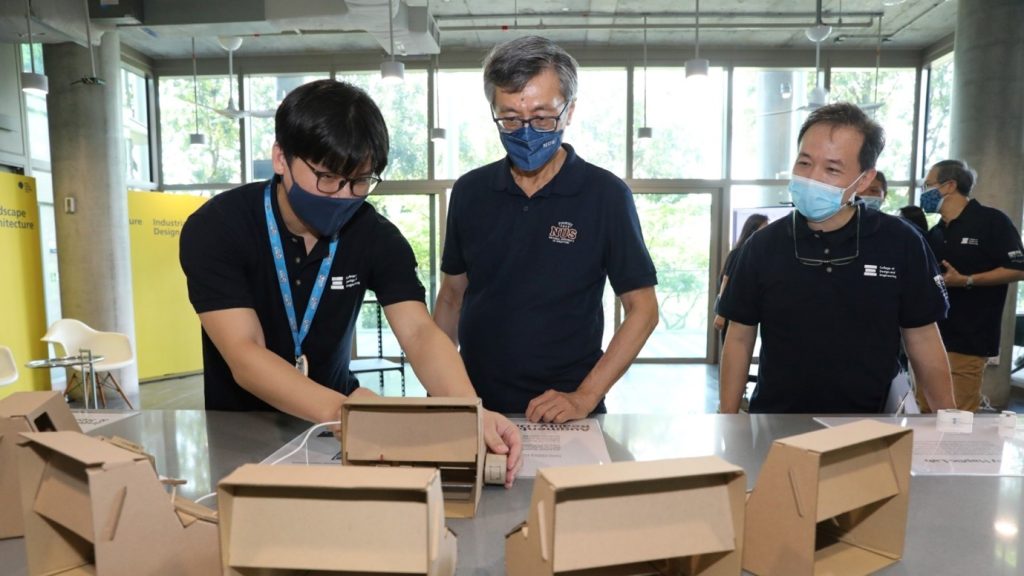
“The NUS Open House provided me with a more informed perspective on the courses offered in NUS. The various booths set up and run by students allowed for quick chats about what the courses have to offer. The responses by the students and professors were engaging and genuine, which I found informative in making my choice for courses in NUS,” said Kalepu Sai Sri Akshath, who attended CDE’s online and in-person events with his family and is intending to apply to Computer Engineering.
Drone-sensing demonstrations and the Solar Roof Tour, 5G Lab Tour, and BEEHUB Tour further showcased the College’s manifold facilities. Visitors also got a first-hand experience of NUS’ very own net-zero energy building through tours at SDE4, itself a product of both architecture and engineering, and the first of its kind in Singapore.
A marriage of the humanities and sciences
Continuing in the vein of interdisciplinarity and equipping students with a multifaceted, integrated toolbox of skills to thrive in the future economy is the College of Humanities and Sciences (CHS), which will be accepting its second intake this year.

Seminars about the CHS Core Curriculum were available at the Open House, as well as informative masterclasses that covered a vast range of interdisciplinary topics.
The Data Science and Economics masterclass saw Assoc Prof Lim Tiong Wee and Assoc Prof Chen Ying (Statistics & Data Science, Faculty of Science) and Dr Denis Tkachenko (Faculty of Arts and Social Sciences) break down the complexities of the digital economy with real-life examples, and explicate its relevance to Singapore’s Smart Nation goals.
The new Data Science and Economics (DSE) cross-disciplinary programme will be the first of its kind in Singapore to integrate knowledge across these two disciplines.
“I got to understand how data science and economics complement each other,” said Russell Hor, a graduate of St. Joseph's Institution who has finished National Service and is enrolling in CHS this year.
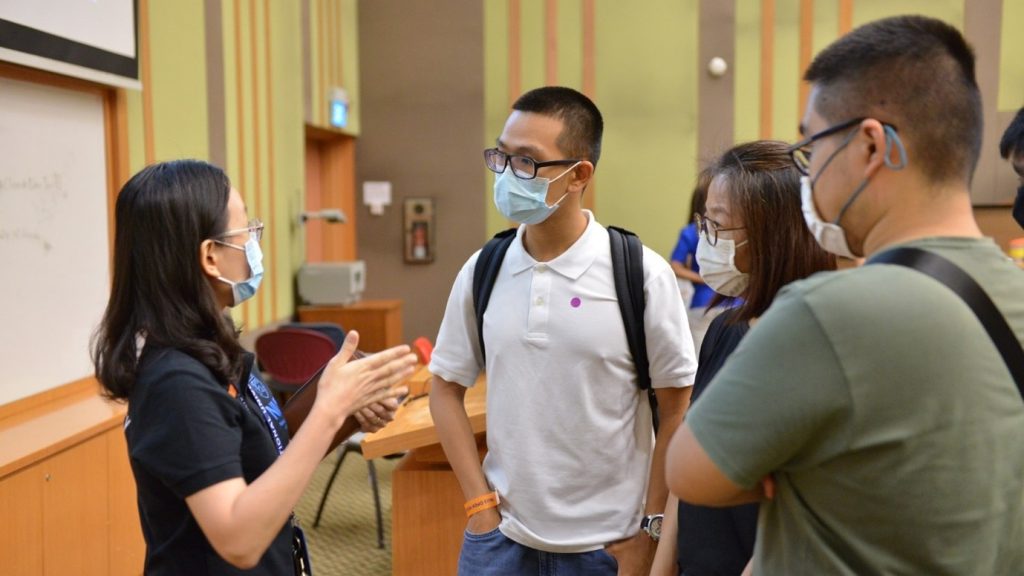
Vanille Goh, who graduated from Anglo-Chinese Junior College and attended the Geography and Environmental Studies masterclasses, said, “[The masterclasses] provided me with a good overview of how passionate the lecturers were and how each course will adequately prepare me for what I would want to do in the future.”
Nanyang Junior College alumna Wen Xinyue also appreciated the in-person masterclasses, adding that they gave her a first-hand glimpse into studying humanities at the university level.
“I am interested in studying English, and from the English Language and Literature masterclass on Gender, Sexuality and Language, I learnt about how entrenched gender roles and stereotypes can be within the language we use,” she shared.

Meanwhile, over at the “Insights into Southeast Asia from the Martial Arts Perspective” masterclass, Dr Mohamed Effendy of NUS Southeast Asian Studies presented prospective students with a riveting intellectual and visual treat, demonstrating how useful unique perspectives on the region’s myriad communities can be gleaned by studying them through the lens of the martial arts. Students saw the concepts brought to life – witnessing first-hand an exciting live demonstration by practitioners of pencak silat – of how Southeast Asian warriors of old defended themselves using a wide array of techniques and weapons.
Action aplenty
There was action aplenty among other faculties. NUS Business School’s programmes included a 360 live tour, as well as live chats with the BBA Deans on the different majors offered by the School. Its in-person sessions included sharing sessions by the BBA Deans, BIZCareers advisors, and student ambassadors.

Year 4 Accountancy and Finance undergraduate Calvin Chur was one such student volunteer, serving as an emcee for the online Open House and sharing in-person on 5 Mar about life at the Business School.
“It was a tiring, but extremely fulfilling day engaging with prospective students, learning about their concerns with regards to entering a new phase of life and trying to address those concerns,” said Calvin. “In fact, many of their concerns mirrored those that I had as a fresh A-level graduate attending the NUS Open House back in 2016 – and I am glad that I could offer insider insights to help them make an informed decision at this major milestone of their lives.”
Year 4 Real Estate undergraduate Natasha Liem, another student volunteer who served as an emcee, added, “There was quite a large number of viewers for the panel and a prospective student actually sent me a message on Instagram to enquire more about real estate from a student's perspective. I think the panel went well!”
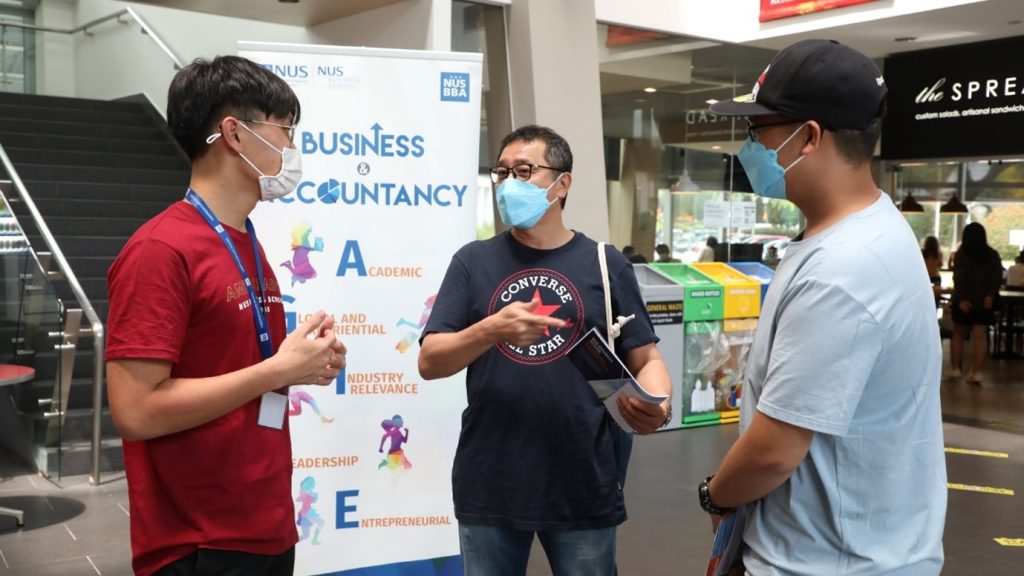
For NUS Business School Executive (Marketing & Outreach) Ms Casey Jean Grant, it was an eye-opener to experience the whole planning process.
“Most of the students and parents were very curious and excited about the prospect of coming to NUS Business School,” she added. “Their excitement definitely rubbed off on us and made the rest of us excited to share about our School.”
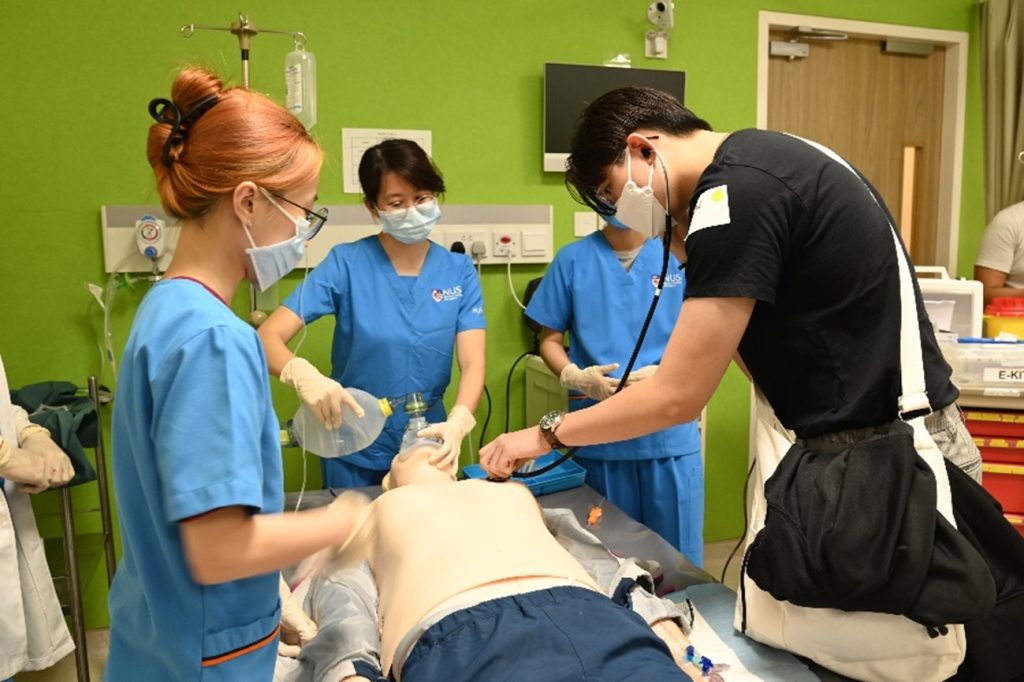
With frontline healthcare workers being in the spotlight these couple of years, there was plenty of interest in NUS Dentistry, NUS Nursing, NUS Medicine, and Duke-NUS Medical School. Live demonstrations were conducted and prospective students got a taste of what it would be like to be a dentist, nurse or doctor.

Serving up a slice of campus life
Whether on the screen or in the flesh, visitors to the Open House also witnessed the rich and vibrant student life beyond the classroom that NUS is known for.

Besides holding talks to acquaint visitors with the wide range of co-curricular activities available, student clubs and societies rose to the occasion at the Student Village showcases to feature a spectacular smorgasbord of music, dance and sporting performance across the eight days that Open House was on. Visitors were serenaded by soulful tunes by the NUS Jazz Band and wowed by the moves of NUS Kendo Club. They were also treated to cheerleading displays, snazzy dance performances by NUS Funkstyle and BreakiNUS, catchy renditions of contemporary pop and choral music by the a cappella group Resonance, and the dulcet tones of TheNUSChoir and the NUS Mandopop group Voices.

"It was really lively with dozens of booths as well as live performances put on by really talented students! It truly allowed me to understand the culture here and makes me want to be a part of it after experiencing first hand,” Vanille Goh shared.
Students and hall masters from the halls and residences also conducted informative residential life talks, A-Day-in-the-Life-Of vlog sessions and Ask-Me-Anything sessions to help students interested in on-campus living understand its manifold aspects like academic programmes and pastoral care.
These were complemented by in-person tours of King Edward VII Hall, NUS College, Ridge View Residential College, Tembusu College, RC4, and Pioneer House, NUS’ newest housing model, giving participants a real taste of the sense of community and camaraderie that comes with residential life in NUS.
Joshua Chua, who also participated in the RC4 tour, said, “The RC4 tour was definitely a highlight because the tour guide, as with most staff and students, was welcoming and frank, which eased my nervousness.”

Matthew Yeow, an alumnus of Anglo-Chinese School (Independent) who attended both online and in-person sharing sessions by student residents of the Residential Colleges, said, “During the physical Open House, I had the opportunity to find out a lot more about the residential colleges and what made them distinct from halls. Furthermore, I also got to find out more about the individual residential colleges and their communities, as well as the additional modules they took.”
“As a prospective student, I think the Open House was executed effectively through both the online and physical mediums. Having the opportunity to come down and visit the University and talk to the current students gave me a better understanding of student life in NUS,” he added.
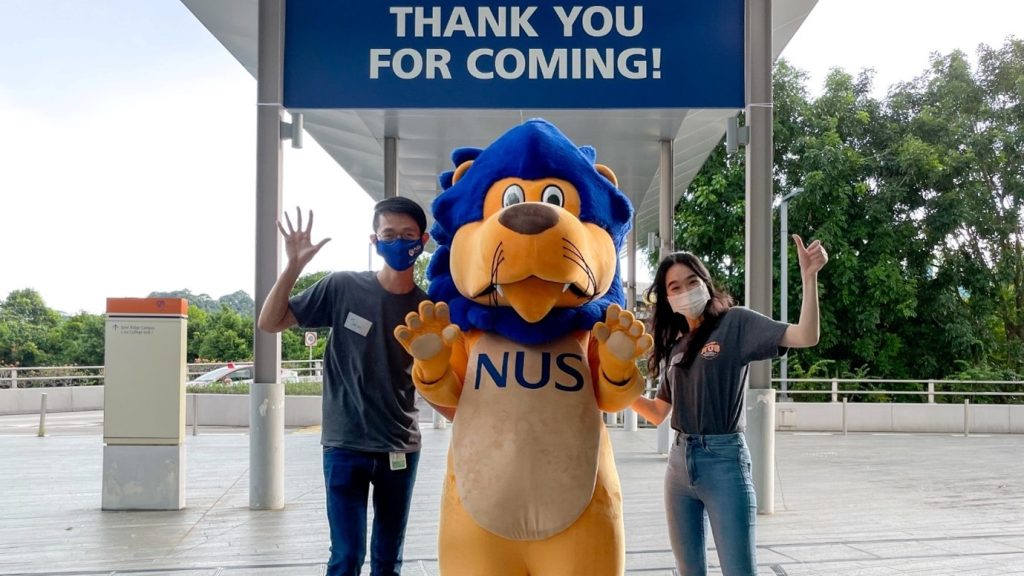
This story first appeared on NUSNews on 8 March 2022.
New Courses for the New Economy
IN BRIEF | 5 min read
- NUS is offering a number of new programmes to prepare graduates for the future, including the much-anticipated Major in Anthropology, and Minor in Interpreting by the NUS Department of Chinese Studies.
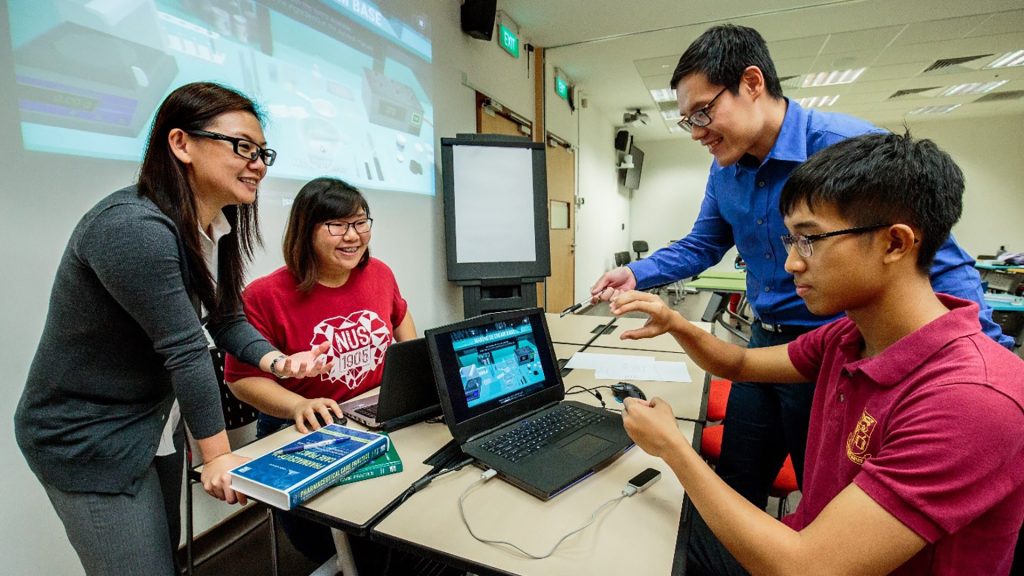
The University’s key theme of preparing undergraduates for the workplace of the future will be further enhanced with the launch of new majors, minors and degree specialisations in the upcoming academic year. About 10 new courses are on the cards.
New programmes from the NUS College of Design and Engineering (CDE), NUS Faculty of Science, NUS School of Computing, and NUS Faculty of Arts and Social Sciences will cover areas such as Artificial Intelligence, technology, data science, sustainability, globalisation. They will add on to the interdisciplinary offerings by the flagship NUS College, Singapore’s first honours college welcoming its first cohort in August – as well as those by the College of Humanities and Sciences (CHS).
“The overall goal of all our education reform efforts is to advance a university curriculum that prepares students well for a Fourth Industrial Revolution world and workplace,” said Professor Bernard Tan, NUS Senior Vice Provost (Undergraduate Education).
“Our education, focused on both breadth and depth, ensures that our graduates are held in high regard by employers. Last year, more than nine in 10 NUS graduates secured a job within six months of their final examinations.”
New majors and minors
Bachelor of Engineering (Infrastructure and Project Management)Offered by CDE’s Department of the Built Environment, this degree will equip graduates with the knowledge and interdisciplinary skills to excel in the multifaceted built environment. This is the first interdisciplinary full-time undergraduate programme to cover engineering, design, management, technology, building science and law modules. Major in Anthropology
Offered by the NUS Faculty of Arts and Social Sciences to all CHS students, this major will study the range of human diversity, accounting for how people in different times and places have developed into distinctly different societies. The degree will expose students to a vast variety of different beliefs and health practices, economic and political systems, material culture, and even different notions of beauty, the environment, food, family, and the good life.
Anthropology is much sought after for the sort of training it offers its students – a ground up approach to developing deep understanding on just about every aspect of the human condition. Students will be equipped to better understand and deal with the chaos, uncertainty, and ambiguity that characterises the contemporary age.
Second Major in Sustainable Urban DevelopmentOffered by CDE’s Department of Civil and Environmental Engineering, it aims to train the next generation of urban problem-solvers. They will be equipped with interdisciplinary knowledge and skills to create sustainable urban environments in the context of the changing climate. Open to all NUS undergraduate students, this major is stackable to students’ primary major in their chosen field, and can be completed in four years with no additional academic workload. Second Major in Nutrition
This will be offered by the Faculty of Science to all CHS students, including those reading Food Science and Technology as the primary major. It is designed to equip students with knowledge in human nutrition, providing them with the necessary foundation to develop a cross-disciplinary perspective along the food supply chain – from farm to fork to health. Minor in Interpreting
Multilingualism is a defining characteristic of Singapore’s multi-ethnic, immigrant society. With four official languages and with English as the working language, translating and interpreting between each of the mother tongues and English has always been a prominent feature of Singapore society. Against this backdrop, the NUS Department of Chinese Studies has placed as one of its core objectives, the training of graduates with strong Chinese-English bilingual skills who can become leaders in the translation and interpreting arenas.
This new Minor will allow students a related alternative to translation, or as an affiliated Minor to Translation which is already being offered at the Department.
New specialisations
Three new specialisations will be offered by the NUS School of Computing:
Specialisation in Digital Product and Platform ManagementThis will be offered to students pursuing the Bachelor of Computing (Information Systems) Degree. They will build up a repertoire of knowledge and skills sought after by both technology companies and the digital immigrant companies that are fast adopting the product- and platform-centric technology and business operating models. Specialisation in Intelligent Systems Solutioning
Students pursuing the Bachelor of Computing (Information Systems) Degree can also take this new specialisation to learn to implement and apply intelligent system solutions buttressed by the new technologies of Artificial Intelligence, the Internet of Things, and Augmented Reality. They will learn to apply these new technologies in software engineering, and to implement and manage intelligent system solutions. Graduates will be able to take on job roles in intelligent systems engineering and solutioning. Specialisation in Machine Learning-based Analytics
This new specialisation for Bachelor of Science (Business Analytics) students will enable students to tap into the analytics capabilities of Machine Learning, a sub-field of Artificial Intelligence. They will learn to rapidly and automatically develop models that can quickly and accurately analyse massive, complex data sets, in order to help businesses unlock the value of corporate and customer data and enact decisions that keep them ahead of the competition. Graduates will be able to take on careers in the rapidly-growing business and data analytics field, among others.
New modules
Aside from the new majors, minors and specialisations, a number of new modules are being offered. For instance, the NUS School of Computing is starting a Digital Ethics and Data Privacy module to educate students on this pertinent and pressing issue.
The NUS Faculty of Law is introducing two modules – one on Law & Technology and one on Data Literacy – as technology and data are increasingly being key drivers for the legal industry.
Find out more about the courses offered by the University, and explore this year’s Open House. Here are four things to look out for at the Open House.
This story first appeared on NUSNews on 24 February 2022.
NUS Open House 2022: Interdisciplinary Offerings, In-person Activities and More!
IN BRIEF | 5 min read
- NUS Open House 2022 is back with opportunities for prospective students to meet NUS professors, students and alumni face-to-face, after two years of connecting virtually.
- Running from 26 February through 5 March, NUS Open House 2022 will begin with a comprehensive line-up of informative activities, including the online segment, during the week leading up to the physical Open House, which takes place on Saturday, 5 March from 9 am to 7 pm across NUS’ campuses in Kent Ridge and Bukit Timah.

NUS Open House 2022 is back with opportunities for prospective students to meet NUS professors, students and alumni face-to-face, after two years of connecting virtually.
The physical event will take place on Sat, 5 Mar from 9am to 7pm across NUS’ campuses in Kent Ridge and Bukit Timah. This will be preceded by a comprehensive line-up of informative activities during the week leading up to the physical Open House.
Including the online segment, NUS Open House 2022 takes place from 26 Feb to 5 Mar. Here’s a heads-up on four things to check out:
1. Exciting interdisciplinary offerings
NUS College, Singapore’s first honours college, was formed by the merger of the University Scholars Programme and Yale-NUS College. Offering an immersive, experiential and interdisciplinary educational journey, it will welcome its first batch of students this year. Students will have a home college or faculty, say, Business or Engineering, while simultaneously being enrolled at NUS College. There, they will have the opportunity to enjoy a holistic interdisciplinary curriculum that is complementary to their major.
Another option for interdisciplinary learning can be found at NUS College of Design and Engineering. The College offers a programme that prepares students for the future through interdisciplinary learning and robust research in the fields of engineering and design. At the College, students are given the flexibility to build and design their own learning experience.
The NUS College of Humanities and Sciences, the enhanced undergraduate experience for students of the Faculty of Arts & Social Sciences and the Faculty of Science, is accepting its second intake this year. The College offers 13 Common Curriculum pillars consisting of modules such as scientific inquiry, humanities, digital literacy, design thinking, artificial intelligence and many more exciting options. These are complemented by majors and minors spanning the arts, humanities and sciences, such as global studies, philosophy, theatre and performance studies, quantitative finance, data analytics and pharmaceutical science. Students can pick and choose modules to create a customised curriculum that matches their interest and aspirations.
To ensure that graduates are ready to take on leading roles in the New Economy, NUS constantly develops new courses. Here are this year's new offerings.

2. Meeting you in person - again
After two years of meeting virtually, the NUS community is excited to get together in real life with prospective students once again!
You can look forward to an enlightening schedule of in-person activities including a tour of the Centre for Healthcare Simulation by NUS Nursing; tours of residential living options such as Tembusu College, CAPT (College of Alice & Peter Tan), and RC4; a live demonstration of a moot court session and tour of the NUS Bukit Timah campus by NUS Law; tours and a showcase of NUS College; as well as a live question-and-answer session with Duke-NUS Medical School.
3. Webinars, talks, live chats, hotlines and more
Get a taste of life as an NUS student, even before the physical event. A host of insightful webinars, talks, question-and-answer sessions, live chats, hotlines, and virtual tours have been arranged starting 26 Feb to give you a head start on topics such as admissions, student life, and on-campus living, as well as programmes offered by NUS College, the College of Design and Engineering, the College of Humanities and Sciences, Business, Music and many more.
Obtain behind-the-scenes knowledge from NUS student ambassadors and the NUS Students’ Union on the rich student life available at NUS, and be serenaded by NUS Choir and NUS Jazz Band.
Professors will be on hand to share information on their respective programmes, and you’ll even have a chance to sit in on classes. Have a question that is not covered by the briefing? No sweat! There’ll be chat sessions with NUS Admissions, professors and students from selected programmes during which you can get your queries addressed.
Click here for the list of virtual and in-person activities for NUS Open House.

4. Exciting student life
NUS offers a myriad options for a rich student life, and NUS Open House is the perfect place to start exploring the possibilities. Many alumni recall their NUS days fondly, remembering not only the academic progress they made, but the camaraderie forged with friends from clubs, societies and on-campus residences.
Throughout the period of the online Open House and during the physical event, representatives from various student-led groups will speak on topics including hall life, clubs and societies, as well as campus performing groups. Take part in a live session with music and dance groups, embark on a virtual residential tour, and more.
We’re looking forward to seeing you online from 26 Feb and in-person on 5 Mar!

This story first appeared on NUSNews on 23 February 2022.
NUS Graduates Achieve Better Employment Outcomes, Higher Starting Salaries
IN BRIEF | 10 min read
- Higher starting salaries[1] for graduates from 25 courses
- 100% employment for graduates from Accountancy, Information Security, Business Analytics, Dentistry, Computational Biology); >99% employment for Computer Science graduates
- More than nine in 10 graduates from courses in Arts and Social Sciences, Business, Computing, Design & Environment, Engineering, Nursing, and Science employed within six months of completing their final exams
- More than nine in 10 Architecture, Law, and Pharmacy graduates were employed after completing practical training, practical law course, and pupillage

Graduates of the National University of Singapore (NUS) continued to achieve high employment rates and earned higher starting salaries in 2021, according to the Joint Autonomous Universities Graduate Employment Survey (JAUGES) 2021.
The JAUGES 2021 was jointly conducted by NUS and the other Autonomous Universities.
Professor Ho Teck Hua, NUS Senior Deputy President and Provost, said, "NUS places a strong focus on equipping our students to harness knowledge and skill sets, and develop the adaptability and innovativeness to excel in a complex and unpredictable world. We are heartened to learn that our students have remained highly employable in the uncertain global economy, and continue to command high starting salaries. This shows that our interdisciplinary and integrative university education continues to enable our students to remain competitive and deliver value in their careers.”
“NUS is committed to augmenting the future readiness of NUS students and graduates while preparing them for the fast-changing workplaces of tomorrow. In January this year, we launched two new digital platforms, the Internship-As-A-Service and conNectUS, where they can seize exciting new opportunities in building their career journeys by tapping on the gig economy to market their talents to industry, while building global networks and opportunities with NUS alumni in Singapore and across the world,” he added.
More than nine in 10 NUS fresh graduates secured employment within 6 months after final exams
Among NUS fresh graduates in the labour force, 94.1 per cent were employed within 6 months of completing their final exams, compared to 93.9 per cent in the 2020 survey. Another 2.8 per cent of NUS fresh graduates in the labour force have either accepted a job offer and are pending commencement of duty, or are actively starting a business venture.
Fresh graduates from Accountancy, Information Security, Business Analytics, Dentistry and Computational Biology achieved 100% employment while 99.1% of Computer Science majors landed jobs. More than nine in 10 fresh graduates in the labour force from courses in Arts and Social Sciences[2], Business, Computing, Design & Environment, Engineering[3], Nursing and Science were employed within six months of completing their final exams.
5,144 out of a total of 6,897 full-time fresh NUS graduates from the Class of 2021, and 576 out of 830 follow-up NUS graduates participated in the joint survey.
More than nine in 10 follow-up graduates from Architecture, Law and Pharmacy were employed after completing their practical training, practical law course, and pupillage.
NUS graduates in full-time permanent employment continue to draw high starting salaries
The survey also revealed a 4.3 per cent increase in the mean gross monthly salary of NUS fresh graduates in full-time permanent employment[4], which rose to S$4,258 in 2021 from S$4,082 in 2020.
The median gross monthly salary of fresh graduates from NUS in full-time permanent employment also increased to S$3,850 in 2021, from S$3,800 in 2020.
Graduates from 25 courses in Arts and Social Sciences, Business, Computing, Design and Environment, Engineering, Law, Nursing, Science, as well as the Bachelor of Arts with Honours course offered by Yale-NUS College, achieved improvement in starting salaries.
Please refer to the Annex for the list of courses in which graduates have achieved higher starting salaries compared to 2020.

Equipping NUS graduates in a world of constant change
Mr Rafid Zuhayer Amin, fresh graduate from the Department of Mechanical Engineering which is under the College of Design and Engineering, joined global healthcare company GSK’s talent development programme within four months of looking for a job. In his current role as a Maintenance Engineer, Rafid is involved in planning maintenance, troubleshooting and overseeing asset care to ensure that the plant operates efficiently.
At NUS, Rafid specialised in Robotics, a new specialisation for Mechanical Engineering, and was also part of the Innovation and Design Programme (iDP). The iDP encourages students like Rafid to develop innovative solutions to real-life engineering problems, honing their adaptability and critical thinking skills, which have proven indispensable in his current role. Rafid also took on internships, including the NUS Overseas Colleges programme in Munich, where he worked in a start-up that was developing Smart AI Checkout solutions for supermarkets. He also tapped on various portals and avenues available at NUS, such as NUS TalentConnect and courses conducted by the Centre for Future-ready Graduates, to keep abreast of job trends and available opportunities during his job search.
“Not only did my course of study build a strong engineering foundation for me, I was also able to put my knowledge to good use and build a strong network around me. This allowed me to grow not just as an engineer, but as a global citizen and give back to the society,” said Rafid.
Ms Ang Shao Qing, who graduated with a Bachelor of Arts with Honours in Philosophy, works as a Business Analyst at A.T. Kearney Pte. Ltd. The fresh graduate from the Faculty of Arts and Social Sciences shared that the engaging and thought-provoking pedagogy at the Department of Philosophy nurtured a keen sense of astuteness, as well as the ability to think critically.
Outside of class, Shao Qing actively sought opportunities that would provide her with more direct work experiences where she was deeply appreciative of the guidance from her NUS career counsellors. Interested in the consulting field, she took on multiple consulting internships such as with Kantar Consulting and PwC, during her time in NUS to get a better sense of a right career fit for herself. She was also able to earn academic credits while working for a company under an Internship module in her final year.
Remembering the words of wisdom from her parents and professors that the purpose of a university education is to acquire useful skillsets, Shao Qing approached her university education with the positive attitude of learning and imbibing as much knowledge as possible through her choice of subjects.
“I owe a debt of gratitude to my philosophy education for teaching me to think critically and creatively. The ability to ask the right questions was very helpful during job tests and interviews, and it is a skillset I continue to hone at my job. I am also fortunate to be working for a firm that prioritises growth and learning – every day is different (trite but true!), and I have had the privilege of being exposed to a variety of topics and industries,” said Shao Qing.
This story first appeared on NUSNews on 16 February 2022.
Notes
[1] Starting salary here refers to graduates’ median gross monthly salary.
[2] Launched in December 2020, the College of Humanities and Sciences is an enhanced undergraduate experience for students of the Faculty of Arts & Social Sciences and the Faculty of Science.
[3] In November 2021, the College of Design and Engineering was established, bringing together the Faculty of Engineering and School of Design and Environment.
[4] Full-time permanent employment refers to the number of graduates working on a full-time permanent basis, as a proportion of graduates in the labour force (i.e. those who were working, or not working but actively looking and available for a job).
Versatile and Future-Ready
IN BRIEF | 8 min read
- The interdisciplinary and integrative university education at NUS has given students a strong head-start in their careers, as shown in results of the Joint Autonomous Universities Graduate Employment Survey 2021. NUS graduates continued to command high employment rates in 2021, where they also earned higher starting salaries.
- The following alumni, with degrees in mechanical engineering, philosophy, computer science and environmental studies, illustrate just how true to reality the numbers are.
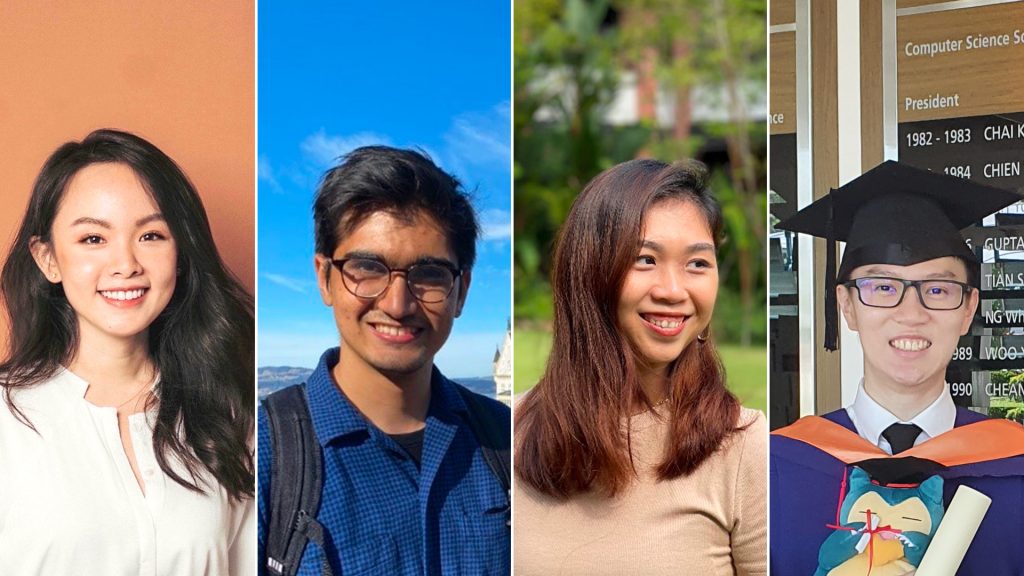
The world is their oyster for these four NUS graduates from the Class of 2021.
Armed with degrees in mechanical engineering, philosophy, computer science and environmental studies, they have set their sights on seizing their careers on the back of an interdisciplinary education which have prepared them well to take on uncertainties with panache and purpose.
Mr Rafid Zuhayer Amin, fresh graduate in Mechanical Engineering landed a role in a global healthcare company GSK, while Ms Ang Shao Qing, a Philosophy graduate secured a job in the consulting field. Both shared how their university education has trained them to think critically, analyse problems, and come up with creative solutions. These are strong foundations which have also helped in securing their first jobs.
For instance, a stint with the NUS Overseas Colleges programme in Munich, Germany in February 2020 saw Rafid interning with a start-up developing Smart AI checkout solutions for supermarkets. Working in one of Europe’s technology hubs, followed quickly by another internship in a Singapore start-up, gave him the perfect combination of global exposure and local immersion.
Rafid specialised in Robotics, a new specialisation for Mechanical Engineering, and was also part of the Innovation and Design Programme (iDP). The iDP encourages students to develop innovative solutions to real-life engineering problems, honing their adaptability and critical thinking skills.
“Not only did my course of study build a strong engineering foundation for me, I was also able to put my knowledge to good use and build a strong network around me. This allowed me to grow not just as an engineer, but as a global citizen and give back to the society,” said Rafid.
For Shao Qing, who works as a Business Analyst at A.T. Kearney Pte. Ltd., the engaging and thought-provoking pedagogy at the NUS Faculty of Arts and Social Sciences’ Department of Philosophy nurtured a keen sense of astuteness, as well as the ability to think critically.
“I owe a debt of gratitude to my philosophy education for teaching me to think critically and creatively. The ability to ask the right questions was very helpful during job tests and interviews, and it is a skillset I continue to hone at my job,” said Shao Qing.
Fellow fresh graduate Mr Joel Lim, Enterprise Engineer at Meta, had obtained a Double Degree in Bachelor of Computing (Computer Science) and Bachelor of Business Administration (Accountancy). He thanked the career advisors who helped him analyse the various job offers while considering his strengths and personal preferences.
As part of a newly-formed team, he bravely took on the challenge of working with senior engineers and building the product from scratch in an open, trusting and empowering office culture.
NUS has also prepared Ms Sew Wen Xin well for her current role in supply chain in the technology sector. In 2019, she secured an internship with Henkel in global purchasing logistics through the NUS Career Fair, and obtained resume writing and interview tips through her career advisor.
The interdisciplinary education in Environmental Studies opened Wen Xin’s eyes to disciplines beyond her specialisation in geography, such as economics, biology, public health, and law, sparking an interest in sustainable supply chains.
Now a Management Trainee in a multinational technology company, Wen Xin expects to see herself rotated across various operational roles. For now, she is responsible for launching new products through resellers and keeping track of milestones in the supply chain.
Stronger employment prospects and higher starting salaries for NUS graduates
The interdisciplinary and integrative university education at NUS has given students a strong head-start in their careers, as shown in results of the Joint Autonomous Universities Graduate Employment Survey 2021. Please click here for the press release.
NUS graduates continued to command high employment rates in 2021, where they also earned higher starting salaries.
This story first appeared on NUSNews on 16 February 2022.
More than nine in 10 NUS fresh graduates secured employment within 6 months after final exams
- 5,144 out of a total of 6,897 full-time fresh NUS graduates from the Class of 2021, and 576 out of 830 follow-up NUS graduates participated in the joint survey.
- 94.1 per cent were employed within 6 months of completing their final exams, compared to 93.9 per cent in the 2020 survey
- Another 2.8 per cent have either accepted a job offer pending commencement of duty or are actively starting a business venture
- 100 per cent employment for fresh graduates from Accountancy, Information Security, Business Analytics, Dentistry and Computational Biology, while 99.1 per cent of Computer Science majors landed jobs
- More than nine in 10 fresh graduates from Arts and Social Sciences, Business, Computing, Design & Environment, Engineering, Nursing and Science employed within 6 months of completing final exams
- More than nine in 10 follow-up graduates from Architecture, Law and Pharmacy were employed after completing their practical training, practical law course and pupillage
NUS graduates in full-time permanent employment continue to draw high starting salaries
- 4.3 per cent increase in the mean gross monthly salary of NUS fresh graduates in full-time permanent employment, which rose to S$4,258 in 2021 from S$4,082 in 2020.
- The median gross monthly salary of fresh graduates from NUS in full-time permanent employment also increased to S$3,850 in 2021, from S$3,800 in 2020.
- Graduates from 25 courses in Arts and Social Sciences, Business, Computing, Design and Environment, Engineering, Law, Nursing, Science, as well as the Bachelor of Arts with Honours course offered by Yale-NUS College, achieved improvement in starting salaries.
FASS Inspiring Mentor 2021 Award Winners Announced

The NUS Faculty of Arts and Social Sciences is proud to announce the winners of the 2021 FASS Inspiring Mentor Awards.
Congratulations to:
- Prof Jack Qiu Linchuan, Professor, Department of Communications and New Media
- Assoc Prof Loy Hui Chieh, Associate Professor, Department of Philosophy
- Assoc Prof Robin Loon Seong Yun, Associate Professor, Department of English Language and Literature
- Dr Michael Yoshitaka Erlewine, Assistant Professor, Department of English Language and Literature
- Dr Nina Laurel Powell, Senior Lecturer, Department of Psychology
Winners of AY2020-21 Faculty Teaching Excellence Awards Unveiled
 The NUS Faculty of Arts and Social Sciences is proud to announce the 37 winners of the Faculty Teaching Excellence Award for their work in AY2020‐21, 16 of which have also been nominated for the Annual Teaching Excellence Award(ATEA) and Annual Digital Education Award (ADEA).
The NUS Faculty of Arts and Social Sciences is proud to announce the 37 winners of the Faculty Teaching Excellence Award for their work in AY2020‐21, 16 of which have also been nominated for the Annual Teaching Excellence Award(ATEA) and Annual Digital Education Award (ADEA).
Special thanks are due to members of the Faculty Teaching Excellence Committee–Dr Susan Ang (English Language and Literature and Chair of FTEC), A/P Loy Hui Chieh (Philosophy; FASS Vice‐Dean), A/P Lim Wee Hun, Stephen (Psychology), Dr Gilbert Yeoh (English Language and Literature) and Mrs Chen Ing Ru (Centre for Language Studies)–for their efforts in shortlisting and nominating the winners.
|
NAME |
DEPARTMENT |
|
Mr Appriou Yannick Francois |
Centre for Language Studies |
|
Ms Baranska, Malwina |
Centre for Language Studies |
|
Ms Klayklueng, Sasiwimol |
Centre for Language Studies |
|
Ms Morita, Kazuko |
Centre for Language Studies |
|
Dr Chaidaroon Suwichit |
Communications and New Media |
|
Dr Hong Renyi |
Communications and New Media |
|
Dr Mitchell, Alexander Ian |
Communications and New Media |
|
Dr Shobha Avadhani |
Communications and New Media |
|
Mr Tan Kai En |
Communications and New Media |
|
Dr Timothy Wong Chong Ji |
Economics |
|
Dr Vu Thanh Hai |
Economics |
|
A/P Michelle M. Lazar |
English Language & Literature |
|
Dr Miguel Escobar Varela |
English Language & Literature |
|
A/P Starr Rebecca Lurie |
English Language & Literature |
|
A/P Thell Anne Marie |
English Language & Literature |
|
Dr Roy, Tania |
English Language & Literature |
|
A/P Chang Tou Chuang |
Geography |
|
A/P Daniel Adam Friess |
Geography |
|
Dr Gretchen Christina Coffman |
Geography |
|
Dr Kamalini Ramdas |
Geography |
|
Dr Kenney-Lazar Miles Richard |
Geography |
|
Dr Teo Sheng Kiat, Shaun |
Geography |
|
Dr Donna Maree Brunero |
History |
|
Dr Lawrence, Kelvin |
History |
|
Dr Sayaka Chatani |
History |
|
Dr Beddor, Robert Speeter |
Philosophy |
|
Prof Bain, William Ward |
Political Science |
|
Dr Dunya Deniz Lepori |
Political Science |
|
Dr Jia Lile |
Psychology |
|
Dr Nina Laurel Powell |
Psychology |
|
Dr Wong Shi Hui Sarah |
Psychology |
|
Dr Peace Wong Yuh Ju |
Social Work |
|
Dr Chua Hui Ching, Emily |
Sociology |
|
Dr Elliott Edward Prasse-Freeman |
Sociology |
|
Dr Jennifer Emily Estes |
Sociology |
|
Dr Noorman Abdullah |
Sociology |
|
Dr Radics, George Baylon |
Sociology |
Congratulations to them all!
FASS Announces New Additions to Leadership Team
IN BRIEF | 2 min read
The NUS Faculty of Arts and Social Sciences is pleased to announce recent new appointments to the Faculty's leadership team.
Three eminent members of the Faculty received new appointments to the Deanery at the beginning of this year:
- Professor Joseph Park (English Language and Literature)
Vice-Dean (Undergraduate Studies) - Dr Zhang Yang (Economics)
Associate Dean (Undergraduate Studies) - Dr Noorman Abdullah (Sociology)
Assistant Dean (External Relations and Student Life)
We wish them the very best with their new portfolios. Click here to visit the FASS Deanery page.




NUS Bags Major PR Award for College of Humanities and Sciences Campaign

One year since the official inauguration of the NUS College of Humanities and Sciences (CHS), the publicity campaign for the new College has gained recognition at the recent Public Relations in the Service of Mankind (PRISM) Awards.
The University bagged a Distinction Award in the category “Outstanding Campaign by a Non-Government Organisation or Not-For-Profit Organisation” for the launch and publicity of the interdisciplinary College.
The award recognises NUS’ effective communications regarding the necessity of an interdisciplinary education to faculty members, prospective students and their parents, alumni, employers, and members of the public.
The campaign also underscored what CHS offers students in a world plagued by complex challenges that require integrated interdisciplinary approaches. The campaign included the launch event, student profiles, social media, and CHS collaterals and media assets in the form of CHS-specific infographics, news and FAQs.
The campaign also included a video series on interdisciplinarity, a podcast series by the teaching team of the common curriculum Humanities module, and stakeholder endorsement in the form of testimonials from students and alumni of NUS Faculty of Arts and Social Sciences (FASS) and the NUS Faculty of Science (FoS) who have pursued interdisciplinary studies. A successful admissions publicity campaign was run, including the 2021 NUS Open House which drummed up interest in the College with student and employer panels, small group tours, and student chat rooms.
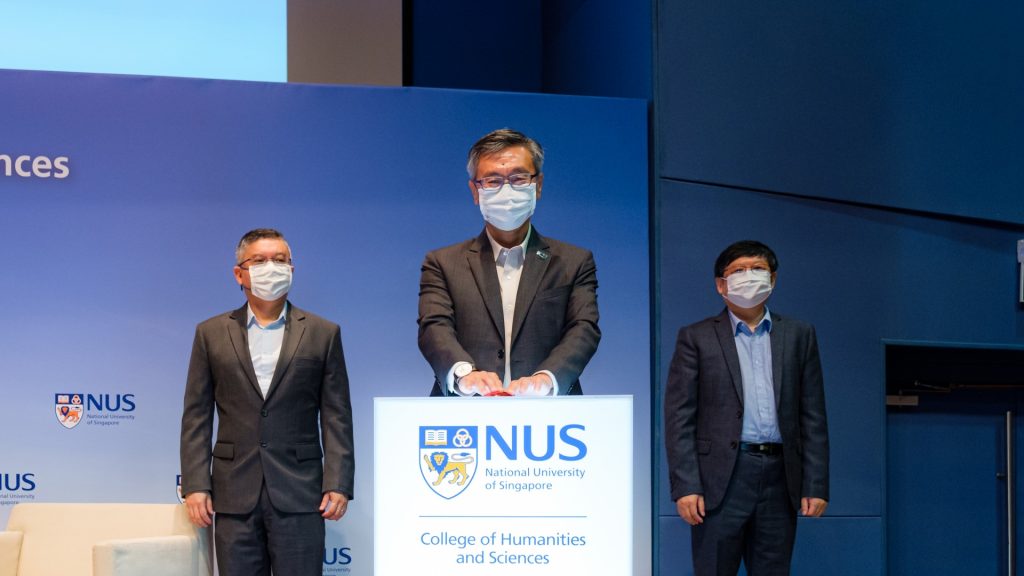
The accolade from PRISM, which coincides with the one-year anniversary of the official inauguration of CHS, bears testament to the concerted effort on multiple fronts of the campaign by various stakeholders, including the Communications teams from FASS and FoS, the NUS Office of University Communications and communications agency AKA Asia.
“The award comes as a truly wonderful one-year anniversary gift to all our colleagues involved in the CHS campaign,” said NUS Chief Communications Officer Ms Ovidia Lim-Rajaram.
“It is gratifying to know that our efforts to kickstart a meaningful, groundbreaking programme at the College are paying off, and that the journey to promoting an interdisciplinary, 21st-century educational experience at NUS is off to a great start.”
Communications at CHS is co-led by Mr Nisar Keshvani, Associate Director for Strategic Outreach and Communications at FASS, and Ms Janice Quah, Associate Director for Corporate Communications at FoS.
“The campaign award, a result of the synergy and collaboration across diverse University faculties and departments, epitomises the spirit of interdisciplinarity that CHS values, and the idea of capitalising on each other’s strengths to achieve the best outcomes,” Mr Keshvani said.
Ms Quah added, “It has been a challenging journey but seeing our communications ideas collectively come to fruition is truly fulfilling! The validation of the hard work motivates us to continue raising the bar, to sustain the impactful profiling of CHS to students and stakeholders.”
Recognising the best in public relations
Celebrating 44 winners across 27 categories, the PRISM awards ceremony was held on 15 Dec by the Institute of Public Relations Singapore (IPRS), the only accrediting body for public relations practitioners in Singapore. The Guest of Honour was Mr Tan Kiat How, Minister of State at the Ministry of Communications and Information (MCI).
Acknowledging the challenges of a shifting communications landscape, Mr Tan said, “MCI recognises the importance of excellence in public relations and communications across all sectors of the economy.”
“The campaigns up for awards today show how all of you have worked around these challenges and continued to achieve excellent levels of reach and impact.”

Held biennially since 1987, the PRISM Awards is one of the oldest and most prestigious awards in the industry, celebrating Singapore’s brightest stars in the communications and public relations industry. It is judged by a panel of established business leaders and senior practitioners, recognising and honouring organisations and individuals for excellence in public relations and communications.
Ms Koh Juat Muay, President of the IPRS Council 2021/2023 said, “The winning entries and the winners this year reveal a singular story – the resilience of our people, the ingenuity of the campaigns and strength of the organisations that continues to thrive in an evolving local and global communications landscape.”
“IPRS is privileged to hold PRISM Awards 2021 and share in the pride of profession demonstrated by our people and in the brilliance of their campaigns. Our winners truly embody the meaning of PRISM and that is Public Relations In the Service of Mankind,” she added.
This story first appeared in NUSNews on 21 December 2021.
An Interview with Emeritus Prof S. Vasoo and Assoc Prof Winston Goh on The Strange Start of Psychology at the National University of Singapore
The Strange Start of Psychology at the National University of Singapore (NUS Department of Psychology, 2021), showcases the history of the NUS Faculty of Arts and Social Sciences' Department of Psychology, Singapore's oldest psychology programme. The programme, which kicked off during the 86/87 academic year at the Department of Social Work (renamed the Department of Social Work and Psychology), became a department in 2005.

Author Dr John Michael Elliott (1945-2019), who was at the time a psychologist at the then Ministry of Social Affairs, joined the programme six weeks after it began and retired in 2018.
As the book explains, in Singapore, historically psychology was viewed more as clinical work that supported psychiatry, and mental health care was deprioritized. Instead, during the island's colonial era, patients requiring mental health treatment were institutionalized in The Insane Hospital, which commenced operations in 1841 with 30 beds. This hospital evolved into The Lunatic Asylum (1862, 100 beds), followed by The New Lunatic Asylum (1887, 300 beds), and then the Mental Hospital in 1928, which became Woodbridge Hospital in 1951.
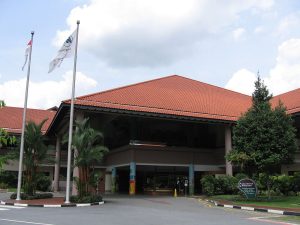
In 1993, Woodbridge Hospital moved to Buangkok Green, becoming the Institute of Mental Health's new inpatient facility.
There was a definite need for trained psychologists in Singapore, as well as a programme to train them, since, post-independence, all psychologists in the country completed their education abroad. When the NUS psychology programme got started in July 1986, however, the discipline was still often seen as non-Asian and more as medical training than a social sciences course, and also as a luxury in the realm of social work. The Department of Social Work was an ideal place for the new programme, Dr Elliott notes, as it would contribute to the department's own development, enabling it to offer an honours degree in social work and psychology.

The NUS psychology programme's initial cohort had 72 students and 1 staff and grew rapidly. There are currently around 900 students in the introductory psychology module and 220 honours graduates annually. At its inception 35 years ago the programme offered a three year general degree with a competitive fourth year honours degree. In 1989, 50 students received a general degree, 11 of whom went on to get an honours degree. Today, the department's own clinical psychology master's programme graduates approximately 15 annually, and psychology graduate students can also obtain a Master of Social Sciences or PhD.
The NUS Department of Psychology ranks 16 out of 303 on the Quacquarelli Symonds list and psychology is a well recognized and respected course of study in Singapore. Many graduates go on to engage in psychological work in the public sector, such as in Singapore's Ministries of Health, Defense, Home Affairs, and Social and Family Development. A number of graduates are also employed in private sector positions involving psychological work like human resource management and marketing, or in private practice in the fields of clinical, counselling, and industrial-organisational psychology, among others.

We discussed the The Strange Start of Psychology at the National University of Singapore, which has an online launch on Friday, 10th December at 11 am, with Associate Professor Winston D. Goh, the current NUS Department of Psychology Head, and Emeritus Professor S. Vasoo, who led the then NUS Department of Social Work and Psychology from 1987 to 1999.
 A/P Vasoo Q & A
A/P Vasoo Q & A
1. What were your most memorable experiences developing the new psychology programme during your term leading the NUS Department of Social Work and Psychology?
I have been teaching students and working with academic staff for about 50 years. In the course of these years, I always encouraged and advised them not to look back on events that had surpassed them. This is because memorable matters would not come back and one would not be able to deal with the bygones. No point spending time lamenting over things that have gone past as it can be emotionally costly and tiring. I always encourage students and academic staff to look ahead on events that will be forthcoming as these can be managed as they unfold and are within their control. I am of the opinion that various human issues that we can grasp at hand are largely solvable as long as we persistently tackle them with empathy. It is only with good empathy that we can have clearer insights to deal with human issues and relationships.
I recall that one of the challenging tasks that I had to deal with as the Head of the Department of Social Work and Psychology was to quickly recruit a group of Psychology academic staff to deliver the undergraduate psychology programme in 1986. I had selected staff with diverse psychology training such as a developmental psychologist, a cognitive psychologist, a social psychologist, an experimental psychologist, a clinical psychologist, and a psycholinguist. You can imagine with these varied backgrounds coming together to agree on a basic undergraduate curriculum was not easy. Each of them had different hobby horses to ride, which was understandable while mind-boggling, as there were protracted views within the group and at times heated arguments that I had to mediate. I brokered a deal as a non-partisan and drew a consensus among the different psychological academic personalities for the need to develop a top-notch undergraduate psychology programme based on the best psychology departments in the United Kingdom and United States. The foundation laid for the early phase of the psychology programme saw the fruition of some of our top psychology scholars in the Faculty of Arts and Social Sciences. I am indeed proud to witness that some of these accomplished scholars have become lead anchors of the NUS Department of Psychology and later appointed Heads. The nurturance of these top scholars have helped stabilize the psychology programme and provided succession of leadership. They also supported the Deanery of the Faculty of Arts and Social Sciences.
2. What can psychologists learn from social workers, and what can social workers learn from psychologists?

To put it simply, both psychology and social work are non-identical twin disciplines with each having to deal with human behaviour and social issues. As a psychologist, one has to understand human behaviour and the cause of such behaviour, and as a social worker, one has to understand the cause of social and human problems and then enable people to find ways to problem solve. Both disciplines deal with human and psychosocial issues, and human behaviour requires a multidisciplinary focus. I would say that no single discipline is adequate to solve human life course issues. I must add that a good psychologist will require social work lenses and a competent social worker needs to have helpful psychological lenses. As one will appreciate, we are all human beings and are ecologically bounded. Therefore both psychological and social work analyses are critical to better appreciate human behaviour and social interactions, and these can contribute to effective human and social problem solving.
3. What do you see as the most notable impacts in practice of social work and psychology in Singapore so far and in the future?

Psychology graduates as well as social work graduates are making robust contributions in public service, private enterprises, and non-governmental organisations. Psychologists hold highly respectable positions in areas such as clinical services, rehabilitation, health, human resources, education, the armed forces and the police, besides others. Increasingly, psychologists are needed to contribute psychological solutions to strengthen our psychological defences against various societal crises.
Likewise, social workers are also appointed in highly regarded positions in fields such as social services, rehabilitation, health, social research, counselling and mental health, education, the armed forces, and childcare, among others. Both psychologists and social workers have so far given valuable suggestions and inputs to policy changes to the care and protection of children, youth, and women, and in the support of the vulnerable and the promotion of inclusiveness of people with special needs.
Singapore like the rest of the world will be confronted with serious social and ecological changes, including the consequences of unabated climate change. In view of these changing scenarios, our future psychologists will have to be equipped with psychological skills in assessing the impact of human behaviour on mitigating issues related to the environment and climate change as well in order to have good insight into the social and psychological consequences of an ageing Singapore community. Trainee social workers can be better equipped with social analytical skills, which will make them more versatile in predicting specific vulnerable sectors of the community. Thereby, the future social workers can enhance their community problem solving capacity by building more support networks to build a socially healthy community. Specifically, more attention can be paid by both social workers and psychologists to deal with the social and psychological implications of the growing social divide between the haves and have-nots, and find more innovative ways to deliver services to enable the less well-off to move up.
 A/P Goh Q & A
A/P Goh Q & A
1. What are some of your fondest memories of Dr John Elliott, first as a teacher, and later as a colleague?
John encouraged critical thinking and we always had very illuminating discussions during his tutorials (see photo on page 28); of course, tutorials at that time only had between 5 and 7 students, so very difficult to hide! He was quite a tough marker though - never got an A from him for my term papers; but then again, As were given out very sparingly during that period (and there were no CAs at that time; the term paper grades were not counted). As a colleague, he was always willing to give advice to young hires, and his experience helped me immensely in the crafting of exam questions when I first started helming my own modules. I also remember he was very particular in signing or agreeing to legal documents - he once refused to upload materials into IVLE (the forerunner of LumiNUS) because he felt NUS did not provide enough protection for staff.
2. What motivated you to study psychology at NUS as an honours and then Masters student, and what prompted you to return to the department to teach and carry out research projects?
 I was in the pre-med programme in junior college, so the path seemed straightforward for me. But I started reading about psychology as a course in various government information booklets and thought this was more interesting than medicine - I also didn't do well at the A levels, so perhaps this was fate telling me to take another path. However, this meant you had to go overseas as there was no psychology programme offered locally and my parents could not afford an overseas education. So when I was accepted in FASS, I was set to major in the closest one at the time - Sociology. I didn't start right away as I had to serve National Service; and in my second year of NS, I found out that NUS had started a psychology programme (again, fate may have been looking out for me!). Fortunately, I did well enough in the aptitude test (required then) to be allowed to major in Psychology. Everyone was hoping to do Honours, and at the time, you had to be invited, so I was elated when the Department of Social Work and Psychology offered me Honours, no motivation required. As for the Masters, I worked as an RA after completing my Honours, so I wanted to see if a research and academic career appealed to me, and decided to do my Masters while I was a TA for the Department. After that, NUS funded my PhD overseas on a staff development scheme, so I was obligated to return to serve a bond. In a sense, NUS Psychology has been my home since I started as an undergrad student, for I never left!
I was in the pre-med programme in junior college, so the path seemed straightforward for me. But I started reading about psychology as a course in various government information booklets and thought this was more interesting than medicine - I also didn't do well at the A levels, so perhaps this was fate telling me to take another path. However, this meant you had to go overseas as there was no psychology programme offered locally and my parents could not afford an overseas education. So when I was accepted in FASS, I was set to major in the closest one at the time - Sociology. I didn't start right away as I had to serve National Service; and in my second year of NS, I found out that NUS had started a psychology programme (again, fate may have been looking out for me!). Fortunately, I did well enough in the aptitude test (required then) to be allowed to major in Psychology. Everyone was hoping to do Honours, and at the time, you had to be invited, so I was elated when the Department of Social Work and Psychology offered me Honours, no motivation required. As for the Masters, I worked as an RA after completing my Honours, so I wanted to see if a research and academic career appealed to me, and decided to do my Masters while I was a TA for the Department. After that, NUS funded my PhD overseas on a staff development scheme, so I was obligated to return to serve a bond. In a sense, NUS Psychology has been my home since I started as an undergrad student, for I never left!
3. What future plans are in the works for NUS Psychology and how do they connect to the need for scholars and practitioners of the discipline in Singapore and the region?

Top psychology departments in the world are very well resourced with research spaces, laboratories, and facilities; so we hope to move in that direction and provide all of our research-active staff dedicated lab spaces to do research that will benefit Singapore and the discipline in general. We will also need to see how many more students (we have always been one of the more in-demand majors since inception) will want to be Psychology majors with the advent of the College of Humanities and Sciences, and perhaps develop various teaching innovations to serve an even more expanded student body (the days of 5-7 pax tutorials, or a 10-student Honours cohort in my year, are long gone). But we have very good educators in the department, so I am not worried about that. Our Clinical Psychology Masters programme is also in very high demand, given the focus on mental health needs nowadays. So we will need to see how we can support training for manpower needs in the public and private sectors in terms of workshops for associate psychologists, in additional to training people to be professional clinical psychologists.
Thank you very much for your time and answers, Prof Vasoo and A/P Goh! Readers can learn more about the history of the NUS Department of Psychology here. Catch the book launch on Friday December 10th at 11 AM by registering via Zoom.
NUS Faculty of Arts and Social Sciences' 18th Dean Takes Office
IN BRIEF | 2 min read
-
Dean of the Faculty of Arts and Social Sciences, Professor Lionel Wee, and other members of the Deanery take on their leadership roles today.
Professor Lionel Wee has assumed the position of Dean of the NUS Faculty of Arts and Social Sciences (FASS) and Co-Dean of the College of Humanities and Sciences (CHS) as of today, Friday, 1 October 2021. Prof Wee takes over the helm from Professor Robbie Goh, who is now the Provost of the Singapore University of Social Sciences.
Before becoming FASS' 18th Dean, Prof Wee was the Faculty’s Vice Dean of Research (2014-2021) and is a Provost's Chair Professor of Linguistics with the Department of English Language and Literature, which he headed from 2010 to 2014.
“It is an honour to be given the opportunity to helm the Faculty of Arts and Social Sciences. The Faculty has achieved much since its founding nearly a century ago, continually evolving to anticipate and address the needs and challenges of a changing society," said Professor Wee.
"Together with the Deanery, colleagues, and students of the FASS, I am confident that we will continue to make breakthroughs in both education and research. While these benchmarks are important, diversity and inclusion are priorities for me, and essential pillars of every organisation. My plan is to further emphasise and ensure our staff and students feel empowered and safe in the Faculty in the coming years," he said.

New Appointments to the Strong Leadership
Beginning their new roles with the FASS Deanery today are:
- Associate Professor Elaine Ho (Geography) as Vice Dean (Research). She was previously Assistant Dean (Research).
- Associate Professor Elmie Nekmat (Communications and New Media) as Assistant Dean (Research).
The following members of the Deanery will continue to serve in their respective positions:
- Associate Professor Melvin Yap, Vice Dean (Undergraduate Studies)
- Associate Professor Valerie Wee, Vice Dean (Undergraduate Studies)
- Associate Professor Bruce Lockhart, Vice Dean (Graduate Studies)
- Professor Chen Yi-Chun, Vice Dean (International Relations and Special Duties)
- Associate Professor Loy Hui Chieh, Vice Dean (External Relations and Student Life)
- Mr Mark Teng, Director of Administration
- Associate Professor Sidharthan Maunaguru, Assistant Dean (Undergraduate Studies)
- Dr Zhang Yang, Assistant Dean (Undergraduate Studies)
- Dr Jinna Tay, Assistant Dean (Undergraduate Studies) – recently appointed to the Deanery on 1 July 2021.
- Associate Professor Nicholas Hon, Assistant Dean (External Relations and Student Life)
Designing Quizzes that Prompt Review and Revision
IN BRIEF | 4 min read
-
Mr Jonathan Sim, instructor from the Department of Philosophy, advises on designing regular quizzes as a tool to ensure students review their assignment feedback and address gaps in their understanding.

Assignment feedback is key to helping students improve and correct their understanding so they can build upon solid foundations of knowledge as their course progresses.
Yet, traditionally only about 30 per cent of students review their assignment feedback in my experience of teaching. This feedback consists of answers to quizzes and/or comments on how to improve the quality of their writing.
Having experimented with different forms of feedback – written remarks, reports, pre-recorded video discussions – I’ve found the engagement level remains at around 30 per cent.
Content in the second half of the semester builds upon foundations laid in the first half meaning students start to struggle with the course if they do not address flaws in their understanding early. There is a direct correlation between students who appear to find the subject matter more difficult and those who do not review feedback.
So why is this?
It is not because students are lazy but because they struggle to find the time and often have little immediate incentive to review feedback for something that has already been graded when they have other assignments to work on.
So feedback is most effective when it is shared with students while they are still working on the assignment. They are more inclined to review feedback and improve their understanding of the module while it is still within their power to earn a better grade.
Revamping quiz structures
Many rounds of trial and error have revealed an effective way to encourage students to review feedback is by redesigning the way we think about online quizzes, especially regularly administered quizzes such as lecture quizzes.
The traditional quiz is often structured as a summative assessment evaluating the student’s mastery of the subject, and students can find such quizzes very stressful.
A more effective way to structure quizzes is through formative assessments. These are learning exercises that help students apply methods they have learned during the course. I call these “Knowledge Checker Quizzes”, as they are designed to help students discover and address gaps in their understanding.
Students can attempt the quiz five times and I will take the scores from their latest attempt to prevent the use of brute-force methods. Experience shows five is a good number of attempts to allow, providing students with more than enough rounds to succeed – from the data, most students can score full marks within three attempts – without getting frustrated from having countless re-dos.
Students can see the quiz score only after each submission. This prevents students from gaming the quiz to identify the right answers without properly understanding the content.
Not all students like this method, but this process does push them to thoroughly review all the resources and feedback that have been provided.
Support for students
Two forms of support are in place to help students refine their understanding of the module. The first is general feedback on the quiz questions. This provides them with enough clues for them to reflect on and re-evaluate their answers.
If they find themselves unsure, or discover gaps or flaws in their knowledge, the second form of support kicks in.
We provide a Question and Answer resource. Each Knowledge Checker Quiz has its own Q&A resource listed as a Google Docs link available in the quiz notes. I specifically use Google Docs because it allows students to access the latest version should the Q&A section be revised or updated.
When creating a Q&A document, I first populate it with clarifications and tips to help students work on the assignment. This includes further discussions on issues that were not discussed during lectures, and some common questions that students might ask. Should I receive new queries from students, I will append them to the Q&A document, allowing me to easily refer students to these answers.
With all these resources in place, the quiz itself becomes a bit like a game. Students are expected to piece together the various clues from the lectures and these three resources: the quiz score from their earlier attempts, the general feedback to each question, and the resources in the Google Docs Q&A.
In the second semester of the academic year 2020 to 21, 73 per cent of students reported that the quizzes were rewarding and helped their confidence-building. The quizzes allowed them to score full marks through their own efforts, or in conjunction with active discussions based on the resources that we provided.
The quizzes and feedback structures successfully strengthened students’ foundational understanding, meaning significantly fewer – just 12 per cent – struggled with course fundamentals during the second half of the semester.
This story first appeared on Times Higher Education on 8 September 2021.
NUS Philosophy Asst Prof Zach Barnett’s Paper Selected for Philosopher’s Annual Top 10
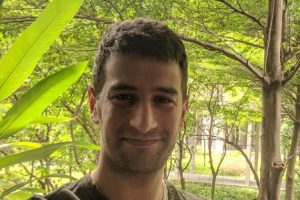
The editors of Philosopher’s Annual have announced its selection of one of Assistant Professor Zachary Barnett’s (NUS Department of Philosophy) research papers as one of the top 10 papers in its 40th edition.
Originally published in Philosophy & Public Affairs, one of the very top specialist ethics journals, Dr Barnett’s paper, "Why You Should Vote to Change the Outcome", argues against the “prevailing opinion...that voting to change the outcome is irrational, since although the payoffs of tipping an election can be quite large, the probability of doing so is extraordinarily small” by showing that “given certain basic assumptions, the rationality of voting can be proven to hold given two conditions,” which he says “are often satisfied in typical electoral circumstances.”
"The Philosophy Department at NUS has become arguably the strongest philosophy department in Asia, largely through our recent hiring of promising and talented young philosophers such as Dr. Barnett. Simply put, Dr. Barnett is one of the most interesting young philosophers around," said Associate Professor Qu Hsueh Ming, Head of NUS Philosophy.
"Why You Should Vote to Change the Outcome is an elegant and masterful showcase of the real-world impact that philosophy at its best can effect. The honour of having his paper selected in the Philosophers' Annual is a exceptional one, but also one that is well-deserved; Dr. Barnett also has no less than two papers selected as Oxford University Press' 'Best of Philosophy' series in recent years," he added.
Dr Barnett received his PhD in Philosophy from Brown University in 2018 and joined NUS about three years ago. He studies various topics in contemporary philosophy, including ethics, epistemology and decision theory.
The prestigious Philosopher’s Annual, helmed by Professor Patrick Grimm, Philosopher in Residence at the University of Michigan, with other leading philosophy academicians, has been published annually since 1978.
Every year it calls on prominent philosophers to nominate articles for consideration, which then undergo rounds of feedback, extensive reading and scrutiny before the top ten are selected.
For the full Philosopher’s Annual 2020 list click <here>
New NUS Dean of Arts and Social Sciences Appointed
IN BRIEF | 5 min read
-
Professor Lionel Wee will be appointed the new dean of the NUS Faculty of Arts and Social Sciences (FASS) and co-dean of the College of Humanities and Sciences from 1 October 2021.
-
Prof Goh, who has served as the Dean since 2017, will be taking a leave of absence from the University, but will continue to contribute in the Singapore education sector as the new Provost at the Singapore University of Social Sciences from 1 October 2021.
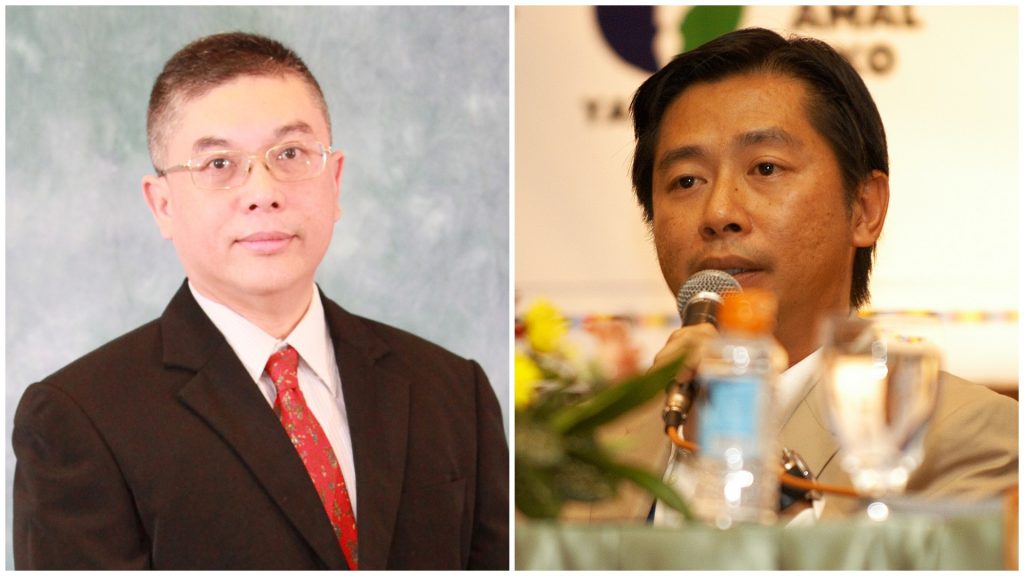
The University today announced the appointment of Professor Lionel Wee as the new Dean of its Faculty of Arts and Social Sciences (FASS) and Co-Dean of the College of Humanities and Sciences. Prof Wee will take over the helm from Prof Robbie Goh as the Faculty’s 18th Dean from 1 October 2021.
Currently FASS Vice Dean of Research and Professor of Linguistics in the Department of English Language and Literature, Prof Wee was appointed Provost’s Chair Professor in July 2017 for his outstanding scholarly achievements.
After graduating from NUS in 1988 with a Bachelor of Arts (First Class Honours) degree majoring in English Language and Sociology, Prof Wee embarked on an academic career, joining the University as a Teaching Assistant with the Department of English Language and Literature. He was awarded the NUS Overseas Graduate Scholarship where he pursued his PhD in Linguistics at the University of California, Berkeley. Prof Wee was appointed as a Lecturer upon his return to Singapore in 1995, and rose the ranks to full Professorship in 2012.
“NUS is pleased that after a rigorous global search, Prof Lionel Wee has been selected to be the next Dean. He is passionate about high quality education and research, and has an excellent understanding of FASS and the University, having served in numerous leadership roles at the department, faculty and university-levels. I am confident that he will bring the Faculty to new heights of international excellence,” said NUS President Professor Tan Eng Chye.
Besides serving as Vice Dean of Research at FASS from 2014 to present, Prof Wee was also the Head of the Department of English Language and Literature from 2010 to 2014. He had also contributed on various committees such as Chair of the FASS Faculty Promotion & Tenure Committee II, Chair of the University Mid-Term Advisory Report Committee, and Member of the University Promotion and Tenure Committee. In recognition of his dedicated service and contributions to NUS and education in Singapore, Prof Wee was awarded the National Day Awards Public Administration Medal (Bronze) in 2020 and the Long Service Medal in 2018.
“I am excited and honoured to be given this opportunity to lead my alma mater as its next Dean. Having spent more than three decades at FASS, both as a student and a faculty member, I have experienced firsthand the selfless commitment of my colleagues and impressive insights our students bring to the study of the arts, humanities and social sciences. I am confident that together, we can continue to make significant contributions to society while enhancing our Faculty’s standing as one of the leading humanities and social sciences faculties in the world,” said Prof Wee.
Besides his passion in linguistics, Prof Wee feels very strongly about animal welfare and is also very much an avid city traveller, although the pandemic has put quite a damper on travel in the past year or so. He also enjoys the cafes, a habit which he picked up during his time as a graduate student in Berkeley. Students and colleagues at FASS may have many a times seen Prof Wee deep in thought at the cafes across the NUS campus. He is very much focused in developing a particular idea or argument once he is seated down and would need to walk around before he can move on to another new idea.
Prof Wee has published widely in international and local journals, and also sits on the editorial boards of a number of academic journals and publications, including Applied Linguistics, English World-Wide, Multilingual Margins, The Journal of Asian Linguistic Anthropology, the “Cambridge Elements: World Englishes” book series, and the “Multilingualisms and Diversities in Education” book series. He is a well-respected scholar with research interests in the areas of language policy (especially in Southeast Asia), the grammar of Singapore English, metaphorical discourse, and general issues in sociolinguistics and pragmatics.
Prof Goh, who has served as the Dean since 2017, will be taking a leave of absence from the University. However, he will continue to contribute in the Singapore education sector as the new Provost at the Singapore University of Social Sciences from 1 October 2021.
Prof Goh said, “It has been a privilege and honour to serve as Dean of one of Singapore’s largest and most historied Faculties. I am grateful to my talented colleagues for all their hard work. I believe that together, we have brought the Faculty to new heights of excellence in teaching, research and service. I look forward to the work of creating new programmes and nurturing talent in my next role as Provost of the Singapore University of Social Sciences, and hope that I will also be able to forge new ties and collaborations between the two universities."
Having spent more than three decades at the University, Prof Goh has taken on numerous administrative and leadership roles outside of the Faculty. He was Deputy Director of the NUS Centre For the Arts from 1996 to 1999, and Deputy Director of the Asia Research Institute from 2008 to 2010.
“On behalf of the University, I would like to express my heartfelt appreciation to Professor Robbie Goh for his dedication and strong stewardship in leading NUS FASS. Under his visionary leadership, the Faculty has made significant contributions to the advancement of education and research in the humanities and social sciences. During his leadership, the FASS 2.0 Industry Tracks programme was started to enhance the employability of its graduates. New multidisciplinary initiatives such as the Philosophy, Politics & Economics programme were also established. The Faculty has also expanded collaborations with industry and further strengthened its high international reputation,” added Prof Tan.
This story first appeared on NUSnews on 13 August 2021. The full press release is here, and Professor Lionel Wee's biography is here.
From Careers for a Lifetime, to a Lifetime of Careers
IN BRIEF | 5 min read
-
The top skills desired by employers will include critical thinking, analysis, problem-solving and self-management skills such as active learning, resilience, stress tolerance and flexibility.
What does the future of work look like? In this evolving world, new occupations and roles which did not previously exist continue to emerge, while certain traditional skills and jobs continue to become obsolete.
The World Economic Forum’s (WEF) The Future of Jobs Report 2020 (October 2020) highlighted a few key trends.
First, technological adoption of cloud computing, Big Data and e-commerce in many businesses will accelerate the transformation of jobs, skills and entire industry value chains. 85 million jobs are expected to be displaced by a shift in division of labour from humans to machines by 2025, while 97 million new roles may emerge.
Second, online learning and training boomed during the pandemic. The shift was a watershed moment, and there is no turning back for many industries. The pandemic also brought into sharper focus the importance of lifelong learning, with more employees upskilling and reskilling to stay relevant in the volatile job market. More workers are now pursuing personal and professional development, especially in digital skills.
Last but not least, the top skills desired by employers will include critical thinking, analysis, problem-solving and self-management skills such as active learning, resilience, stress tolerance and flexibility.

What skills do employers seek?
Many of these in-demand skills highlighted in WEF’s report corroborate CFG’s Industry Insights Survey (2020). Drawing on insights from career events, industry surveys and engagements, CFG’s survey cited a similar list of soft skills that are becoming increasingly imperative at the workplace.
These are abilities learnt through life experiences that are impervious to change, and relevant across all professions and workplaces. They are attributes we take with us when we embark on job pathways in the New Normal - which are shifting from one defined career over a lifetime, to a series of dynamic and rapidly changing careers.
Our survey clusters these abilities into two main categories: Personal Qualities and Workplace Traits.
Personal qualities
Many employers are looking for individual cognitive abilities such as problem-solving, learning agility and pattern-recognition. They are also seeking graduates who are equipped with design and computational thinking, as well as proficiency in quantitative analysis.
They want graduates who are able to look at problems from different perspectives, to solve complex problems in real-world environments. For example, can a customer service issue be resolved with a combination of user interface design changes, IT infrastructure automation and manpower staffing? What are consumer consumption patterns and behaviours telling us?
Employers also seek character traits such as curiosity, resilience, empathy, proactivity, leadership and adaptability. These traits are predictors of future potential, and potentially determine career longevity and progression. For example, are you curious to learn what other teams or functions are doing beyond your job scope and discover potential synergies? Are you adaptable to changes in your project scope, and possess a “can-do” attitude in the face of obstacles?
Workplace traits
Besides personal qualities, employers are also looking for graduates who possess certain desirable workplace traits. These include good communication and presentation skills, cultural sensitivity and a global mindset. Graduates with business acumen, who are able to influence and negotiate, and are competent in managing different teams and projects, are much sought after.
These attributes mirror the realities of the modern workplace, where teams and projects are becoming more diverse, cross-functional, cross-cultural and business-driven. For example, can you work with a diverse team of colleagues towards achieving a common objective? Can you visualise your organisation’s business potential in an overseas market or a new customer segment?
The call to CHS students
In CHS, you will acquire interdisciplinary knowledge and skills by learning how to draw connections, links and insights across diverse disciplines. It is this important foundation of interdisciplinarity that will better prepare our students to become problem-solvers in an uncertain world beyond the pandemic.
Even as the pandemic has accelerated digital transformation, data is now the new asset that enables businesses to enhance efficiency and augment the ability of their teams to deliver greater value. CHS will focus on competencies like data literacy and design thinking, skills that are now in high demand by industries seeking to unlock value from Big Data.
Beyond academics, internships are one of the best ways to hone workplace experience. When you are on vacation, aim for at least two (if not more) internships, preferably one with an overseas employer. Immerse yourself in co-curricular activities, which provide hands-on opportunities to gain skills such as leadership, teamwork and project management. These experiences in your resume and portfolio will place you in a better stead with employers.

Enhancing employability, preparing for careers
CHS students will have a dedicated Career Advisor, who will guide you through the process of developing a personal career plan. You will be pre-assigned a career preparation module, Career Compass, closely following CFG’s four-year Career Readiness Roadmap which provides a formal framework for your career planning during your undergraduate journey.
You will be enrolled in Career Catalyst, a foundational freshmen module that identifies your core strengths and enhances your profile towards securing an internship. As you progress to Years Two/Three and your final year, you can also sign up for our Career Booster workshops or Career Advancement Webinar Series (CAWS).
Article contributed by the Centre for Future-ready Graduates (Ms Joan Tay, Director and Career Advisors Mr Ryan Ang and Mr Ng Buck Seng)
This story first appeared on CHS on 29 July 2021.
NUS CHS Case Competition: Driving EV Adoption in Singapore
IN BRIEF | 1 min read
- The just-released problem statement for NUS CHS' inaugural Case Competition – Encouraging electric vehicle (EV) ownership in Singapore – is an important real-world topic of especial relevance to us all, as the nation is driving toward a future of electric mobility that is essential to the Singapore Green Plan 2030.

Are you interested in translating your innovations to reality by applying interdisciplinary knowledge and skills?This is now possible with the inaugural College of Humanities and Sciences (CHS) Case Competition, launched on 26 July.
The competition is specially designed for NUS students, and enables participants to synthesise ideas and perspectives from different disciplines to solve complex, real-world challenges.

The competition themes, “Sustainability” and “Technology and Us”, are highly topical today. The problem statement - Encouraging electric vehicle (EV) ownership in Singapore - is an important real-world topic, even as Singapore ushers in a future of electric mobility as a key piece of the puzzle in the Singapore Green Plan 2030.
At the virtual launch, our competition partners - the Ministry of Transport, KPMG and Schneider Electric - discussed plans by the Singapore government to usher in the future of EV, Schneider Electric’s vision of a 100% electric mobility future with net-zero carbon emissions and upcoming trends in mobility solutions identified by the advisory arm of KPMG.

Participants will have the opportunity to attend mid-term workshops in mid-August, which provide important domain knowledge, including engineering and design, and communications skills.
The project submissions will be judged in the final round of the competition on 20 September by representatives from our competition partners. They will also be sharing their EV domain expertise with the participating teams throughout the competition.
The launch was attended by more than 100 participating teams (close to 200 individual attendees) from across NUS.
Find out more about the competition here and read the problem statement here.
Strong Interest in Interdisciplinary Learning With High Acceptance Rates
IN BRIEF | 5 min read
-
NUS President Professor Tan Eng Chye discusses the University’s recent interdisciplinary initiatives – the setting up of the College of Humanities and Sciences (CHS) and the new Common Curriculum for the Faculty of Engineering and the School of Design and Environment – and the importance of lifelong learning in ensuring that students are adaptable and future-ready.
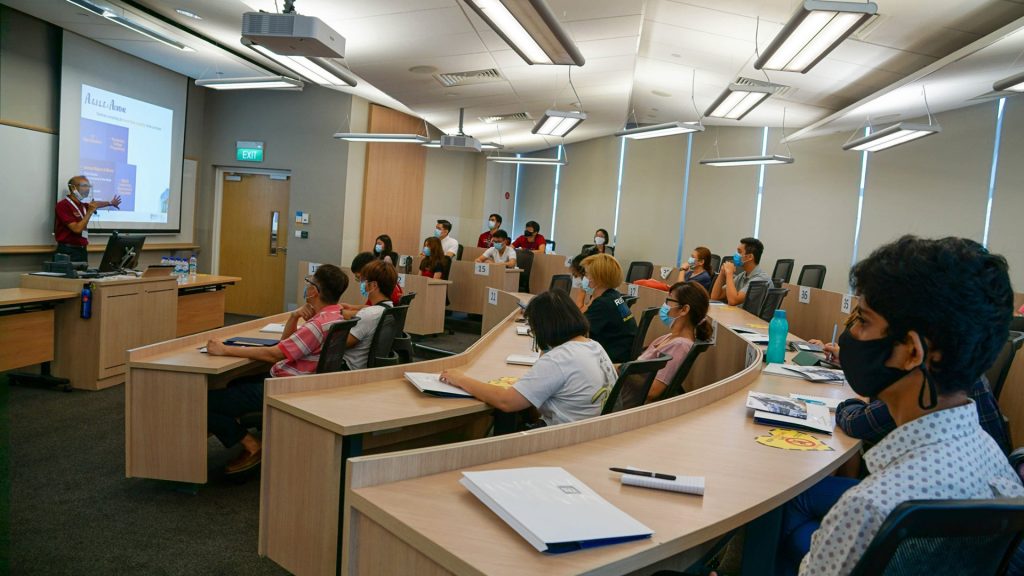
In today’s volatile, uncertain, complex and ambiguous (VUCA) world, staying stagnant is never an option. Now, more than ever, universities have to prepare students to thrive in a fast-changing and unpredictable post-COVID reality through an interdisciplinary education.
Just ask the incoming batch of freshmen, who have given a thumbs-up to the University’s recent interdisciplinary initiatives – specifically, the setting up of the College of Humanities and Sciences (CHS), and the new Common Curriculum for the Faculty of Engineering and the School of Design and Environment.
During the admissions exercise this year, 71 per cent of those who had applied to these programmes as the first choice accepted the offer. Among the incoming batch of freshmen, over 4,000 will be exposed to an interdisciplinary education. By August 2022, NUS hopes to push this number to more than 6,000.
“We are quite heartened that the applicants have responded very well,” said NUS President Professor Tan Eng Chye, as he spoke on the new changes in NUS’ curriculum. “They are receptive to the flexibility that they will have. No more are you confined to one discipline.”
Prof Tan noted that the world faces many wicked problems that cannot be solved with only one discipline.
He cited COVID-19 as a wicked problem, requiring more than just medical sciences to solve. “Even with the right medical knowledge, many countries had difficulties handling COVID-19 and its spread,” he noted.
The pandemic, in fact, prompted NUS to ramp up efforts in remodelling its educational philosophy and pedagogies to prepare its graduates for this dynamic reality.
At the centre of these reforms is the push for lifelong learning, as well as the shift towards interdisciplinary education to ensure students are adaptable and future-ready.
A lifetime of learning
While universities used to prepare their graduates for a single job, this approach is fast becoming obsolete. Today, graduates will change jobs at least 10 times over the course of their lifetime.
In line with this trend, NUS has been future-proofing its education to prepare students for lifelong learning.
“A student’s enrolment is valid for 20 years from the point they enter the university,” Prof Tan explained. “We want to remove the conception that university is only for four years. You can always come back to (NUS) to learn new skills and knowledge.”
For instance, the NUS Lifelong Learners (L3) programme upskills alumni through a wide array of skill-based, industry-relevant courses, carefully tailored to focus on emerging skills identified under SkillsFuture such as data analytics or digital literacy.
The process of returning to NUS for further studies is also made seamless. If a student does not complete a second major or degree in their initial four years, they are welcome to return to the university to read the necessary remaining modules even after graduation.

Towards interdisciplinary learning
Recognising the benefits of interdisciplinary learning, NUS is rolling this out to more students.
This started with the launch of CHS, which brings together the Faculty of Arts and Social Sciences and the Faculty of Science.
In the upcoming semester, CHS will admit 2,200 students and they will take a new Common Curriculum within their first three semesters – consisting of integrated modules with a problem-based pedagogy.
Similarly, a Common Curriculum has been introduced for the Faculty of Engineering and the School of Design and Environment to encourage knowledge transfer between the two complementary disciplines.
For instance, NUS’ very own net-zero energy building at SDE4 is a product of melding both architecture and engineering – the first of its kind in Singapore.
“The building’s beautiful architectural design alone doesn’t contribute to it being net-zero energy. What you have is a lot of deep engineering work embedded into it. It shows that architects have to work very closely with engineers in order to achieve this,” explained Prof Tan.
With interdisciplinary learning, the proportion of Unrestricted Elective modules a student can take has also been increased to up to 30 per cent, encouraging students to have two or more specialisations.
In the four faculties that now have an interdisciplinary common curriculum, this works out to more than 700 possible double major pairings, 1,700 major-minor pairings, and 100,000 major with double minor combinations.
Expanding choices for students
Ultimately, these educational innovations create greater flexibility for students to curate their own curriculum.
They will no longer have to make an immediate commitment to a single discipline. Instead, they are given time to decide on their academic calling through the common curriculum.
These efforts are central to NUS’ flagship role as a creator, integrator and propagator of knowledge.
Looking ahead, the structural barriers between faculties will further dissolve, allowing students to build even broader connections between disciplines.
“Right now, we have 70 majors and 80 minors, but we may actually have more as we go along. We start with a minor. If there’s enough interest, we push it to a second or full major. The possibilities are endless especially as we move online,” said Prof Tan.
This story first appeared on NUSnews on 26 July 2021.
Group Work: Improving Communication, Participation and Dynamics
IN BRIEF | 4 min read
-
Mr Jonathan Sim, instructor from the Department of Philosophy, offers up three methods for facilitating effective group work by improving participation and communication between student peers.

When I ask students how they feel about group projects, the response is often negative. This is usually a result of bad experiences with problematic group members, such as free riders who do not contribute or members who bulldoze their ideas through while disregarding their peers.After many semesters mediating disputes within such groups, I have found that issues often stem from concerns about “saving face”.
This leads to a lack of much-needed communication.
Concerns about saving face, or preserving pride and reputation, are common in Singapore, and few places are immune from this. In many cultures, ordinary actions such as seeking help from others can be seen as embarrassing. With close friends, this is not an issue. But with student peers, who may be unfamiliar, one might feel more concerned about not appearing as a liability to the group.
There is also concern about causing others to lose face. It is just as bad to embarrass or offend someone else by highlighting their mistakes or to say something contrary to what they had expressed. This is especially so in the presence of peers with whom one lacks familiarity. Such outspoken behaviour can appear confrontational, showing up the other person in front of others.It is because students are afraid of embarrassing themselves or their group members that there is a lack of communication. Students would rather stay silent than admit their struggles or voice legitimate concerns. It’s not that they prefer silence, but they lack knowledge about how to effectively communicate or manage problems without causing anyone upset or offence.
Conversely, students who report that they are happy working in groups are usually very friendly with one another. They regard each other as friends rather than unfamiliar co-workers, are less inhibited or concerned about embarrassment, and can communicate more openly.
Students will have a more productive and enjoyable group work experience if they can achieve similar levels of relaxed friendliness within their groups. I have found these three methods very effective to help facilitate group dynamics:
Grading based on collaboration
Change the tutorial participation grading rubric. In my module, students belonging to the same project group are also required to discuss and solve challenges together for tutorials. This gives them more opportunities to interact and grow friendlier with each other.
However, this alone was not sufficient because students still retained the same level of cold unfamiliarity with group mates. So instead of awarding marks based on contribution – ie, the more you talk, the more marks you get – we began grading class participation based on how much students help others in their group, and how much students seek help within their groups.
This incentivises students to help one another and collaborate in their learning. By making it a mandatory policy for students to help and seek help, we remove the embarrassment associated with asking for help or advice. It creates a friendlier working environment – one where students within a group learn to grow comfortable with helping each other out.
Breaking the ice
The second method is to introduce a mandatory ice-breaker or warm-up activity at the start of every tutorial. Groups get five to 10 minutes to talk about the given ice-breaker topic or bond over a topic of their choice. They are not allowed to start on the actual tutorial activity until that sacred time is up.
Devising the right discussion topic is the critical point. Students will likely be able to bond over hobbies, shared experiences such as taking the same module together, or even common annoyances. I encourage my students to bond over complaining about how challenging my assignments are – and it works in building solidarity among them.
After introducing the mandatory warm-up activity in the second semester of 2020-21, 76 per cent of that student cohort reported that it had helped them to bond with their group.
Resolving differences
The third strategy is to provide students with resources guiding and teaching them to communicate better with each other. As mentioned earlier, many students are afraid of causing themselves or a group mate embarrassment because they do not know how best to manage difficult situations.
I provide materials to teach students how to respectfully handle disagreements and make it mandatory for them to discuss and document their differences in values and working styles. Students have to come to a common agreement with each other, if there are differences. The mandatory discussions give students an avenue to speak up without fear of appearing confrontational because they are not the ones initiating it, and it teaches them the importance of ironing out differences in a respectful manner.
With these three methods in place, group communication, and therefore group work, has improved. Many students in this module now claim that these are the best groups they have ever worked with.
This story first appeared on Times Higher Education on 21 July 2021.
Six Inspirational Works on Shortlist for S$50,000 NUS Singapore History Prize
IN BRIEF | 5 min read
-
The 2021 Prize was open to non-fiction and fiction works in English (written or translated) that were published from January 2017 to 30 May 2021. These also included creative works that have clear historical themes, as well as book-length works that were either authored or co-authored and addressed any time period, theme, or field of Singapore history, or included a substantial aspect of Singapore history as part of a wider story.
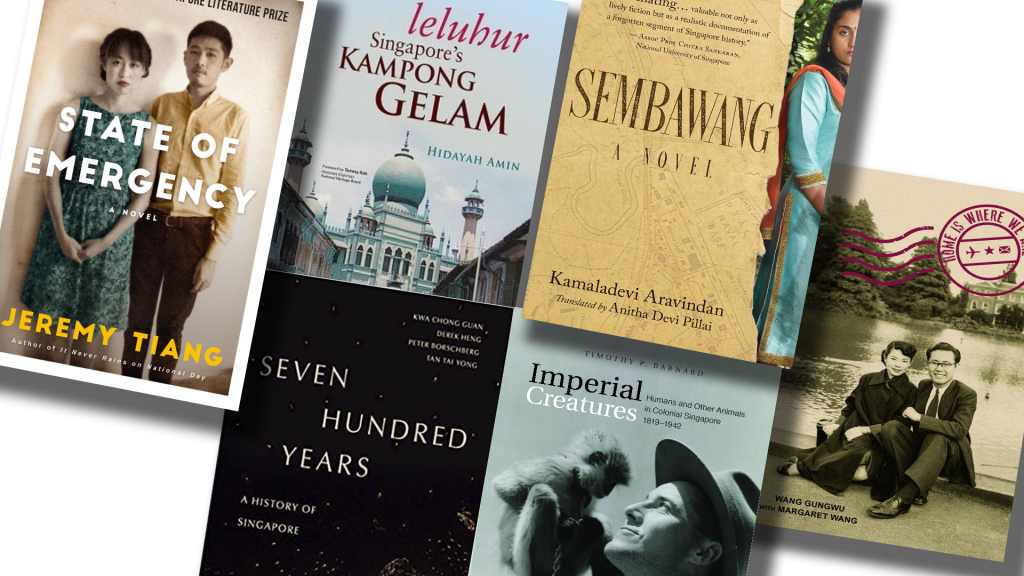
The Department of History at the NUS Faculty of Arts and Social Sciences today announced six inspirational works that have been shortlisted for the second run of the NUS Singapore History Prize – the first-ever history prize devoted entirely to Singapore history.
A five-member nominating committee, drawn from academia, the civil service, and the arts, have shortlisted the following works as best meeting the qualities that the Prize strives to encourage:
- Jeremy Tiang, State of Emergency (Epigram Books, 2017)
- Hidayah Amin, Leluhur: Singapore’s Kampong Gelam (Helang Books, 2019)
- Timothy P Barnard, Imperial Creatures: Humans and Other Animals in Colonial Singapore, 1819-1942 (NUS Press, 2019)
- Kwa Chong Guan, Tan Tai Yong, Peter Borschberg, Derek Heng, Seven Hundred Years: A History of Singapore (Marshall Cavendish Edition and National Library Board, Singapore, 2019)
- Kamaladevi Aravindan, Sembawang: A Novel (Singapore: Marshall Cavendish, 2020)
- Wang Gungwu, Home is Where We Are (NUS Press, 2020)
Please refer to the Annex for a brief synopsis of the six works.
Mooted by Mr Kishore Mahbubani, Distinguished Fellow at the NUS Asia Research Institute, and administered by the NUS Department of History, the NUS Singapore History Prize was created in 2014 in support of the national SG50 programme to celebrate the 50th anniversary of Singapore’s independence.
An open global competition, the Prize aims to stimulate an engagement with Singapore’s history broadly understood – this includes the period pre-1819 and works dealing with Singapore’s place in the world. It also aims to make the complexities and nuances of Singapore’s history more accessible to non-academic audiences and to cast a wide net for consideration of works that deal with history. At the same time, the Prize hopes to generate a greater understanding among Singapore citizens of their own unique history.
The Prize is awarded every three years and the author of the winning publication will receive a cash award of S$50,000. In 2018, the inaugural Prize was awarded to Emeritus Professor John Miksic, whose work Singapore and the Silk Road of the Sea, 1300 – 1800 provides detailed archaeological evidence that Singapore’s story began more than 700 years ago.
The 2021 Prize was open to non-fiction and fiction works in English (written or translated) that were published from January 2017 to 30 May 2021. These also included creative works that have clear historical themes, as well as book-length works that were either authored or co-authored and addressed any time period, theme, or field of Singapore history, or included a substantial aspect of Singapore history as part of a wider story.
A distinguished jury chaired by Mr Mahbubani and consisting of novelist Dr Meira Chand; economist Dr Lam San Ling; historian Prof Peter Coclanis; and archaeologist Emeritus Prof John Miksic from the NUS Department of Southeast Asian Studies, will select and announce a winner in October 2021.
On behalf of the jury, Mr Mahbubani thanked the members of the nominating committee – Assoc Prof Ian Gordon, former head of the NUS Department of History and Asst Prof Seng Guo Quan from the department; educator Ms Beatrice Chong; curator Ms Suhaili Osman; and playwright Mr Alfian bin Sa’at – for reviewing the thirty-one books that publishers submitted and nominating the six for the Prize.
Mr Mahbubani shared, “The famous American social scientist, Benedict Anderson, said that nations are “imagined communities”. A shared imagination, especially in history, is a critical glue holding societies today. Singapore has just begun its journey of discovering its long history. The Singapore History Prize is playing a critical nation-building role by presenting Singaporeans with insightful new understandings of their long and rich history.”
This story first appeared on NUSnews on 12 July 2021.
Creating New Internship Opportunities: Engaging Employers to See Value in Humanities and Social Sciences
IN BRIEF | 4 min read
-
Mr Jonathan Sim, instructor from the Department of Philosophy, describes how he engaged with local employers to open internship opportunities to humanities and social sciences students who would not previously have been considered.

Humanities and social science majors are frequently misunderstood, in Singapore as in many other parts of the world. The value of their education is regularly questioned, and many employers are unaware of the value such majors can bring to the table. They prefer to hire graduates with more explicitly “practical” degrees for jobs that humanities and social sciences students could excel in.
As a result, humanities and social sciences students are not typically considered for many organisations and roles, despite offering relevant and useful skills.
So when developing an internship module, I began reaching out to organisations to create internship opportunities in such roles, to boost receptivity to hiring students from these disciplines. This enabled potential employers to better understand how students in subjects they might have previously overlooked can fill gaps in their talent pool.
Compounding the issue is that many humanities and social sciences students are unaware of the diversity of careers available to them and tend to limit themselves to roles stereotypical of their majors. There is a good reason for this. When these students apply for non-stereotypical roles, they are often turned down due to having an “impractical” major.
I regularly hear employers and people in the corporate sector lamenting the lack of creativity and critical-thinking and communication skills in their industries. These key capabilities are needed to challenge assumptions, innovate and improve processes within organisations. Employers’ lack of awareness of the value of humanities and social sciences is preventing them considering this potential talent pool.
Starting an internship module
I teach a module on data analysis and philosophical reasoning to hundreds of students each semester. With so many students under my charge, I was inspired by the idea that education is more than just about imparting knowledge. Rather, it is about facilitating growth in one’s students by providing them with opportunities for challenge and development.
As a result, I decided it would be worthwhile to experiment with an internship module where I approach employers, explain the value my students can bring to their organisation and ask them to offer temporary roles not typically filled by humanities and social sciences majors. A model designed to be mutually beneficial to both employers and students.
Here are my key lessons in how to do this:
Start by approaching contacts working in human resources (HR) and ask them to link you up with senior management or with department heads of your target companies. I initially spoke to friends in HR and some of them linked me up with HR professionals from other organisations.
Provide reassurance that you will be guiding and mentoring the students throughout the programme. My credentials as a university educator meant employers were generally open to exploring this strategic partnership.
Prepare and present a pitch clearly describing what value and skills your students can bring to the companies where you wish to secure internships. I explained how my students were excellent in data analytics, coding and problem-solving, and their training in humanities and social sciences meant they could bring unique perspectives thanks to creativity and critical thinking. Having worked with the students for one semester already, I could also vouch for their character, including attributes such as work attitude, independence and willingness to learn.
Discuss the job scope and be honest and realistic about what your students can and cannot do. I helped advise the hiring managers on my students’ capabilities, based on what I had taught them, and sometimes this meant suggesting new items in the job scope that the organisation may not have considered.
Invite students to apply for the roles available by submitting their CVs, then interview shortlisted candidates. I found interviews useful to get a better understanding of what students wanted to do and what they hoped to achieve during the internship. The application process also provided an opportunity to work with students to improve their CVs and interview skills before they spoke to employers.
Try to match students with internship roles that will best suit their personality, skills and career aspirations.
During the internships, check in on students regularly and ask them to share any challenges, so you can help them troubleshoot any issues. My role was more like an adviser pointing them to resources or giving life advice on how to handle novel social or professional situations.
Ask the students to write reflections centred on how their training in humanities and social sciences can be applied to the work they do as an intern. This helped me gauge the extent of their learning but also nudged students towards deeper reflection on their discipline to see its value and relevance in the work they did. It was very eye-opening to see concrete examples of how students found connections and applications between their studies and their work.
Benefits to organisations and students
These collaborations have proven mutually beneficial. They allow participating organisations to develop strategic partnerships with the university, helping employer branding and making it easier for them to attract talent.
At the same time, the student interns become living proof to employers that their major makes them as good as, if not better than, some students from more “practical” disciplines. The internships help inform humanities and social sciences students that they can take on roles they never thought were open to them.
We have completed one round of internships with organisations such as Henkel, a German multinational chemical and consumer goods company, and Azendian, a local AI data analytics start-up.
Students were pleased with the chance to take up roles they would not have ordinarily pursued, or been given a chance to try, in areas such as supply chain and logistics management, database management and data analytics for marketing. The internships provided profound insights on how they can apply the skills from their majors in ways that allow them to craft a niche in such roles.
The first round of placements seems to have persuaded employers to be more receptive when it comes to hiring humanities and social sciences students, as they have asked for more interns in subsequent iterations.
This is just the beginning, and there is a lot more that we can achieve in our capacity as university faculty by engaging with local organisations and employers. We can work to create more internship opportunities and help employers better understand the capabilities of our students across multiple disciplines here in Singapore and further afield.
This story first appeared on Times Higher Education on 21 June 2021.
Commencement 2021: Special Message of Congratulations to the Classes of 2020 and 2021!
IN BRIEF | 3 min watch
-
FASS Faculty and students congratulate the Classes of 2020 and 2021 and wish them all the best as they go out to change the world for the better!
“We believe in you. I believe in you. Go out there, do us proud. Make the world a better place.” — Associate Professor Loy Hui Chieh, FASS Vice Dean of External Relations and Student Life FASS, joint committee member of the NUS Philosophy, Politics, and Economics (PPE) programme, and also Faculty member of staff at the NUS Department of Philosophy.
Faculty and students talk about what life has been for them this past year, what they miss about campus life, and extend words of advice and congratulations to the graduating Classes of 2020 and 2021.
This video features Assoc Prof Loy and Dr Lohsnah Jeevanandam, Senior Lecturer, NUS Department of Psychology, as well as students from the graduating Classes of 2020 and 2021: Alvarez Brielle Clavel ('20); Somesh s/o Sailesh ('20); Douglas Ong ('20), Christina Chen (Doctoral Class of '20); Ng Qian Qian ('21); and, Lai Wei Na ('21).
Meet the Neighbours: The Seven Animals You’ll Spot in NUS
IN BRIEF | 5 min read
-
NUS is not only a second home for staff and students, but also a place for a wide range of biodiversity to call home. Mr Athanasius Koh, a management trainee with the NUS Faculty of Arts and Social Sciences (FASS) and FASS Political Science alumnus ('21) tells us about the interesting animals he has spotted around campus.
Beyond the lecture theatres, classrooms and student hangout spots, it is hard to miss the lush greenery that surrounds NUS. This has made the campus environs not only a second home for staff and students, but also a place for a wide range of biodiversity to call home.
These habitats are here to stay too. Emphasising NUS’ commitment to preserving its rich biodiversity, fighting climate change and being an environmentally responsible campus, the “Planting 10,000 Trees” initiative launched by NUS President Professor Tan Eng Chye in 2018 saw 500 mature trees planted throughout the campus, as well as 9,500 saplings nurtured in the NUS nursery. In addition, a strict policy to protect existing trees was also implemented.
Mr Athanasius Koh, a management trainee with the NUS Faculty of Arts and Social Sciences (FASS) Corporate Communications team for the past six months, and avid nature photographer, takes regular photo walks exploring these habitats. Mr Koh, who is also from the FASS Class of 2021, shares about the interesting animals he has spotted along the way.
Collared Kingfisher (Todiramphus chloris)
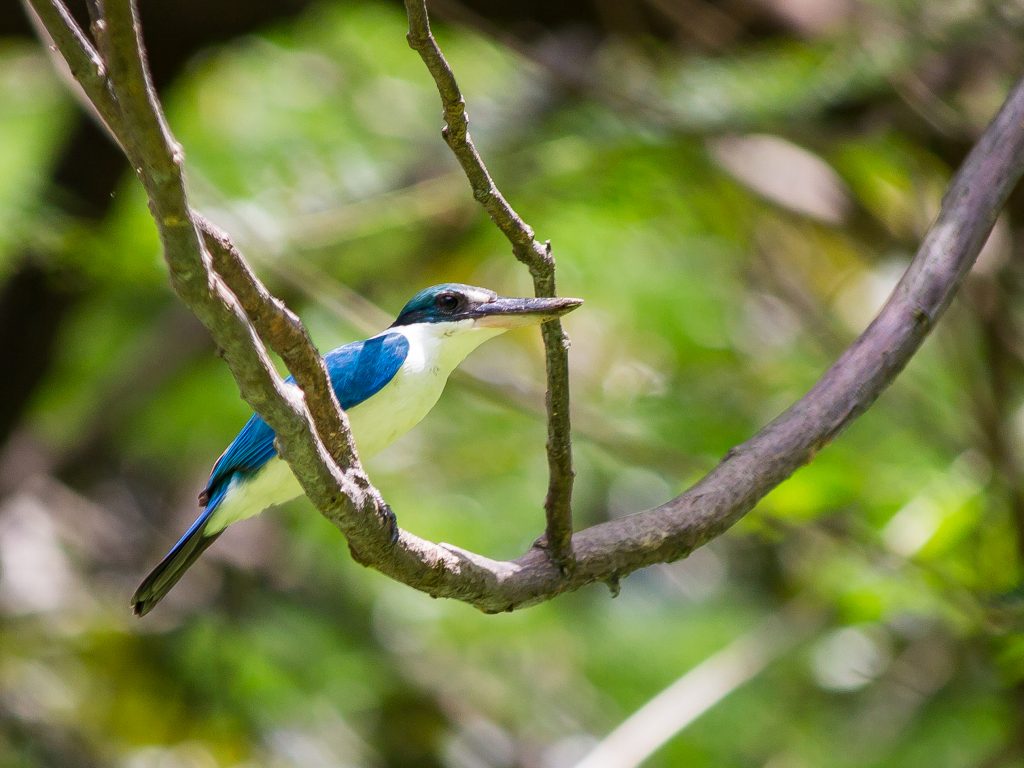 A collared kingfisher perched on a tree at AS8. (Photo: Mr Athanasius Koh)
A collared kingfisher perched on a tree at AS8. (Photo: Mr Athanasius Koh)
Dressed in beautiful blue feathers and a broad white “collar” around its neck, the collared kingfisher is a vocal bird spotted about campus with its series of harsh “kee-kee” notes, described by some as a maniacal laugh.
The collared kingfisher has also been quite the icon in Singapore’s history, gracing not only stamps but even the now decommissioned $10 note as part of The Bird Series Currency Notes from 1976 to 1984.
Look out for the collared kingfisher’s outstanding blue plumage as it rests atop trees and lamp posts. This sharply dressed celebrity is an easy spot around FASS and NUS Faculty of Engineering.
Red Junglefowl (Gallus gallus)
 Male red junglefowls proudly flaunt their dark green tail feathers and black primary feathers. (Photo: Mr Athanasius Koh)
Male red junglefowls proudly flaunt their dark green tail feathers and black primary feathers. (Photo: Mr Athanasius Koh)
Even if you have never personally caught sight of the resident FASS red junglefowl, you are more than likely to have heard its signature “cock-a-doodle-doo” around the faculty. Often confused for the domestic chicken, the red junglefowl is in fact its wild ancestor.
According to a study led by NUS ornithologist Associate Professor Frank Rheindt, the red junglefowl can be quite easily distinguished from the domestic chicken. Male red junglefowls proudly flaunt their dark green tail feathers and black primary feathers while females have distinguishing grey legs and sport black primary feathers.
While it remains a mystery why it crosses the road, the red junglefowl and its loud presence has certainly captured the attention of students and staff alike.
Plantain Squirrel (Callosciurus notatus)
 A plantain squirrel resting on a tree behind AS4. (Photo: Mr Athanasius Koh)
A plantain squirrel resting on a tree behind AS4. (Photo: Mr Athanasius Koh)
Scurrying and leaping from tree to tree, the plantain squirrel is an adorable sight if you are lucky to observe one at rest or enjoying its meal. This active animal is one of the most common mammals in Singapore and can be identified by distinctive black and white stripes on the sides of its body and its long bushy tail.
These physical features might have you thinking what a beautiful squirrel it is, and you are not alone! In fact, Callosciurus, the plantain squirrel’s taxonomic group, translates to “beautiful squirrel”.
Blink and you just might miss this nimble creature, but the plantain squirrel can be commonly found on the trees around NUS such as at the NUS Faculty of Science. Listen out for the rustling of leaves and you just might come face-to-face with this lovable rodent.
Rose-Ringed Parakeet (Psittacula krameri)
 A rose-ringed parakeet perches on a branch after breakfast along the AS6-AS8 walkway. (Photo: Mr Athanasius Koh)
A rose-ringed parakeet perches on a branch after breakfast along the AS6-AS8 walkway. (Photo: Mr Athanasius Koh)
Often moving in flocks and squawking in unison, the rose-ringed parakeet is a loud presence in NUS. Sporting a bright green plumage, orange beak and blue-tipped tail, males also have an added pink collar around their neck in their third year.
The rose-ringed parakeet was introduced to our green spaces as escaped pets. Native to the Indian subcontinent and northern Southeast Asia, it is a resilient bird that has thrived even in locations as far as Europe!
A bird that you might hear before you see, the rose-ringed parakeet has been spotted on sunny mornings at FASS’ Lovers’ Park and along the walkway between Blocks AS6 and AS8 grabbing its breakfast.
Yellow-vented Bulbul (Pycnonotus goiavier)
 The Yellow-vented Bulbul is easily distinguishable from its black eye-mask, olive-brown back and yellow undertail (Photo: Mr Athanasius Koh)
The Yellow-vented Bulbul is easily distinguishable from its black eye-mask, olive-brown back and yellow undertail (Photo: Mr Athanasius Koh)
One of the most common birds in Singapore’s many green spaces besides the mynah, the yellow-vented bulbul is an easy spot with its black eye-mask, olive-brown back and wings and most strikingly, yellow undertail.
An unfussy fellow, the yellow-vented bulbul has been observed to feed on a variety of small fruits and insects. In addition, it can sometimes be seen carrying strips of man-made waste like plastic bags and tissue paper to be used as nesting material. You might have heard its distinct chirps before, without knowing that it was the yellow-vented bulbul, but now you can keep an eye out for them too! Spot them in shrubs and trees around campus, such as the patch of greenery right outside NUS Press at Block AS3.
Changeable Lizard (Calotes versicolor)
 Adult male changeable lizards develop an orange-coloured head and black patches over their cheeks during the mating season (Photo: Mr Athanasius Koh)
Adult male changeable lizards develop an orange-coloured head and black patches over their cheeks during the mating season (Photo: Mr Athanasius Koh)
Often mistaken for the chameleon, the changeable lizard definitely is not one at all, but that does not stop it from changing its colours when it needs to! Usually brownish to greenish yellow with faint stripes along its body, adult males develop an orange-coloured head and black patches over their cheeks during the mating season.
As common as this rapid reptile is, you might be surprised to know that it is not native to Singapore. It is believed that it was accidentally introduced in the 1980s and has since populated in numbers, aggressively displacing the native green crested lizard (Bronchocela cristatella).
While the changeable lizard is somewhat adept at camouflaging, its timid nature means that you are more likely to find it scurrying away the moment there is a slightest disturbance, rustling up the grass. They can be seen all around campus such as at the FASS Fragrant Plant Garden or outside The Deck.
Oriental Pied Hornbill (Anthracoceros albirostris)
 An oriental pied hornbill perches on a tree outside of AS7, Shaw Foundation Building. (Photo: Mr Athanasius Koh)
An oriental pied hornbill perches on a tree outside of AS7, Shaw Foundation Building. (Photo: Mr Athanasius Koh)
The oriental pied hornbill has certainly made an impactful comeback to Singapore’s shores. Once thought to be locally extinct, the large bird can be identified by its casque atop its beak as well as its black and white plumage.
Along with other “celebrity wildlife” like the otters in Singapore, the oriental pied hornbills’ return to the mainland can be largely attributed to conservation efforts by the National Parks Board, Wildlife Reserves Singapore and the local research community. These efforts include providing sufficient mature trees for hornbills that favour nesting in tree holes.
Spotted across a number of locations in Singapore, NUS is no exception. It has been spotted in University Town and around FASS Block AS1 as well as the trees outside AS7, Shaw Foundation Building.
Now that you have met some of the interesting wildlife that have called NUS their home, be sure to keep an eye out for our neighbours in nature between classes! Do appreciate them from a safe distance and refrain from feeding them.
This story first appeared on NUSnews on 17 June 2021.
NUS CHS Case Competition: Solutions for Tomorrow
IN BRIEF | 1 min read
- The NUS College of Humanities and Sciences has launched the Case Competition Series. Register your interest now!
 The NUS College of Humanities and Sciences has launched the Case Competition Series, which seeks to encourage undergraduate and post graduate students to apply their curriculum learning to tackle complex real-world challenges that require interdisciplinary approaches to their solution. The students, who are expected to work in teams comprising members from across different disciplines, will be presented with a complex problem (to be shared at the start of the competition in late July), and given four weeks to build their cases in consultation with participating industry and Faculty advisers before their presentation for the first round of judging. Scan the QR code below or just click here to register your interest as team leader for this competition now. More details will be released to participants next month.
The NUS College of Humanities and Sciences has launched the Case Competition Series, which seeks to encourage undergraduate and post graduate students to apply their curriculum learning to tackle complex real-world challenges that require interdisciplinary approaches to their solution. The students, who are expected to work in teams comprising members from across different disciplines, will be presented with a complex problem (to be shared at the start of the competition in late July), and given four weeks to build their cases in consultation with participating industry and Faculty advisers before their presentation for the first round of judging. Scan the QR code below or just click here to register your interest as team leader for this competition now. More details will be released to participants next month.

Honouring five outstanding alumni from Arts and Social Sciences
IN BRIEF | 3 min read
- Five exceptional NUS Faculty of Arts and Social Sciences (FASS) alumni from diverse backgrounds were lauded at the annual FASS Distinguished Arts and Social Sciences Alumni Awards 2020 in a simple presentation ceremony on 30 April at Swissotel The Stamford.
 (From left to right): FASS alumni Mr Yatiman Yusof, Mr Niam Chiang Meng, Ms Lim Sau Hoong, Mr Ravi Menon and Dr Liang Wern Fook have made singular contributions to the areas of the arts, education, media, finance, policy and community development.
(From left to right): FASS alumni Mr Yatiman Yusof, Mr Niam Chiang Meng, Ms Lim Sau Hoong, Mr Ravi Menon and Dr Liang Wern Fook have made singular contributions to the areas of the arts, education, media, finance, policy and community development.
Five exceptional NUS Faculty of Arts and Social Sciences (FASS) alumni from diverse backgrounds were lauded at the annual FASS Distinguished Arts and Social Sciences Alumni Awards 2020 in a simple presentation ceremony on 30 April at Swissotel The Stamford.
All have left their distinct mark in the wide-ranging fields that they serve. They are namely:
- Mr Yatiman Yusof (Geography and Malay Studies, ’72), Non-Resident High Commissioner of Singapore to Kenya
- Mr Niam Chiang Meng (Economics, ’83), Chairman of the Maritime and Port Authority of Singapore (MPA)
- Ms Lim Sau Hoong (Chinese Studies, ’83), Founder, Former CEO and Executive Creative Director of advertising agency 10AM Communications
- Mr Ravi Menon (Economics, ’87), Managing Director of the Monetary Authority of Singapore (MAS)
- Dr Liang Wern Fook (Chinese Studies, ’89 and Master of Arts, ’92), Writer, musician and educator
Congratulating the award recipients, FASS Dean Professor Robbie Goh said, “Ms Lim Sau Hoong, Dr Liang Wern Fook, Mr Ravi Menon, Mr Niam Chiang Meng and Mr Yatiman Yusof, have made singular contributions to the arts, education, media, finance, policy and community development. Not only do their wide-ranging achievements bring pride to the FASS family, but I believe that it also attests to the disciplinary range, intellectual curiosity and critical thinking that are the hallmarks of the FASS educational experience.”
This disciplinary diversity, Prof Goh elaborated, would soon be enhanced by FASS’ partnership with the NUS Faculty of Science in the NUS College of Humanities and Sciences (CHS) where students would be able to choose any major that is offered by both faculties. He added that this would be a major boost to FASS students’ educational experience as “the CHS common curriculum will prepare students for a disruptive world – by giving them a compulsory grounding in essential skills such as writing and communication, data literacy, digital literacy, design thinking and AI.”
Our alumni and their contributions
 Present at the ceremony were (clockwise from top left): FASS Dean Prof Robbie Goh; Mr Menon; Dr Liang; Mr Bernard Toh, Director of NUS Alumni Relations; Mr Niam; Ms Lim; Mr Yatiman; and NUS President Prof Tan Eng Chye.
Present at the ceremony were (clockwise from top left): FASS Dean Prof Robbie Goh; Mr Menon; Dr Liang; Mr Bernard Toh, Director of NUS Alumni Relations; Mr Niam; Ms Lim; Mr Yatiman; and NUS President Prof Tan Eng Chye.
A teacher and a journalist early on in his career, Mr Yatiman served key government appointments including as a Member of Parliament and Senior Parliamentary Secretary of the Ministry of Foreign Affairs and the then-Ministry of Information and the Arts, before his retirement in 2006. In addition to being Singapore’s non-resident envoy to Kenya, Mr Yatiman is a Board Member of the Singapore Press Holdings Foundation and the Chairman of the Malay Language Council of Advisors.
Contributing extensively to the public sector too was Mr Niam who served in the Ministries of Finance, Trade and Industry, Health, Law, and Information, Communications and the Arts – including Permanent Secretary appointments in several of these Ministries. He also served at the National Population and Talent Division, and the National Climate Change Secretariat. Aside from his current MPA chairmanship, Mr Niam is also the Chairman of Gardens by the Bay Pte Ltd and MediaCorp Pte Ltd.
A heavyweight in the media, marketing, and advertising industry, Ms Lim’s creative leadership of 10AM Communications has garnered over 300 prestigious global awards including The One Show, the Clio Awards, and the Communication Arts. Identified for her unique creative talent, Ms Lim was Visual Advisor to the Planning Committee for the 2008 Beijing Olympics’ Opening Ceremony and headed the Shanghai World Expo 2010 Singapore Pavilion Advisory Panel. In 2007, Ms Lim was awarded the President’s Design Award and was named Designer of The Year for her extensive contributions to media, marketing and culture in Singapore.
Prior to his appointment at MAS, Mr Menon served as Permanent Secretary at the Ministry of Trade and Industry, and Deputy Secretary at the Ministry of Finance. A recipient of the Singapore Government’s Meritorious Service Medal and Public Administration (Gold) Medal, he has served on boards in the public, private, and people sectors. He is currently Chairman of the Institute of Banking and Finance, and serves on the Board of Trustees of the Singapore Indian Development Association.
A singer-songwriter, poet and academic in Chinese literature and language, Dr Liang is a respected cultural figure and pioneer of Xinyao – a movement of locally composed Mandarin pop songs from the 1980s. To date, Dr Liang is the only artist who has received the National Arts Council’s Young Artist Award (Literature) and the prestigious Cultural Medallion (Music) across different art genres. He was also honoured recently with the Singapore Chinese Cultural Contribution Award for his outstanding contribution to the promotion, enrichment and development of Chinese Singaporean culture. His canon of work includes over 15 publications of literature, more than 200 songs, and two Mandarin musicals – a number of his most important works were written and composed during his university days.
On receiving the awards
Also present at the event was NUS President Professor Tan Eng Chye who presented the awards to the five alumni. Invited guests were also treated to videos of the award recipients who shared about their university days in FASS and their career highlights.
Recalling the moment he received news of the award, Mr Yatiman humbly shared, “To be frank, I’m quite surprised when I was told about it. And I thought there are hundreds, if not thousands of people who are more suitable to receive this award. I’m just a small worker in the community, not doing much in my lifetime. I think there are many others. So, for those who’ve been working hard for the good of the community, I take this award as recognition of their effort too.”
Mr Niam recalled some of his best memories were during university days where he learnt a lot about networking and life skills. It was also where he found his life partner. He said, “It is a privilege to be given this award. I would like to thank NUS and the organising committee for bestowing this honour on me and the other recipients…it means a great deal.”
 Taking the form of a rising star, the alumni award represents the inspiration these individuals bring to society through their brilliant contributions towards the Faculty, University and Singapore.
Taking the form of a rising star, the alumni award represents the inspiration these individuals bring to society through their brilliant contributions towards the Faculty, University and Singapore.
Established in 2015, the Awards recognise individuals for their distinguished scholarship and outstanding service to the Faculty, the University and Singapore. These outstanding recipients have made significant impact in various fields locally and internationally, which has contributed to the betterment and promotion of the arts and social sciences.
Previous recipients of the Awards include luminaries such as former President Mr S R Nathan, Emeritus Senior Minister and former Prime Minister Mr Goh Chok Tong, former United Nations Under-Secretary General Dr Noeleen Heyzer; Permanent Member of the Presidential Council for Minority Rights Mr Abdullah Tarmugi; and Executive Chairman of Banyan Tree Holdings Limited Mr Ho Kwon Ping.
Click here for more details on this year’s award recipients.
This story first appeared on NUSnews on 6 May 2021.
Singapore through the years: A digital cartographic record
IN BRIEF | 3 min read
- Professor Taylor and Associate Professor Feng Chen-Chieh, along with their department colleagues at NUS Geography, created Historical Maps of Singapore, an online resource hosted by NUS Libraries that provides a series of maps of different scales dating from 1846 to 2010.
 A plan of Singapore town and the adjoining districts produced by John Turnbull Thomson, a Government Surveyor, and published by J.M. Richardson in London in 1846.
A plan of Singapore town and the adjoining districts produced by John Turnbull Thomson, a Government Surveyor, and published by J.M. Richardson in London in 1846.
From quiet colonial backwater to thriving city-state, Singapore has undergone rapid transformation over the last 200 years or so.
If you are interested in finding out how the Central Business District has developed since the 1828 Jackson Plan or have a general interest in the country’s ever-changing landscape, do check out Historical Maps of Singapore, an online resource created by NUS Geography and hosted by NUS Libraries.
Historical Maps of Singapore provides a series of maps of different scales dating from 1846 to 2010. The maps have been carefully converted to a digital format and georeferenced to facilitate cross-comparison.
The work was funded through a Strategic Initiative award from NUS, and both the Singapore Land Authority and Ministry of Defence kindly provided permission for the maps to be made available online.
NUS Geography faculty members who worked on the project included the Head of Department Professor David Taylor, as well as Associate Professor Feng Chen-Chieh.
“Maps are extremely important resources, and not only for geographers. Maps are time-stamped windows not only on the ever-changing landscapes they represent in reduced form but also on the minds and values of the map-makers and those who they thought might be interested in the results of their endeavours,” said Prof Taylor.
“For example, the 1873 map shows the locations of 29 police stations, but only one hospital ~ was crime really a much greater concern than health in late 19th century Singapore? Making the maps available in digital form opens them to a wider audience and to new forms of analysis.”
 (From left to right) The changing landscape of the Telok Ayer Basin from 1860 to 1993.
(From left to right) The changing landscape of the Telok Ayer Basin from 1860 to 1993.
The online resource is being used in teaching by NUS Geography, and has proved particularly valuable during the COVID-19 pandemic when teaching was moved largely online.
The digitised maps have also been used in research. For example, geographers have used the maps as a basis for plotting changes in Singapore’s coastline and the extent to which coastal habitats such as mangrove forests have been lost, while researchers at NUS Chinese Studies have plotted changes in the locations of Chinese temples and kampungs – and in some cases their disappearances.
The Historical Maps of Singapore web-based resource has been made as straightforward as possible to use. Once on the website, users may select the maps that they are interested in and zoom in and out, revealing higher or lower levels of detail. They can also arrange several maps on top of one another as layers, and search for common features on the different maps. Layer swipes can also be done to compare different maps.
Clicking on the metadata, one can also view a description of the map, provenance and citation. These maps can be exported and viewed in Google Earth, QGIS or ArcGIS as layers. These features provide researchers and students from a range of disciplines with the analytical and visualisation tools needed to carry out more detailed studies of the digitised maps.
 Users may swipe to compare the maps over different years.
Users may swipe to compare the maps over different years.
Prof Taylor added, “The popularity of the Historical Maps of Singapore web-based resource has not surprised me. Singapore has changed so much in a relatively short period of time.
“Maps are one way of capturing and evaluating those changes. But they are capable of providing much more than a simple record of change. I hope that we are able to add to the current collection of digitised maps and associated resources in the coming years as we move increasingly into an era where geospatial information underpins so much of what we do and who we are”.
This story first appeared on NUSnews on 22 April 2021.
#DiscoverFASS@CHS 2021 | Sign Up for Masterclasses, Learn All About Our Majors
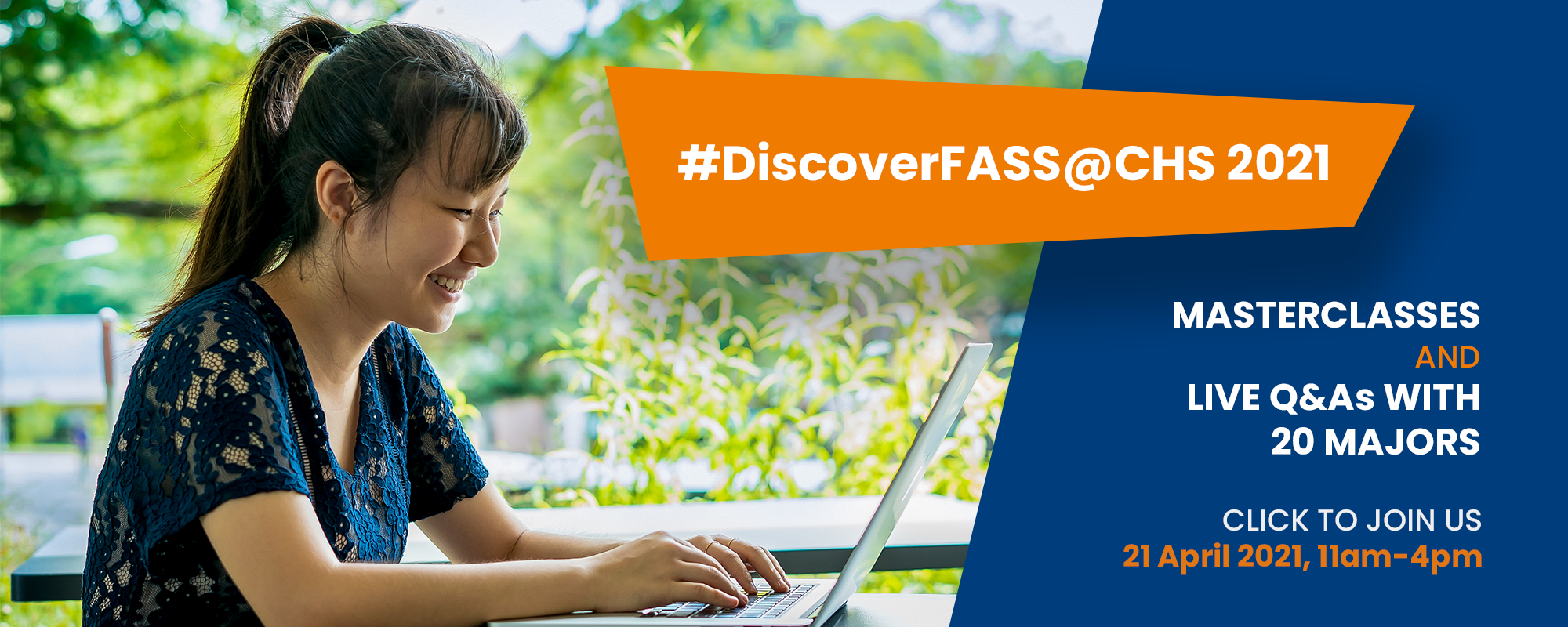
As part of the #DiscoverFASS@CHS campaign leading up to our Open House in May this year, we are holding 'live' Masterclasses presented by three of our award-winning Faculty members, and our Departments are hosting 'live' Q&A sessions for prospective students. These are opportunities not to be missed if you wish to know all you need to know about classes here and the myriad programmes available to you if you are a part of the FASS community. Masterclasses by Award-Winning Faculty
Experience lessons led by our dynamic faculty members.  Roasted Fetuses and Corpse Magic: An Introduction to Supernaturalism in Southeast Asia
Roasted Fetuses and Corpse Magic: An Introduction to Supernaturalism in Southeast Asia
Presented by Associate Professor Irving Johnson, Department of Southeast Asian Studies
The class aims to foreground the fascinating world of beliefs in supernaturalism that pervade Southeast Asian lives. Many of us enjoy telling and listening to creepy stories, watching horror movies on Netflix or dabbling in the esoteric. In this masterclass, we will look at some of the beliefs that structure constructions of the supernatural in modern Southeast Asia. The class revolves around a series of interrelated questions that seek to discover commonalities in popular belief systems and their prominence in the region, linking supernaturalism to larger issues of power, gender and politics.  Evidence and Promise Making
Evidence and Promise Making
Presented by Assistant Professor Zachary Barnett, Department of Philosophy
Promise-making is an important part of life. We make promises to our friends, families, and significant others, and they make promises to us. We will look at a puzzle that arises when we think about "promising against the odds": How should I feel about making a promise, if I know that most of the people in my exact situation end up breaking that promise? For example, suppose that I promise to quit smoking cigarettes. At the same time, I know that most people who sincerely promise to quit smoking do not actually succeed on their first attempt. Should I believe that I will be the exception to the rule? If not, am I justified in making the promise in the first place? And if I do make the promise, should my friends and family believe me? These questions arise in many different contexts, ranging from the superficial to the serious, involving addiction or relationships.  Making Sense of Self-Awareness and What That May Mean
Making Sense of Self-Awareness and What That May Mean
Presented by Dr Peace Wong Yuh Ju, Department of Social Work
In this talk, Dr Wong will attempt to broaden our understanding about ‘self’ and what that may mean to us. It is not uncommon for students in wanting to gain greater self-awareness with the attempt to learn more about one’s beliefs/feelings in relation to the observed world around us. Yet, how do we deepen our understanding of ‘self’, given that we are both familiar with who we are, and yet at times finding ourselves baffled by our reactions, and wondered why we respond in a certain manner? We will briefly discuss the various influences that may impact our values and beliefs, as well as consider what knowing your ‘self’ may mean to you.
To register for Masterclasses, click here.
Live Q&As with our Departments
Meet key Faculty and student representatives of every FASS Department and major programme in their respective Zoom meeting rooms and ask them specific questions about the requirements, content and value of the programmes they offer.
Department of Chinese Studies
The Chinese Studies Department provides training in diverse areas of Chinese Studies and Chinese Language, with the aim of preparing students for employment in a wide range of sectors. Graduates are offered career opportunities as professionals in the educational and business sectors, academia, the translation service industry and the mass media.
Join the Department's #DiscoverFASS@CHS 2021 'Live' Q&A session on 21 April (2-4 pm) here.
In the meantime, visit the College of Humanities Programmes page for more details on what this Department offers.
Department of Communications and New Media
Communications and New Media (CNM) at the National University of Singapore is the only Department in Southeast Asia that offers media studies, interactive media design, cultural studies, and communication management with a focus on new media.
Join the Department's #DiscoverFASS@CHS 2021 'Live' Q&A session on 21 April (2-4 pm) here.
In the meantime, visit the College of Humanities Programmes page for more details on the programmes offered by this Department.
Department of Economics
The Department of Economics has an established reputation as one of the largest and leading departments of Economics in the Asia-Pacific region. Faculty members’ research areas span a wide range of economic fields, with strength in the core areas of microeconomics, macroeconomics and econometrics, as well as in particular fields such as game theory and industrial organization, labor economics, education, financial economics, and growth theory and development with special reference to Asia.
The Department's #DiscoverFASS@CHS 2021 'Live' Q&A session on 21 April (2-4 pm) here. This session includes discussion of the Data Science and Economics Cross-Disciplinary Programme (DSE-XDP).
In the meantime, visit the College of Humanities Programmes page for more details on the programmes offered by this Department.
Department of English Language, Literature and Theatre Studies
The Department of English Language, Literature and Theatre Studies houses three undergraduate majors and three graduate programmes. The English Language major offers an education in linguistics, the study of human language. The undergraduate programme in English Literature is designed to provide a broad foundation in reading and analysing texts of all kinds. And, the Theatre Studies curriculum delivers education in all areas of theatre and performance history, production and interpretation.
The Department's #DiscoverFASS@CHS 2021 'Live' Q&A session on 21 April (2-4 pm) here.
In the meantime, visit the College of Humanities Programmes page for more details on the programmes offered by this Department.
Department of Geography
Modules in the Department of Geography are organized along four areas of enquiry: environmental processes and change; global political economy; society and culture; and regional specializations (with a focus on Asia). The Department also offers a Field Studies module in which students travel to countries in the region such as Thailand and Malaysia where they conduct field work and collect research material over a 3-5 week period. Home-stays and visits to local universities and key sites of interest are part of the overseas learning experience it delivers.
The Department's #DiscoverFASS@CHS 2021 'Live' Q&A session on 21 April (2-4 pm) here. This session includes discussion of the Bachelor of Environmental Studies Programme (BES-XDP).
In the meantime, visit the College of Humanities Programmes page for more details on the programmes offered by this Department.
Department of History
The Department of History offers training at undergraduate and graduate levels, and its teaching and research expertise lies primarily in the history of Southeast and East Asia, but there is strong selection of module offerings in European, American, and military history, as well as the history of art, business, religion, science and technology.
The Department's #DiscoverFASS@CHS 2021 'Live' Q&A session on 21 April (2-4 pm) here.
In the meantime, visit the College of Humanities Programmes page for more details on the programmes offered by this Department.
Department of Japanese Studies
Founded in 1981, the Department of Japanese Studies is one of the largest area studies departments devoted to the study of Japan in the Asia-Pacific region, and offers BA, MA and PhD degrees in Japanese Studies taught by specialists with qualifications from leading universities around the world.
The Department's #DiscoverFASS@CHS 2021 'Live' Q&A session on 21 April (2-4 pm) here.
In the meantime, visit the College of Humanities Programmes page for more details on the programmes offered by this Department.
Department of Malay Studies
The Department of Malay Studies actively engages in research on a wide range of issues concerning the Malay world from a multi-disciplinary perspective, promotes exchanges with centres of Malay studies worldwide, and encourages the development of new and alternative approaches to the understanding of Malay history, economy, politics, society and culture.
The Department's #DiscoverFASS@CHS 2021 'Live' Q&A session on 21 April (2-4 pm) here.
In the meantime, visit the College of Humanities Programmes page for more details on the programmes offered by this Department.
Department of Philosophy
The Department of Philosophy is one of Asia’s leading centres for philosophical education and research. It is the top English-language philosophy program in Asia, and the inaugural Asian member of the Australasian Association of Philosophy. The faculty members have a broad range of interests spanning diverse philosophical traditions, offer a philosophical education spanning diverse philosophical traditions.
The Department's #DiscoverFASS@CHS 2021 'Live' Q&A session on 21 April (2-4 pm) here. This session will also include discussion of the Philosophy, Politics, and Economics Cross-Disciplinary Programme (PPE-XDP).
In the meantime, visit the College of Humanities Programmes page for more details on the programmes offered by this Department.
Department of Political Science
The Department of Political Science offers modules in comparative politics, international relations, political theory, and public administration. It also houses the Global Studies Programme, a new, multidisciplinary field of inquiry that examines the processes and effects of globalisation across political, economic, social and cultural domains around the world.
The Department's #DiscoverFASS@CHS 2021 'Live' Q&A session on 21 April (2-4 pm) here. This session includes discussion of the Global Studies Programme.
In the meantime, visit the College of Humanities Programmes page for more details on the programmes offered by this Department.
Department of Psychology
The Psychology programme at NUS aims to equip students with knowledge in the key areas of psychology (such as human biological processes, developmental processes, social processes, cognitive processes, mental health and adjustment of individuals) as well as an understanding of the applications of psychology. It also develops skills for undertaking studies of behaviour, including statistical skills and the use of computers for data analyses.
The Department's #DiscoverFASS@CHS 2021 'Live' Q&A session on 21 April (2-4 pm) here.
In the meantime, visit the College of Humanities Programmes page for more details on the programmes offered by this Department.
Department of Social Work
The main objective of the undergraduate General and Honours degree programme offered by the Department of Social Work is to equip its graduates for entry into the social work profession at the direct-service level. Students are exposed to social service visits, skills laboratory training, fieldwork placements and module projects, among other applied learning methods.
Go to this Department's #DiscoverFASS@CHS 2021 'Live' Q&A session on 21 April (2-4 pm) here.
In the meantime, visit the College of Humanities Programmes page for more details on the programmes offered by this Department.
Department of Sociology
The Department of Sociology is a diverse, dynamic and innovative research and teaching unit with strong expertise in research on Southeast Asia, East Asia and South Asia as well as on Singapore society. One of the largest Sociology departments in the world, it offers comprehensive undergraduate, honours and graduate programmes, led by a group of dedicated and creative researchers and educators.
The Department's #DiscoverFASS@CHS 2021 'Live' Q&A session on 21 April (2-4 pm) here.
In the meantime, visit the College of Humanities Programmes page for more details on the programmes offered by this Department.
South Asian Studies Programme
South Asian Studies, as offered by the South Asian Studies Programme (SASP), focuses on the region comprising India, Pakistan, Bangladesh, Sri Lanka, Nepal, Bhutan and the Maldives. At the undergraduate level, students are offered a range of modules in economics, religious and cultural studies, history, international relations, philosophy, politics and gender studies. The aim is to provide graduates of the programme with a broad understanding of the region from different points of view - knowledge that will be useful in dealing with this changing region in the 21st century.
The Department's #DiscoverFASS@CHS 2021 'Live' Q&A session on 21 April (2-4 pm) here.
In the meantime, visit the College of Humanities Programmes page for more details on the programmes offered by this Department.
Department of Southeast Asian Studies
The Department of Southeast Asian Studies is located in the Asian Studies Division of the Faculty of Arts and Social Sciences, and offers distinctive programmes for anyone interested in studying Southeast Asia, from the undergraduate to the PhD level.
The Department's #DiscoverFASS@CHS 2021 'Live' Q&A session on 21 April (2-4 pm) here.
In the meantime, visit the College of Humanities Programmes page for more details on the programmes offered by this Department.
Centre for Language Studies
The Centre for Language Studies was established in 2001 to serve the foreign language needs of the Faculty of Arts and Social Sciences and has today over 80 full-time and part-time faculty members. It teaches thirteen different languages - Arabic, Bahasa Indonesia, Chinese, French, German, Hindi, Japanese, Korean, Malay, Spanish, Tamil, Thai and Vietnamese - to app. over 3,300 students per semester and thus helps them acquire a very valuable economic and social resource in today's world of growing globalisation and internationalisation.
The Department's #DiscoverFASS@CHS 2021 'Live' Q&A session on 21 April (2-4 pm) here.
In the meantime, visit the College of Humanities Programmes page for more details on the programmes offered by this Department.
Finding Hope for a Generation of Crises
IN BRIEF | 5 min read
- Ng Chia Wee, third-year student at the Faculty of Arts and Social Sciences, NUS College of Humanities and Sciences, majoring in Philosophy, Politics, and Economics (PPE), says the youth must adopt a new attitude with three new key shifts to get through the bad time coming their way.
Click through to read this article.
The Sunday Times, 21 March 2021, Views, pA23
This story first appeared in NUSnews on 21 March 2021.
Jonathan Sim: Make Students in Charge of Their Learning
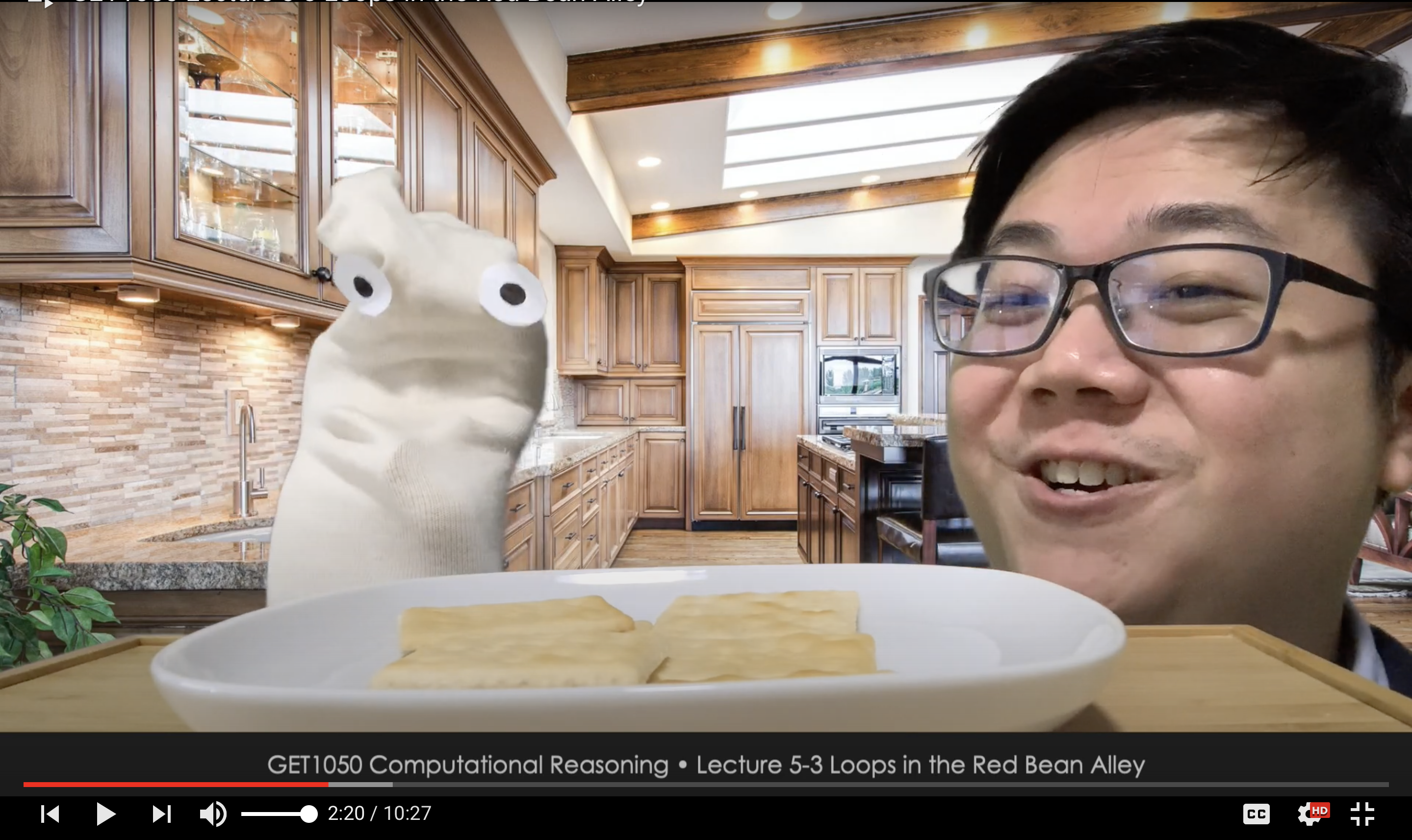
In homage to children's educational TV series Sesame Street, Mr Sim made sock puppets to explain loops as a concept for GET1050 Computational Reasoning, which moved to virtual learning in Semester 1, Academic Year 2020/2021. (Video screengrab courtesy of Mr Jonathan Sim)
IN BRIEF | 3 min read
- Educators must help students alleviate the fear and anxiety that impede their learning
- Support systems such as a Telegram Helpline help students easily reach out to their instructors and peers, and encourage active learning and peer teaching
- Hands-on learning during physical tutorials aids students to internalise their understanding of abstract concepts
For students to learn well, educators must first help to mitigate the fear and anxiety that impede their learning, said Mr Jonathan Sim, National University of Singapore (NUS) Department of Philosophy instructor, when outlining his teaching philosophy.
He was one of 36 Faculty Teaching Excellence Award (FTEA) recipients, awarded to outstanding Arts and Social Sciences (FASS) faculty in recognition of their high level of commitment in Academic Year 2019/2020.
According to Mr Sim, students often experience anxiety and the fear of failure, especially when they pursue interdisciplinary modules incorporating subject areas outside of their major.
“I encountered many students who failed to internalise their learning because they were afraid of saying or writing the wrong thing,” explained Mr Sim, who has been teaching at NUS since 2017. He began as a part-time Teaching Assistant (TA) for two interdisciplinary modules and is now Module Coordinator and Instructor for GET1050 Computational Reasoning, a mandatory module for all FASS undergraduates since Academic Year 2019/2020.
“There’s this tendency to stick to model answers, to replicate and modify examples. They never really give themselves a chance to try to express what they learnt in their own words,” he added.
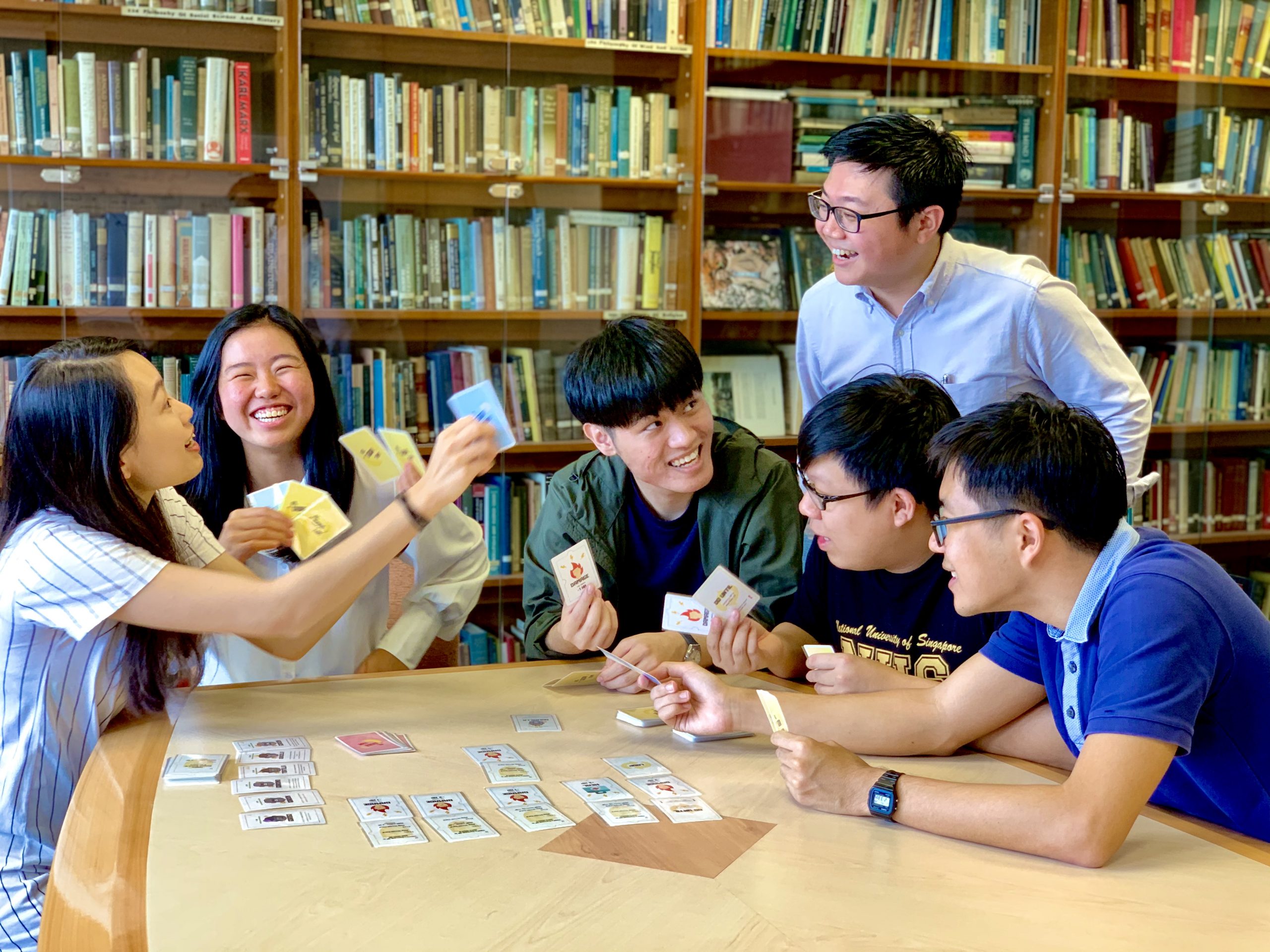
Mr Jonathan Sim looks on as his Teaching Assistants play the ‘Al-GORI-thm Card Game’, which he developed with his undergraduate TAs Talia Vilaire, Daryn Wong and Siti Nur Iman for his module, GET1050 Computational Reasoning. The game helps students learn the basics of conditionals and loops, requiring them to develop algorithms in order to defeat enemy gorillas and win coveted bananas. (Photo courtesy of Mr Jonathan Sim. Note: this photo was taken before Covid-19 safe management measures were put in place)
To help alleviate his students' anxieties and empower them, Mr Sim created a variety of support systems, such as a 'Helpline' chat group on messaging platform, Telegram, for students to reach out to their instructors and peers. He also engages them with humour; and introduces simulated scenarios in a safe environment where they learn to evaluate and recover from failures.
“It is my hope that through these experiences, they realise that failing isn’t as bad as it seems, so they feel more empowered to take risks in their learning, and thus learn more effectively as they discover how to apply what they learnt,” he said.
Mr Sim’s former GET1050 student Audrina Tan, currently a Psychology major and has progressed to becoming one of his TAs, attests to how effective the Telegram Helpline was.
“The Helpline really helped alleviate my anxieties, and made me feel a part of the learning community, seeing that everyone was so willing to ask questions without reservation,” said Audrina, adding that she has learnt numerous learning techniques as Mr Sim’s TA. In turn, she now applies effective scaffolding to help her students learn better.
“Mr Sim places a huge emphasis on the value of active learning and peer teaching. He taught us that as TAs, our role is less to provide answers, but more to facilitate, guide and encourage self-learning,” she explained.

When he had to abruptly move his lessons online during the height of the Covid-19 pandemic in Semester 2, Academic Year 2019/2020, Mr Sim filmed lessons in Ikea to make classes more interesting. (Video screengrab courtesy of Mr Jonathan Sim)
Mr Sim is a strong believer of hands-on learning and quite literally too. For physical tutorials, the teaching team designed games where students used cards and blocks, and moved them around to facilitate internalising abstract concepts, such as algorithms.
Describing his “traumatising experience” of shifting tutorials onto the teleconferencing platform Zoom at the height of last semester’s global health pandemic, Mr Sim related he spent the entire summer break rethinking his approach in preparation for going fully virtual.
There were two major revamps to his lessons, one was modifying the tutorial participation grading rubric to emphasise helping or seeking help from peers rather than a student’s contribution to classroom discussion.
“This was necessary to encourage fast learners to engage in discussion with peers rather than just completing all the learning exercises on their own,” he explained. In the process, fast learners are motivated to apply their learning through peer teaching while struggling students are incentivised to seek help from their group members.
The other change Mr Sim introduced was the creation and use of very detailed and structured Google Docs worksheets for discussion, allowing each group to progress through various learning activities at their own pace. The tutor does not need to wait for every group to be on the same page, but instead attends to groups at their pace and unique learning needs. This way, each group receives a very personalised and intimate learning experience.
“When students are more positive, less focused on grades, and more interested in learning, they bounce that energy off each other,” Mr Sim said. “Once that is set in motion, I don’t have to do very much to keep it going. Students become self-motivated and naturally and actively engage in peer learning despite the constraints of learning online from home.”
This story is the first of three highlighting the pedagogical approaches of selected FASS Faculty Teaching Excellence Award 2020 recipients.
Award Citation
"Mr Jonathan Sim came to his task firmly aware that students’ anxiety can be impediments to their learning, limiting their ability to fully realize their potential. This challenge is especially acute in his case, given that he teaches data analysis and coding to students from the Arts and Social Sciences. The blended-learning format of his high enrolment module introduces other challenges as well, as online learning can be cold and impersonal given the diminished opportunities for social interaction, leading students to think that they are faring worse than their peers, which further affect their confidence and motivation to learn."
—FASS Faculty Teaching Excellence Committee (FTEC) chaired by Vice Dean (External Relations and Student Life) Associate Professor Loy Hui Chieh, and comprising Associate Professor Christopher Michael McMorran (Japanese Studies), Associate Professor Stephen Lim (Psychology), Senior Lecturer Gilbert Yeoh (English Language and Literature), and Senior Lecturer Chen Ingru (Centre for Language Studies).










